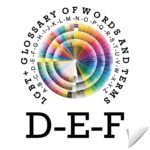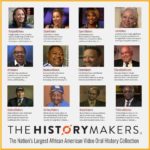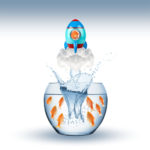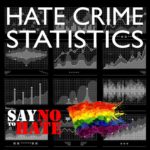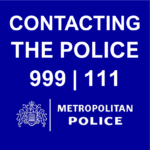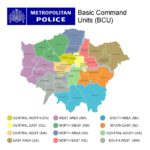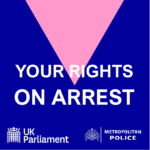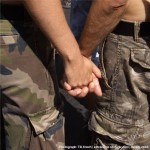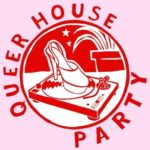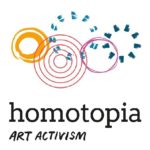POPULAR TOPICS AND ICON KEYS
Popular topics
Popular topics
Coming out support
Hate crime and reporting hate crime
Housing and homelessness
Gay’s the Word bookshop
LGBT+ Forums (London)
LGBT+ News Sources
Website icons
External link | Internal link
Film clip | Sound clip
Organisations/ services | Helpline
Chat | Warning/ note
Ask us anything
Ask us anything
If online, we usually reply same day if not with 48hrs.
About this website
Disclaimer
ABOUT YOU
Do it your way
 Welcome to our world and the journey. As you can see, we take ourselves seriously but not too seriously. And introductions are usually very dull, so you’re not going to get one, at least not in the traditional sense.
Welcome to our world and the journey. As you can see, we take ourselves seriously but not too seriously. And introductions are usually very dull, so you’re not going to get one, at least not in the traditional sense.
YOU aims to be supportive, straight-talking and fun and should help you get the best out of being gay, particularly if you’re starting out, or questioning your sexuality.
Getting the best out of YOU should be the same as getting the best out of life: do it your way! Please let us know if you have any suggestions as to how we can make YOU better.
100 Basic Signs in British Sign Language (BSL) | Commanding Hands | 4 Apr 2020 | 14m 48sLearn 100 basic signs in British Sign Language. Disability Back to top
Sex, gender and sexuality
The spectrum
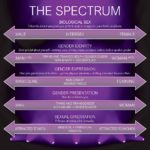 Today’s younger 21st-century generation has a significantly different understanding of these issues than previous generations, embracing an evolving language that better describes who they are and how they feel.
Today’s younger 21st-century generation has a significantly different understanding of these issues than previous generations, embracing an evolving language that better describes who they are and how they feel.
Also, talking about sex, gender expression, gender identity and sexual orientation can be daunting for those who were raised with a more fixed or narrower view of gender (a man or woman), sex (male or female), or sexuality (gay or straight).
For some, our sexuality and gender identity are clear(er); for others, less so and can be more fluid. The spectrum illustrated here (and there are variations) can help visualise how you feel at any given time.
“If you were born with a penis, society expects you to look, act and dress in one way, and if you were born with vulva, society expects you to be the opposite. Many people assume that the sex you were assigned at birth (eg: male) will determine your gender identity (man), your gender expression (masculine) and your sexual orientation and behaviour (straight). Men are supposed to be dominant, rational and providers while women are expected to be submissive, emotional and nurturing. That’s not for everyone! People identify in many ways—in between and outside of the categories of man/ woman, male/ female, masculine/ feminine and gay/ straight. Our lives are much more complex than the pink and blue boxes set by the gender binary.” Send the Right Message
Check out our A-Z glossary of words and terms, including …
Pansexual | MEN R US
Gender fluid | MEN R US
Nonbinary | MEN R US
Asexual | MEN R US
Aromantic | MEN R US
Demisexual | MEN R US
Grey | MEN R US
Books
Ace Voices | Eris Young | Jessica Kingsley Publishing | 2022“How do we experience attraction? What does love mean to us? When did you realise you were ace? This is the ace community in their own words. Drawing upon interviews with a wide range of people across the asexual spectrum, Eris Young is here to take you on an empowering, enriching journey through the rich multitudes of asexual life.”
Bi: Bisexual, Pansexual, “Fluid, and Nonbinary Youth | Ritch C. Savin-Williams | NYU Press | 2021
“Ritch Savin-Williams, brings bisexuality to centerstage at a moment when Gen Z and millennial youth and young adults are increasingly rejecting traditional labels altogether. Drawing on interviews with bisexual youth from a range of racial, ethnic, and social class groups, he reveals to us how bisexuals define their own sexual orientation and experiences—in their own words.” Gay’s the Word
66 Marchmont Street, London WC1N 1AB
The oldest LGBT+ bookshop in the United Kingdom. Back to top
What does gay mean?
The word gay is most commonly used to describe people who are physically and romantically attracted to other people of the same gender (male or female). Simply put men who have sex with other men, and fall in love with men; and women who have sex with other women, and fall in love with women.
While the word gay is used for both men and women, gay is usually used to describe men while women are described as lesbians.
Sex, gender, and sexuality
Before we say more about sexuality (being gay) there are some basics we should cover first:
- sex (assigned at birth)
- gender; gender identity, and gender expression
- sexuality
They are often lumped together though they are different parts of who we are.
Back to topYour sex assigned at birth
 Your sex assigned at birth is the biological and physical characteristics used to define people as male or female. These include:
Your sex assigned at birth is the biological and physical characteristics used to define people as male or female. These include:
- X and Y chromosomes
- whether you have external or internal sex organs (penis or vagina)
- types and levels of hormones
- hair growth
- breast development
- what is recorded on your birth certificate
Some people are born intersex and have characteristics that don’t fit typical definitions of male and female.
LGBT+ Glossary | MEN R USCheck out our awaesome glossary of LGBT+ words and terms. Back to top
Your gender identity
 Your gender is how you feel about yourself:
Your gender is how you feel about yourself:
- Your internal and personal sense of being a boy or man, or a girl or woman, both or another gender
- The way you communicate, behave and identify with others
- The acceptance or non-acceptance of your ‘membership’ to society and attitudes and behaviours it expects of you
It’s not about whether you were born with a penis or a vagina.
Gender or gender identity is generally accepted to be a social invention and hundreds if not thousands of years old, depending on whether you want to look at more recent times or go back to the year dot. This means it does not exist naturally but rather is a series of ideas, rules, conventions, expectations that have evolved to enable society to work, and work better (if usually for the majority). However, this may not reflect how you truly feel, behave, or define yourself so society’s categories or pigeonholes for what is masculine and feminine have always been acceptable for some while less so for others.
Illustrating Gender | Gerard Coll-Planas and Maria Vidal.Non-binary genders and gender variants
Terms primarily used by the LGBT+ communities, male and female genders are also referred to as gender binary, binary meaning composed of or involving two things (male and female). Non-binary genders refer to any gender that does not fit within the binary of male and female, genderqueer, being an example.
The term is also used by individuals wishing to identify as falling outside of the gender binary without being any more specific about the nature of their gender. For example, a person might say “I’m not sure if there is a term for my gender but I know it’s non-binary” or “I consider myself as gender variant.”
What are gender pronouns and why is it important to use the right ones? | The Conversation | 15 Oct 2021How a gender conspiracy theory is spreading across the world | The Conversation | 23 Mar 2020
What it means to identify as non-binary | HuffPost | 8 Dec 2018
Non-binary people aren’t a new phenomenon: we’ve been here as long as humans have existed | HuffPost | 5 Dec 2018 Genderqueer | Wikipedia Things not to say to non-binary people | BBC 3 | 7m LGBT+ Glossary | MEN R US
Check out our awaesome glossary of LGBT+ words and terms. Back to top
Your gender expression
Gender expression is how a person chooses to outwardly express (show) their gender. For example:
- Choice of clothing
- General physical appearance
- Behaviour toward others
- Way they carry themselves
- Way they speak
Your sexuality
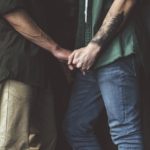 Your sexuality or sexual orientation is who you are attracted to romantically and/ or sexually.
Your sexuality or sexual orientation is who you are attracted to romantically and/ or sexually.
We should also include romantic orientation because we may have strong romantic relationships which do not necessarily involve sex, and where sex in itself is not necessarily the final goal or endpoint.
- Gay and lesbian (or homosexual) if you are attracted to people of the same sex or gender
- Bisexual or bi if you are attracted to both men and women
- Pansexual is the sexual, romantic or emotional attraction towards people regardless of their sex or gender identity
- Straight (or heterosexual) if you are attracted to people of the opposite sex or gender
- Asexual if you are not sexually attracted to either men or women
- Others self-identify as Queer because they feel sexual attraction isn’t about labels and/ or it’s a political statement
There are other ways to identify your sexuality but you should not feel pressured to label yourself (or be labelled) in a way that makes you feel uncomfortable. While the sexual orientations listed here are more usual, more emerge as we learn, and LGBT+ people self-define. For example:
- “The survey received 108,100 valid responses from individuals aged 16 or over who were living in the UK and self-identified as LGBT or intersex. Sexual orientation: 61% of respondents identified as gay or lesbian and a quarter (26%) identified as bisexual. A small number identified as pansexual (4%), asexual (2%) and queer (1%).” | The National LGBT Survey | Government Qualities Office; pg.8 | 2018
- “More than 1 in 5 LGBTQ youth described themselves as something other than gay, lesbian, or bisexual. While 78% responded that their sexual orientation was gay, lesbian, or bisexual, a full 21% selected the option for “something else.” These included demisexual, panromantic sexual, ace spectrum, grey sexual and polysexual. | Research Brief: Diversity of Youth Sexual Orientation | Trevor Project | 2019
Check out our awesome glossary of LGBT+ words and terms. Back to top
To be, or not to be, queer
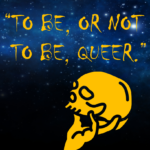 The meaning of ‘queer’ has changed a lot over recent decades. From being a slur to being reclaimed by some LGBT+ people and being rejected by others. The short answer is that ‘queer’ means different things to different people.
The meaning of ‘queer’ has changed a lot over recent decades. From being a slur to being reclaimed by some LGBT+ people and being rejected by others. The short answer is that ‘queer’ means different things to different people.
There’re lots of reasons why people identify with ‘queer’, either individually or as an umbrella term. It encompasses a wide range of identities and doesn’t risk excluding groups that the acronym may leave out. Some people find queer’s ambiguity appealing since it gives a sense of community without the need for a more specific label. You might be gay, I might be trans – but we’re both queer, and that brings us together.
For some, using ‘queer’ also aims to be an all-inclusive, a unifying umbrella term that includes people who are same-gender attracted and gender diverse as well as the intersections of people and identities within our community. Also, people like it because it’s easy to say and has a whole lot fewer syllables than LGBTIQ and overall, it’s easier to use and remember, especially if this is all new to you.
There are people who dislike the term, mostly due of the fact that it has also been a term that’s used as a slur (a word people use with hate). In the 1960s onwards, people used the word queer as a weapon, usually saying it when attacking or trying to humiliate LGBTIQ people. It wasn’t until the 1980s when activists began to reclaim it, writing it on banners and flags when marching and protesting.
To be or not to be queer | MEN R USQueer (LGBT+ Glossary | MEN R US Back to top
Lesbians and lesbianism
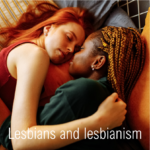 Lesbianism is the sexual and romantic desire between women. The word comes from “Lesbos”, the Greek island in the Mediterranean. Lesbos was home to Sappho, a Greek poet who explored themes of women’s lives. While some women use the term ‘lesbian’ to describe themselves, others prefer other terms such as ‘gay’ or ‘queer’, while others prefer no label at all.
Lesbianism is the sexual and romantic desire between women. The word comes from “Lesbos”, the Greek island in the Mediterranean. Lesbos was home to Sappho, a Greek poet who explored themes of women’s lives. While some women use the term ‘lesbian’ to describe themselves, others prefer other terms such as ‘gay’ or ‘queer’, while others prefer no label at all.
For some, the term “dyke” is offensive slang for lesbian. While its origins are a derogatory/ homophobic slur meaning masculine or butch, it has been reclaimed by some women as a positive to describe themselves as tough, resilient and/ or assertive. Note: a dike (with an ‘i’) is a natural or artificial barrier used to manage/ regulate water levels.
Historically, there are far fewer mentions of lesbianism than male homosexuality, primarily due to historical writings and records primarily written by men, focusing on men. Imagine that?!*
Lesbian | WikipediaI Think I Might Be Lesbian | Advocates for Youth | USA
Lesbian Stories | I’m From Driftwood
List of gay, lesbian or bisexual people | Wikipedia
The Lesbian Project | The Lesbian Project
KENRIC Lesbian Social Group
DIVA Magazine Hidden from history? The psychiatric treatment of lesbians and bisexual women | University of Lancashire
Pride of Place: queer women of England | Google Arts and Culture
Creative Lesbians and Gay Men | Historic England
Books
All The Things She Said: Everything I Know About Modern Lesbian and Bi Culture | Daisy Jones | Hodder & Stoughton | 2022Girls Can Kiss Now: Essays | Jill Gutowitz | Simon & Schuster, Inc | 2022
The Times I Knew I Was Gay | Eleanor Crewes | Virago | 2020
Rubyfruit Jungle | Rita Mae Brown | Penguin Classics | 2015
The Well of Loneliness | Radclyffe Hall | Penguin Classics | 2015 Gay’s the Word
66 Marchmont Street, London WC1N 1AB
The oldest LGBT+ bookshop in the United Kingdom.
“A modern, personal guide to the culture of queer women and everyone in between. All The Things She Said explores the nature of 21st century queerness. Lesbian and bi culture is ever-changing and here, journalist Daisy Jones unpicks outdated stereotypes and shows how, over the past few years, the style and shared language of queer women has slowly infiltrated the mainstream. (Think less hemp sandals, IKEA trips and nut milks and more freedom, expression, community. And Cate Blanchett.)” Girls Can Kiss Now: Essays | Jill Gutowitz | Simon & Schuster, Inc | 2022
“A fresh and intoxicating blend of personal stories, sharp observations, and laugh-out-loud humor. This timely collection of essays helps us make sense of our collective pop-culture past even as it points the way toward a joyous, uproarious, near—and very queer—future.” The Times I Knew I Was Gay | Eleanor Crewes | Virago | 2020
Ellie always knew she was different. Contrary and creative, she wore black, obsessed over Willow in Buffy and somehow never really liked boys. As she grew, so did her fears and a deep sense of unbelonging. From her first communion to her first girlfriend via a swathe of self-denial, awkward encounters and everyday courage, Ellie’s journey is told through tender and funny illustrations – a self-portrait sketched out from the heart. Rubyfruit Jungle | Rita Mae Brown | Penguin Classics | 2015
“Fifty years after its first publication, discover the classic coming-of-age novel that confronts prejudice and injustice with power and humanity. Molly Bolt is a young lady with a big character. Beautiful, funny and bright, Molly figures out at a young age that she will have to be tough to stay true to herself in 1950s America. In her dealings with boyfriends and girlfriends, in the rocky relationship with her mother and in her determination to pursue her career, she will fight for her right to happiness. Charming, proud and inspiring, Molly is the girl who refuses to be put in a box.” The Well of Loneliness | Radclyffe Hall | Penguin Classics | 2015
“The Well of Loneliness tells the story of tomboyish Stephen, who hunts, wears trousers and cuts her hair short – and who gradually comes to realise that she is attracted to women. Charting her romantic and professional adventures during the First World War and beyond, the novel provoked a furore on first publication in 1928 for its lesbian heroine and led to a notorious legal trial for obscenity. Hall herself, however, saw the book as a pioneer work and today it is recognised as a landmark work of gay fiction.”
News and features
I came out late – only to find that lesbians had slipped to the back of the queue | 12 Mar 2023Older lesbians are the keepers of a rich history of the lives of women who love other women | The Conversation | 14 Jun 2022
More than one in 10 young women in UK identify as lesbian, gay, bisexual or other | The Guardian | 25 May 2022
The shocking ‘treatment’ to make lesbians straight | Wellcome Collection | 22 Jan 2020
Hidden from history? A brief modern history of the psychiatric “treatment” of lesbian and bisexual women in England | S Carr, H Spandler | The Lancet: Psychiatry. Vol. 6, Issue 4, P289-290, April 2019
Why the UK’s biggest lesbian archive is so important | Dazed | 23 Jul 2018
Gay Men, Lesbians and the Ocean Between Us | HuffPost | 2 Feb 2016
11 Lesbians In History You Don’t Know But Should | HuffPost | US | 16 Oct 2015
Viewpoint: Should gay men and lesbians be bracketed together? | BBC News | 2 Jul 2014
Lesbians and gay men: one happy family, or worlds apart? | The Guardian | 23 Sep 2013 Gay Life | ITV | UK | 1981
Young and old lesbians discuss their experiences.
Lesbians: The Invisible Minority | San Francisco Public Library | USA | 1981
Back to top
Bisexuality
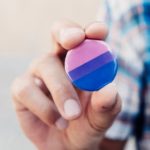 Bisexuality is the romantic attraction, sexual attraction, or sexual behaviour toward both men (males) and women (females). A bisexual person may be attracted to one gender more than another, equally attracted to all genders, or may consider gender unimportant in terms of attraction. Furthermore, a person’s attraction toward one gender or another may shift over time.
Bisexuality is the romantic attraction, sexual attraction, or sexual behaviour toward both men (males) and women (females). A bisexual person may be attracted to one gender more than another, equally attracted to all genders, or may consider gender unimportant in terms of attraction. Furthermore, a person’s attraction toward one gender or another may shift over time.
Though this is changing, bisexual men and women have often been forgotten or seen as an after-thought within the LGBT+ community. This is strange, given it’s the third letter in LGBT!
Bisexual men and women are also characterised as people who don’t exist or are “just going through a phase”, “sexually greedy”, “gay really”, or “can’t make up their mind”. These views are untrue and disrespectful.
Be an ally
- Ask questions, pick up a book, watch a film
- Use inclusive language
- Learn and educate others
- Call out biphobia
- Remember 23 September, Bi Visibility Day
The bisexual flag
The bisexual pride flag was designed by Michael Page in 1998 to give the bisexual community its symbol comparable to the gay pride flag of the larger LGBT community. He aimed to increase the visibility of bisexuals, both among society as a whole and within the LGBT community. The pink represents gay or homosexual attractions, the blue represents attractions to different genders, and the purple (in the middle) represents attraction regardless of sex or gender.
Bisexuality | Wikipedia
23 September: Bi Visibilty Day | Bi Visibility Day Bisexual Man Embraces Sexual Fluidity | ImFromDriftwood | 30 May 2021 | 6m 52s
I’m Bisexual, But I’m Not… | Buzz Feed | 11 Oct 2015 | 2m 5s
Bi the way, we exist | Viet Vu | TEDxTerryTalks | 24 Feb 2015 | 15m 44s LGBT+ Glossary | MEN R US
Check out our awesome glossary of LGBT+ words and terms.
More
A short history of the word ‘bisexuality’ | Stonewall | 31 Jan 2022I make my bisexuality clear to new dates. With most women, that disclosure signals the end | The Guardian | 19 Jul 2021
22 things you should read for bisexual awareness week | Pride | 24 Sep 2018
Is bisexuality real? (Yes, obviously) | Pink News | 28 May 2017
6 Truths of Bisexuality | Huff Post | 23 Oct 2016
13 things never to say to bisexual people | Advocate | 23 Sep 2016
Bisexuality: All you need to know about bivisibility | BBC Newsbeat | 23 Sep 2015
Bi visibility day: 23 September | bivisibility.com Back to top
Trans and transgender
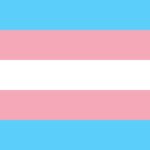 Trans and transgender individuals have a gender identity or gender expression that differs from the sex that they were assigned at birth.
Trans and transgender individuals have a gender identity or gender expression that differs from the sex that they were assigned at birth.
A trans man is a term used to describe someone who is assigned female at birth but identifies and lives as a man. This may be shortened to trans man, or FTM, an abbreviation for female-to-male.
A trans woman is a term used to describe someone who is assigned male at birth but identifies and lives as a woman. This may be shortened to trans woman, or MTF, an abbreviation for male-to-female.
Transitioning are the steps trans people take to live in the gender with which they identify. One person’s transition may vary from another; for some, this involves hormone therapy and surgeries, though not all trans people want or are able to have this. Transitioning can also involve telling friends and family, dressing differently, and changing official documents.
Transphobia is the fear or dislike of someone based on the fact they are trans, including denying their gender identity or refusing to accept it. Transphobia may be targeted at people who are, or who are perceived to be, trans.
“Transsexual” was used in the past as a more medical term (similar to homosexual), but it is outdated and many find its use offensive.
Organisations for transgender and trans people | MEN R US Glossary of terms: Trans and transgender | MEN R USTransgender/ Trans/ Transitioning/ Transphobia/ Transsexual/ Transexual
Be an ally
- Listen to trans people
- Use correct pronouns and state your pronouns
- Use gender-inclusive language and appreciate gender diversity
- Learn and educate yourself
- Recognise that being transgender is not about how someone looks
- When you make mistake: apologise and move on
- Assemble: show up for trans community events
- Call out transphobia
How to be a good trans ally at work | TUC
Gender identity for beginners: a guide to being a great trans ally | Amnesty International UK
A guide to being a trans ally | LGBT Foundation
News and articles
Royal Court play Cowbois aims to put ‘trans joy’ centre stage | BBC | 29 Jan 2024 UK politicians may have contributed to rise in anti-trans hate crime, government confirms | Pink News | 6 Oct 2023Growing number of Brits view trans people negatively, YouGov study finds | PInk News | 11 Aug 2023
Trans guidance is needed in schools, parents tell BBC | BBC News | 13 Sep 2023
Thousands of Catholic nuns unite to ‘wholeheartedly’ declare trans people are beloved by God | Pink news | 5 Apr 2023
Suella Braverman calls on Rishi Sunak to go after ‘trans ideology’ ahead of possible cabinet return | Pink news | 24 Oct 2022
London’s Trans Pride – in pictures | The Guardian | 11 Jul 2022
Farcical Tory leadership contest descends into pathetic anti-trans, gender-critical row | 10 Jul 2022
LGBT groups quit UK conference over failure to ban trans conversion practices | 4 Apr 2022
Trans Day of Visibility: 27 trans and non-binary people who are loud, proud and making change | PinkNews | 31 Mar 2022
The puberty blocker ruling offers trans people hope | Huck | 21 Sept 2021
Cost of changing legal gender cut to less than £10 | BBC News | 7 Apr 2021
Emma Smith: The transgender sports journalist making a career on her own terms | BBC Sport | 31 Mar 2021
Trans Day of Visibility offers chance for community to stand in solidarity and support | The Conversation | 29 Mar 2021
Transgender struggle: ‘I had to keep who I was secret’ | BBC News | 17 Nov 2020
Half of transgender and non-binary people hide their identity at work in fear of discrimination – here’s how you can help | The Conversation | 30 May 2019
Almost half of trans pupils have attempted suicide — schools must do more to challenge gender stereotypes | The Conversation | 15 Nov 2017
5 trans guys who shared their beautiful transition stories to inspire others | Pink News | 21 Sep 2017
Do transgender athletes have an unfair advantage? | The Conversation | 9 Feb 2016 International Transgender Day of Visibility | Wikipedia Back to top
More about gender and sexuality
What can science teach us about gender identity and dysphoria? | AsapSCIENCE ft. Gigi Gorgeous | 20 Sep 2018 | 4m 20sIllustrating Gender | Gerard Coll-Planas and Maria Vidal
Gender and sexuality | Kaleido Quail | Sep 29 2017 | 4m 46s
Finding Identity: An LGBTQ Pastor’s Journey | David Norse | TEDx Talks | 9 Feb 2016 | 20m 6s
Educating kids about gender norms | Elvin Pedersen-Nielsen | TEDx Talks | 19 Jan 2015 | 18m 2s
Gender is not a straight line | Charlie Hobman | TEDx Talks | 24 Jun 2015 | 10m 32s
Emma Watson: HeForShe Campaign 2014 | United Nations | 22 Sep 2014 | 13m 15s
Gender and Sexuality (Animation) | Kaleido Quail | Jul 2014 | 4m 46s
Ending Gender | Scott Turner Schofield | TED Talk | Nov 2013 | 16m 24s
Gender fluidity | Gabrielle Burton | TEDx Talks | 26 Oct 2013 | 17m 37s
Understanding the Complexities of Gender | Sam Killermann at TEDx | 5 May 2013 | 16m 29s
Beyond the Gender Binary | Yee Won Chong | TEDx Talks | 13 Dec 2012 | 10m 43s
Human Sexuality is Complicated | vlogbrothers | 12 Oct 2012 | 3m 48s Back to top
Same sex friendships and crushes
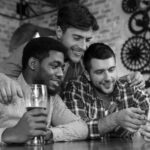 Throughout our lives, it’s not unusual for us to feel drawn to people of our own sex. Particularly when we are growing up, we experience very close friendships or crushes which are often not sexual. We also admire athletes and sports personalities, film and pop stars.
Throughout our lives, it’s not unusual for us to feel drawn to people of our own sex. Particularly when we are growing up, we experience very close friendships or crushes which are often not sexual. We also admire athletes and sports personalities, film and pop stars.
Finding someone attractive or handsome or stunning doesn’t necessarily mean you’re gay, and certainly doesn’t mean you’re odd or weird. For some of us it is an indicator that we are gay or bisexual and, in time, we go on to have relationships with people of the same sex. For others, feelings change and they find that they are attracted to the opposite sex, or even both sexes.
Back to topWhat makes us gay?
What makes us gay?
![WHAT MAKES US GAY [YOU]](https://menrus.wpengine.com/wp-content/uploads/2015/04/WHAT-MAKES-US-GAY-YOU-150x150.jpg) Lots of theories have been put forward as to why we are gay including:
Lots of theories have been put forward as to why we are gay including:
- genetic factors and brain structure
- child-rearing and overbearing parents
- the society and culture we grow up in
Take your pick. Browse the Internet and you’ll find 10 more, some bonkers. Even today, theories are fiercely debated, new ones appear, while others fall away. The nature vs. nurture argument often takes centre stage though genetic factors would seem to be the front-runner.
More importantly, perhaps, does it matter? Or as Albin belts out at the end of Act I of La Cage aux Folles “I am what I am, and what I am needs no excuses.”
Genes and genetic factors
In August 2019, Scientific American reported a new study that claims to dispel the notion that a single gene or handful of genes make a person prone to same-sex behavior. The analysis, which examined the genomes of nearly half a million men and women, found that although genetics are certainly involved in who people choose to have sex with, there are no specific genetic predictors. Yet some researchers question whether the analysis, which looked at genes associated with sexual activity rather than attraction, can draw any real conclusions about sexual orientation.
In December 2017, the New Scientist reported reported that “…for the first time, individual genes have been identified that may influence how sexual orientation develops in boys and men, both in the womb and during life. Alan Sanders at North Shore University, Illinois, and his team pinpointed these genes by comparing DNA from 1077 gay and 1231 straight men. They scanned the men’s entire genomes, looking for single-letter differences in their DNA sequences. This enabled them to home in on two genes whose variants seem to be linked to sexual orientation.”
Scientists quash idea of single ‘gay gene’
In 2019, a vast new study has quashed the idea that a single “gay gene” exists, scientists say, instead finding homosexual behaviour is influenced by a multitude of genetic variants which each have a tiny effect. The researchers compare the situation to factors determining a person’s height, in which multiple genetic and environmental factors play roles. “[This study] highlights both the importance of the genetics as well as the complexity of the genetics, but genetics is not [the] whole story,” said Dr Benjamin Neale, co-author of the study from the Broad Institute in the US.
Scientists quash idea of single ‘gay gene’ | The Guardian | 29 Aug 2019
No one chooses their sexuality
One thing we do know is that no one chooses their sexuality. It is innate and natural to us. Some gay people knew they were different, if not gay, from as young as 5 or 6 while, for most of us, our sexuality is determined by our early teens. Some men have girlfriends, get married and have families before they realise who they are – coming out later on in their life, in their 30s, 40s, 50s, 60s, and even 70s.
Xq28 WikipediaSexual orientation | Wikipedia
Biology and sexual orientation Wikipedia Census to ask about sexual orientation for the first time | The Guardian | 18 Oct 2020
We need to stop using the phrase “coming out” | Mic | 16 Oct 2020
‘Gay gene’ theories belong in the past – now we know sexuality is far more fluid | The Guardian | 30 Aug 2019
What do the new ‘gay genes’ tell us about sexual orientation? | New Scientist | 7 Dec 2017
Does Everybody Have A Gay Gene? | AsapSCIENCE | 27 Jul 2017
Why finding the gay gene is a big problem | Huff Post | 2 May 2017
Male homosexuality influenced by genes, US study finds The Independent | 2 Mar 2015
How our genes could make us gay or straight Washington Post | 4 Jun 2014
The evolutionary puzzle of homosexuality | BBC 18 Feb 2014
Being homosexual is only partly due to gay gene, research finds The Telegraph | 2 Feb 2014 Homosexuality: it’s about survival – not sex | TEDx | 15 Nov 2016 Back to top
Coming out to yourself
I know I am different
 From the day boys are born, society still assumes (though this is changing) they will be heterosexual, have children with a girlfriend or wife, and follow gender orientated work and career paths.
From the day boys are born, society still assumes (though this is changing) they will be heterosexual, have children with a girlfriend or wife, and follow gender orientated work and career paths.
For the first 10 years or so of our lives most of us are encouraged to be heterosexual or straight whether it’s the clothes we are given to wear, the toys we are given to play with, the TV we are allowed to watch, or the male role model our father represents.
Even though much has changed in recent decades, this is underpinned by the ideal of traditional family life, still the backbone of many societies, reinforced by heterosexual stereotyping on TV and in the media.
Assuming and reinforcing a person’s sexual orientation – which has at least 1 in 10 chance of being something else – is confusing and stressful, especially as we hit puberty when hormones rage and emotions surge.
Two stories for you …
There are many coming out videos online today but these thoughtful stories from Tom and Kima are both powerful and moving.
It gets better: Tom from Liverpool | UK | tomtom1854 | 4 May 2011 | 12m 53sComing out story | Kima Ali | US | 2 Feb 2017 | 15m 36s Back to top
Doubt and uncertainty
You don’t choose your sexuality, it chooses you. The journey to understanding and accepting this can be as quick as it can be slow. We may have been attracted to guys for many years before making a more meaningful connection or have only recently begun to question our sexuality as a result of a crush on a friend or a glance on the street that we can’t get out of our mind.
Doubt, uncertainty and questioning is not only usual and common, it’s also healthy. This doesn’t mean that everyone who questions their sexuality in this way is actually gay; some men explore same-sex relationships (or the idea of them) and then decide that they are in fact straight. Some people realise that they prefer people of the opposite sex, while others feel that they prefer people of the same sex. Some people realise that they’re gay later in life, and some know it from an early age.
Back to topGrowing up gay
 For some young gay or bisexual people, adolescence can be a particular time of anxiety and fear and may later look back on this part of their lives with sadness and regret.
For some young gay or bisexual people, adolescence can be a particular time of anxiety and fear and may later look back on this part of their lives with sadness and regret.
Even though it is easier for successive generations to question one’s sexuality and come out – with a ton of books, films and role models to support us along the way – gay teenagers can become painfully aware that they are not like other people and many become withdrawn and lonely, convinced that only they are feeling this way.
We learn to hide our true feelings or act as others want us to, for fear of being ostracised, ridiculed or rejected by loved ones and friends. Above all, there can be a sense that we are somehow different, that we are abnormal and that we are going to disappoint people.
Some people (still) believe that if they get married to the opposite sex their gay feelings will disappear though (thankfully) this happens much less often today. This stores up a great deal of stress and anxiety for their later years. Breaking out of a clearly defined role, or even attempting to shift the definition of it, involves tremendous courage and strength. The conflict between the relationship with a spouse and family and the need to be true to oneself can be enormous.
Back to topHow many gay people are there in the UK?
 MEN R US first posted this content in 2015. However, the 2021 Census included data on gender identity and sexual orientation, which has been released for the first time. For comparison, we have purposefully kept what we originally wrote (the one in ten per cent rule and estimates), adding key data takeaways from the 2021 Census below.
MEN R US first posted this content in 2015. However, the 2021 Census included data on gender identity and sexual orientation, which has been released for the first time. For comparison, we have purposefully kept what we originally wrote (the one in ten per cent rule and estimates), adding key data takeaways from the 2021 Census below.
The ‘one in ten rule’, and estimates
A ‘one in ten rule’ has long held in popular culture as a ‘reliable guesstimate’ of homosexuality rates. With a UK population of just over 66 million, this means there would be around 6.6 million who are gay, lesbian or bisexual. However, this is unlikely.
However, percentages (%) vary. Referencing the Public Health England report: Producing modelled estimates of the size of the lesbian, gay and bisexual (LGB) population of England (2019).
- The figure most regularly quoted in the media comes from the UK Department of Trade and Industry, which estimated the size of the LGB population to be between 5-7% of the total adult population in 2003. This figure was based on a general review of surveys from Europe and the US that looked at sexual preferences, including behaviour and attraction. [1]
- However, recent UK national surveys that asked specifically about self-reported sexual identity have reported lower figures, among which the ONS Integrated Household Survey of 2014 is probably the most comprehensive; with a reported 1.9% of the population self-identifying as LGB or ‘other’ [2]
- The National Survey of Sexual Attitudes and Lifestyles (NATSAL) Wave 3 of 2010-2012 reported 2.7-2.8% of the population self-identifying as LGB or ‘other’, and this is the only national survey that included questions on sexual behaviour and attraction in addition to identity have reported lower figures, among which the ONS Integrated Household Survey of 2014 is probably the most comprehensive; with a reported 1.9% of the population self-identifying as LGB or ‘other’.[3]
- In 2015, LGB estimates of Greater London GP Patient Survey reported 5.1% and LGB estimates of Greater Manchester GP Patient Survey reported 3.6% though MEN R US would like to note that many LGBT+ people gravitate to larger towns and cities. [4]
Taking an average of these percentages (3.5%) and a UK population of 66 million, you are looking at around 2.31 million LGB people. What is deeply shocking, however, is the absence of data for trans people.
Census key data takeaways | 2021
- On gender identity: 45.7 million (94.0% of the population aged 16 years and over) answered the question “Is the gender you identify with the same as your sex registered at birth?”. 45.4 million answered “Yes” and 262,000 answered “No”. The remaining 2.9 million (6.0%) did not answer the question.
- Those who reported that their gender identity was different from their sex at birth was 0.55% in England and 0.40% in Wales. Within England, London was the region with the highest percentage who reported that their gender identity was different from their sex at birth while the region reporting the lowest percentage was the South West (0.42%). As the question was voluntary, analysis should take into account differences in response rates between different areas.
- 44.9 million people (92.5% of the population aged 16 years and over) answered the question on sexual orientation. Around 43.4 million people (89.4%) identified as straight or heterosexual. Around 1.5 million people (3.2%) identified with an LGB+ orientation (“Gay or Lesbian”, “Bisexual” or “Other sexual orientation”). The remaining 3.6 million people (7.5%) did not answer the question.
- The data showed few differences between England and Wales with respect to the proportion of respondents identifying with LGB+ orientation, but again it must be noted that answers were provided voluntarily. The English region with the highest proportion of people reporting LGB+ orientation was London (4.3% of the total number of respondents over the age of 16).
Estimating the size and composition of the lesbian, gay, and bisexual population in Britain | 2009
There is no reliable current information on the size of the LGB population.
- Estimates range from 0.3% to 10% using different measures and sources. None of these estimates correct for the possibility of higher than average rates of non-reporting and misreporting among LGB people.
- The only official estimate of 5-7% by the Department of Trade and Industry, is based on a wide set of published sources drawn from a range of national settings and using various dimensions of sexual orientation.
- The size of the LGB group in ten government and other social surveys based on identity questions indicates a range of 0.3% to 3% and around 2% in population-based surveys.
- The four ONS Omnibus Survey trials give findings of 1.4% to 2.5% LGB or 1.9% in the first three trials combined.
- The Citizenship Survey gives a lower proportion of 1.5%.
- Other sources have estimated the population to be 14% as high as 10%. None of these surveys provides an adequate basis for estimating the true size of the LGB population of GB.
Equality and Human Rights Commission Research report 37, pg. 13-14 Census 2021 data on gender identity and sexual orientation released for the first time | UK Data Service
Sexual orientation, England and Wales: Census 2021 | Office of National Statistics
Demographics of sexual orientation | Wikipedia Census data reveals LGBT+ populations for first time | BBC News | 7 Jan 2023
Sexual orientation census undercounts older people and those who shun labels | The Guardian | 6 Jan 2023
Sexual orientation, UK: 2017 | Office of National Statistics | 21 Jan 2019
EuroClinix survey: how many gay and bisexual people are in the UK? | Pink News | 16 Nov 2018
Size of the lesbian, gay and bisexual (LGB) population of England | Public Health England | Jan 2017
Gay Britain: what do the statistics say? The Guardian | 3 Oct 2013
[1] Final regulatory impact assessment: Civil Partnership Act 2004. London: Department of Trade and Industry, 2003.
[2] Statistical bulletin: Integrated Household Survey (Experimental statistics): January to December 2014. Office for National Statistics, 2015.
[3] Mercer CH, Tanton C, Prah P, Erens B, Sonnenberg P, Clifton S, et al. Changes in sexual attitudes and lifestyles in Britain through the life course and over time: findings from the National Surveys of Sexual Attitudes and Lifestyles (Natsal). The Lancet. 2013;382(9907): 1781-94. 10.1016/s0140-6736(13)62035-8
[4] Referencing the Public Health England report: Producing modelled estimates of the size of the lesbian, gay and bisexual (LGB) population of England (2019). pg 25, boxes 1 and 2.
Back to top
Why do I want to come out?
 This is the most important question to ask yourself. If you answer something like…
This is the most important question to ask yourself. If you answer something like…
- “Because I’m proud of who I am”, or
- “It is impossible to be fully happy if my sexuality remains hidden” or
- “I want to meet other gay people like me”
… then these are good reasons. If you’re doing it principally to shock or hurt people, think again. The person who gets hurt could be you.
Benefits of coming out
- A relief to unload the secret you have been keeping
- You no longer have to live a lie and can live as you want to live
- Feel better about yourself and improve your confidence and self esteem
- Develop closer, more genuine relationships with friends and family
- It can be easier to make gay friends, date and have relationships
- You won’t be afraid of people finding out any more
- All of the above will not happen at once
Considerations when coming out
- Not everyone will be understanding or accepting
- There may be negative reactions and/ or rejection
- People may treat you differently
- People may not listen, understand or take what you are saying seriously
- People may try talk you out of it
- Your personal safety may be at risk
Coming out to yourself
 Acknowledging that you are gay can take days, weeks, months, years or, in some cases, never. Some of us probably hoped these feelings were ‘just a phase’. In time, we realise that these feelings are not going to go away and we have to find a way of accepting them and dealing with the fact that we are sexually attracted to members of our own sex. This realisation is the first stage of coming out.
Acknowledging that you are gay can take days, weeks, months, years or, in some cases, never. Some of us probably hoped these feelings were ‘just a phase’. In time, we realise that these feelings are not going to go away and we have to find a way of accepting them and dealing with the fact that we are sexually attracted to members of our own sex. This realisation is the first stage of coming out.
There is no hard and fast rule when this point is reached. It’s your life so take your time – do things for yourself and only when you are ready. There are several stages in the process of coming out. The fact that you are reading these words may be a starting point so we encourage you to read, browse and click away.
For some, coming out happens in their teens, for others it may be later in life. Some people describe this time of accepting their sexuality as like riding an emotional roller-coaster. One day they feel happy and confident and ready to tell everyone; the next they feel confused, scared and relieved that they didn’t. You may want to talk to someone who understands what this is like. It’s a nerve-racking time – the fear of rejection can feel immense.
Back to topComing out stories
Story LGBT
“We are a group who are, or know of someone that is part of the LGBT community. We know how difficult, inspiring, relieving, uplifting, and isolating the process can be. We created this space so people can share stories, in hope to make the process easier. We hope that the stories we collect will help these individuals come to terms with their identity and understand that they are not alone.”
Story LGBT | Story LGBT
When I Came Out
“Every day across the world, people are coming out — to themselves, to friends, to family, to strangers, as gay, bisexual, transgender, questioning. And every story is unique. Some are funny. Some are disappointing. Some are inspiring. Some are heartbreaking.”
When I Came Out | When I Came Out
I’m From Driftwood
I’m From Driftwood aims to help LGBTQ people learn more about their community, straight people learn more about their neighbours and everyone learn more about themselves through the power of storytelling and story sharing.
I’m From Driftwood | I’m From Driftwood
Coming Out Stories
A wide selection of coming out stories from the Huffington Post.
Coming Out Stories | Huffington Post
Understanding | Terry Rayment | Kodak | 19 Dec 2016 | 3m 0s
“Amid the DIY digital age, it’s often difficult to remember the beauty of a 35mm film. Kodak teamed up with director Terry Rayment and cinematographer Kate Arizmendi to tell a beautiful story with a forgotten medium. The short film, “Understanding”, was shot with a KODAK VISION3 500T 5219.” Out | Glenn Garner | 23/12/16. “The film chronicles the relationship between a teenaged boy and his father as he struggles to accept his son’s homosexuality, speaks to the brand’s willingness to share socially relevant stories that have the power to spark change. Captured as a powerful and poignant slice of life, “Understanding” communicates the values of acceptance and equality.” Shoot Publicity Wire | 27/12/16
When I came out, I wasn’t ready for the judgment
Why would a group of people who have historically experienced so much shame and stigma from society dole out that same kind of punishment to each other?
When I came out, I wasn’t ready for the judgment that came from within the community | Zach Rawlings | 1 Aug 2019
How coming out and hating your body are linked
How coming out and hating your body are linked | Zach Rawlings | 31 Jan 2019
When self-acceptance comes with a side of self-hatred.
Coming out stories online
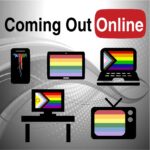 There are many heartfelt and thoughtful coming out stories. Here are a few which have caught our eye … a selection we pulled together in 2015 when we launched this website.
There are many heartfelt and thoughtful coming out stories. Here are a few which have caught our eye … a selection we pulled together in 2015 when we launched this website.
There have been a ton of coming out stories since then. Don’t be put off that some are a few years old as the issues are surprisingly similar across decades and generations.
However, we would like to make the point that you are not obliged to make a video. It’s not a required coming out rite of passage … and just because ‘everybody’ else seems to be doing it doesn’t mean you have to.
Coming out should be about you, on your terms, and your journey. So please think carefully before jumping out of the closet onto YouTube!
Tom, UK | 4 May 2011 | 12m 53s (Minor Sound Sync Issue)Connor Franta, US | 8 Dec 2014 | 6m 27s
Troye Sivan, US | 7 Aug 2013 | 8m 17s
Mark Ludford, UK | 26 Aug 2014 | 6m 36s
Nathan Henderson, US | 3 Aug 2014 | 15m 21s
Ian McKellen, UK | Anderson Live | 14 Dec 2012 | 2m 13s
Mandeep Jangi, US | I’m From Driftwood | 13 Aug 2014 | 4m 54s
Jonny Benjamin, UK | 29 Sep 2014 | 2m 48s
Tom Wicker, UK | I’m From Driftwood | 30 Jul 2014 | 5m 29s
And for a something a little less usual there’s:
My Coming Out Story | Ivan Cruz | 23 Jan 2014 | 6m 31s Back to topThe end of coming out?
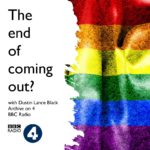 Dustin Lance Black asks whether LGBTQ+ people still need to come out publicly.
Dustin Lance Black asks whether LGBTQ+ people still need to come out publicly.
“The journey of coming out has long been a rite of passage for LGBTQ+ people. For some, it’s an empowering opportunity to be true to oneself, friends and family. It also has a social purpose. With increased visibility of LGBTQ+ people, the argument goes, comes greater social acceptance. Coming out stories also help bind the community together. But some LGBTQ+ people are choosing alternatives to the public coming out announcement. They argue that a romanticisation of coming out within the LGBTQ+ community puts pressure on those for whom coming out remains difficult or even dangerous. Others question whether coming out publicly as LGBTQ+ is even necessary anymore.
Dustin Lance Black, the screenwriter of Milk, charts the history of coming out as LGBTQ+, from the early gay demonstrations of the 60s and 70s to the watershed coming out moments of celebrities including Sir Ian McKellen, Ellen DeGeneres, and Caitlyn Jenner. Dustin also hears from a younger generation of LGBTQ+ people, to find out how social media has altered what it means to come out about their sexual orientation or gender identity. And he asks whether there will ever come a time when LGBTQ+ people no longer need to come out.”
The end of coming out? | BBC Radio 4 | 15 Aug 2020 | 56m 39s Back to topOut and proud people
 Once considered a potential career-ending showstopper, a growing number of celebrities, professionals, and sportspersons have come out as gay and lesbian… and continue to do so.
Once considered a potential career-ending showstopper, a growing number of celebrities, professionals, and sportspersons have come out as gay and lesbian… and continue to do so.
List of notable gay, lesbian or bisexual people Wikipedia
List of notable gay sports men and women Wikipedia Celebrities who came out as LGBTQ in 2018 | Gay Times | 21 Dec 2018
Rainbow List 2015 Stonewall Back to top
Coming out films
There are a ton of sensitively well-told coming out stories, and these are the films that have caught our eye. Sometimes you have to look past the ridiculously good looks but, hey, that’s film making. Don’t be put off that some of them are a few years old (!) as the issues are surprisingly similar across decades and generations. And if you don’t like subtitles: please get over it. It’s so worth it!
- The Way He Looks (Trailer) POR | 2014 | Peccadillo Pictures [15]
- Just a Question of Love (Trailer) FRA | 2000 | Millivres Multimedia [15]
- Free Fall (Trailer) GER | 2013 | Peccadillo Pictures [15]
- Make the Yuletide Gay (Trailer) USA | 2009 | TLA Releasing [15]
- Balls (Trailer) GER | 2005 | Peccadillo Pictures [15]
- Latter Days (Trailer) USA | 2005 | TLA Releasing [15]
- Shelter (Trailer) USA | 2007 | here! Films [15]
- Defying Gravity (Trailer) USA | 2010 | Millivres Multimedia [15]
- My Beautiful Laundrette (Trailer) GBR | 1985 | Working Titles [15]
- Beautiful Thing (Trailer) GBR | 1996 | Channel 4 Films [15]
- Mulligans (Trailer) 27 Aug 2014 | 3m 9s
Fifteen other gay films, not necessarily about coming out
Here are 15 films in no particular order which have caught our eye. We don’t critique films for a living and, before you start squeaking “foul”, we’re not including “Love Simon”‘, “Call Me By Your Name”, or “Brokeback Mountain”. Enough already. MEN R US also has sections on films here (under LGBT Arts) and here. (under Coming Out films).
- Akron | 2017 | Trailer
- We Were Here | 2011 | Trailer
- The Way He Looks | 2014 | Trailer
- Pride | 2014 | Trailer
- Weekend | 2011 | Trailer
- Getting Go: The Go Doc Project | 2014 | Trailer
- Four Moons | 2016 | Trailer
- Five Dances | 2013 | Trailer
- Moonlight | 2017 | Trailer
- God’s Own Country | 2017 | Trailer
- Lilting | 2014 | Trailer
- Drole De Felix | 2000 | Trailer
- Just a Question of Love | 2006 | Trailer
- The Broken Hearts Club | 2000 | Trailer
- Carandiru | 2004 | Trailer
Coming out to others
Coming out of the closet
 When we disclose or tell others that we are gay, the phrase associated with this process is ‘coming out of the closet’ or ‘coming out’ as a figure of speech. Who you tell is really up to you. You may decide to tell your best friend or a member of your family. Remember, once you have told someone about your sexuality it can become known to others within a short period. This is human nature and there is very little you can do to prevent it. Be prepared to deal with any negativity that this disclosure may bring.
When we disclose or tell others that we are gay, the phrase associated with this process is ‘coming out of the closet’ or ‘coming out’ as a figure of speech. Who you tell is really up to you. You may decide to tell your best friend or a member of your family. Remember, once you have told someone about your sexuality it can become known to others within a short period. This is human nature and there is very little you can do to prevent it. Be prepared to deal with any negativity that this disclosure may bring.
Where did the phrase come from?
The word ‘closet’ was first used to mean secret, as early as the 1600s. but not in relation to a person’s sexuality. ‘Closeted’ also came into use around the same time and meant to keep something hidden or secret from others. ‘Closet case’, ‘closet queen’, or ‘closet homosexual’ began to be used during the middle of the 20th century to mean that someone was hiding their homosexuality from others.
According to the Oxford English Dictionary, the first printed use of the term ‘coming out of the closet’ to describe declaring one’s sexuality, was written by Sylvia Plath in the January 16, 1963 issue of London Magazine. It is also believed to be the first time that these two terms were combined into one phrase, and a new meaning was born.
By the 1970s ‘coming out the of closet’ had come into common usage and ‘come out’ or ‘coming out’ was often used as a shortened version of this longer phrase, although ‘coming out’ can also be a reference to the social custom of a débutante coming out as mentioned above.
‘Come out’, ‘coming out’, and ‘coming out of the closet’ are terms that are now mostly used in reference to a person telling family members, friends, co-workers, or others that they are gay, lesbian, bisexual, or transgender. Our language and the meanings of words are constantly changing and evolving, just as our society changes and evolves.
Sources: Dictionary of American Slang, 3rd ed., HarperCollins Publishers, New York, 1997. The Oxford English Dictionary, 2nd ed., vol. III, Clarendon Press, Oxford, 1989. The Queen’s Vernacular: A Gay Lexicon, by Bruce Rodgers, Straight Arrow Books, San Francisco, 1972. Word’s Out: Gay Men’s English, by William L. Leap, University of Minnesota Press, Minneapolis, 1996.
Raised In The Closet | Josh’s Big Gay Blog | 13 Feb 2021 My coming out story | IHEIN | 20 Jul 2021 | 10m 36s The Beach | Three Flying PIglets for MEN R US | 2017 | 31s Back to topWho should I tell first?
 Many gay people describe how important it is to tell someone outside the family first. However, while there have been some moving coming out ‘live’ moments on YouTube we don’t recommend this is where you come out first. Make sure it’s someone you trust and whom you believe to be open-minded and supportive.
Many gay people describe how important it is to tell someone outside the family first. However, while there have been some moving coming out ‘live’ moments on YouTube we don’t recommend this is where you come out first. Make sure it’s someone you trust and whom you believe to be open-minded and supportive.
Think carefully if you decide to confide in a teacher at school – they may be obliged to tell someone else what you have told them. Find out the school policy on confidentiality before you go ahead.
If you have decided to tell your family it may be easier to talk to one parent before the other. You could then ask them for help in approaching the other.
Sometimes brothers and sisters are a good starting point as they are likely to understand more about homosexuality or bisexuality. Make sure you understand why you are going to tell them. One of the best reasons to come out to your family is to become closer to them.
There are a number of typical responses that parents, particularly, are known to say:
- “How can you be sure?”
- “I went through a phase like this at your age.”
- “You’ll grow out of it.”
- “You haven’t tried hard enough with the opposite sex.”
- “How can you know at your age?”
Perversely, at the one time you need support and acceptance you may find yourself defending who you are. It may come as a shock if whomever it is you tell may say the strangest and most hurtful things. Be prepared for this and perhaps practice answering the above responses.
It’s definitely worth thinking about how you respond to these questions before you tell anyone. You might find it helpful to discuss these questions first with a trusted friend or a lesbian and gay helpline or switchboard.
Back to topWhere, when and how
- Choose somewhere neutral and safe
- Make sure you have time to sit down quietly together with plenty of time to talk
- Try not to over-script or sound too formal or give too much information at once
- Try to be calm and be non-confrontational
- Remember that this might be the first time they have thought of you this way
- Their first reaction might not be how they actually feel
- Remember that it probably took time for you to come to terms with it
- If the person you want to tell is stressed or tired it may be a good idea to delay
- Remember to also listen to what others have to say
- Give people a chance to think, and process and have time to get used to it
Things people say
 When you come out to someone or say you are questioning your sexuality, people can come out with some rubbish. It usually comes from a place of love (yawn) but responses can range from the thoughtful and supportive to thoughtless and downright insulting. In no particular order, here are our top 20:
When you come out to someone or say you are questioning your sexuality, people can come out with some rubbish. It usually comes from a place of love (yawn) but responses can range from the thoughtful and supportive to thoughtless and downright insulting. In no particular order, here are our top 20:
- “You’re just going through a phase.”
- “Are you the man or woman?”
- “You can’t be gay – I’ve seen your dick.”
- “What will the neighbours say?”
- “So what about grandchildren?!”
- “You’re just confused.”
- “You need counselling.”
- “Go to church and God will love you.”
- “When did you choose to be gay?”
- “Have you got AIDS yet?”
- “I don’t see any make-up?”
- “You can’t be gay; you’ve had girls.”
- “Do you really want to be gay?”
- “Have you had bum sex?”
- “Which do you like better, men or women?”
- “We can go shopping.”
- “I love gay people, really.”
- “Don’t tell anyone!”
- “Some of my best friends are gay!”
- “Did you touch that biscuit?”
Gus Kenworthy shares the 8 things you should never say to your gay friends | Teen Vogue | 23 Nov 2015 | 2m 59s Back to top
Bad coming out experience?
 There’s no getting around it but sometimes the first person you tell and confide in is not there for you, becoming hostile, argumentative unkind, even violent.
There’s no getting around it but sometimes the first person you tell and confide in is not there for you, becoming hostile, argumentative unkind, even violent.
Get help and support now!
You may feel hurt, vulnerable and lonely but there are some truly great organisations who are there for you.
- Switchboard GBT+ Helpline 0345 3 30 30 30 (10am-11pm),
- LGBT Foundation 0300 330 0630 (10am-10pm daily)
- Albert Kennedy Trust 020 7831 6562 (up to the age of 25)
- Samaritans 0845 7 90 90 90 (24/7)
- If you feel unsafe, can you stay with a friend or other family member (even if you don’t tell them why)?
- If you are in imminent danger or in fear of your life call 999. No ifs or buts.
Support for your family
This can be a difficult and traumatic time for some members of your family. You may feel unable to answer all their questions or to deal with all of the issues that come up for them. They, in turn, may not feel comfortable talking about homosexuality or bisexuality with you.
This can be a difficult time if your happiness is dependent to some degree on your family’s reaction. If this is the case for you, we would advise that you talk it over with someone who has been through it already.
Families and Friends of Lesbians and Gays (FFLG)Switchboard LGBT+ Helpline
If it’s not gay, it’s not gay
If it’s not gay, it’s not gay | Rainbow Youth (New Zealand) | 1 Oct 2017 | 30s
Back to topComing out wisdoms
 Coming out is rarely all good or all bad
Coming out is rarely all good or all bad- Don’t let anyone pressure you into coming out
- Don’t lose sight of your own self-worth
- Be prepared for any reaction
- Be prepared that once you start to tell people others might find out quickly
- Give others time to process – after all, you may have given yourself time (perhaps years) to get used to the idea
- Be clear about your own feelings about being gay
- If you are still having doubts, or if you’re feeling depressed or guilty, it may be best to get some support first, perhaps from a counsellor or telephone support line
- Don’t come out during an argument or use your sexuality to hurt or shock
- Get support before coming out from a local support group or trusted friend or relative
- Don’t come out when you’re drunk (or have taken other drugs)
- Tell them that you’re still the same person as you were yesterday
- Have with you sources of support; eg: leaflet or helpline number
- If you decide to tell school friends make sure that you can trust them and that they’ll be supportive
- If you decide to tell a teacher or counsellor at school or college check out their confidentiality policy first
I was actually being honest with myself for the first time. (Gay man comes out to wife and kids) | ImFromDriftwood | 30 Oct 2018 | 3m 45s Back to topExtract from “Call Me By Your Name” Elio’s father speaks to him.
“You had a beautiful friendship. Maybe more than a friendship. And I envy you. In my place, most parents would hope the whole thing goes away, or pray that their sons land on their feet soon enough. But I am not such a parent. In your place, if there is pain, nurse it, and if there is a flame, don’t snuff it out, don’t be brutal with it. Withdrawal can be a terrible thing when it keeps us awake at night, and watching others forget us sooner than we’d want to be forgotten is no better. We rip out so much of ourselves to be cured of things faster than we should that we go bankrupt by the age of thirty and have less to offer each time we start with someone new. But to feel nothing so as not to feel anything – what a waste! How you live your life is your business. But remember, our hearts and our bodies are given to us only once. Most of us can’t help but live as though we’ve got two lives to live, one is the mockup, the other the finished version, and then there are all those versions in between. But there’s only one, and before you know it, your heart is worn out, and, as for your body, there comes a point when no one looks at it, much .less wants to come near it. Right now there’s sorrow. I don’t envy the pain. But I envy you the pain.”
Call Me By Your Name by André Aciman | Atlantic Books
You've told someone you're gay
 You are either balancing on the edge of an erupting volcano or dancing with joy on the moon – or both!
You are either balancing on the edge of an erupting volcano or dancing with joy on the moon – or both!
Even if the experience wasn’t as you expected, people describe a huge weight being lifted from their shoulders, of feeling euphoric and giggly and childlike again. Don’t feel guilty about it – go on and enjoy yourself, you deserve it.
The thrill of revealing something long kept hidden can give a tremendous sense of relief. Use this new-found energy wisely and remember that close friends and family may be worried that you have changed out of all recognition.
A Great Big World – Boys In The Street (Official Video) | A Great Big World | 23 Jun 2021 | 3m 40s
In a Heartbeat | Beth David and Esteban Bravo | 31 Jul 2017 | 4m05s
Reassure them
Reassure them that nothing has really changed, only their perception of you. In fact after a while they may even realise that the ‘new’ you is better than the ‘old’ you. Most people will experience many positive reactions. For example, ‘We’re so pleased you could tell us’ or ‘Well, we had already guessed and were just waiting for you to say something’.
Some gay people have also met with the response, ‘So am I’. Equally, if it hasn’t gone too well – don’t lose heart.
Time is a great healer
Time is a great healer and things will get better. If you are experiencing rejection from close friends, ask yourself whether they were really so close if they couldn’t support you through this important part of your life? If your family is reacting badly, this is normal. They may be experiencing a whole range of emotions including shock, grief, guilt, blame, disappointment and lots of pain. Remember how long it took for you to come to terms with being gay.
Many parents will feel a loss in some way – perhaps of future grandchildren or weddings and other family gatherings. This can blur their happiness and their love for you. Here are a few examples of how parents and family can react negatively:
- “My parents refused to talk about it. They dismissed it and said they didn’t want the subject brought up again. I decided that I was going to continue to live my life as a gay man. I stopped going home as often as I used to and attending family occasions. It is only now, three years later, that they have begun to broach the subject with me.”
- “My family say that they accept that I am gay but they don’t want to see me being affectionate with another man. They say that they won’t be able to cope with it.”
- “I was at a wedding recently and everyone was there with their partners. I was upset that I couldn’t bring mine. Everyone asked the usual embarrassing questions about girlfriends and I just had to smile and make excuses. I didn’t want to row with my family about it, but it’s just not fair.”
At the end of the day, your parents are still your parents and, in time, few reject their children because they are gay. If they go quiet on you, give them time to react and think about what you have told them. If they ask lots of questions, it’s a good sign. It may help to think of it as though it is in your interests to respond to them – they are likely to be the same ones that you have asked yourself many times along the way.
If things are so bad that you feel like giving up with the whole process of coming out, it’s important to talk to someone about your fears and concerns. It’s probably better to persevere and keep going – after all, you have come this far and in many ways it would be difficult or impossible to go back now. The next person you talk to will probably give you a huge hug and say that they were relieved that you had found the courage to tell them, and that they had suspected that something may have been on your mind for a long time.
Understanding | Terry Rayment | Washington Reader Award 2016Back to top“It wasn’t easy telling my family that I’m gay. I made my carefully worded announcement at Thanksgiving. It was very Norman Rockwell. I said, “Mom, would you please pass the gravy to a homosexual?’ She passed it to my father. A terrible scene followed.”
Bob Smith, American comedian and author
When shall I tell them?
 As with everything in life, timing is everything. Choose the moment carefully – do it when you (and they) have lots of time – not last thing at night when you are likely to be more tired and emotional. Think about the way you are feeling, allowing for nerves, which are perfectly natural under the circumstances.
As with everything in life, timing is everything. Choose the moment carefully – do it when you (and they) have lots of time – not last thing at night when you are likely to be more tired and emotional. Think about the way you are feeling, allowing for nerves, which are perfectly natural under the circumstances.
Don’t do it if you are feeling angry or emotionally sensitive – this will affect what you say and how you say it. For obvious reasons don’t do it when you are drunk (even if you think you need a drink to steady your nerves). And remember – only when you are good and ready.
A friend once said that he knew he was ready to tell his family only when he realised that, if he had to, he could live without their support. Fortunately for him (and his family) this didn’t happen.
Back to topTelling someone you're gay
There is no rule that says you have to sit down and talk to others about this; there are other ways. You might like to write to people first and give them time to react in their own way. This is probably a better approach if, for example, you live a long way from your family or friends. Remember that you have probably taken a long time to get used to the idea yourself, and others might need the same amount of time.
Writing a letter allows you to take your time and to compose your thoughts carefully and clearly. It can also give the person you are writing to space to react and consider the news before discussing it with you. This could be a useful approach if you are expecting a hostile or negative reaction.
If you decide to talk face to face, remember not to rush it or to do it when one of you is in a hurry or distracted. It probably won’t help to memorise a script either – you can guarantee that some people do not respond in a predictable manner. If you are worried about their reaction, tell them of your fears and that you don’t want to hurt them but need to be honest with them.
Remember to listen to what they have to say – it should be along the lines of a chat; try not to make it a speech or a performance!
Grotto | Dave Scala | 5 Jun 2013 | 6m 53s Back to topYour doctor and dentist
This content was moved to BODY in March 2024.
Your GP and dentist Back to topComing out at school
- thinking about coming out at school
- worried about coming out at school
- coming out at school
- being forced or bullied to come out at school
then you should find all the help and support you need in YOU.
Don’t forget there is online help and support, there are telephone helplines if you want to talk, and we’ve helpful stuff on bad coming out experiences and bullying at school.
And three things to remember:
- you are not alone
- there is help and support for you
- you’re fabulous!
Coming out at work
 Some of us prefer not to discuss our personal lives at work – it’s got nothing to do with why we’re there and it’s as straightforward as that. However, human nature being what it is, colleagues often guess or find out, particularly if you don’t talk about ‘her’ or get involved in the ‘who shagged who on Saturday night’ office gossip. For other guys, feeling able to be themselves and chat about what they did at the weekend – perhaps with a boyfriend – is an important part of who they are.
Some of us prefer not to discuss our personal lives at work – it’s got nothing to do with why we’re there and it’s as straightforward as that. However, human nature being what it is, colleagues often guess or find out, particularly if you don’t talk about ‘her’ or get involved in the ‘who shagged who on Saturday night’ office gossip. For other guys, feeling able to be themselves and chat about what they did at the weekend – perhaps with a boyfriend – is an important part of who they are.
While it may be possible to gauge the kind of response you’ll get, the only way to find out for certain is to come out again – but, in this instance, to the people you work with. Furthermore, there are some circumstances where coming out can seriously affect your job security and promotion prospects. The bottom line is being careful and seeking advice first.
Equality Act 2010
The Equality Act 2010 protects lesbian, gay, bi and trans people from direct discrimination, indirect discrimination, harassment and victimisation at work. It applies to anyone who is perceived to be lesbian, gay, bi or trans, or anyone who experiences discrimination because they associate with LGBT people.
What is the Equality Act? | Equality and Human Rights CommissionUnions
In a nutshell, trade unions represent people at work. They protect their members, making sure that workplaces are safe, and that pay is fair. For these reasons join one, but particularly if you experience discrimination, harassment or unfavourable treatment at work. There are many trade unions in the UK but here are a handful you may have heard of:
- Unite is Britain’s biggest union with 1.42 million members in every type of workplace
- Unison represents public services staff, although they may be employed in both the public and private sectors
- National Union of Teachers (NASUWT) represents teachers in the UK
- National Union of Students (NUS) is a confederation of 600 students’ unions, representing the interests of more than 7 million students
- Royal College of Nursing (RCN) represents nurses
- British Medical Association (BMA) is the trade union and professional body for doctors in the UK
Earlier this month the chief of MI6 issued a public apology for the historic treatment of LGBT employees. Until 1991, there was a ban on openly gay staff serving inside the intelligence agencies, which Richard Moore called “wrong, unjust and discriminatory”. One former member of MI6, who is gay and served before the ban was lifted, tells the BBC that the apology was welcome but overdue.
Owain Wyn Evans: ‘I had to go back in the closet for first TV job’ | BBC News | 22 Feb 2021
Challenges for LGBT people in the workplace and how to overcome them The Guardian | 28 Jul 2014
LGBT employees who feel unable to come out at work more likely to leave their jobs – and cost business millions The Independent 3 May 2015 Back to top
Coming out in the Gypsy Roma Traveller communities
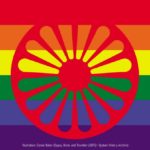 LGBT+ issues are largely a taboo subject within Gypsy Roma Traveller (GRT) communities which leads to LGBT+ GRTs often feeling isolated. Many hide their sexual identity fearing rejection by family and their community, others because of family pressure and religious beliefs which is why they conform to tradition, get married and have children.
LGBT+ issues are largely a taboo subject within Gypsy Roma Traveller (GRT) communities which leads to LGBT+ GRTs often feeling isolated. Many hide their sexual identity fearing rejection by family and their community, others because of family pressure and religious beliefs which is why they conform to tradition, get married and have children.
There is no research or statistics to refer to in evidencing the hidden problem of homophobia within the Gypsy Roma Traveller communities against their own LGBT+ community but this indicates how taboo and hidden the problem is. From casework engagement with the wider Gypsy Roma Traveller NGO sector and other stakeholder groups the Traveller Movement are acutely aware this is a real but hidden issue within the Gypsy Roma Traveller community. The shame and guilt inflicted on LGTB+ community members has and can force many to live their lives in total denial, in secret and fearing for their health and wellbeing.1
Getting the language right
The term Gypsy, Roma and Traveller has been used by policy-makers and researchers to describe a range of ethnic groups or those with nomadic ways of life who are not from a specific ethnicity. In the UK, it is common to differentiate between Gypsies (including English Gypsies, Scottish Gypsy/Travellers, Welsh Gypsies and other Romany people), Irish Travellers, who have specific Irish roots, and Roma, understood to be more recent migrants from Central and Eastern Europe. In continental Europe, however, all groups with nomadic histories are categorised as “Roma”, a much broader term that, while it includes Gypsies and Irish Travellers, is not the way in which most British communities would identify themselves.
The term Traveller can also encompass groups that travel, including, but not limited to, New Travellers, Boaters, Bargees and Showpeople. While these communities share many of the barriers faced by people who are ethnically Gypsy, Roma and Irish Traveller, covering all these groups in a single inquiry would not do justice to their needs. Our hope is that the recommendations in this report will benefit not only those that are in the three groups we have focussed on but everyone who travels or is not a part of the settled community.
We asked many members of the Gypsy, Roma and Traveller communities how they preferred to describe themselves. While some find the term “Gypsy” to be offensive, many stakeholders and witnesses were proud to associate themselves with this term and so we have decided that it is right and proper to use it, where appropriate, throughout the report. We also heard many other terms used to refer to the Communities that are completely unacceptable and hate speech will be explored in Chapter 6 of this report.
Gypsies and some Traveller ethnicities have been recognised in law as being ethnic groups protected against discrimination by the Equality Act 2010.1 Others, such as New Travellers, have either been deemed not to be protected or have not tested their rights in court. Migrant Roma are protected both by virtue of their ethnicities and their national identities.
As the inquiry progressed, we heard evidence that suggested to us that migrant Roma communities face inequalities that are very different to those faced by Gypsies and Travellers. Therefore, Chapter 7 of this report is dedicated to Roma-specific issues. Elsewhere in the report where Roma are included, this is explicit. Where Roma are not mentioned, the recommendations apply to Gypsy and Traveller communities only. These variations are deliberate to help the reader to understand which groups we mean to include. On occasion, the word Communities is used as a shorthand to refer to Gypsy, Roma and Traveller communities as a whole.
Tackling inequalities faced by Gypsy, Roma and Traveller communities | Seventh Report of Session 2017–19 | Point 2-6 | Parliament UKThe Traveller Movement
The Traveller Movement Traveller Pride (Trans & Non-Binary Solidarity Fund)
Traveller Pride LGBT traveller/ gypsy ‘There are so many harmful stereotypes out there’: What it’s like to be a Traveller today | Metro | 12 Feb 2022
LGBT+ Travellers: ‘A lot of the community are ignorant towards the trans issue’ | The Irish Times | 25 Apr 2021
Priti Patel using LGBT+ and women’s rights to sweeten cruel policing bill, critics say | Pink News | 21 Feb 2021
‘Most families find it shameful’ – Finding pride in a community where being gay is taboo | 6 Nov 2019
Being a gay traveller | RTE News | 30 Sep 2019
‘It’s hard being a traveller and being gay – it doesn’t mix’ | Manchester Evening News | 28 Apr 2018
Campaign launched for LGBT Irish Travellers and Gypsies who have ‘nowhere to turn’ | Travellers Times | 17 Oct 2017 LGBT Gypsies and Travellers: Our Stories | Traveller Movement | 24 Oct 2017 | 9m 54s
GRT LGBTQ+ Spoken History Archive | Romani Cultural and Arts Company
The Romani Cultural & Arts Company has launched the Gypsy, Roma and Traveller LGBTQ+ Spoken History Archive. This online resource is the result of research carried out by the RCAC, with the support of the European Roma Institute for Arts and Culture, and gives insight into the experience of LGBTQ+ individuals from a variety of international Gypsy, Roma and Traveller communities.
1Adapted from Support for Gypsy, Roma and Traveller LGBT+ people and their families | The Traveller Movement, Resource for London | 2019
Back to topWhat's next?
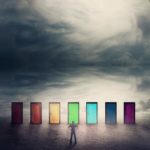 You’ve reached the end of our section on COMING OUT. We hope it’s been an interesting and helpful read.
You’ve reached the end of our section on COMING OUT. We hope it’s been an interesting and helpful read.
There comes a time to stop talking (or reading for that matter) and get on with living your (new) life exactly how you want to.
There comes a time to start meeting other gay people and to explore your sexuality safely and confidently. A common reaction to this statement, especially if you don’t live in a city is “Fine – but where do I start?”
Remember that being gay is about expressing yourself in the way you want to. And just because you’ve come out doesn’t automatically mean you have to have sex. The important thing is you take your time until you feel the time is right for you.
Despite the stereotypes, there is no single way of being gay. We are all as different as any other group of people. Going out with friends and meeting new ones at clubs or parties can be great. But the scene isn’t for everybody and it’s not everything there is to being gay.
As with any group of people, there will be some you get on with and some you don’t. If you feel that you have little in common with the gay people you have met so far, you could try different ways of contacting more gay men; take a look at our Activities section.
Above all, be yourself!
Back to topHeteronormativity
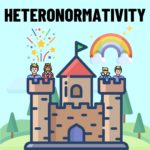 Heteronormativity is how heterosexuality (or being ‘straight’) is seen as the norm or, in some cases, the superior. It is the bias expressed by a society that can be obvious but which is often subtle and pervasive, whereby individuals are conditioned to expect others to live and behave as if everyone were heterosexual.
Heteronormativity is how heterosexuality (or being ‘straight’) is seen as the norm or, in some cases, the superior. It is the bias expressed by a society that can be obvious but which is often subtle and pervasive, whereby individuals are conditioned to expect others to live and behave as if everyone were heterosexual.
Like sexism, heteronormativity is firmly entrenched in the prevailing customs, traditions and institutions of society and often leads to the neglect of issues facing gay men and lesbians. Heterosexuality also leads to the dilemma of whether to hide the fact you are gay or decide to come out, with all that this entails.
Homophobia feeds on heteronormativity, and both can be equally damaging. When services are heteronormative, they can, at best, prevent the needs of our community from being met and, at worst, cause someone to become disenfranchised or isolated. Examples could include our presumptions about family life (“You met that special woman yet?”) or prevent access to core services we all need (“What do you mean you were raped?”).
Heteronormativity and homophobia within society create an atmosphere where LGBT+ people are less valued and vulnerable than their heterosexual counterparts. While landmark legislation in recent years now plays an important part in setting out what people can say and do, there remains a mismatch between what the law states and how people actually behave and treat gay men and others within the LGBT+ community.
How the Internet Became Straight | The MIT Reader | 9 Apr 2022How to create LGBTQ+ inclusion in the workplace: recognising the role of privilege | LSE | 10 Mar 2022
14 Queer Characters Who Got “Straightwashed” Into Heteronormativity By Hollywood | BuzzFeed | 8 May 2021
Heteronormativity: definition, societal examples and why it’s harmful to LGBT+ community | Pink News | 11 Apr 2019
10 Examples That Prove Straight Privilege Influences Everything | Yes! | 5 Oct 2017 Deafening Silence of Growing up Gay in a Heteronormative Society | Ross Rossouw | TEDx Youth | 6 Jun 2023 | 17m 13s
Gay and Heteronormative | Michael Henry | 11 Jan 2022 | 2m 50s
Alok Vaid-Menon Exists Outside Of Your Heteronormative Gender Binary | StyleLikeU | 22 Feb 2015 | 14m 48s
What Is Heteronormativity? | Childline | 24 Feb 2014 | 4m 43s LGBT+ Glossary (G-H-I) | MEN R US
Heteronormativity | Wikipedia Back to top
COMING OUT SUPPORT
Coming out support
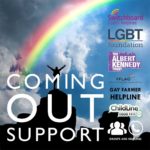 Switchboard LGBT+ Helpline
Switchboard LGBT+ Helpline
Switchboard LGBT+ Helpline
Welcome to Switchboard, a place for calm words when you need them most. We’re here to help you with whatever you want to talk about. We understand how anxious you might feel before you pick up the phone.
0800 0119 100 | 10am-10pm every day
LLGS PO Box 7324, London N1 9QS
LGBT Foundation
LGBT Foundation
We all need information and support from a friend in the know and LGBT Foundation’s Helpline Service provides thousands of hours of advice and support to thousands of people every year.
0300 330 0630 | 10am-10pm every day
LGBT Foundation, 5 Richmond Street, Manchester M1 3HF
The Proud Trust
The Proud Trust
The Proud Trust
Based in Manchester, helps LGBT+ young people (13 years to 25 years) empower themselves, to make a positive change for themselves and their communities. Youth groups, coordinating national and regional LGBT+ youth work networks, managing the LGBT+ Centre for Manchester, delivering of training, running events and campaigns, undertaking research and creating resources.
Families and Friends of Lesbians and Gays (FFLG)
Families and Friends of Lesbians and Gays (FFLG)
Families and Friends of Lesbians and Gays (FFLAG) is a national voluntary organisation dedicated to supporting parents and their lesbian, gay and bisexual daughters and sons.
0845 652 0311 | FFLAG, PO Box 495, Little Stoke, Bristol, BS34 9AP
Albert Kennedy Trust
Albert Kennedy Trust
Supports up to the age of 25, who are (or think you might be) lesbian, gay, bisexual, trans or intersex, homeless, sofa-surfing or living in crisis and/ or living in a violent, hostile or abusive home.
For more click here
Childline
Child Line
Private and confidential service for children and young people up to the age of 19. You can contact a ChildLine counsellor about anything – no problem is too big or too small. Call them free, have a 1-2-1 chat online or send an email. Go to their website for more.
0800 1111 | Always open
Online support
Being Gay is OK Being Gay Is OKUniversity Report Stonewall
Homosexual or gay? Avert
Groups (London)
Groups for people questioning their sexuality, coming out, support, and gay youth groups have all but disappeared in London these days. A sign of the times, a lack of funding or maybe men don’t want or need them any more.
Turning Point and Matrix Groups | London Friend (Central North)86 Caledonian Road, London N1 9DN Map | 020 7833 1674 LGBT Group (Young People) | Step Forward (East)
234 Bethnal Green Road, London E2 0AA Map | 020 7739 3082 First Steps (14-17yrs) Step Out (18-25yrs) | East London Out Project (East)
56-60, Grove Road, Walthamstow, London, E17 9BN Map | 020 8509 3898 Metro LGBTQ Youth | The Metro Centre (South)
141 Greenwich High Road, London SE10 8JA Map | 020 8305 5000 Mosiac LGBT Youth Centre | Mosiac LGBT Youth Centre (West)
Locations: Hanwell, Uxbridge and Kilburn (address withheld) | 07931 336 668 Back to top
LGBT books and literature
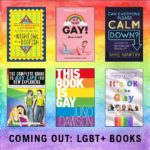 There is an ever-growing library of books and other literature about coming out, being gay and/ or being on the LGBTQIA+ spectrum. We can barely scratch the surface here is a selection:
There is an ever-growing library of books and other literature about coming out, being gay and/ or being on the LGBTQIA+ spectrum. We can barely scratch the surface here is a selection:
Free to Be Me | Dom&Ink | Penguin Books | 2019
Yay! You’re Gay! Now What? A Gay Boy’s Guide to Life UK | Riyadh Khalaf | Frances Lincoln Children’s Books | 2019
Can Everyone Please Calm Down? CAN | Mae Martin | Hachette Children’s Group | 2019
This Book Is Gay UK | James Dawson | Hot Key Books | 2014
The Complete Guide to Gay Life for New Explorers US | Michael Ryan | Author House | 2014
It’s OK to be Gay: Celebrity Coming Out Stories UK | Edited by Alison Stokes | Accent Press | 2013
Don’t forget to support your local independent LGBT+ book store
Gay’s the WordLGBT+ Books for children and young adults
World Book Day: 14 LGBT+ inclusive books that every child and young adult deserves to read | Pink News | 4 March 202115 LGBT Books You’ll Love | Pinterest | 1 Jan 2020
What are the best LGBT books for children, teenagers and YAs? | The Guardian | 12 May 2014 Teen and YA books with LGBT characters | The Book Trust
The Ultimate LGBTQIA+ Pride Book List | Penguin Random House
LGBT Young Adult (YA) Books | WS Smith
LGBT Book Lists | Good Reads Back to top
LGBT+ organisations and helplines
LGBT+ Helplines
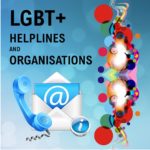 Perhaps it’s the first time you have called a helpline so it’s perfectly normal if you are feeling nervous. Helplines are there for YOU. They are not there to judge, and you can start and end the call when you want. Making a call is a first step forward.
Perhaps it’s the first time you have called a helpline so it’s perfectly normal if you are feeling nervous. Helplines are there for YOU. They are not there to judge, and you can start and end the call when you want. Making a call is a first step forward.
Helplines are there to listen, and you can get support without travelling or having an appointment. You don’t have to give your name, and most helplines are free or the cost of a local call.
People call for different reasons:
- Feeling overwhelmed or confused
- Feeling isolated or lonely
- Feeling unsafe (thoughts of suicide or self-harm)
- Relationship, boyfriend, friendship or family problems
- Health or mental problems or concerns
- Signposting to services
- Experiencing violence or abuse but if you are in immediate danger call 999
- Bullying (which doesn’t just happen at school)
Switchboard LGBT+
A safe space for anyone to discuss anything, including sexuality, gender identity, sexual health and emotional wellbeing. Supports people to explore the right options for themselves.
0800 0119 100
Switchboard LGBT+
“45” | Three Flying Piglets | 2019 | 1m
LGBT Helpline Scotland
Works to improve the health, wellbeing and equality of lesbian, gay, bisexual, and transgender (LGBT) people in Scotland. Provides support services, social events and develop resources so LGBT people can address the health issues that impact their lives and connect with their local communities.
0300 123 2523
LGBT Health and Wellbeing Scotland
LGBT Cymru Helpline
Providing general information, advice and confidential support in many areas of life and various issues that LGBT people, their family, and friends may experience.
0800 980 4021
LGBT Cymru Helpline
LGBT Ireland
Listens in confidence and without judgement, seven days a week. You can talk by phone or online through its instant messaging service or by coming along to one of its peer support groups.
1890 929 539
Transgender Family Support Line 01 907 3707
LGBT Ireland
Samaritans
Day or night, there for anyone who’s struggling to cope, who needs someone to listen without judgement or pressure. Gives people ways to cope and the skills to be there for others. Offers listening and support to people and communities in times of need.
116 123
Samaritans
Domestic violence and abuse support
0800 999 5428 National Helpline for LGBT+ Victims and Survivors of Abuse and Violence | GALOP
0808 801 0327 | Men’s Advice Line
01273 622828 | Sussex and Brighton | Rise UK
Albert Kennedy Trust
Supports LGBTQ+ young people aged 16-25 in the UK who are facing or experiencing homelessness or living in a hostile environment. Also supports young people into safe homes and employment, education or training, in a welcoming and open environment that celebrates LGBTQ+ identities.
London: 020 7831 6562 | 020 7405 6929
Manchester: 0161 228 3308
Newcastle: 0191 281 0099
Albert Kennedy Trust
LGBT Foundation
Supports the needs of the diverse range of people who identify as lesbian, gay, bisexual and trans. Nationally recognised charity firmly rooted in our local communities of Greater Manchester and provide a wide range of evidence-based and cost effective services.
0345 330 3030
LGBT Foundation
Positively UK
Provides peer-led support, advocacy and information to everyone living with HIV to effectively manage any aspect of their diagnosis, care and life with HIV.
020 7713 0444
Positively UK
Email
Plus Health
Online peer support is a confidential FREE service available to anyone over the age of 16 living with or affected by HIV. The service is available across the UK and to British nationals living or working outside the UK.
Living with HIV peer support | Plus Health
Telefriending for LGBT+ people (London)
Telephone befriending service is for LGBT+ people aged over 50 who would like to receive a weekly phone call. Telefriending is a free telephone befriending service where one of our lovely volunteers will call you around the same time each week for a chat of up to 30-minutes. The person who calls you each week will always be the same telefriending volunteer.
Telefriending | Opening Doors London
020 7239 0400
Email
The Intercom Trust (South West)
Lesbian, gay, bisexual and trans+ charity working across Cornwall, Devon, Dorset and the wider South West. Services include help and support, advocacy, counselling, support groups.
0800 612 3010
The Intercom Trust
Crisis Text Helpline
Provides free, confidential support, 24/7 via text. It’s the first free 24/7 texting service in the UK for anyone in crisis anytime, anywhere. Shout is available in England, Scotland, Wales, and Northern Ireland. Every texter is connected with a real-life human being trained to bring people from a hot moment to a cool calm place through active listening and collaborative problem-solving.
Text SHOUT to 85258
Crisis Text Line
Families and Friends of Lesbians and Gays (FFLG)
National voluntary organisation dedicated to supporting parents and families and their LGBT+ members. Offers support to local parents groups and contacts in their efforts to help parents and families understand, accept and support their lesbian, gay, bisexual and transgender members with love and pride. FFLAG members are parents of lesbian, gay, bisexual or trans children supported by other volunteers.
0845 652 0311
Families and Friends of Lesbians and Gays
House of Rainbow (HOR)
Fosters relationships among black, asian, minority ethnic (BAME), lesbian, gay, bisexual, transgender, intersex, Queer (LGBTIQ+) individuals, people of faith and allies in order to create a safer and a more inclusive community. During this COVID-19 crisis, many MSM living with HIV are increasingly feeling isolated. Please DM privately to join its peer support community “Positively MSM” of Black African Men who love men living with HIV.
House of Rainbow
House of Rainbow
07507 510357
MindLine Trans+
Mental health support helpline for people who identify as transgender, agender, gender fluid and non-binary.
0300 330 5468
MindLine Trans+
Support U (Thames Valley/ Reading )
Operates the local LGBT+ helpline from its wellbeing centre in Reading.
0118 321 9111
Support U
LGBT+ Organisations
To make navigation a little easier, we have tried to separate out helplines (listed above) and organisations providing other services such as information, peer support and chat.
Some overlap, but we’ve done our best. And please let us know if there are any organisations we should include.
Volunteers are updating this section which is proving challenging as we clarify which organisations have moved online, others to hybrid working.London Friend
Supports the health and mental wellbeing of the LGBT community in and around London. Offers counselling and support around issues such as same-sex relationships, sexual and gender identity and promoting personal growth and self-confidence. Social groups provide a safe space to meet and socialise as an alternative to the bar and club scene. Services are delivered by trained lesbian, gay, bisexual and trans volunteers.
London Friend
86 Caledonian Rd, London N1 9DN | Map
020 7833 1674
London LGBTQ+ Community Centre
The London LGBTQ+ Community Centre is a safe, sober, intersectional community centre and café where all LGBTQ+ people are welcome, supported, can build connections and can flourish.
London LGBTQ+ Community Centre
60-62 Hopton Street, Blackfriars, London SE1 9JH | Map
Stonewall
Empowers LGBT people to be their authentic selves, enabling them to realise and achieve their full potential, and empowers LGBT people and allies to create positive change. Supports individuals to understand how they can make a difference for LGBT people at work, at home and in their communities.
Stonewall London | 020 7593 1850 | Email
192 St John Street, London EC1V 4JY
Stonewall Scotland | | 0131 474 8019 | Email
Stonewall Cymru | 029 2023 7744 | Email
Stonewall Northern Ireland | Email
Nolan Investigates looks at Stonewall’s influence in public institutions across the UK. We talk to a range of voices with a view on sex, gender and identity.
https://www.bbc.co.uk/programmes/p09yjmph/episodes/downloads
Media watchdog Ofcom quits Stonewall diversity scheme | BBC News | 26 Aug 2021
Gay Men’s Health Collective
Delivers three volunteer-led health and well-being projects: a health and wellbeing website, makes films on health issues and films for the wider LGBT+ community and produces safer chemsex packs. Hybrid working, some projects delivered remotely.
Gay Men’s Health Collective
61 Mansell Street, London E1 8AN | Registered Office
07791 867885
LGBT Hero
LGBT HERO aims to improve the health, enhance well-being, and champion the rights of LGBTQ+ people. It provides LGBTQ+ people with accurate and credible information so they can build skills that enable them to make informed choices about their health and wellbeing. It encourages LGBTQ+ people to create social change in their communities by providing a platform where they are heard and valued.
Health, Equality and Rights Organisation (HERO)
Unit 74, The Link, 49 Effra Rd, London SW2 1BZ | Map
020 7738 6872
Positively UK
Provides peer-led support, advocacy and information to everyone living with HIV to effectively manage any aspect of their diagnosis, care and life with HIV.
Positively UK
St Marks Studios 14 Chillingworth Road, Islington N7 8QJ | Map
020 7713 0444 | Email
Albert Kennedy Trust
Supports LGBTQ+ young people aged 16-25 in the UK who are facing or experiencing homelessness or living in a hostile environment. Also supports young people into safe homes and employment, education or training, in a welcoming and open environment that celebrates LGBTQ+ identities.
Albert Kenedy Trust, London
19 Parr Sreeet, London N1 7GW | Map
020 7831 6562 | Referrals
Albert Kenedy Trust, Manchester
50 Oak Street, Northern Quarter, Manchester M4 5JA | Map
0161 228 3308 | Referrals
Albert Kenedy Trust, Newcastle
MEA House, Ellison Place, Newcastle upon Tyne NE1 8XS
0191 281 0099
1st Floor, St Pauls Learning And Family Centre, 94 Grosvenor Rd, St Paul’s, Bristol BS2 8XJ | Map
07761246386
LGBT Foundation
Supports the needs of the diverse range of people who identify as lesbian, gay, bisexual and trans. Nationally recognised charity firmly rooted in our local communities of Greater Manchester and provide a wide range of evidence-based and cost-effective services.
LGBT Foundation
Postal Address: Fairbairn House (2nd Floor), 72 Sackville Street, Manchester, M1 3NJ
0345 330 3030
Plus Health
Online peer support is a confidential FREE service available to anyone over the age of 16 living with or affected by HIV. The service is available across the UK and to British nationals living or working outside the UK.
Living with HIV peer support | Plus Health
020 8749 3464
Domestic violence and abuse support
0800 999 5428 | National Helpline for LGBT+ Victims and Survivors of Abuse and Violence | GALOP
0808 801 0327 | Men’s Advice Line
01273 622828 | Sussex and Brighton | Rise UK
0808 1689111 | Victim Support
The Proud Trust
Based in Manchester, it helps LGBT+ young people (13 years to 25 years) empower themselves to make a positive change for themselves and their communities. Youth groups, coordinating national and regional LGBT+ youth work networks, managing the LGBT+ Centre for Manchester, delivering training, running events and campaigns, undertaking research and creating resources.
The Proud Trust
The Proud Trust
The Tribe
Peer-to-peer support group for individuals living as LGBT – lesbian, gay, bisexual, transgender, or questioning.
Peer-to-peer support group for individuals living as LGBT | The Tribe
SASH
Free, non-judgemental support to improve your sexual health, your relationships, and your mental health.
Hammersmith and Fulham, Kensington and Chelsea, and Westminster residents only
SASH
020 7851 2955
Email
Families and Friends of Lesbians and Gays (FFLG)
National voluntary organisation dedicated to supporting parents and families and their LGBT+ members. Offers support to local parents groups and contacts in their efforts to help parents and families understand, accept and support their lesbian, gay, bisexual and transgender members with love and pride. FFLAG members are parents of lesbian, gay, bisexual or trans children supported by other volunteers.
0845 652 0311
Families and Friends of Lesbians and Gays
House of Rainbow (HOR)
Fosters relationships among black, asian, minority ethnic (BAME), lesbian, gay, bisexual, transgender, intersex, Queer (LGBTIQ+) individuals, people of faith and allies in order to create a safer and a more inclusive community. During this COVID-19 crisis, many MSM living with HIV are increasingly feeling isolated. Please DM privately to join House of Rainbow’s peer support community “Positively MSM” of Black African Men who love men living with HIV.
House of Rainbow
House of Rainbow
07507 510357
Covid-19 Mutual Aid UK
Covid-19 Mutual Aid UK is a group of volunteers supporting local community groups organising mutual aid throughout the Covid-19 outbreak in the UK. Focuses on providing resources and connecting people to their nearest local groups, willing volunteers and those in need. Coordinates care efforts for people who are self-isolating, especially if they are part of a more at risk demographic including the elderly, disabled and people with other pre-existing health issues.
COVID-19 Mutual Aid UK
It Gets Better Project
The It Gets Better Project exists to uplift, empower, and connect LGBTQ+ youth around the globe. Growing up isn’t easy, especially when you are trying to affirm and assert your sexual orientation and/or gender identity. It can be a challenging and isolating process – but, the good news is, no one has to do it alone.
It Gets Better Project
Other organisations we have found along the way …
Listens to, supports and connects children and young people under 26 who are LGBT+.
Diversity Trust | National
Promotes equality, diversity and inclusion through the elimination of discrimination, harassment and victimisation on the grounds of: age, disability, gender reassignment, marriage and civil partnership, pregnancy and maternity, race, religion or belief, sex and sexual orientation.
Glitter Cymru | Wales
Safe and confidential space for BAME LGBT people to be themselves.
LGBT Age | Scotland
Welcoming LGBT+ people aged 50 and over.
Live Through This | London
Supporting and advocating for LGBTIQ+ people affected by cancer.
MEIC | Wales
Helpline for children and young people up to the age of 25. LGBT+ friendly.
MESMAC Newcastle | Newcastle
MESMAC Newcastle works with gay and bisexual men and other men who have sex with men to increase the range of choices open to them.
Proud2Be | Devon
Supports LGBTQ+ people to lead empowered, fulfilled and authentic lives.
QueerCare | National
Advocacy to help people access other services for the queer community.
Rainbow Home | North East
Works with LGBT asylum seekers and those who have been granted leave to remain but are unsettled.
Rainbow Project | Northern Ireland
Works to improve the physical, mental and emotional health and well-being of LGBT+ people.
Unmuted Brum | Birmingham
Exists to raise the voices and representation of LGBTQI+ people of colour.
MENRUS.CO.UK
Feel free to browse though we have listed some key topics linked to other parts of the website.
Domestic violence and abuse | MEN R US
Housing and homelessness | MEN R US
Accident and emergency hospitals (London) | MEN R US
Drug, alcohol and chemsex support | MEN R US
Sexual health services | MEN R US
Safer chemsex | MEN R US
LGBT Forums, groups and networks
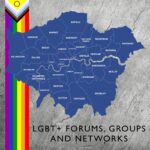 Many towns, cities and authorities have some kind of group supporting LGBT people. Few are staffed, and volunteers are their lifeblood, working tirelessly to raise LGBT issues and create a positive presence locally. If you can’t find a local presence, Meet Up may surprise you.
Many towns, cities and authorities have some kind of group supporting LGBT people. Few are staffed, and volunteers are their lifeblood, working tirelessly to raise LGBT issues and create a positive presence locally. If you can’t find a local presence, Meet Up may surprise you.
In Greater London, for instance, boroughs are supposed to have an LGBT Forum, a recommendation in the Lawrence Inquiry. The original idea of a Forum was to act as a community liaison with the police to ensure adequate service provision and a breakdown of barriers to the reporting of hate crime.
Regularly updated, please contact us if you know of any groups or organisations not listed here.
Barking and Dagenham
LGBT Network Barking and Dagenham
Barnet
Barnet LGBT
Barnet Friends LGBTI
Bexley
Haven LGBTQ Social Group
Brent
North West London LGBT Best fit, does not appear to have a Forum
Bromley
Bromley LGBT
Camden
Forum+ (previously Camden LGBT Forum)
Queering Camden
Queering Camden is a living, community-made mapping project of queerness in all its forms across Camden. “This project welcomes submissions from all people who identify as LGBTQ+ who have lived, worked, or simply travelled through Camden. The stories may occur in the past, the present, or the future. We invite responses in text, audio, image, and video forms. These submissions will be shared on the website, on social media, and later as part of a larger digital exhibition.”
City of London
London LGBTQ+ Community Centre
Croydon
LGBT Croydon
Ealing
North West London LGBT Best fit, does not appear to have a Forum
Enfield
LGBT-QA of Enfield CT
Greenwich
No information. Do you know of anything?
Hackney
Rainbow Hackney LGBT Forum
Hammersmith and Fulham
No information. Do you know of anything?
Haringey
Wise Thoughts
Harrow
North West London LGBT Best fit, does not appear to have a Forum
Havering
No information. Do you know of anything?
Hillingdon
Hillingdon LGBT Forum
Hounslow
https://www.facebook.com/groups/360892550978822/
Islington
See Camden
Kensington and Chelsea
No presence. Do you know of anything?
Kingston upon Thames
Kingston LGBT Forum
Lambeth
Lambeth Links
Lewisham
Lewisham LGBT+ Group
Merton
Merton LGBT Forum
Newham
Queer Newham
Redbridge
Redbridge Rainbow Community
Richmond upon Thames
Richmond upon Thames LGBT Forum
Southwark
Southwark LGBT Network
Sutton
Sutton LGBTQ+
Tower Hamlets
Tower Hamlets LGBT Community Forum
Wandsworth
Wandsworth LGBT Forum
Westminster
Westminster LGBT Forum
North West London LGBT
North West London LGBT
The London LGBT+ Forums Network
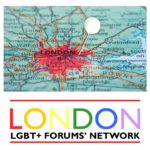 The London LGBT+ Forums Network is a collection of individual LGBTQ+ forums, Pride and Borough-based community groups from across Greater London.
The London LGBT+ Forums Network is a collection of individual LGBTQ+ forums, Pride and Borough-based community groups from across Greater London.
They exist to tackle issues of inequality within the public services and to be a voice for their members and LGBTQ+ residents. The Network’s mission is to bring all the existing London LGBTQ+ forums together to stimulate debate, share information and discuss issues of mutual interest to London’s LGBTQ+ communities. The Network has the full support of The Mayor of London and the Greater London Authority.
London LGBT+ Forums’ Network Back to topOrganisations for people who are trans
TransUniteComprehensive resource for people in the UK searching for support in the transgender community. Easy, mobile friendly directory connects you to an established network of trans support groups near you.
TransLucent
Advocates for the trans, non-binary, and gender-diverse community in the UK.
Beaumont Society
UK registered charity with a primary focus on the transgender individual.
CliniQ
Holistic sexual health and well-being service for all trans people, partners and friends. We are a trans-led team, who offer a safe, confidential space for those who may not feel comfortable accessing mainstream services.
FTM London
Support for transmen and transmasculine people. FTM London is a peer support group for female to male trans people, including transmasculine non-binary.
Gendered Intelligence
To increase understanding of gender diversity through creative ways.
Gender Trust
For all those affected by gender identity issues. Information and guidance. No contact details that we could find.
GIRES
To improve the lives of trans and gender non-conforming people, including those who are non-binary and non-gender.
It’s Pronounced Metrosexual
Online resource about snap judgments, identity, and oppression.
Trans London
TransLondon is a discussion/support group for all members of the trans community, whatever their gender identity (or identities) and whatever stage in their transition they have reached (if at all). However, all members must be trans-identified or questioning.
TransActual UK
Group of British trans people in 2017 as a response to increasing press hostility, transphobia and misinformation. We are run by the trans community, with the trans community, for the trans community.
TGEU (Transgender Europe)
Gives trans people a voice and platform in Europe, Central Asia and also the rest of the world. Advocates for trans rights and social justice, raise awareness on issues trans people face and support a strong trans movement in collaboration with others.
Spectra
Social groups for trans, non-binary and questioning people offering a safe, trans-led space to meet, socialise, support, take part in activities, workshops and enjoy a variety of speakers.
Trans and non-binary services | 56 Dean Street
We offer a range of sexual health services for the trans and non-binary community. All our waiting areas, toilets and screening rooms are gender neutral.
TransPlus | 56 Dean Street
Integrated Gender, Sexual Health and HIV service commissioned by NHS England
London Trans Choir
London’s first trans, non-binary, intersex, gender non-conforming, and gender-fluid choir.
Sparkle
A resource list for those who are seeking support both online and in person. ‘I feel like it’s quite shaky acceptance’: trans kids and the fight for inclusion | The Guardian
Trans children and their families still often face suspicion and suppression, but attitudes are changing. Stonewall to continue trans campaign for right to change birth certificates | The Guardian 20 Sep 2020
Damning report ranks UK’s legal recognition of trans people among the very worst in Europe | Pink News | 6 Aug 2020 Back to top
Black, Asian and Minority Ethnic LGBT+ Organisations
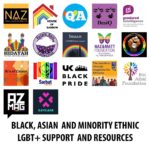 AZ Magazine
AZ Magazine
Online space that allows LGBT+ people of colour to showcase their talents and to address the issues that are faced in the BME community. This space is a direct response to the lack of alcohol-free, daytime spaces for LGBT+ people of colour in London. Organises monthly AZ Hub events which are a social space for workshops, screenings, art display, discussion, performance and information sharing.
AZ Magazine
AZ Magazine
AZ Magazine
Bisi Almi Foundation (BAF)
Charity aiming to work towards a Nigeria where everyone is equal irrespective of sexual orientation or gender identity. Work includes research, training, stakeholder engagement, working with heads of multinational companies in Nigeria, fellowships for journalists and lawyers and its Rainbow Academy: capacity training programme for LGBT people in Nigeria.
Bisi Almi Foundation
Bisi Almi Foundation
Bisi Almi Foundation
Bi’s of Colour
A blog. No further information or bio.
Bi’s Of Colour
Blackout UK
Not-for-profit social enterprise run and owned by a volunteer collective of black gay men. Created to recognise the need for black queer men to have a space to “think, shout, show off, curse, celebrate, laugh, reflect and share. Our own space to hear and be heard.” Encourages and stimulates debate and discussion online and face-to-face through the website including writer workshops, networking events, and supporting interventions to meet the needs of black queer men.
BlackOut UK
BlackOut UK
BlackOut UK
Colours @ Gendered Intelligence
Youth group for black, Asian and ethnic minority (BAME) 13-25-year-olds in London run by Gendered Intelligence. A safe space for BAME young people, with disabilities, with religious beliefs who are trans men, trans women, gender non-conforming or non-binary. Explicitly welcomes and invite mixed-heritage people. Wheelchair accessible venue (the Roundhouse, Camden). “It’s okay if you don’t feel black enough, or Asian enough, we welcome all BAME young people who are unsure or questioning their gender, or just looking to meet like-minded people.”
Gendered Intelligence
Colours Gendered
DesiQ
South Asian LGBTQIA+ London/ South East is for people of South Asian origin who identify as gay, lesbian, bisexual, asexual, pansexual, trans, intersex, non-binary, questioning/unsure and queer. Intersectional, radical and a proud community, a safe space to explore identities, share stories celebrate, organise, build connections and be heard.
DesiQ
Gaysians
An alliance of charities, support groups, meet-ups, activists and leading voices within our community. Joined forces to improve access to resources and services to those that seek it, as well as to elevate its collective voice in mainstream media. Connects organisations and people to create a safe space for its community, discover resources and build friendships.
Gaysians
Gaysians
Hidayah
A volunteer-led and registered charity, Hidayah is a secular organisation, however, its projects and activities are developed specifically for the needs of LGBTQI+ Muslims. Its vision is to ensure that the voices of LGBTQI+ Muslims are heard and understood. Its mission is to provide support and welfare for LGBTQI+ Muslims and promote social justice and education about the Muslim LGBTQI+ community to counter discrimination, prejudice and injustice.
Hidayah
Hidayah
Hidayah
House of Rainbow (HOR)
Fosters relationships among Black, Asian, minority ethnic (BAME), lesbian, gay, bisexual, transgender, intersex, Queer (LGBTIQ+) individuals, people of faith and allies in order to create a safer and more inclusive community. During this COVID-19 crisis, many MSM living with HIV are increasingly feeling isolated. Please DM (direct message) privately to join House of Rainbow’s peer support community “Positively MSM” of Black African Men who love men living with HIV.
House of Rainbow
House of Rainbow
House of Rainbow
Inclusive Mosque Initiative
Intersectional feminist mosque and registered charity dedicated to creating inclusive, safer places for marginalised Muslims. It is not proselytising (attempt to convert someone) and does not seek to convert non-Muslims to Islam. Its work is aimed primarily at Muslims and welcomes all people of any faith or none. All its events are inclusive of LGBT+ Muslims and it encourages people to attend with their families including their chosen families.
Inclusive Mosque Initiative
Imaan
A charity that supports LGBTQI Muslims. Founded in London in 1999, it campaigns to ensure that no LGBTQI Muslim person in Britain feels excluded from their family, their faith or their communities. Imaan is a small, volunteer-led charity, led by and working for LGBTQI Muslims. Aims to represent the breadth of the Islamic faith and the range of identities and narratives of the LGBTQ community and our allies.
Imaan
Imaan
Imaan
NAZ
Provides a range of sexual health services and programmes, specifically for men and women from Black Asian and Minority Ethnic (BAME) communities. Helps newly diagnosed people understand and manage their condition with confidence. NAZ was formed by the late HIV and gay rights activist, Shivananda Khan. Shivananda understood that support for ethnic minorities like Nazir would need to be culturally specific, driven from within the community, with knowledge of policy, race, culture, religion and sexuality.
NAZ
NAZ
NAZ
Naz and Matt Foundation
Set up in 2014 following the sad loss of Matt’s fiancé, Naz who took his own life two days after his deeply religious family confronted him about his sexuality. Empowers and supports LGBTQI (Lesbian, Gay, Bisexual, Transgender, Queer, Questioning, and Intersex) individuals, their friends and family to work towards resolving challenges linked to sexuality or gender identity, particularly where religion is heavily influencing the situation. Tackles homophobia triggered by religion to help parents accept their children.
Naz and Matt Foundation
Naz and Matt Foundation
Naz and Matt Foundation
Purple Rain Collective
A collective space for BAME LGBTQ & QTIPOC in the UK to mobilise, converse on experiences and develop strategies for safety, resistance and liberation. A space of community-building ‘in a world where individualism is often sold to us at the expense of our own wellbeing, pausing to gather with each other; even just for a cup of tea, can be the most radical thing.’ A space where as BAME LGBT identifying people & QTIPOC, are choosing, every day, to come together and be there for each other despite the fractures and frictions that have been inflicted on our communities. Resistance and liberation.
Purple Rain Collective
Out and Proud African LGBTI (OPAL)
OPAL is an African Lesbian Gay Bisexual Transgender and Intersex rights and human rights activist charity. Our mission is to defend human dignity, freedom, justice and equality for LGBTI people in Africa
OPAL
OPAL
Queer Asia
Queer Asia is a network of queer-identifying scholars, academics, activists, artists, and performers. A platform for Inter-Asia collaboration, dialogue, and research on issues affecting people who self-identify as LGBTQ+ or belong to other non-normative sexualities and gender identities in Asia or Asian diasporas and beyond.
Queer Asia
Queer Asia
Queer Asia
Sarbat LGBT Sikhs
Sarbat is a volunteer-led group addressing LGBT issues from a Sikh perspective. Empowers members to encourage discussions, tackle homophobia/ biphobia/ transphobia and build bridges within and beyond their communities. Aims to move the conversation forward about issues faced by LGBT Sikhs, create and continually develop spaces where LGBT Sikhs meet each other and find support, and develop and provide useful resources about the Sikh perspective on LGBT issues not only for our community but those outside it.
Sarbat LGBT Sikhs
Sarbat LGBT Sikhs
Sarbat LGBT Sikhs
Spectra (London)
Offer services to support the sexual health and wellbeing of marginalised communities, including men who have sex with men (MSM) trans and non-binary people, and Black, Asian and Minority Ethnic communities.
Spectra
Spectra
Spectra
UK Black Pride
Europe’s largest celebration for LGBTQ people of African, Asian, Caribbean, Middle Eastern and Latin American descent. Annual celebration during pride month, as well as a variety of activities throughout the year in and around the UK, which also promote and advocate for the spiritual, emotional, and intellectual health and wellbeing of the communities it represents. A safe space to celebrate diverse sexualities, gender identities, cultures, gender expressions and backgrounds. Represents and celebrates Black LGBTQ and QTIPOC culture through education, the arts, cultural events and advocacy. Importantly, UK Black Pride promotes unity and cooperation among LGBTQ people of diasporic communities in the UK, as well as their friends and families.
UK Black Pride
UK Black Pride
UK Black Pride
UK Black Pride | MEN R US
UK Black Pride
Wolves in the City
Wolves in the City is a podcast for black men who are exploring their sexuality in the city. Hosted by Youtube Presenter Lee Gray, Grime Artist Karnage Kills and DJ Jay Jay Revlon. This podcast is not suitable for the workplace. You have been warned.
Wolves in the City | Podcast | Lee Gray, Karnage Kills and Jay Jay Revlon
Kaleidoscope Trust
Established in 2011, Kaleidoscope Trust works to uphold the human rights of lesbian, gay, bisexual and transgender (LGBT+) people in countries around the world where they are discriminated against or marginalised due to their sexual orientation, gender identity and/or gender expression. Connects LGBT+ activists from the Global South, builds intersectional civil society movements across regions in the Global South; cchallenges societal stigma by working with LGBT+ activists across five cities in Africa to address the challenges facing their communities; and co-chairs the Equal Rights Coalition, an inter-governmental body that brings together 42 member states and more 120 civil society organisations.
Kaleidoscope Trust
Related internal links to other parts of this website
Black Lives Matter Movements, and learning resources | MEN R USQTIBPOC and QPOC | MEN R US
BME, BAME and BEM | MEN R US
Racism and gay men | MEN R US
How to be an ally | MEN R US
The word is out | MEN R US Back to top
Gay's the Word
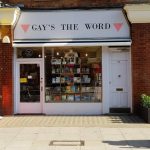 While you may instinctively reach for Amazon or Waterstones, we urge you to visit your local bookshop instead. For those of you visiting or if you live in London Gay’s the Word bookshop is a must go to destination. Two minutes walk from Russell Square tube station, it’s is the only specifically lesbian and gay book store in the UK. And here’s your map. It recently appeared as a primary location in the film Pride which, BTW, we thought was rather good. Gay’s the Word is also on Facebook with books, events and news.
While you may instinctively reach for Amazon or Waterstones, we urge you to visit your local bookshop instead. For those of you visiting or if you live in London Gay’s the Word bookshop is a must go to destination. Two minutes walk from Russell Square tube station, it’s is the only specifically lesbian and gay book store in the UK. And here’s your map. It recently appeared as a primary location in the film Pride which, BTW, we thought was rather good. Gay’s the Word is also on Facebook with books, events and news.
When the shop was founded in 1979, gay books were not generally available in ordinary bookstores. From the beginning, the bookshop was used as a community and information resource for lesbians and gay men providing information on gay organisations and forthcoming events.
Homage | Three Flying Piglets
Made by GMHC volunteers, a fond homage to Gay’s the Word which marks its 40th Anniversary in January 2019.
66 Marchmont Street, London WC1N 1AB
Gay’s the Word | Wikipedia Inside England’s only LGBT bookshop | i-d | 18 Jan 2019
A book lovers pride | Evening Standard | 5 Jul 2018
1984: The trials of Gay’s the Word | Gay in the 80s | 1 Oct 2012 Back to top
Searching for services
 For some, this section may seem patronising, stating the obvious, but we believe there are others who find some of the tips and tricks we use helpful.
For some, this section may seem patronising, stating the obvious, but we believe there are others who find some of the tips and tricks we use helpful.
Whether an LGBT specific or mainstream service, finding the right help and support you need at the best of times can be frustrating and time-consuming. It’s one of the reasons why MEN R US was built in the first place. Services are not universally available or accessible – often more difficult to find outside larger towns and cities.
Throw COVID-19 into the mix and it’s another layer to get through as services have moved online or closed temporarily.
Searching online
Insert the following into the search browser:
- the nearest town or city followed by
- the words LGBT or gay and/ or HIV followed by
- the words support or service and/ or peer support
For example, Norwich gay support or Chester LGBT peer support
MEN R US volunteers have been tracking down services for years and, even today, we are surprised what these keyword combos results find. Also …
- Contacting an HIV or LGBT+ organisation in your region or area can be a good place to start. While they may not be able to help you specifically they usually know what’s going on locally
- An LGBT helpline may be able to signpost, like LGBT+ Switchboard
- Feel free to email us. This link takes you to our contact page
Some of us prefer gay or gay-friendly services which, as a rule, are much better understanding the issues affecting our lives, and the context. Others are happy to access mainstream services. Truth is, issues like this affect many LGBT+ people accessing health services generally at a time when there is less funding and more cuts than ever before.
In larger towns and cities, some sexual health services, drug and LGBT+ mental health, local authority services are working together to provide better-integrated support. Most health services aim to be welcoming, respectful, knowledgeable, and understanding. The thing is to find a service that’s right for you.
Ask questions
Consider you or a friend phoning a service first to check if the ‘vibe’ feels right.
Some of these questions may seem a little direct (kind-of the point) and you may have some of your own:
- “Would you say your service is LGBT+ friendly?”
- “Does you have a service specifically for gay/ bi men?”
- “Have staff had training gay men’s health and LGBT+ issues?”
- Check out the service’s website? Are ‘LGBT’, ‘gay’ and/ or ‘men who have sex with men’ (MSM) mentioned?
Your GP
It’s understandable why you might feel your GP won’t have the knowledge and expertise they need but they should be able to be supportive and/ or signpost you to someone who can. This might include a drug or counselling service though these are unlikely to be gay-specific. GPs are also the ‘gateway’ to local health services you so developing a relationship with your GP is potentially very helpful.
Can you talk with a friend you trust?
Perhaps the first step in getting help may be talking to someone you trust, a friend, a sex bud … even the ex. Some of the best support can still be found within our own community.
LGBT+ glossary, and other words
Introduction
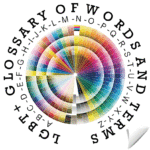 Constantly evolving, here is our A to Z of LGBT+ glossary and terms. No single glossary can include everything, and people will understand them differently depending on their lived experience.
Constantly evolving, here is our A to Z of LGBT+ glossary and terms. No single glossary can include everything, and people will understand them differently depending on their lived experience.
Saying the wrong thing
Even if you are LGBT+, talking about LGBT+ issues can be bewildering, especially if you think you may say the wrong thing. Hopefully, this glossary will give you and others more confidence and better understanding, whether in conversation or reading.
People change
Over time, identities can change and be fluid as people recognise and understand new things about themselves. This means words used at one point in their lives may change later, and that’s OK. Everyone has the right to self-identify and may have differing relationships with the words they use. Be mindful, listen out, and respect a person’s self-identified terminology. Ask what it means if you hear a word or term you don’t recognise or feel someone is using it in a new way.
Not reinventing the wheel
Rather than reinvent the wheel we have pulled together definitions from several sources, also including links to some of these words and terms used elsewhere on the website. The primary sources are
- Stonewall UK (Glossary of terms)
- Purple Rain Collective UK (Glossary)
- Johns Hopkins University, Homewood Student Affairs USA (LGBTQ Glossary)
- We Are Family USA (LGBTQI+ Glossary of Terms)
- Wikipedia
We recognise that the UK and USA use some words differently, or not at all.
Suggestions
Do you have suggestions of words you would like to see added? Contact us here.
Outdated or offensive
We have included some words that have fallen out of use or may be regarded as offensive, but this is because they are still in use today – sometimes through ignorance, sometimes as a slur. These words include a warning symbol
A-B-C
- “Ace is an umbrella term covering a range of asexual and aromantic identities. Within the ace community, some people feel a strong tie to asexual and aromantic communities and others who do not. Some ace people have romantic and/or sexual relationships, while others focus on other kinds of love and relationships.” | GALOP
- “The Asexual Spectrum or Asexual Umbrella is a group of sexual orientations that all fall under the umbrella term of asexual. People on the asexual spectrum may completely lack sexual attraction or feel it so little that they relate more to the asexual experience than to the allosexual experience. The common link between people on the asexual spectrum is that they don’t feel the “standard” amount of sexual attraction or they don’t feel it in the “standard” way, that allosexual people do. People on the asexual spectrum are often referred to as “ace-spec” for short. Ace-spec people can have any romantic orientation including aromantic.” | LGBT Wiki
Ally
- “A (typically) straight and/or cis person who supports members of the LGBT community.” | Stonewall
- “Ally (Heterosexual Ally, Straight Ally) – Someone who is a friend, advocate, and/or activist for LGBTQ people. A heterosexual ally is also someone who confronts heterosexism in themselves and others. The term ally is generally used for any member of a dominant group who is a friend, advocate or activist for people in an oppressed group (i.e. White Ally for People of Color).” | We Are Family
- “An ally is a person who confronts heterosexism, sexism, homophobia, biphobia, transphobia, etc., in themselves and others out of self-interest and a concern for the well-being of LGBTQ people, and who is committed to social justice and equal rights.” | Johns Hopkins University
- “An ally, straight ally, or heterosexual ally is a heterosexual and cisgender person who supports equal civil rights, gender equality, and LGBT social movements, challenging homophobia, biphobia, and transphobia. Not everyone who meets this definition identifies as an “ally”.” | Wikipedia
Androgyny/ Androgynous
- “Gender expression that falls somewhere in between masculinity and femininity, or perhaps on some other dimension all together.” | Johns Hopkins University
- “Term used to describe an individual whose gender expression and/or identity may be neither distinctly “female” nor “male,” usually based on appearance.” | We Are Family
- “Combination of masculine and feminine characteristics into an ambiguous form. Androgyny may be expressed with regard to biological sex, gender identity, gender expression, or sexual identity.” | Wikipedia
Aromantic
- Aromantic (or Aro) is a romantic orientation that describes experiencing little to no romantic attraction to any genders. Aromantic as an identity by itself means experiencing no romantic attraction however there is a spectrum of other (arospec) identities experiencing attraction under specific circumstances/differently to the norm. Common experiences of an aromantic person can include disinterest in romantic relationships, an only theoretical understanding of romantic attraction, or aversion to romance. | Aromantics Wiki
- Aromanticism or aromanticity is a romantic orientation in which a person does not experience romantic attraction, whether entirely, partially or circumstantially. They may not feel romantic love, and may not feel the need to be in romantic relationships. | Wikipedia
Asexuality/ Asexual
- “A sexual orientation generally characterized by not feeling sexual attraction or desire for partnered sexuality. Asexuality is distinct from celibacy, which is the deliberate abstention from sexual activity. Some asexual people do have sex. There are many diverse ways of being asexual.” | We Are Family
- “Someone who does not experience sexual attraction towards other people, and who identifies as asexual. May still have romantic, emotional, affectional, or relational attractions to other people. Asexuality is distinct from celibacy, which is the deliberate abstention from sexual activity. Some asexuals do have sex. There are many diverse ways of being asexual. Sometimes shortened as “ace.” | Johns Hopkins University
- “Asexuality is the lack of sexual attraction to others, or low or absent interest in or desire for sexual activity. It may be considered a sexual orientation or the lack thereof. It may also be categorized more widely to include a broad spectrum of asexual sub-identities.” | Wikipedia
Aceflux
Aceflux | LGBTQIA Fandom
Aegosexual
Aegosexual | LGBTQIA Fandom
Akoisexual
Akoisexual | LGBTQIA Fandom
Apothisexual
Apothisexual | LGBTQIA Fandom
Autosexual
Autosexual | LGBTQIA Fandom
Biphobia/ Biphobic
- “The fear or dislike of someone who identifies as bi based on prejudice or negative attitudes, beliefs or views about bi people. Biphobic bullying may be targeted at people who are, or who are perceived to be, bi”.” | Stonewall
- “The fear, hatred, or intolerance of bisexual people.” | We Are Family
- “Fear or hatred of people who are bisexual, pansexual, omnisexual, or non-monosexual.” | Johns Hopkins University
- “Biphobia is aversion toward bisexuality and bisexual people as individuals. It can take the form of denial that bisexuality is a genuine sexual orientation, or of negative stereotypes about people who are bisexual.” | Wikipedia
Bisexuality/ Bisexual/ Bi
- “Bi is an umbrella term used to describe a romantic and/or sexual orientation towards more than one gender. Bi people may describe themselves using one or more of a wide variety of terms, including, but not limited to, bisexual, pan, queer, and some other non-monosexual and non-monoromantic identities.” | Stonewall
- “A person of any gender who experiences attraction to people of their own gender, and other genders.” | The Proud Trust
- “An individual who is physically, romantically and/or emotionally attracted to men and women. Bisexuals need not have had sexual experience with both men and women; in fact, they need not have had any sexual experience at all to identify as bisexual.” | We Are Family
- “A person who is emotionally, romantically, sexually, affectionately, or relationally attracted to both men and women, or who identifies as a member of the bisexual community. Also referred to as “bi-affectionate” or “bi.” | Johns Hopkins University
- “Bisexuality is romantic attraction, sexual attraction, or sexual behavior toward both males and females, or to more than one sex or gender.” | Wikipedia
Camp
- “It can be an attitude, a style or a behaviour, and it consists of several components – exaggeration, artificiality or theatricality, breaking social norms and silliness, which results in humour. If the effect is not intended to be funny, it is camp. If the effect is intentionally funny, then it is campy – a term more commonly used in the US than the UK.” | A brief history of camp: from minority sensibility to political protest | The Conversation | 14 Jun 2023
Cisgender/ Cis
- “Someone whose gender identity is the same as the sex they were assigned at birth. Non-trans is also used by some people.” Stonewall
- “A person whose gender is the same or mostly the same as they were assigned at birth.” | The Proud Trust
- “A term used to describe people who, for the most part, identify as the gender they were assigned at birth.” | We Are Family
- “A term for individuals whose gender identity generally matches with that assigned for their physical sex. In other words, a person who does not identify as transgender. Derived from the Latin root “cis,” meaning “on the same side.” | Johns Hopkins University
“Cisgender (sometimes cissexual, often abbreviated to simply cis) is a term for people whose gender identity matches their sex assigned at birth. For example, someone who identifies as a woman and was assigned female at birth is a cisgender woman.” | Wikipedia
Cissexism
- “Activist and scholar Julia Serano defines cissexism as “the belief or assumption that cis people’s gender identities, expressions, and embodiments are more natural and legitimate than those of trans people.” | Healthline
- “Cissexism classifies the assumption that everyone is or must be cisgender and the belief that cis people superior over transgender individuals, disregarding other gender modalities and discriminating genderqueer persons.” | Wikipedia
Cisnormativity
- “An emphasis on people being “the norm” if their gender identity and assigned gender at birth match, and therefore having a valued position in society. This often highlights and reinforces expected and more traditional ways of presenting your gender too e.g. the expectation for women to present as “feminine” and men to present as “masculine”.” | The Proud Trust
Closeted
- “Describes a person who is not open about his or her sexual orientation.” | We Are Family
- “Used as slang for the state of not publicizing one’s sexual/gender identity, keeping it private, living an outwardly heterosexual/cisgender life while identifying as LGBT, or not being forthcoming about one’s identity. At times, being in the closet also means not wanting to admit one’s identity to oneself.” | Johns Hopkins University
- “Closeted and in the closet are adjectives for lesbian, gay, bisexual, transgender, LGBT people who have not disclosed their sexual orientation or gender identity and aspects thereof, including sexual identity and sexual behavior. It can also be used to describe anyone who is hiding part of their identity because of social pressure.” | Wikipedia
Coming out
- “When a person first tells someone/others about their orientation and/or gender identity.” | Stonewall
- “LGBT+ people living openly, and telling people about their sexual orientation and/or gender identity.” | The Pride Trust
- “A lifelong process of self-acceptance. People forge a lesbian, gay, bisexual or transgender identity first to themselves and then may reveal it to others. Publicly identifying one’s orientation may or may not be part of coming out.” | We Are Family
- “To disclose one sexual identity or gender identity. It can mean telling others or it can refer an internal process of coming to terms with one’s identity. In some situations, a heterosexual ally may feel the need to come out about her or his identity.” | Johns Hopkins University
“Coming out of the closet, often shortened to coming out, is a metaphor for LGBT people’s self-disclosure of their sexual orientation or of their gender identity.” | Wikipedia
Cupiosexual
Cupiosexual | LGBTQIA Fandom
Coming out | MEN R USComing out of the closet | MEN R US Back to top
D-E-F
- “Calling someone by their birth name after they have changed their name. This term is often associated with trans people who have changed their name as part of their transition.” | Stonewall
- “Deadnaming is the use of the birth or other former name (i.e. a name that is “dead”) of a transgender or non-binary person without their consent. Intentional deadnaming is sometimes used to “aggressively dismiss and reject” a person’s gender identity and the name that accompanies it, which they may consider deeply disrespectful.” | Wikipedia
Demisexual
- “A person who may experience sexual attraction after a strong emotional attachment is formed. May be seen as falling on the asexual spectrum.” | Johns Hopkins University
- “A demisexual person does not experience sexual attraction until they have formed a strong emotional connection with a prospective partner. The definition of “emotional bond” varies from person to person. Demisexuals can have any romantic orientation. People in the asexual spectrum communities often switch labels throughout their lives, and fluidity in orientation and identity is a common attitude.” | Wikipedia
Drag
- “Used by people who present socially in clothing, name, and/or pronouns that differ from their everyday gender, usually for enjoyment, entertainment, and/or self-expression. Drag queens typically have everyday lives as men. Drag kings typically live as women and/or butches when not performing. Drag shows are popular in some gay, lesbian, and bisexual environments. Unless they are drag performers, most Trans people would be offended by being confused with drag queens or drag kings.” | We Are Family
- “A public performance that involves playing with gender norms and expectations. Often refers to a man who wears women’s clothing (a drag queen), or a woman who wears men’s clothing (a drag king).” | Johns Hopkins University
- “A drag queen is a person, usually male, who uses drag clothing and makeup to imitate and often exaggerate female gender signifiers and gender roles for entertainment purposes.” | Wikipedia
Femme
- “Femme is a term used in LGBT culture to describe someone who expresses themselves in a typically feminine way. There are other identities within the scope of femme, such as ‘low femme’, ‘high femme’, and ‘hard femme’. You shouldn’t use these terms about someone unless you know they identify with them.” | Stonewall
- “Femme is a term used to describe a lesbian who exhibits a feminine identity. It has been used to distinguish traditionally feminine lesbians from their butch (i.e. masculine) lesbian counterparts and partners. Derived from the 1940s-1950s American lesbian communities following World War II when women joined the workforce, the identity became a characteristic of the working-class lesbian bar culture. By the 1990s, the term femme had additionally been adopted by bisexual women. In modern times, it has also been used by self-described feminine queer individuals of any gender. The word “femme” itself comes from French and means “woman”.” | Wikipedia
Fraysexual
Fraysexual | LGBTQIA Fandom
Back to topG-H-I
- “Refers to a man who has a romantic and/or sexual orientation towards men. Also a generic term for lesbian and gay sexuality – some women define themselves as gay rather than lesbian. Some non-binary people may also identify with this term.” | Stonewall
- “A man who is attracted to other men. Sometimes the word ‘gay’ is used by women who are attracted to women too.” | The Proud Trust
- “The adjective used to describe people whose enduring physical, romantic and/or emotional attractions are to people of the same sex (e.g., gay man, gay people). In contemporary contexts, lesbian (n. or adj.) is often a preferred term for women. Avoid identifying gay people as “homosexuals” an outdated term considered derogatory and offensive to many lesbian and gay people.” | We Are Family
- “Gay male: a man who is emotionally, romantically, sexually, affectionately, or relationally attracted to other men, or who identifies as a member of the gay community. At times, “gay” is used to refer to all people, regardless of gender, who have their primary sexual and or romantic attractions to people of the same gender. “Gay” is an adjective (not a noun) as in “He is a gay man.” | Johns Hopkins University
“Gay is a term that primarily refers to a homosexual person or the trait of being homosexual. The term was originally used to mean “carefree”, “cheerful”, or “bright and showy”. The term’s use as a reference to male homosexuality may date as early as the late 19th century, but its use gradually increased in the mid-20th century.” | Wikipedia
Gender and gender identity
- “A person’s innate sense of their own gender, whether male, female or something else (see non-binary below), which may or may not correspond to the sex assigned at birth.” | Stonewall
- “Since gender is a social construct, an individual may have a self-perception of their gender that is different or the same as their biological sex. Gender identity is an internalized realization of one’s gender and may not be manifested in their outward appearance (gender expression) or their place in society (gender role). It is important to note that an individual’s gender identity is completely separate from their sexual orientation or sexual preference.” | We Are Family
- “A person’s internal sense of their own gender. Cisgender, transgender, man, woman, and genderqueer are all examples of gender identities.” | Johns Hopkins University
“Gender identity is the personal sense of one’s own gender. Gender identity can correlate with a person’s assigned sex at birth or can differ from it. Gender expression typically reflects a person’s gender identity, but this is not always the case. While a person may express behaviours, attitudes, and appearances consistent with a particular gender role, such expression may not necessarily reflect their gender identity. The term gender identity was originally coined by Robert J. Stoller in 1964.” | Wikipedia - “How a person feels about and knows themselves to be. This might be as a woman, a man, as both, as neither, or in another way.” | The Proud Trust
Gender expression
- “How a person chooses to outwardly express their gender, within the context of societal expectations of gender. A person who does not conform to societal expectations of gender may not, however, identify as trans.” | Stonewall
- “Refers to how a person externally presents their gender. This may be through choice of clothing, general physical appearance or social behaviour. Gender expression is most commonly/ traditionally measured on a scale of “masculinity” and “femininity”, although not always.” | The Proud Trust
- “Refers to how an individual expresses their socially constructed gender. This may refer to how an individual dresses, their general appearance, the way they speak, and/or the way they carry themselves. Gender expression is not always correlated to an individuals’ gender identity or gender role.” | We Are Family
- “How one expresses oneself externally, in terms of dress, speech, and mannerisms that society characterizes as “masculine” or “feminine.” | Johns Hopkins University
- “Gender expression, or gender presentation, is a person’s behaviour, mannerisms, interests, and appearance that are associated with gender in a particular cultural context, specifically with the categories of femininity or masculinity. This also includes gender roles. These categories rely on stereotypes about gender.” | Wikipedia
Gender neutral
- “This term is used to describe facilities that any individual can use regardless of their gender (e.g. gender neutral bathrooms). This term can also be used to describe an individual who does not subscribe to any socially constructed gender, sometimes referred to as “Gender Queer”.” | We Are Family
- “Gender neutrality (adjective form: gender-neutral), also known as gender-neutralism or the gender neutrality movement, is the idea that policies, language, and other social institutions (social structures, gender roles, or gender identity) should avoid distinguishing roles according to people’s sex or gender. This is in order to avoid discrimination arising from the impression that there are social roles for which one gender is more suited than another.” | Wikipedia
Gender queer
- “Genderqueer” describes a category of gender that is neither traditionally “female” or “male.” Many different, nontraditional gender identities fall under the umbrella term “genderqueer.” Genderqueer individuals may identify as having a gender somewhere between female and male or, more commonly, out of the gender binary all together. | Urban Dictionary
- Genderqueer is an umbrella term with a similar meaning to non-binary. It can be used to describe binary cisgender and transgender people within the LGBT+ community who feel that they have a queer or non-normative experience with their gender. | Gender Wiki
- Genderqueer is a gender identity that’s built around the term “queer.” To be queer is to exist in a way that may not align with heterosexual or homosexual norms. Although it’s typically used to describe a person’s sexual orientation, it can also be used to express a nonbinary gender identity. | Healthline
Gender fluid
- “A person who feels that their gender is not static and that it changes throughout their life, this could be on a daily/ weekly/ monthly basis.” | The Proud Trust
Gender non conforming
- “A person who is, or is perceived to have gender characteristics that do not conform to traditional or societal expectations.” | We Are Family
- “A person who does not subscribe to gender expressions or roles expected of them by society.” | Johns Hopkins University
- “Gender variance, or gender nonconformity, is behaviour or gender expression by an individual that does not match masculine or feminine gender norms. People who exhibit gender variance may be called gender-variant, gender-non-conforming, gender-diverse, gender-atypical or non-binary, and maybe transgender or otherwise variant in their gender identity. In the case of transgender people, they may be perceived, or perceive themselves as, gender nonconforming before transitioning, but might not be perceived as such after transitioning. Some intersex people may also exhibit gender variance.” | Wikipedia
Gender roles and expectations
- “People are assigned a sex at birth and this often predetermines a gender role that a person is expected to fulfil e.g. someone assigned female at birth, will be expected to live, identify and outwardly present as a woman. There is also expectation to ‘act’ like a woman and carry out jobs that society deems appropriate for women. Gender roles and expectations are often reinforced by society, people around us and the media. People of all genders can find these expectations limiting and oppressive.” | The Proud Trust
- “A societal expectation of how an individual should act, think, and/or feel based upon an assigned gender in relation to society’s binary biological sex system.” | We Are Family
- “A gender role, also known as a sex role, is a social role encompassing a range of behaviours and attitudes that are generally considered acceptable, appropriate, or desirable for a person based on that person’s biological or perceived sex. Gender roles are usually centred on conceptions of masculinity and femininity, although there are exceptions and variations.” | Wikipedia
Gender or sexual reassignment surgery
- “Another way of describing a person’s transition. To undergo gender reassignment usually means to undergo some sort of medical intervention, but it can also mean changing names, pronouns, dressing differently and living in their self-identified gender. Gender reassignment is a characteristic that is protected by the Equality Act 2010, and it is further interpreted in the Equality Act 2010 approved code of practice. It is a term of much contention and is one that Stonewall’s Trans Advisory Group feels should be reviewed.” | Stonewall
- “Refers to a surgical procedure to transition an individual from one biological sex to another. This is often paired with hormone treatment and psychological assistance. A “Transsexual” individual must go through several years of hormones and psychological evaluation and live as the “opposite” or “desired” gender prior to receiving the surgery (see intersex).” | We Are Family
- “Gender confirmation surgery (GCS): The procedures that some trans individuals might undergo so their external bodies can better reflect their internal gender identities. Other names involve sexual reassignment surgery and gender affirmation surgery. These procedures may be called “top surgery” (e.g. reshaping a chest or providing breast augmentation) and “bottom surgery” (e.g. reshaping genitals).” | Johns Hopkins University
- “Sex reassignment surgery (SRS), also known as gender reassignment surgery (GRS) and several other names, is a surgical procedure (or procedures) by which a transgender person’s physical appearance and function of their existing sexual characteristics are altered to resemble those socially associated with their identified gender. It is part of a treatment for gender dysphoria in transgender people.” | Wikipedia
Grey-asexual
Gray-asexual | LGBTQIA Fandom
Heterosexual
- “Refers to a man who has a romantic and/or sexual orientation towards women or to a woman who has a romantic and/or sexual orientation towards men.” | Stonewall
- “A person who is attracted to people of a different gender e.g. a man who is only attracted to women.” | The Proud Trust
- “An adjective used to describe people whose enduring physical, romantic and/or emotional attraction is to people of the opposite sex. Also straight.” | We Are Family
- “A person who is emotionally, romantically, sexually, affectionately, or relationally attracted to members of a different sex. Often called a straight person.” | Johns Hopkins University
- “Heterosexuality is romantic attraction, sexual attraction or sexual behaviour between persons of the opposite sex or gender. As a sexual orientation, heterosexuality is “an enduring pattern of emotional, romantic, and/or sexual attractions” to persons of the opposite sex; it “also refers to a person’s sense of identity based on those attractions, related behaviours, and membership in a community of others who share those attractions.” Someone who is heterosexual is commonly referred to as straight.” | Wikipedia
Heteronormativity and heterosexism
- “The assumption that everyone is heterosexual or straight, and that heterosexuality is superior, with an emphasis on heterosexuality being “the norm” and therefore having a valued position in society. The media often reinforces heteronormativity through images used and portrayal of character’s identities and attitudes.” | The Proud Trust
- “Heteronormativity is the belief that heterosexuality, predicated on the gender binary, is the default, preferred, or normal mode of sexual orientation. It assumes that sexual and marital relations are most fitting between people of opposite sex.” | Wikipedia
Homosexual
- “This might be considered a more medical term used to describe someone who has a romantic and/or sexual orientation towards someone of the same gender. The term ‘gay’ is now more generally used.” | Stonewall
- “Clinical term considered derogatory and offensive by many gay and lesbian people. The Associated Press, New York Times and Washington Post restrict usage of the term. Gay and/or lesbian accurately describe those who are attracted to people of the same sex.” | We Are Family
- “The clinical term, coined in the field of psychology, for people with a same-sex sexual attraction. The word is often associated with the idea that same-sex attractions are a mental disorder, and is therefore offensive to some people.” | Johns Hopkins University
“Homosexuality is romantic attraction, sexual attraction, or sexual behaviour between members of the same sex or gender. As a sexual orientation, homosexuality is “an enduring pattern of emotional, romantic, and/or sexual attractions” to people of the same sex. It “also refers to a person’s sense of identity based on those attractions, related behaviours, and membership in a community of others who share those attractions.” | Wikipedia
Homophobia
- “The fear or dislike of someone, based on prejudice or negative attitudes, beliefs or views about lesbian, gay or bi people. Homophobic bullying may be targeted at people who are, or who are perceived to be, lesbian, gay or bi.” | Stonewall
- Discrimination against and/or fear or dislike of lesbian and gay people (including those perceived to be gay or lesbian). This also includes the perpetuation of negative myths and stereotypes through jokes and/or through personal negative thoughts about lesbian and gay people.” | The Proud Trust
- “Fear of lesbians and gay men. Prejudice is usually a more accurate description of hatred or antipathy toward LGBT people.” | We Are Family
- “Fear of, hatred of, or discomfort with people who love and sexually desire members of the same sex. Homophobic reactions often lead to intolerance, bigotry, and violence against anyone not acting within socio-cultural norms of heterosexuality. Because most LGBTQ people are raised in the same society as heterosexuals, they learn the same beliefs and stereotypes prevalent in the dominant society, leading to a phenomenon known as internalized homophobia.” | Johns Hopkins University
- “Homophobia encompasses a range of negative attitudes and feelings toward homosexuality or people who are identified or perceived as being lesbian, gay, bisexual or transgender (LGBT). It has been defined as contempt, prejudice, aversion, hatred or antipathy, may be based on irrational fear and ignorance, and is often related to religious beliefs.” | Wikipedia
Intersex
- “A term used to describe a person who may have the biological attributes of both sexes or whose biological attributes do not fit with societal assumptions about what constitutes male or female. Intersex people may identify as male, female or non-binary. Stonewall works with intersex groups to provide its partners and stakeholders information and evidence about areas of disadvantage experienced by intersex people but does not after discussions with members of the intersex community include intersex issues as part of its current remit at this stage.” | Stonewall
- “A person is assigned intersex, often at birth, when their sex characteristics don’t align with the medical definitions of “female” or “male”. A person’s external and internal body, as well as chromosomes and hormones, can all be factors when assigning sex.” | The Proud Trust
- “People who naturally (that is, without any medical interventions) develop primary and/or secondary sex characteristics that do not fit neatly into society’s definitions of male or female. Many visibly intersex babies/children are surgically altered by doctors to make their sex characteristics conform to societal binary norm expectations. Intersex people are relatively common, although society’s denial of their existence has allowed very little room for intersex issues to be discussed publicly. Has replaced “hermaphrodite,” which is inaccurate, outdated, problematic, and generally offensive, since it means “having both sexes” and this is not necessarily true, as there are at least 16 different ways to be intersex.” | We Are Family
- “A term used for a variety of medical conditions in which a person is born with chromosomes, genitalia, and/or secondary sexual characteristics that are inconsistent with the typical definition of a male or female body. The term differences of sex development (DSD) also describes these conditions. Replaces the inaccurate term “hermaphrodite.” | Johns Hopkins University
- “Intersex people are individuals born with any of several variations in sex characteristics including chromosomes, gonads, sex hormones or genitals that, according to the Office of the United Nations High Commissioner for Human Rights, “do not fit the typical definitions for male or female bodies”. Though the range of atypical sex characteristics may be obvious from birth through the presence of physically ambiguous genitalia, in other instances, these atypical characteristics may go unnoticed, presenting as ambiguous internal reproductive organs or atypical chromosomes that may remain unknown to an individual all of their life.” | Wikipedia
J-K-L
- “The Kinsey scale, also called the Heterosexual–Homosexual Rating Scale, is used in research to describe a person’s sexual orientation based on one’s experience or response at a given time. The scale typically ranges from 0, meaning exclusively heterosexual, to a 6, meaning exclusively homosexual.” | Wikipedia
- “Alfred Kinsey, a renowned sociologist, described a spectrum on a scale of 0 6 to describe the type of sexual desire within an individual. 0 Completely Heterosexual – 6: Completely Homosexual. In his 1948 work Sexual Behavior in the Human Male. The Kinsey Scale is often used to dissect the bisexual community and describe the differences between sexual orientation and sexual preference.” | We Are Family
Lesbian
- “Refers to a woman who has a romantic and/or sexual orientation towards women. Some non-binary people may also identify with this term.” | Stonewall
- “A woman whose enduring physical, romantic and/or emotional attraction is to other women. Some lesbians may prefer to identify as gay or as gay women.” | We Are Family
- “A woman who is emotionally, romantically, sexually, affectionately, or relationally attracted to other women, or someone who identifies as part of the lesbian community. Bisexual women may or may not feel included by this term.” | Johns Hopkins University
- “A lesbian is a homosexual woman. The word lesbian is also used for women in relation to their sexual identity or sexual behaviour, regardless of sexual orientation, or as an adjective to characterize or associate nouns with female homosexuality or same-sex attraction.” | Wikipedia
LGBT / LGBT+ / LGBTQIA
- “The acronym for lesbian, gay, bi and trans.” | Stonewall
- “An umbrella expression and an acronym for lesbian, gay, bisexual and trans (plus other related identities).” | The Proud Trust
- “An acronym used to refer to all sexual minorities: “Lesbian, Gay/Gender Neutral/Gender Queer, Bisexual/Bigender, Transgender/Transvestite/Transsexual, Questioning/Queer, Intersex, and Allies/Androgynous/Asexual.” | We Are Family
- “Abbreviation for Lesbian, Gay, Bisexual, Transgender, Questioning, Intersex, Asexual and Ally. An umbrella term that is used to refer to the community as a whole. Often shortened to LGBT or LGBTQ, but not as a means to exclude other identities.” | Johns Hopkins University
- “LGBT or GLBT is an initialism that stands for lesbian, gay, bisexual, and transgender. In use since the 1990s, the term is an adaptation of the initialism LGB, which began to replace the term gay in reference to the broader LGBT community beginning in the mid-to-late 1980s. The initialism, as well as some of its common variants, functions as an umbrella term for sexuality and gender identity.” | Wikipedia
Lifestyle/ Lifestyle choice
- “Inaccurate term used by anti-gay extremists to denigrate lesbian, gay, bisexual and transgender lives. As there is no one straight lifestyle, there is no one lesbian, gay, bisexual or transgender lifestyle.” | We Are Family
- “A word often used outside the LGBTQ community to describe life as an LGBTQ person, e.g. “the homosexual lifestyle.” Many people find this word inappropriate because it trivializes identity, implies that sexual orientation is a choice, and ignores the variety of lifestyles that LGBTQ people live.” | Johns Hopkins University
Lithosexual
Lithosexual | LGBTQIA Fandom
Back to topM-N-O
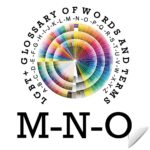 Men who have sex with men (MSM)
Men who have sex with men (MSM)
- “An abbreviation for men who have sex with men. This term emphasizes the behavior, rather than the identities of the individuals involved.” | Johns Hopkins University
- “Men who have sex with men (MSM), also known as males who have sex with males, are male persons who engage in sexual activity with members of the same sex, regardless of how they identify themselves. They may identify as gay, homosexual, bisexual, pansexual, or heterosexual; or dispense with sexual identification altogether.” | Wikipedia
- “Men Loving Men (MLM): commonly used by communities of color to denote the attraction of men to men.” | We Are Family
Male to female (MTF)
- “MTF people are assigned male at birth, but wish to present as female on either a temporary or permanent basis, depending upon the degree of their dysphoria.” | The Beaumont Society
- “Male-to-female transsexual or transgender person. Probably known as a trans woman. Someone assigned male at birth who identifies on the female spectrum.” | Johns Hopkins University
- “Transgender hormone therapy of the male-to-female (MTF) type, also known as transfeminine hormone therapy, is hormone therapy and sex reassignment therapy to change the secondary sexual characteristics of transgender people from masculine or androgynous to feminine.” | Wikipedia
Mx
- Though the earliest print evidence dates back to the late 1970s, the word (or title) has become increasingly popular in recent years. It is meant to be a gender-neutral alternative to established titles such as Mr. and Ms. and as the Ms. title gives no marital status, the Mx. title gives no gender. It is used by those who do not identify as being of a particular gender or those who do not wish to identified by gender. It is pronounced to sound like “mix” or “mux”. It’s unclear whether there should be a full stop after Mx | MEN R US
Mx | Wikipedia
When was the Mx gender-inclusive title created | Practical Androgyny A couple almost lost their dream house because Halifax bank refused to recognise the gender-neutral title Mx. | Pink News | 9 Feb 2022
Neopronoun
- “Neopronouns are preferred by some non-binary individuals who feel that neopronouns provide options to reflect their gender identity more accurately than conventional pronouns.” | Wikipedia
- “In basic terms, neopronouns are any pronouns other than he, she or they.” | Mermaids
- “The term “neopronouns” tends to refer to pronoun sets developed from the 20th century (or sometimes 19th century) to today. Many of them are actually not that new. ” | pronouns.org
Non binary
- “Most people – including most transgender people – are either male or female. But some people don’t neatly fit into the categories of “man” or “woman,” or “male” or “female.” For example, some people have a gender that blends elements of being a man or a woman, or a gender that is different than either male or female. Some people don’t identify with any gender. Some people’s gender changes over time. People whose gender is not male or female use many different terms to describe themselves, with nonbinary being one of the most common (sometimes spelt with a hyphen, as “non-binary”).” | National Center for Transgender Equality
- An umbrella term for people whose gender identity doesn’t sit comfortably with ‘man’ or ‘woman’. Non-binary identities are varied and can include people who identify with some aspects of binary identities, while others reject them entirely.” | Stonewall
- “An umbrella term for gender identities which are not confined by the gender binary of “women” and “men”. Non-binary people may identify with no gender at all or with more than one gender.” | The Proud Trust
- “An umbrella term describing anyone whose gender identity falls outside the binary of woman/man.” | Johns Hopkins University
“Non-binary (also spelt nonbinary) or genderqueer is a spectrum of gender identities that are not exclusively masculine or feminine—identities that are outside the gender binary. Non-binary identities can fall under the transgender umbrella since many non-binary people identify with a gender that is different from their assigned sex.” | Wikipedia
Outed/ outing
- “When a lesbian, gay, bi or trans person’s sexual orientation or gender identity is disclosed to someone else without their consent.” | Stonewall
- “The act of publicly declaring (sometimes based on rumor and/or speculation) or revealing another person’s sexual orientation or gender identity without that person’s consent. Considered inappropriate by a large portion of the LGBT community.” | We Are Family
- “Outing is the act of disclosing an LGBT person’s sexual orientation or gender identity without that person’s consent. Outing gives rise to issues of privacy, choice, hypocrisy, and harm in addition to sparking debate on what constitutes common good in efforts to combat homophobia and heterosexism. A publicized outing targets prominent figures in a society, for example well-known politicians, accomplished athletes or popular artists.” | Wikipedia
P-Q-R
- “Refers to a person whose romantic and/or sexual attraction towards others is not limited by sex or gender.” | Stonewall
- “A person of any gender who is attracted to people of all genders.” | The Proud Trust
- “Not limited in sexual choice with regard to biological sex, gender, or gender identity.” | We Are Family
- “A person who is emotionally, romantically, sexually, affectionately, or relationally attracted to people regardless of their gender identity or biological sex. Use of the term often signals a repudiation of the concept of binary sexes (a concept implied by “bisexual”).” | Johns Hopkins University
- “Pansexuality is sexual, romantic or emotional attraction towards people regardless of their sex or gender identity. Pansexual people may refer to themselves as gender-blind, asserting that gender and sex are not determining factors in their romantic or sexual attraction to others.” | Wikipedia
Passing
- “If someone is regarded, at a glance, to be a cisgender man or cisgender woman. Cisgender refers to someone whose gender identity matches the sex they were ‘assigned’ at birth. This might include physical gender cues (hair or clothing) and/or behaviour which is historically or culturally associated with a particular gender.” | Stonewall
- “In the context of gender, passing or blending is when someone, typically a transgender person, is perceived as cisgender instead of the sex they were assigned at birth. The person may, for example, be a transgender man who is perceived as a cisgender man. The appropriateness of the term passing, and the desirability of blending into cisgender society, are both debated within the transgender community. A trans person who is perceived as cisgender may face less prejudice, harassment, and risk of violence, as well as better employment opportunities, and this is sometimes termed passing privilege.” | Wikipedia
Political correctness
- Political correctness (adjectivally politically correct; commonly abbreviated PC) is a term used to describe language, policies, or measures that are intended to avoid offense or disadvantage to members of particular groups in society. | Wikipedia
- To be politically correct is to choose words (and sometimes actions) that avoid disparaging, insulting or offending people because they belong to oppressed groups. Oppressed groups are those subject to prejudice, disrespect or discrimination on the basis of their race, ethnicity, gender, sexual orientation or physical disability. | Its Origins and the Backlash Against It | The Conversation
- The public tend to think people are too easily offended, and some groups are particularly likely to say political correctness has gone too far Britons are relatively divided on whether people are too easily
offended or if the way they talk needs to be more sensitive to those from different backgrounds. 55% tend to think people take offence too readily and 42% lean more towards believing it’s important to change how they communicate. | Survey: political correctness and free speech | King’s College London/ Ipsos
Pronouns and preferred gender pronouns
- “Words used to refer to someone when their name isn’t used. They usually suggest a person’s gender, although some people prefer, or identify with, neutral pronouns. Common pronouns include her, she, him, he, they, them.” | The Proud Trust
- “Preferred gender pronouns or personal gender pronouns (often abbreviated as PGP) refer to the set of pronouns (in English, third-person pronouns) that an individual prefers that others use in order to reflect that person’s gender identity. In English, when declaring one’s preferred pronouns, a person will often state the subject, object, and possessive pronouns—for example, “she, her, hers”, “he, him, his”, or “they, them, theirs”—although sometimes, only the subject and object pronouns are stated (“he, him”, “she, her”, “they, them”). The pronouns preferred may include non-traditional ones such as “ze” and “zir”.” | The Proud Trust
Protected characteristics
- “It is against the law (in the UK) to discriminate against anyone because of age, gender reassignment, being married or in a civil partnership, being pregnant or on maternity leave, disability, race including colour, nationality, ethnic or national origin, religion or belief, sex, sexual orientation, These are called ‘protected characteristics’.” | GOV.UK
- Equality Act 2010 | MEN R US
QTIBPOC/ QPOC
- “QTIBPOC : An acronym used to abbreviate Queer Trans Intersex Black People & People of Colour, a specific ID that describes people who have heritages from continents of Africa, Asia, and Indigenous people of the Americas and Australia, and are invested in Queer politics and organising.” | Purple Rain Collective
- “An acronym for Queer People Of Colour. Another term used is QTIPOC (Queer, Transgender, and Intersex People of Colour). Queer people of colour often experience intersecting oppressions on the basis of race, gender, sexual orientation and other factors.” | Qmunity
- “An abbreviation for Queer & Trans People of Color and Queer & Trans Women of Color. These terms are rooted in the concept of intersectionality—which focuses on the intersections and interactions between various forms & systems of oppression, including: Racism, Classism, Heterosexism, Patriarchy, Religious Oppression, etc. A QTPOC framework attunes itself to the lives, challenges, and needs of people who experience these compounded and/or interlocking oppressions.” | County of San Mateo: LGBTQ Commission
Queer
- “Queer is a term used by those wanting to reject specific labels of romantic orientation, sexual orientation and/or gender identity. It can also be a way of rejecting the perceived norms of the LGBT community (racism, sizeism, ableism etc). Although some LGBT people view the word as a slur, it was reclaimed in the late 80s by the queer community who have embraced it.” | Stonewall
- “Historically this word was used as a negative insult, however many people feel they have reclaimed the word to have a positive meaning. Some people use it as a collective term for LGBT+ people, and some us it to explain their gender, sexual or political identity. Some people still use this word as an insult, this is LGBTphobia and should be challenged.” | The Proud Trust
- “Traditionally a pejorative term, queer has been appropriated by some LGBT people to describe themselves. However, it is not universally accepted even within the LGBT community and should be avoided unless someone self-identifies that way.” | We Are Family
- “Term describing people who have a non-normative gender identity, sexual orientation, or sexual anatomy — can include lesbians, gay men, bisexual people, transgender people, and a host of other identities. Since the term is sometimes used as a slur, it has a negative connotation for some LGBT people; nevertheless, others have reclaimed it and feel comfortable using it to describe themselves.” | Johns Hopkins University
“Queer is an umbrella term for sexual and gender minorities who are not heterosexual or are not cisgender. Originally meaning “strange” or “peculiar”, queer came to be used pejoratively against those with same-sex desires or relationships in the late 19th century. Beginning in the late 1980s, queer activists, such as the members of Queer Nation, began to reclaim the word as a deliberately provocative and politically radical alternative to the more assimilationist branches of the LGBT community.” | Wikipedia
Questioning
- “The process of exploring your own sexual orientation and/or gender identity.” | Stonewall
- “A person who is uncertain about and/ or exploring their own sexual orientation and/or gender identity.” | The Proud Trust
- “The process of considering or exploring one’s sexual orientation and/or gender identity.” | We Are Family
- “Refers to individuals who are in the process of examining their sexual orientation and/or gender identity.” | Johns Hopkins University
“The questioning of one’s sexual orientation, sexual identity, gender, or all three is a process of exploration by people who may be unsure, still exploring, or concerned about applying a social label to themselves for various reasons. The letter “Q” is sometimes added to the end of the acronym LGBT (lesbian, gay, bisexual, transgender); the “Q” can refer to either queer or questioning. | Wikipedia
Romantic orientation
- “A person’s romantic attraction to other people, or lack thereof. Along with sexual orientation, this forms a person’s orientation identity. Stonewall uses the term ‘orientation’ as an umbrella term covering sexual and romantic orientations.” | Stonewall
- “A way of characterizing one’s attraction to other people characterized by the expression or non-expression of love/romance/non-sexual interaction. People use a variety of labels to describe their romantic orientation, including aromantic, homoromantic, and heteroromantic.” | Johns Hopkins University
- “Romantic orientation, also called affectional orientation, indicates the sex or gender with which a person is most likely to have a romantic relationship or fall in love. It is used both alternatively and side by side with the term sexual orientation, and is based on the perspective that sexual attraction is but a single component of a larger dynamic.” | Wikipedia
Reciposexual
Reciprosexual | LGBTQIA Fandom
Back to topS-T-U
Sex
- “Assigned to a person at birth on the basis of primary sex characteristics (genitalia) and reproductive functions.” | Purple Rain Collective
- “Organisms of many species are specialized into male and female varieties, each known as a sex. Sex is the biological distinction of an organism between male and female.” | Wikipedia
Sexism/ Gender discrimination
- “Prejudice, stereotyping and/or discrimination based on a person’s sex or gender. Although sexism can in theory affect any gender, it is particularly documented as affecting self-identifying women and girls.” | Purple Rain Collective
- “Sexism is prejudice or discrimination based on a person’s sex or gender. Sexism can affect anyone, but it primarily affects women and girls. It has been linked to stereotypes and gender roles, and may include the belief that one sex or gender is intrinsically superior to another.” | Wikipedia
Sexual orientation
- “A person’s sexual attraction to other people, or lack thereof. Along with romantic orientation, this forms a person’s orientation identity. Stonewall uses the term ‘orientation’ as an umbrella term covering sexual and romantic orientations.” | Stonewall
- “The scientifically accurate term for an individual’s enduring physical, romantic and/or emotional attraction to members of the same and/or opposite sex, including lesbian, gay, bisexual and heterosexual (straight) orientations. Avoid the offensive term “sexual preference,” which is used to suggest that being gay or lesbian is voluntary and therefore “curable.” | We Are Family
- “An enduring emotional, romantic, sexual, and/or affectional attraction. Terms include gay, lesbian, heterosexual, bisexual, pansexual, and asexual. Sexual orientation is fluid, and people use a variety of labels to describe their own.” | Johns Hopkins University
- “Sexual orientation is an enduring pattern of romantic or sexual attraction (or a combination of these) to persons of the opposite sex or gender, the same sex or gender, or to both sexes or more than one gender. These attractions are generally subsumed under heterosexuality, homosexuality, and bisexuality, while asexuality (the lack of sexual attraction to others) is sometimes identified as the fourth category.” | Wikipedia
Sexual behaviour
- “Refers to an individual’s sexual activities or actions (what a person does sexually). Though often an individual’s sexual orientation is in line with their sexual behavior, it is not always the case.” | We Are Family
- “Human sexual activity, human sexual practice or human sexual behaviour is the manner in which humans experience and express their sexuality. People engage in a variety of sexual acts, ranging from activities done alone (eg: masturbation) to acts with another person (eg: sexual intercourse, non-penetrative sex, oral sex, etc) in varying patterns of frequency, for a wide variety of reasons.” | Wikipedia
Sexualised
- “To perceive, view, interpret or experience something in a sexual context.” | Purple Rain Collective
- “Sexualization (or sexualisation) is to make something sexual in character or quality or to become aware of sexuality, especially in relation to men and women. Sexualization is linked to sexual objectification.” | Wikipedia
Sexual minority
- “An all inclusive, politically oriented term referring to individuals who identify with a minority sexual orientation, sex identity, or gender expression/gender identity.” | We Are Family
- “A sexual minority is a group whose sexual identity, orientation or practices differ from the majority of the surrounding society. Primarily used to refer to LGB or non-heterosexual individuals, it can also refer to transgender, non-binary (including third gender) or intersex individuals.” | Wikipedia
Sexual preference
- “This term refers to an individual’s choice in regards to attraction. Sexual preference can be based on gender/sex, physical appearance (height, weight, race, ethnicity), or emotional connection. It is important to note that sexual preference denotes a “choice” and has a negative connotation when used to describe the LGBTQ population.” | We Are Family
Side
- Side describes someone who doesn’t practice anal sex. It’s a newish term (this century) which is we have includes our own words here as references are few. It’s an alternative to the traditional binary classification which describes the preferred sexual position; eg: top, bottom, or versatile. The term was coined for gay men to have the language to express this sexual and erotic preference. | MEN R US
- A homosexual male who does not enjoy anal penetration (giving or receiving), but will engage in other forms of same sex activity (fellatio, frottage, mutual masturbation, etc). | Urban Dictionary
- Side describes someone who doesn’t practice anal sex and therefore doesn’t define himself as top, bottom or versatile. | Wikipedia
Straight
- “Pop culture term used to refer to individuals who identify as a heterosexual, meaning having a sexual, emotional, physical and relational attraction to individuals of the “opposite” gender/sex. The term “straight” often has a negative connotation within the LGBTQ population, because it suggested that non-heterosexual individuals are “crooked” or “unnatural.” | We Are Family
- “Heterosexuality is romantic attraction, sexual attraction or sexual behavior between persons of the opposite sex or gender. As a sexual orientation, heterosexuality is “an enduring pattern of emotional, romantic, and/or sexual attractions” to persons of the opposite sex; it “also refers to a person’s sense of identity based on those attractions, related behaviors, and membership in a community of others who share those attractions.” Someone who is heterosexual is commonly referred to as straight.” | Wikipedia
Stereotype
- “A fixed idea that people have about what someone or something is like, often based on assumption and myth.” | The Proud Trust
- “Lesbian, gay, bisexual and transgender (LGBT) stereotypes are conventional, formulaic generalizations, opinions, or images based on the sexual orientations or gender identities of LGBT people. Stereotypical perceptions may be acquired through interactions with parents, teachers, peers and mass media, or, more generally, through a lack of firsthand familiarity, resulting in an increased reliance on generalizations.” | Wikipedia
Transgender/ Trans
- “An umbrella term to describe people whose gender is not the same as, or does not sit comfortably with, the sex they were assigned at birth. Trans people may describe themselves using one or more of a wide variety of terms, including (but not limited to) transgender, transsexual, gender-queer (GQ), gender-fluid, non-binary, gender-variant, crossdresser, genderless, agender, nongender, third gender, bi-gender, trans man, trans woman, trans masculine, trans feminine and neutrois.” | Stonewall
- “An abbreviation for transgender or transsexual.” | Purple Rain Collective
- “An umbrella term (adj.) for people whose gender identity and/or gender expression differs from the sex they were assigned at birth. The term may include but is not limited to: transsexuals, cross-dressers and other gender-variant people. Transgender people may identify as female-to-male (FTM) or male-to-female (MTF). Use the descriptive term (transgender, transsexual, cross-dresser, FTM or MTF) preferred by the individual. Transgender people may or may not decide to alter their bodies hormonally and/or surgically.” | We Are Family
- “Transgender people have a gender identity or gender expression that differs from the sex that they were assigned at birth. Some transgender people who desire medical assistance to transition from one sex to another identify as transsexual.” | Wikipedia
Transitioning/ Transition
- “The steps a trans person may take to live in the gender with which they identify. Each person’s transition will involve different things. For some this involves medical intervention, such as hormone therapy and surgeries, but not all trans people want or are able to have this. Transitioning also might involve things such as telling friends and family, dressing differently and changing official documents.” | Stonewall
- “A term that refers to changes a person might make to affirm their gender. These changes might be medical and/ or social. E.g. a person might change their name, pronoun or clothing. A person might start to take prescribed hormones or make surgical changes to their bodies. Everyone’s transition will be different.” The Proud Trust
- “Altering one’s birth sex is not a one-step process; it is a complex process that occurs over a long period of time. Transition includes some or all of the following personal, legal and medical adjustments: telling one’s family, friends and/or co-workers; changing one’s name and/or sex on legal documents; hormone therapy; and possibly (though not always) one or more forms of surgery.” | We Are Family
- “Gender transitioning is the process of changing one’s gender presentation and/or sex characteristics to accord with one’s internal sense of gender identity – the idea of what it means to be a man or a woman, or to be non-binary or genderqueer.” | Wikipedia
Transsexual/ Transexual
- “This was used in the past as a more medical term (similarly to homosexual) to refer to someone whose gender is not the same as, or does not sit comfortably with, the sex they were assigned at birth.” | Stonewall
- “This term is still used by some although many people prefer the term trans or transgender. “An older term which originated in the medical and psychological communities. While some transsexual people still prefer to use the term to describe themselves, many transgender people prefer the term transgender to transsexual. Unlike transgender, transsexual is not an umbrella term, as many transgender people do not identify as transsexual. It is best to ask which term an individual prefers.” | We Are Family
- “Term referring to a person whose gender identity consistently differs from what is culturally associated with his/her biological sex at birth. Some choose to physically change their body so it matches their gender identity. Use caution with this term as many trans people do not identify with it.” | Johns Hopkins University
- “Transsexual people experience a gender identity that is inconsistent with their assigned sex and desire to permanently transition to the sex or gender with which they identify, usually seeking medical assistance (including sex reassignment therapies, such as hormone replacement therapy and sex reassignment surgery) to help them align their body with their identified sex or gender. Transsexual is a subset of transgender, but some transsexual people reject the label of transgender.” | Wikipedia
Transphobia
- “The fear or dislike of someone based on the fact they are trans, including denying their gender identity or refusing to accept it. Transphobia may be targeted at people who are, or who are perceived to be, trans.” | Stonewall
- “Discrimination against and/or fear or dislike of people whose gender identity does not align with the gender they are assigned at birth, or whose gender identity or expression doesn’t appear to align. This also includes the perpetuation of negative myths and stereotypes through jokes and/or through personal negative thoughts about trans people.” | The Pride Trust
- “Transphobia encompasses a range of negative attitudes, feelings or actions towards transgender people or transness in general. Transphobia can include fear, aversion, hatred, violence, anger, or discomfort felt or expressed towards people who do not conform to social gender expectations. It is often expressed alongside homophobic views and hence is often considered an aspect of homophobia. Transphobia is a type of prejudice and discrimination, similar to racism and sexism, and transgender people of color are often subjected to all three forms of discrimination at once.” | Wikipedia
Transvestism/ Transvestite
- “Transvestism is the practice of dressing in a manner traditionally associated with the opposite sex. In some cultures, transvestism is practiced for religious, traditional, or ceremonial reasons.” | Wikipedia
- “Transvestites (also called cross-dressers) are people who choose to wear clothes which are associated with a different gender identity to their own. This typically means a man (by sex)who dresses in feminine clothes, or a woman (by sex) who dresses in masculine clothes. Although this can include dressing androgynously and wearing both “men’s” and “women’s” clothes.” | Gender Wiki
V-W-X-Y-Z
 Women who have sex with women (WSW)
Women who have sex with women (WSW)
- “An abbreviation for women who have sex with women. This term emphasizes the behavior, rather than the identities of the individuals involved.” | Johns Hopkins University
- “Women who have sex with women (WSW) are women who engage in sexual activities with other women, whether or not they identify themselves as lesbian, bisexual, heterosexual, or dispense with sexual identification altogether. The term WSW is often used in medical literature to describe such women as a group for clinical study, without needing to consider sexual self-identity.” | Wikipedia
Women loving women (WLW)
- “Commonly used by communities of color to denote the attraction of women to women.” | Johns Hopkins University
Woke
- Woke | MEN R US
Zie and Hir
- “The most common spelling for gender neutral pronouns. Zie is subjective (replaces he or she) and Hir is possessive and objective (replaces his or her).” | We Are Family
- “A third-person pronoun is a pronoun that refers to an entity other than the speaker or listener. The English pronouns he and she are third-person personal pronouns specific to the gender of the person (not to be confused with grammatical gender).” | Wikipedia
Other words and terms
Most of the words listed here have been used to offend or denigrate LGBT+ people, even today. But, we thought it would be interesting to try and find the origins of these words and phrases.
It’s also worth noting that some of these words have been reclaimed by LGBT+ people, such as faggot and queer.
Faggot
Faggot (slang) | WikipediaFaggot (food) | Wikipedia
Faggot (bundle of sticks/ twigs/ brushwood tied together for use as fuel) | Wikipedia
Faggot | Oxford English Dictionary
Faggot | Urban Dictionary
Why Straight People Shouldn’t Throw Around the F-Word | New Zealand AIDS Foundation Justin Thomas says homophobic slur ‘not me’ and gets Rory McIlroy’s support | The Guardian | 20 Jan 2021
Is it ever okay to say the word ‘fag?’ | Pink News | 25 Aug 2018
Fairytale ending: Shane MacGowan explains ‘faggot’ reference in Christmas song | The Irish Times | 7 Dec 2018
Fuck
Fuck | WikipediaFuck | Urban Dictionary Fugging hell: tired of mockery, Austrian village changes name | The Guardian | 26 Nov 2020
Fugging, Upper Austria | Wikipedia On the Origin of Fuck | So Long as it’s Words | 12 Feb 2014
A F*cking Short History of the F-Word | Huff Post | 29 Jul 2013
Etymology of the the ‘F-Word’ | Snopes | 13 Jul 1999
Husky says fuck! | headgrr | 8 Jun 2015 | 9s
So gay
Ur So Gay | WikipediaThat’s so gay | Urban Wikipedia “That’s So Gay” Is Just So Wrong | Psychology Today | 5 Mar 2018
The ‘gay’ word: what does it mean when young people use it negatively? |The Guardian | 21 Dec 2015
The Gay Word | Documentary | SUStv Southhampton | 21 Dec 2015 | 47m 59s
Maybe ‘that’s so gay’ is actually ok for young people to say | The Conversation | 4 Jul 2014
Why Is It OK To Say “That’s So Gay?” | NPR | 25 Jun 2009
Poofter
Poofter | Urban DictionaryPoofter | Oxford Learners Dictionary
Poofter | Wiktionary
Poof | Dictionary.com Gay man faces homelessness after teenage thugs who spat and hurled homophobic slurs at him every time he left the house | Pink News | 9 Sep 2020
Will Young ‘called homophobic slur by bus driver’ | BBC News | 7 Jan 2018
Labour MP mocked ‘fudge packers and poofters’ and lashed out at gay ‘heterophobes’ | Pink News | 23 Oct 2017
Nigel Farage Defends Use Of Words ‘Chinky’ And ‘Poofter’ | Huff Post | 27 Jan 2015
Queer
Queer | WiktionaryQueer | Oxford Learners Dictionary
Queer | Urban Dictionary
Queer | Dictionary.com South Africa: Meet the queer vloggers taking back the narrative | African Arguments | 4 Mar 2021
Meet the Queer Skate Collective Who Scored Their First Calvin Klein Campaign | Paper | 4 Mar 2021
A Guide to Russell T. Davies’s Queer Canon | Vulture | 18 Feb 2021
Sir Ian McKellen urges queer community to stand up for trans rights | Gay Times | 2021
Tracing the history of the word ‘queer’ | Dazed | 28 Jul 2016
Is The Word “Queer” Offensive? | Bustle | 4 Feb 2016
Pansy
Pansy (flower) | WikipediaPansy | Urban Dictionary
Pansy | Dictionary.com
Pansy | Online Slang Dictionary ‘Socialist Pansies’ Referenced in TV Ad From GOP Senate Candidate | The Advocate | 17 Aug 2020
A brief history of the Pansy Craze – the beginning of LGBTQ nightlife | Pink News | 20 Oct 2017
Pansy Craze: the wild 1930s drag parties that kickstarted gay nightlife | The Guardian | 14 Sep 2017
Homo
Homo | Oxford Learners DictionaryHomo | Wikipedia
Homo | Urban Dictionary
No homo
No homo | WiktionaryNo homo | Urban Dictionary
No homo | Dictionary.com No homo has been added to the Oxford English Dictionary | Pink News | 3 Apr 2018
NBA player Nikola Jokic fined $25,000 for saying ‘no homo’ | Pink News | 8 Nov 2018
Straight men now feel the need to say ‘no homo’ when discussing emotions | The Guardian | 23 Feb 2014
Super straight
The Sexual Identity That Emerged on TikTok | The Atlantic | 7 Apr 2021The ‘super straight’ campaign taking over TikTok is actually just ugly transphobic trolling | Mashable UK | 14 May 2021
The Super Straights Are Definitely Not Okay | Refinary29 | 12 Mar 2021
Inside the ‘Super Straight’ Movement That Got Banned on TikTok and Reddit | Vice | 24 Mar 2021
Transphobic trend ‘super straight’ has links to the far-right and neo-Nazis | Pink News | 8 Mar 2021
Dyke
Dyke | WikipediaDyke | Urban Dictionary
Woke
Woke can mean different things to different people. While some use it as being actively aware (awake/ vigilant), some use it as an insult and a stick with which to beat others.
- Merriam-Webster Dictionary says “woke” is defined as “aware of and actively attentive to important facts and issues (especially issues of racial and social justice).”
- Oxford English Dictionary “woke” is defined as “Originally: well-informed, up-to-date. Now chiefly: alert to racial or social discrimination and injustice.”
- One Urban Dictionary contributor defines woke as “being aware of the truth behind things ‘the man’ doesn’t want you to know”. Meanwhile, a concurrent definition signals a shift in meaning to “the act of being very pretentious about how much you care about a social issue”.
A history of “wokeness” | Vox | 9 Oct 2020
How the word ‘woke’ was weaponised by the right | The Guardian | 21 Jun 2020
Where ‘woke’ came from and why marketers should think twice before jumping on the social activism bandwagon | The Conversation | 8 Sep 2019 Back to top
Labels, acronyms, gender pronouns, and symbols
The thing about labels...
 We often use labels because they fit and better connect us with others like us. For example, “I’m a gay man”, “I’m a bear” or “I’m part of the LGBT community.” Others find them rigid and fixed, preferring instead to self-identify as queer, or pansexual, for example, or refuse to be labelled at all. We’ve also more about labels and types in MEN.
We often use labels because they fit and better connect us with others like us. For example, “I’m a gay man”, “I’m a bear” or “I’m part of the LGBT community.” Others find them rigid and fixed, preferring instead to self-identify as queer, or pansexual, for example, or refuse to be labelled at all. We’ve also more about labels and types in MEN.
Society is often quick to lump everyone who is not heterosexual under a ‘homosexual’, ‘gay’ or ‘LGBT’ banner. By adhering to society’s labels one tends to think of these terms of having to be this or that, one thing or the other, leaving other people out in the cold.
Cut out the labels
The thing about labels is that you cut them out and replace them with your own. What you call yourself is up to you. The important thing is that you choose what feels comfortable for you. There is a growing movement of people who refuse to be labelled and are striking out to define themselves on their own terms. Having said that, society feels safer by putting people in boxes (for all sorts of things) so while you may not want a label it can be a struggle defining yourself to others.
Reduced to one thing
There’s also something to be said about being reduced to one thing, and few if any of us like this. Gay men, particularly, are often reduced to sexually transmitted infections, sexual acts, or hedonism when, in fact, we are (of course) so much more. It’s one of the reasons why we built this website; being gay is an important part of who we are but it’s not all that we are.
People, the media especially, will define us in whatever ways are convenient and easy, often at the expense of accuracy and recognising our individuality. While some of us may be gay, lesbian, bi or trans (or whatever we choose to call ourselves) we are also parents, workers, learners and explorers. At times we feel indignant, other times we shrug and realise that’s just the way it is, but there are other times when we’re actually quite pissed off!
Back to topLGBT or LGBTQIAABAACG
 The initials LGBT stand for lesbian, gay, bisexual, and transgender or transsexual are intended to emphasise inclusion and diversity of sexuality and gender identity-based cultures. Or, to put it another way, anyone who is not straight (heterosexual). Updated from LGB, it is an established term for many when referring to the LGBT community.
The initials LGBT stand for lesbian, gay, bisexual, and transgender or transsexual are intended to emphasise inclusion and diversity of sexuality and gender identity-based cultures. Or, to put it another way, anyone who is not straight (heterosexual). Updated from LGB, it is an established term for many when referring to the LGBT community.
Sometimes, the letter ‘Q’ is added for those who identify as queer or those questioning their sexuality. People also define themselves as intersex or asexual so we need to add an ‘I’ and an ‘A’. This is perfectly understandable, though we run the risk of becoming LGBTQ, or is it LGBTQIA?
And what about our allies, should it then be LGBTQIAA? And how do we include those who define themselves as bigender, androgyne, agender, cisgender, and genderqueer?
Also, we should not forget that the LGBT community was devastated by the HIV and AIDS epidemic, and we still experience HIV stigma, even in the 21st century. So, while some see the plus sign at the end of LGBT+ as a symbol for further inclusion, others see it as support and acceptance for those living with HIV.
Whatever letters you choose to use, the evolution of LGBT with all its colours of the rainbow is perhaps simply a reflection of the millions of people that make up our multi-faceted community wanting, others demanding, inclusion. There’s no one fixed choice or single option, and that’s perhaps a good thing, as our community, and communities, grow and evolve.
Two-spirit and LGBT
Two-spirit (also two spirit, 2S or, occasionally, two-spirited) is a modern, pan-Indian, umbrella term used by some Indigenous North Americans to describe Native people in their communities who fulfil a traditional third-gender (or other gender-variant) ceremonial and social role in their cultures. “Two Spirit” was not intended to be interchangeable with “LGBT Native American” or “Gay Indian”; rather, it was created in English (and then translated into Ojibwe), to serve as a pan-Indian unifier, to be used for general audiences instead of the traditional terms in Indigenous languages for what are diverse, culturally-specific ceremonial and social roles, that can vary widely (if and when they exist at all). Opinions vary as to whether or not this objective has succeeded.
Two-spirit | Wikipedia LGBT Glossary | King’s College LondonLGBT | Wikipedia
The alphabet soup of Identity from LGBTIQ… to XYZ | LGBTIQ.XYZ
Is it LGBTQ+ or LGBTQIA? | Homo Culture * | 26 Aug 2020 Is it LGBTQ+ or LGBTQIA? | Homo Culture | 26 Aug 2020
The LGBTQAlphabet | Equinox/ LGBT Community Center, NYC | 5 Jun 2017 LGBT Myths Debunked | BuzzFeedYellow | 14 Jun 2015 | 2m10s
16 LGBT Coming Out Secrets | Buzz Feed Yellow | 7 Jul 2014 | 1m59s
History of LGBT Characters at DC | DC Entertainment | 5 Jun 2015 | 7m16s
Moment Obama Heckled at LGBT Reception | BBC News | 25 Jun 2015 | 2m26s
The plus sign and the asterisk
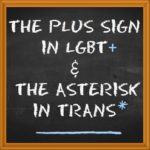 Opinions and viewpoints about using the plus sign in LGBT+, and the asterisk in trans* can be strong and heartfelt. They merit their own content, but we’re not doing that here, rather we’ll try to explain their use (within the context of LGBT and trans) and include some obersations.
Opinions and viewpoints about using the plus sign in LGBT+, and the asterisk in trans* can be strong and heartfelt. They merit their own content, but we’re not doing that here, rather we’ll try to explain their use (within the context of LGBT and trans) and include some obersations.
With vastly different lived experiences, attempting to represent an entire community with acronyms or labels is complicated and challenging. For example, some find labels empowering and inclusive while others think they are reductive, they divide, compartmentalise and oppress LGBTQIA+ people.
We also have mixed feelings about words that include any punctuation because they can confuse (Internet) searches and words are not necessarily pronounced differently. What do you think?
The plus sign in LGBT+
The plus and minus signs, + and −, are mathematical symbols used to represent positive and negative as well as addition and subtraction. Plus and minus are Latin terms meaning “more” and “less”, respectively.
The + at the end of ‘LGBT+’ indicates there is more to the alphabet of identities and aims to encompass spectrums of sexuality and gender and be more inclusive. This may appear as LGBT+, LGBTQ+ or LGBTQIA+ and so on.
However, the LGBT+ community was devastated by the HIV and AIDS epidemic in the 80s and 90s and we are still vulnerable to HIV stigma, even in the 21st century. So, some see the plus at the end of LGBTQIA+ to signify support and acceptance of those who live with HIV.
The asterisk in trans*
The asterisk symbol, *, at the end of a word is often used to refer readers to a note at the bottom of a page. It’s also used to make words appear less offensive, like f**k or s**t. The asterisk, *, at the end of trans* indicates there is more; trans women and trans men, for example.
For some, however, it’s also a source of controversy because asterisks are often used in reference a footnote to qualify or invalidate something* so, by implication, a person’s gender identity is something that requires an explanation or may not be genuine. Also, to quote the Transgender Teen Survival Guide “The term “trans” already covers everything! You’re transgender if you identify as a gender other than the one you were assigned at birth. That includes trans women, trans men, nonbinary people, genderqueer people, agender people, bigender people, and so on. So we don’t need to use the asterisk because it’s superfluous- transgender is already an umbrella term without the asterisk.”
*Terms and conditions apply.
LGBT | WikipediaWhat does LGBTQ+ mean? | OK2BME
What is LGBTQ+? What does the plus stand for and is anyone left out? | Pink News | 15 Mar 2015
We know what LGBT means but here’s what LGBTQQIAAP stands for | BBC Newsbeat | 25 Jun 2015 On the asterisk and why we don’t use it | Transgender Teen Survival Guide
What does the asterisk in “trans*” stand for? | It’s Pronounced Metrosexual
Earliest use of an asterisk (*) to indicate a zero-to-many character wildcard? | Stack Exchange
The Oxford English Dictionary added ‘Trans*.’ Here’s what the label means | Time | 3 Apr 2018
About that often misunderstood asterisk | Practical Androgyny | 31 Oct 2013 Back to top
To be or not to be queer
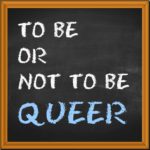 The meaning of ‘queer’ has changed a lot over recent decades. From being a slur, to being reclaimed by some LGBT+ people and being rejected by others. The short answer is that ‘queer’ means different things to different people.
The meaning of ‘queer’ has changed a lot over recent decades. From being a slur, to being reclaimed by some LGBT+ people and being rejected by others. The short answer is that ‘queer’ means different things to different people.
Finding umbrella terms for a community as diverse as ours isn’t easy and over the last fifty years or so, we’ve cycled the ‘LGB community’, the ‘gay community’ the ‘gay and lesbian community’, and the ‘LGBT community … and so on … including those who don’t believe we should have labels like this at all, or be lumped together in this way.
Like the word “gay” used to mean “happy”, queer used to mean “strange” or “different”. But like all words, its use evolved over time and quickly came to mean something different.
There’re lots of reasons why people identify with ‘queer’, either individually or as an umbrella term. It encompasses a wide range of identities, and doesn’t risk excluding groups that the acronym may leave out. Some people find queer’s ambiguity appealing since it gives a sense of community without the need for a more specific label. You might be gay, I might be trans – but we’re both queer, and that brings us together.
For some, using ‘queer’ also aims to be an all-inclusive, a unifying umbrella term that includes people who are same gender attracted and gender diverse as well as the intersections of people and identities within our community. Also, people like it because it’s easy to say, and a whole lot fewer syllables than LGBTIQ and overall, it’s easier to use and remember; especially if this all new to you.
There are people who dislike the term, mostly due of the fact that it has also been a term that’s used as a slur (a word people use with hate). In the 1960s onwards, people used the word queer as a weapon, usually saying it when attacking or trying to humiliate LGBTIQ people. It wasn’t until the 1980s when activists began to reclaim it, writing it on banners and flags when marching and protesting.
Reclaiming language is a powerful tool against other people’s hate and bullying. The thinking behind it is that you can’t be hurt by words that you use to describe yourself. Take the word ‘slut’ for example. If someone calls you a slut it takes away a lot of that person’s power if you turn around and say “I am, so what?”
For some, words do hurt, and for anyone who’s been called queer as an insult, hearing it used within your community can remind you of those experiences. This doesn’t mean that it’s never OK to use the phrase ‘the queer community’. It’s important to keep in mind that there is no umbrella term that everyone is 100% happy with. Lots of people don’t like LGBTIQ! So there’s no one size fits all.
So while it’s a word we use, keep in mind that not everybody uses it, and that’s totally OK if they don’t.
BTW: MEN R US has adapted these words from an original piece by MINUS18 Australia titled “What Does Queer Mean Anyway? with their kind permission.
What Does Queer Mean Anyway? | MINUS18 | 18 Oct 2017
Reclaiming ‘queer’ | Lacuna Voices
How the word ‘queer’ was adopted by the LGBTQ community | Columbia Journalism Review | 22 Jan 2019
Queer politics has been a force for change; celebrate how far we’ve come | The Guardian | 27 Jul 2017
Tracing the history of the word ‘queer’ | Dazed | 28 Jul 2016
Queering the map
Queering the Map is a community-generated mapping project that geo-locates queer moments, memories and histories in relation to physical space. As queer life becomes increasingly less centered around specific neighborhoods and the buildings within them, notions of ‘queer spaces’ become more abstract and less tied to concrete geographical locations. The intent of the Queering the Map project is to collectively document the spaces that hold queer memory, from park benches to parking garages, to mark moments of queerness wherever they occur.
Queering the map Back to topQTIBPOC and QPOC
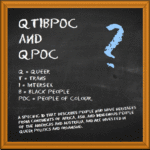 Terminology and definitions to describe different LGBT+ groups of people are constantly evolving. LGB to LGBT to LGBT+ and LGBTQIA being an example. MEN R US is a gay men’s health organisation and somtimes we arrive late finding out about and understanding new terms, accronyms, and abbreviations. But, from what we can gather, QPOC and QTIBPOC have emerged over the past year or two from these communities. Although the aim is to become inclusive and representative, it’s not always immediately obvious what these more newly evolved terms mean. Here are three defininitions:
Terminology and definitions to describe different LGBT+ groups of people are constantly evolving. LGB to LGBT to LGBT+ and LGBTQIA being an example. MEN R US is a gay men’s health organisation and somtimes we arrive late finding out about and understanding new terms, accronyms, and abbreviations. But, from what we can gather, QPOC and QTIBPOC have emerged over the past year or two from these communities. Although the aim is to become inclusive and representative, it’s not always immediately obvious what these more newly evolved terms mean. Here are three defininitions:
“QTIBPOC : An acronym used to abbreviate Queer Trans Intersex Black People & People of Colour, a specific ID that describes people who have heritages from continents of Africa, Asia, and Indigenous people of the Americas and Australia, and are invested in Queer politics and organising.”
QTIBPOC | Purple Rain Collective
“An acronym for Queer People Of Colour. Another term used is QTIPOC (Queer, Transgender, and Intersex People of Colour). Queer people of colour often experience intersecting oppressions on the basis of race, gender, sexual orientation and other factors.”
QPOC | Qmunity
“An abbreviation for Queer & Trans People of Color and Queer & Trans Women of Color. These terms are rooted in the concept of intersectionality—which focuses on the intersections and interactions between various forms & systems of oppression, including: Racism, Classism, Heterosexism, Patriarchy, Religious Oppression, etc. A QTPOC framework attunes itself to the lives, challenges, and needs of people who experience these compounded and/or interlocking oppressions.”
QTPOC/ QTWOC | County of San Mateo: LGBTQ Commission
Related internal links to other parts of this website
Black Lives Matter Movements, and learning resources | MEN R USBME, BAME and BEM | MEN R US
Racism and gay men | MEN R US
Black, Asian and Minority Ethnic LGBT+ organisations | MEN R US
How to be an ally | MEN R US
The word is out | MEN R US Back to top
BIPOC
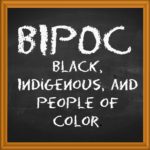 BIPOC stands for Black, Indigenous, and people of colour.
BIPOC stands for Black, Indigenous, and people of colour.
Pronounced “by-pock”, it is a term specific to the United States and refers to black, indigenous, and other people of colour. It aims to emphasise the historical oppression of black and indigenous people and demonstrate solidarity between communities of colour.
The term has started to appear in the UK but, says Chardine Taylor Stone @ChardineTaylor, “BIPOC makes no sense in the UK because the I is for indigenous Americans. Indigenous in the UK is a White British person. Let’s not just import USA terms without thinking about what they mean.”
The BIPOC Project | USAPerson of color | Wikipedia Why we use BIPOC | YMCA Seattle | USA | 6 Apr 2022
Why the term “BIPOC” is so complicated, explained by linguists | Vox | 30 Jun 2020 Back to top
BME, BAME and BEM
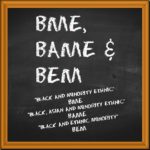 Government, statutory and other organisations use a range of systems to record and refer to ethnicity in the United Kingdom. Recording information in this way helps to monitor the uptake of services and employee recruitment in organisations.
Government, statutory and other organisations use a range of systems to record and refer to ethnicity in the United Kingdom. Recording information in this way helps to monitor the uptake of services and employee recruitment in organisations.
BME, BAME and BEM are three acronyms (abbreviations) you may have heard of – perhaps in the news, when filling out surveys, or when applying to use a service.
- “Black and minority ethnic”- BME
- “Black, Asian and minority ethnic” – BAME
- “Black and ethnic minority” – BEM
Using categories are the subject to criticism and debate; for example, the nature of ethnicity, how or whether it can be categorised, and the relationship between ethnicity, race, and nationality. While they can be catchy and convenient, acronyms are not necessarily widely understood and can have negative and hurtful undertones.
BAME acronym: UK broadcasters commit to avoiding catch-all term | BBC News | 8 Dec 2021“Should BAME be ditched as a term for black, Asian and minority ethnic people?” was the headline from a BBC News 17 May 2018 article, and “Six in 10 UK health workers killed by Covid-19 are BAME” was the headline from a Guardian 25 May 2020 article. More recently, the BBC, ITV, Channel 4 and Channel 5 welcomed the findings from the Sir Lenny Henry Centre for Media Diversity saying UK broadcasters commit to avoiding catch-all term (BBC News, 8/12/21) in favour of the use of more specific terms to describe ethnicity. The report concluded there “was a lack of trust” around the term BAME.
So the term BAME has had its day. But what should replace it? | The Guardian | 8 Apr 2021
Should we still be saying ‘BAME’ in 2021? | Evening Standard | 29 Mar 2021
Six in 10 UK health workers killed by Covid-19 are BAME | The Guardian | 25 May 2020
Please, don’t call me BAME or BME! | Civil Service (Blog) | 8 Jul 2019
Should BAME be ditched as a term for black, Asian and minority ethnic people? | BBC 17 May 2018
Is it time to ditch the term ‘black, Asian and minority ethnic’ (BAME)? | The Guardian | 22 May 2015 Classification of ethnicity in the United Kingdom | Wikipedia
Institute of Race Relations (IRR)
Ethnicity facts and figures | GOV.UK Visibility | BAME Voices | Stonewall | 27 Nov 2018 | 2m 21s
Race | BAME Voices | Stonewall | 27 Nov 2018 | 3m 33s
Culture | BAME Voices | Stonewall | 27 Nov 2018 | 2m 53s
Religion | BAME Voices | Stonewall | 27 Nov 2018 | 4m 40s
Gender | BAME Voices | Stonewall | 27 Nov 2018 | 5m 28s
Related internal links to other parts of this website
Black Lives Matter Movements, and learning resources | MEN R USQTIBPOC and QPOC | MEN R US
Racism and gay men | MEN R US
Black, Asian and Minority Ethnic LGBT+ organisations | MEN R US
How to be an ally | MEN R US
The word is out | MEN R US Back to top
Gender pronouns
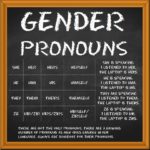 The 21st-century is seeing the cultural visibility of transgender, genderqueer, and gender-nonconforming communities expand in extraordinary ways; particularly in the way that we view and understand gender.
The 21st-century is seeing the cultural visibility of transgender, genderqueer, and gender-nonconforming communities expand in extraordinary ways; particularly in the way that we view and understand gender.
Though awareness about gender diversity is improving, people can struggle with the technical and grammatical aspects of using gender pronouns correctly. They can seem overwhelming, particularly if you’re worried about getting a pronoun wrong and causing offence.
Though the use of gender pronouns is becoming more widespread today, the emergence of sex-neutral terms can be traced back to the 1700s. We can only skate the surface here but this section should help you dip your toe in the water.
Most usually, we assign or give gender-specific pronouns like “he” or “she” to those around us. However, some people have a gender expression that is neither male or female. It may be fluid, neutral or they may identify their gender in a different way. Also referred to as Personal Gender Pronouns (PGPs), gender pronouns and can be:
- gender-neutral; eg: them, they, theirs
- gender-specific (binary); eg: he, she, hers, his
Asking and correctly using someone’s personal pronoun shows respect for that person and their gender identity. The opposite is true and it can be offensive and hurtful when someone is referred to with the wrong pronoun.
Here are three examples which should hopefully help you better understand how they work:
- If a person asks where the toilets are, say: “All toilets are along the corridor on the right” rather than ‘the ladies (or gents) toilets are along the corridor on the right”
- Avoid using binary terms such as “ladies and gentlemen” using gender-neutral terms instead like “hello everyone.” Using neutral pronouns such as “they” ensures that everyone is involved regardless of their identity
- If you are managing a meeting, consider asking members of a group to share their preferred pronouns when you meet, sharing yours first. For example “My name is Paulo and my pronouns are they, them, theirs” or “My name is Sam and my pronouns are he, his”
What are personal pronouns and why do they matter? | US | mypronouns.org
She | He | They | Ze | Neo pronouns | US | mypronouns.org
Gender pronouns | University of York Preferred gender pronoun | Wkipedia
Gender binary | Wikipedia
Non-binary gender | Wikipedia A brief history of gender neutral pronouns | BBC Newsbeat | 22 Sep 2019
He, she, they … should we now clarify our preferred pronouns when we say hello? | The Guardian | 13 Sep 2019
Gender diversity is more accepted in society, but using the pronoun ‘they’ still divides | The Conversation | 14 Sep 2018
Beyond ‘he’ and ‘she’: The rise of non-binary pronouns | BBC | 7 Dec 2015 Back to top
MSM and GBMSM
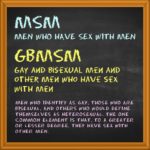 The term men who have sex with men means men who have sex with men. It’s that straight forward. The acronym or abbreviation is MSM.
The term men who have sex with men means men who have sex with men. It’s that straight forward. The acronym or abbreviation is MSM.
This term “…comprises men who identify as gay, those who are bisexual, and others who would define themselves as heterosexual. The one common element is that, to a greater or lesser degree, they have sex with other men.”
The term first appeared in the early 1990s in social research and medical literature during the HIV and AIDS epidemic. It’s still used today and some LGBT+ and gay men’s health projects use it to reflect inclusiveness. Nevertheless, the term didn’t come from the LGBT+ community; rather it’s a construct, an invention originating from epidemiologists and professionals to help them in their work.
In 1994, the MESMAC Guide said:
“Men who have sex with men comprises men who identify as gay, those who are bisexual, and others who would define themselves as heterosexual. The one common element is that, to a greater or lesser degree, they have sex with other men.
It should be emphasised that the term does not refer solely to men who do not identify as gay, and some projects and workers have chosen instead to describe their group as gay men and other men who have sex with men. The decision to mention gay men specifically is due to a number of factors.
There is a political element in a conscious decision to use the term gay men stop some fellow professionals have difficulty saying the word gay, preferring homosexual. They may then progress to gays or possibly even gay men. Some workers may feel using men who have sex with men on its own as an all-embracing term encourages the denial of our ‘out’ gay identity.
Finally, men who identify as gay may not be familiar with the term men who have sex with men and maybe alienated it or mystified by it. It is thus advisable to prefix it with gay men and other …
It should be stressed that there is a clear rationale behind the use of the term men who have sex with men: reference to gay men alone might leave married men, men unsure of their sexual identity, and others who do not find themselves as gay feeling left out or marginalised. These may be precisely the men that it is important to target, due to their lack of access to gay social and support networks.”
Source: The MESMAC Guide: A practical resource for community-based HIV prevention with gay and bisexual men and other men who have sex with men | 1994 | Health Education Authority
Gay and bisexual men and other men who have sex with men (GBMSM)
Most recently, gay and bisexual men and other men who have sex with men (GBMSM) increasingly appears in studies and research papers.
While we understand how the term can be very helpful in sexual health and social research fields, gathering and identifying data, for example, it also diminishes our out gay identity, and some gay men resent being reduced to words and letters. What do you think?
Men who have sex with men | WikipediaThe trouble with “MSM” and “WSW”: Erasure of the sexual-minority person in public health discourse | Am J Public Health | Rebecca M. Young, PhD and Ilan H. Meyer, PhD | Jul 2005
Straight men who have sex with other men: in their own words | Psychology Today | 13 Jul 2015 Back to top
Signs and symbols
Over many years, lesbian and gay communities around the world have used symbols to identify who we are. Often worn as badges and displayed as flags, some of the better known symbols include the rainbow flag, the pink triangle, the lambda and gender symbols.
Probably the most recognisable symbol today is the rainbow flag, but other symbols have been an integral part of our history in the fight for recognition and equality. While the red ribbon is not a symbol of being gay, many gay men wear it, which is why it is interpreted by some as an indication that the wearer is gay; this is not necessarily so.
This section is by no means exhaustive, in fact it’s just the tip of the iceberg.
LGBT Symbols | WikipediaThe Rainbow flag
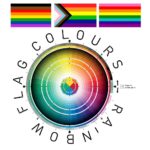 Use of the rainbow flag by the gay community began in 1978 when San Francisco artist Gilbert Baker designed the rainbow flag in response to the need for a symbol that could be used year after year. The flags had eight stripes, each colour representing a component of the community:
Use of the rainbow flag by the gay community began in 1978 when San Francisco artist Gilbert Baker designed the rainbow flag in response to the need for a symbol that could be used year after year. The flags had eight stripes, each colour representing a component of the community:
- hot pink for sex
- red for life
- orange for healing
- yellow for sun/ sunlight
- green for nature
- turquoise for art/ magic
- indigo for harmony/ serenity
- violet for spirit
Due to production difficulties (hot pink was not commercially available), pink and turquoise were removed from the design, and royal blue replaced indigo. This six-colour version spread from San Francisco to other cities, and soon became the widely known symbol of gay pride and diversity that it is today. If you’re looking for a gay venue, a flag above the door is a welcome signpost.
Since there have been variations of the flag including a black stripe symbolising those community members lost to AIDS, and a pink triangle: originally used by the Nazis in the Second World War as a badge of shame if you were homosexual. Today it’s been re-purposed by the LGBT+ movement as a symbol of pride and defiance, without any negative associations.
Recently, Birmingham LGBT launched a new community-wide inclusive Pride flag, which incorporates colours representing trans communities and queer people of colour.
Birmingham LGBT unveils new inclusive flag | I AM BHAM | 11 May 2019The history and meaning of the rainbow Pride flag | Huff Post | 29 May 2018
The history of the rainbow flag | BBC Culture | 15 June 2016 History of the Rainbow Flag | Time | 29 Jun 2015 | 1m32s
Gilbert Baker: The Gay Betsy Ross | In The Life Media | 16 Jun 2010 | 7m39s
2014 Rainbow Flag | Gilbert Baker | 28 May 2014 | 6m08s Rainbow flag | Wikipedia
The pink triangle
 The history of the pink triangle begins before WWII, during Hitler’s rise to power. Paragraph 175, a clause in German law, prohibited homosexual relationships. Convicted offenders were sent to prison, and then later to concentration camps. Their punishment was to be sterilized, and this was most often accomplished by castration. In 1942, punishment for homosexuality was extended to death. Concentration camp prisoners each wore a coloured inverted triangle to designate the reason for their incarceration. Criminals wore a green triangle, political prisoners a red triangle, Jewish prisoners two overlapping yellow triangles (to form a Star of David) and the pink triangle was for homosexuals. Stories of the camps reveal that homosexual prisoners were given the worst tasks and were the focus of attacks by the guards and other inmates. Although homosexuals were only one of the many groups targeted for extermination by the Nazi regime, it is, unfortunately, our group that history often excludes.
The history of the pink triangle begins before WWII, during Hitler’s rise to power. Paragraph 175, a clause in German law, prohibited homosexual relationships. Convicted offenders were sent to prison, and then later to concentration camps. Their punishment was to be sterilized, and this was most often accomplished by castration. In 1942, punishment for homosexuality was extended to death. Concentration camp prisoners each wore a coloured inverted triangle to designate the reason for their incarceration. Criminals wore a green triangle, political prisoners a red triangle, Jewish prisoners two overlapping yellow triangles (to form a Star of David) and the pink triangle was for homosexuals. Stories of the camps reveal that homosexual prisoners were given the worst tasks and were the focus of attacks by the guards and other inmates. Although homosexuals were only one of the many groups targeted for extermination by the Nazi regime, it is, unfortunately, our group that history often excludes.
Estimates of the number of gay men killed during the Nazi regime range from 50,000 to twice that figure. In the 1970s, gay liberation groups resurrected the pink triangle as a symbol for the gay rights movement. Not only is the symbol easily recognized, but it also draws attention to oppression and persecution – then and now. In the 1980s, ACT-UP (AIDS Coalition To Unleash Power) began using the pink triangle for their cause. They inverted the symbol, making it point up, to signify an active fight-back rather than a passive resignation to fate. Today, for many, the pink triangle represents pride, solidarity, and a promise to never allow another Holocaust to happen again.
Pink triangle | Wikipedia The Pink Triangle | Richard Plant/ Holt BooksThe Men with the Pink Triangle | Heinz Heger/ Alyson Books Bent (1998) Trailer | Film 4 A 9 Jan 2014 | 2m27s
A Love To Hide (2008) Trailer | Peccadillo Pictures | 29 May 2009 | 1m29s The Holocaust | Imperial War Museums
Nazi Persecution of Homosexuals | United States Holocaust Memorial Museum
The lambda
 The lambda symbol seems to be one of the most controversial of symbols, as regards its meaning. However, most sources agree on a few things: the lambda was first chosen as a gay symbol when it was adopted in 1970 by the New York Gay Activists Alliance. It became the symbol of their growing movement for gay liberation. In 1974, the lambda was adopted by the International Gay Rights Congress in Edinburgh, Scotland.
The lambda symbol seems to be one of the most controversial of symbols, as regards its meaning. However, most sources agree on a few things: the lambda was first chosen as a gay symbol when it was adopted in 1970 by the New York Gay Activists Alliance. It became the symbol of their growing movement for gay liberation. In 1974, the lambda was adopted by the International Gay Rights Congress in Edinburgh, Scotland.
As their symbol for lesbian and gay rights, the lambda became internationally popular. However, no one seems to have a definitive answer as to why the lambda was originally chosen as a gay symbol. Some suggest that it is the Greek lower-case letter for ‘liberation’, others cite its use in physics to denote energy, eg: the energy we have when we work harmoniously. It’s also thought to mean a ‘wavelength’, eg: gays and lesbians on a different wavelength. Lambda may also denote the synergy of the gay movement, the idea that the whole is greater than the sum of its parts.
The lambda may also represent scales and balance, and the constant force that keeps opposing sides from overcoming each other. The ancient Greek Spartans regarded the lambda as meaning unity, while the Romans considered it “the light of knowledge shed into the darkness of ignorance”. Reportedly, Ancient Greeks placed the lambda on the shields of Spartan warriors, who were often paired off with younger men in battle. (There was a theory that warriors would fight more fiercely knowing that their lovers were both watching and fighting alongside them).
Lambda | WikipediaGender symbols
 Gender symbols are graphic designs that represent gender, common astrological signs handed down from ancient Roman times. More recently, symbols for nonbinary gender identities explore variations on these.
Gender symbols are graphic designs that represent gender, common astrological signs handed down from ancient Roman times. More recently, symbols for nonbinary gender identities explore variations on these.
Gay men have used double interlocking male symbols since the 1970s. Double interlocking female symbols have often been used to denote lesbianism though some feminists have instead used the double female symbols to represent the sisterhood of women. Also, gay liberation movements used the male and female symbols superimposed to represent the common goals of lesbians and gay men.
There are many more symbols other than male and female interlocking. For example, transgender equality, nonbinary individuals, genderqueer, androgyne, intersex, demi girls and demi boys, and transcommunist.
Gender Symbols | Non Binary WikiGender Symbol | Wikipedia
The red ribbon
 The red ribbon is a symbol of solidarity and of the commitment to the fight against HIV and AIDS. The Ribbon Project was conceived in 1991 by Visual AIDS, a New York-based charity group of art professionals that aims to recognize and honour friends and colleagues who have died or are dying of AIDS. The ribbon made its public debut at the 1991 Tony Awards, but since then – in some circles – has become a popular and politically correct fashion statement for celebrities at other awards ceremonies. Because of this popularity, some activists have rightly worried that the ribbon is simply paying lip service to AIDS causes. Nevertheless, it is a powerful symbol for all of us around the world, and a unifying symbol on World AIDS Day (1 December). Today, the red ribbon is an international symbol and, for many, stands for care, concern, hope and support.
The red ribbon is a symbol of solidarity and of the commitment to the fight against HIV and AIDS. The Ribbon Project was conceived in 1991 by Visual AIDS, a New York-based charity group of art professionals that aims to recognize and honour friends and colleagues who have died or are dying of AIDS. The ribbon made its public debut at the 1991 Tony Awards, but since then – in some circles – has become a popular and politically correct fashion statement for celebrities at other awards ceremonies. Because of this popularity, some activists have rightly worried that the ribbon is simply paying lip service to AIDS causes. Nevertheless, it is a powerful symbol for all of us around the world, and a unifying symbol on World AIDS Day (1 December). Today, the red ribbon is an international symbol and, for many, stands for care, concern, hope and support.
Red ribbon | Wikipedia
World AIDS Day | National AIDS Trust
The Red Ribbon Project | Visual AIDS
World AIDS Day | UNAIDS
Commemorative HIV/ AIDS Red Ribbon | The White House | 1 Dec 2012 | 0m43s
Queer X Design by Andy Campbell
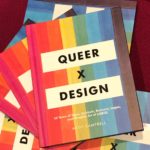 “The first-ever illustrated history of the iconic designs, symbols, and graphic art representing more than 5 decades of LGBTQ pride and activism. Beginning with pre-liberation and the years before the Stonewall uprising, spanning across the 1970s and 1980s and through to the new millennium, Queer X Design celebrates the inventive and subversive designs that have powered the resilient and ever-evolving LGBTQ movement.
“The first-ever illustrated history of the iconic designs, symbols, and graphic art representing more than 5 decades of LGBTQ pride and activism. Beginning with pre-liberation and the years before the Stonewall uprising, spanning across the 1970s and 1980s and through to the new millennium, Queer X Design celebrates the inventive and subversive designs that have powered the resilient and ever-evolving LGBTQ movement.
The diversity and inclusivity of these pages is as inspiring as it is important, both in terms of the objects represented as well as in the array of creators; from buttons worn to protest Anita Bryant, to the original ‘The Future is Female’ and ‘Lavender Menace’ t-shirt; from the logos of Pleasure Chest and GLAAD, to the poster for Cheryl Dunye’s queer classic The Watermelon Woman; from Gilbert Baker’s iconic rainbow flag, to the quite laments of the AIDS quilt and the impassioned rage conveyed in ACT-UP and Gran Fury ephemera.
More than just an accessible history book, Queer X Design tells the story of queerness as something intangible, uplifting, and indestructible. Found among these pages is sorrow, loss, and struggle; an affective selection that queer designers and artists harnessed to bring about political and societal change. But here is also: joy, hope, love, and the enduring fight for free expression and representation. Queer X Design is the potent, inspiring, and colorful visual history of activism and pride.”
Queer X Design | Andy Campbell | Black Dog & Leventhal | 2019 Back to topDefinitions and vocabulary
 A lack of understanding of terminology, or fear of using the wrong or inappropriate language, is a significant but an easy barrier to overcome. This means you can refer to individuals and issues correctly and, from a policy and practice perspective, provide good health and care to LGBTQ+ people.
A lack of understanding of terminology, or fear of using the wrong or inappropriate language, is a significant but an easy barrier to overcome. This means you can refer to individuals and issues correctly and, from a policy and practice perspective, provide good health and care to LGBTQ+ people.
LGBT Definitions (Glossary of Terms) | Stonewall (UK)
Sexual Orientation and Gender Identity Definitions | Human Rights Campaign (USA)
Lesbian, Gay and Bisexual Glossary of Terms | We Are Family (USA)
LGBTTIQQ2SAA+ Definitions | Revel & Riot (Canada) Back to top
BLOOD DONATION
Blood donation
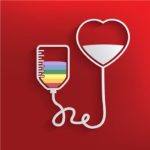 In the early 1980s, gay men1 were given a lifetime ban from blood donation in the UK. The UK blood donation service argued that it was necessary to protect public health and minimise the spread of blood-borne sexually transmitted infections (STIs) such as HIV. The policy was criticised as being discriminatory towards gay men, and the (12-month) deferral opposed by groups such as the National Union of Students (NUS) and Stonewall.
In the early 1980s, gay men1 were given a lifetime ban from blood donation in the UK. The UK blood donation service argued that it was necessary to protect public health and minimise the spread of blood-borne sexually transmitted infections (STIs) such as HIV. The policy was criticised as being discriminatory towards gay men, and the (12-month) deferral opposed by groups such as the National Union of Students (NUS) and Stonewall.
In 2011, the lifetime ban was replaced by a 12-month ban2 for gay men who were sexually active, regardless of whether safer sex was practised or not. In 2017, a new blood donation policy was implemented3 where gay men could give blood 3 months after their last sexual activity instead of 12.
In December 2020, the Government announced changes to blood donation rules with a move to individualised risk assessments for all potential donors. Eligibility will be based on behaviours rather than blanket rules based on gender or sexuality. The changes come into effect from summer 2021.
1 Including bisexual men and men who have sex with men (MSM).
2 Excluding Northern Ireland until 2016.
3 Scotland, England and Wales
Men who have sex with men (MSM) | Give Blood NHS
NHS report reveals no change in blood safety since allowing gay and bi men to donate | Pink News | 10 Oct 2023
Blood donor rules to be relaxed for gay and bisexual men in England | Guardian | 14 Dec 2020 Donation change to allow more gay and bisexual men to give blood | BBC | 14 Dec 2020
Gay men blood donation rules changed in favour of individual assessments | THT Press Release | 14 Dec 2020
Landmark change to blood donation criteria | Press Release | GOV.UK | 14 Dec 2020
Blood donation: What are the rules about giving blood? | BBC | 10 June 2019
Gay blood donation: Lifetime ban in NI on gay men donating blood is to be lifted | BBC | 1 Jun 2016
Gay blood donors denied under 1980s policy that has been slow to change | The Guardian | 13 Dec 2015
Gay men blood donor ban to be lifted | BBC | 8 Sep 2011
HIV transfusion victims unaware of virus for decades, inquiry told | Guardian | 5 Jun 2007 Men who have sex with men blood donor controversy in the United Kingdom | Wikipedia
Blood | Wikipedia
Blood donation in England | Wikipedia
Jehovah’s Witnesses and blood transfusions | Wikipedia
Contaminated haemophilia blood products | Wikipedia
Blood groups | NHS
Fainting at the sight of blood | Mayo Clinic Why can’t gay men donate blood? | Matt Baume | 9 Dec 2016 | 4m 47s Back to top
Black lives matter, and learning resources
Black Lives Matter, and learning resources
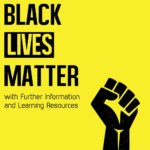 This section is a hub for the Black Lives Matter Movements in the UK, and US.
This section is a hub for the Black Lives Matter Movements in the UK, and US.
Black Lives Matter Movement (UK)
“The Black Lives Matters Movement website (not connected to BLMUK) was set up in July 2016 following the racist police killing of Alton Sterling and Philando Castile in the US. WE do not claim to speak for anyone but ourselves – concerned activists that fighting for racial and social justice in the UK.”
Black Lives Matter Movement | UK
Black Voices Matter (UK)
Our aim is to amplify the voices of black people the unheard and those living in pain with racial trauma that are suffering in silence, afraid to speak out due to the structural, systematic racism, oppression and inequality.
Black Voices Matter | UK
Black Lives Matter Movement (US)
“#BlackLivesMatter was founded in 2013 in response to the acquittal of Trayvon Martin’s murderer. Black Lives Matter Foundation, Inc is a global organization in the US, UK, and Canada, whose mission is to eradicate white supremacy and build local power to intervene in violence inflicted on Black communities by the state and vigilantes. By combating and countering acts of violence, creating space for Black imagination and innovation, and centering Black joy, we are winning immediate improvements in our lives.”
Black Lives Matter Movement | US
Learning resources
Scaffolded Anti-Racist Resources | US | A Stamborski, N Zimmermann, B GregoryThis is a working document for scaffolding anti-racism resources. The goal is to facilitate growth for white folks to become allies, and eventually accomplices for anti-racist work. These resources have been ordered in an attempt to make them more accessible.
Resources for Accountability and Actions for Black Lives | US | Compiled by Carlisa Johnson
This is a live document updated daily as more resources and information becomes available.
Black, Asian and Minority Ethnic (BAME) Education Resources: UK Organisations | UCL Institute of Education
Details of Black, Asian and Minority Ethnic (BAME) education resources (UK) by UCL Institute of Education
A coalition of Race Equality Organisations (CORE) | UK | ROTA
CORE (formerly the Coalition of BME VCS organisations) brings together many of the UK’s leading black and minority ethnic voluntary and community organisations for the promotion of race equality.
The HistoryMakers (USA) was born our of our founder’s dream to address this problem, by capturing – one person at a time – the untold personal stories of both well-known and unsung African Americans, and by creating a priceless video collection giving those involved their special place in history.
The HistoryMakers is a national 501(c)(3) non-profit research and educational institution committed to preserving and making widely accessible the untold personal stories of both well-known and unsung African Americans. Through the media and a series of user-friendly products, services and events, The HistoryMakers enlightens, entertains and educates the public, helping to refashion a more inclusive record of American history.
The History MakersRelated internal links to other parts of this website
QTIBPOC and QPOC | MEN R USBME, BAME and BEM | MEN R US
Racism and gay men | MEN R US
Black, Asian and Minority Ethnic LGBT+ organisations | MEN R US
How to be an ally | MEN R US
The word is out | MEN R US
More
Ten black history events that should be taught to every pupil | The Guardian | 11 Oct 2020Black History Month is a chance to introduce forgotten historical episodes into the curriculum, from the British black panthers to the Bristol bus boycott
- West Indian soldiers in the first world war
- The Bristol bus boycott
- The Notting Hill carnival
- John Blanke, the black trumpeter
- ‘Beachy Head woman’
- ‘Ivory bangle lady’
- Britain’s black miners
- The sacking of Benin
- The Haitian Revolution
- The British Black Panthers
Only national heritage centre dedicated to collecting, preserving and celebrating the histories of African and Caribbean people in Britain.
Commission on Race and Ethnic Disparities report
Downing Street rewrote ‘independent’ report on race, experts claim | The Guardian | 11 Apr 2021Race report: Boris Johnson urged to withdraw ‘whitewashing’ inquiry | BBC News | 10 Apr 2021
Business chiefs say their advice ignored in No 10’s race report | The Guardian | 3 Apr 2021
Race commission report: the rights and wrongs | The Conversation | 1 Apr 2021
Define, Divide and Rule: The Race Report Shows the State is Not Interested in Racial Liberation | Novara Media | 1 Apr 2021
Experts cited in No 10’s race report claim they were not properly consulted | The Guardian | 1 Apr 2021
More
Black Lives Matter UK gives £350,000 in funding for black-led organisations | The Guardian | 5 Mar 2023 BBC News – Anger and grief as crowds rally to support Child Q | BBC | 21 Mar 2022
NHS ‘riddled with racism’ against ethnic minority doctors | BBC | 2 Feb 2022
The Black Cop: a villain, a victim and a hero | The Guardian | Jan 2022 Black History Month 2021 Britain’s rich history of black literature | The Guardian | 18 Oct 2021
Black History Month launches in UK with ‘proud to be’ campaign | 1 Oct 2021
England’s footballers speak for the new generation better than any politician | The Guardian | 14 Jul 2021
England’s Tyrone Mings criticises Patel over racism response | BBC News | 14 Jul 2021
Race crisis threatening police legitimacy, police chair warns | BBC News | 29 Mar 2021
‘This is radical love’ – the history of black queer Britain in pictures | The Guardian | 22 Mar 2021
The events of the last few days: our full statement | UK Black Pride | 19 Mar 2021
‘Eye watering’: top police officer laments rate of stop and search on young black men | The Guardian | 19 Jan 2021
‘The UK’s black gay icons are worthy of recognition’ | BBC 3 | 15 Jan 2021
UK government accused of pursuing ‘white nationalist’ agenda | The Guardian | 29 Dec 2020
National curriculum ‘systematically omits’ black British history | The Guardian | 25 Nov 2020
Windrush scandal a ‘shameful stain on British history’, says Equality Commission | HuffPost | 25 Nov 2020
An ongoing anti-racist reading list for non-Black allies | i-D | 4 Jun 2020
Educate yourself about structural racism and white privilege, starting with these 7 essential texts
universities perpetuate institutional racism, report says | The Guardian | 24 Nov 2020
BLM UK gains legal status and renames as Black Liberation Movement UK | The Guardian | 23 Oct 2020
Movies that did Black history justice | Digital Spy | 16 Oct 2020
The forgotten Black radicals | Huck | 14 Oct 2020
‘It isn’t a tick-box’: young BLM activists on Black History Month in UK schools | The Guardian | 11 Oct 2020
Black History Month is now an established part of the year. Let’s celebrate its success | 4 Oct 2020
Black Lives Matter in the UK: ‘We’re still not being heard’ | BBC News | 25 Aug 2020
David Olusoga: racism in British TV has led to ‘lost generation’ of black talent | The Guardian | 24 Aug 2020
How the shadow of slavery still hangs over global finance | The Conversation | 21 Aug 2020
The rise and fall of Black British writing | The Conversation | 14 Aug 2020
It’s been nine years since the London riots: what’s changed? (The answer is nothing) | Huck | 14 Aug 2020
Road rage, stop and search and vehicle stereotypes: why cars drive so much racism | The Conversation | 12 Aug 2020
How racist is Britain today? What the evidence tells us | The Conversation | 1 Jul 2020
Top director Steve McQueen attacks racism in British film and TV industry | The Guardian | 20 Jun 2020
Marcus Rashford, Black Lives Matter and a British premier who is out of his league | The Conversation | 19 Jun 2020
32 pictures that show what white privilege looks like | BuzzFeed | US | 11 Jun 2020
A letter to Roy. He’s the black guy in my pictures | US | Scot Lloyd | 11 Jun 2020
An ongoing anti-racist reading list for non-Black allies | i-D | 4 June 2020 Ethnicity facts and figures | GOV.UK
What White People Can Do Next | Novara Media | 25 May 2021 | 36m 36s
What’s changed? Newsbeat explored Black Lives Matter UK protests in 2016 | Nesta McGregor | BBC Newsbeat | 8 Jul 2020 | 31m 45s
Black Lives Matter: What is systemic racism? Kids’ questions answered | BBC | 9 Jul 2020 | 3m 56s
What is Black radicalism with Kehinde Andrews | Novara Media | 16 Jun 2020 | 1h 2m 49m
Akala deconstructs race, class, and Britain’s modern myths | Joe Unfiltered | 21 May 2020 | 1h 4m 6s
Revealed: How Racism, Meth and Sex Are Combining to Destroy Queer Black Lives | US | BuzzFeed | 27 Feb 2020
How to be an ally
How to be an ally | PoliticsJOE | 12 Jun 2020 | 4m 42s
Transcript with links to books and individuals mentioned
“So, you don’t like racism but you live in the UK and feel powerless to do anything. My name is Obioma Ugoala. I’m an actor and a writer. Over the past few weeks I’ve had several conversations with friends of mine horrified at the events unfolding in the United States, and unsure how to show their solidarity. This is a brief video offering a few suggestions.
- Recognise anti-blackness
Firstly, let’s acknowledge that global anti-blackness is a real thing. It manifests differently in different countries, but it has been an economic driving force for centuries. This is a fact, not an attack. - Recognise the UK’s legacy
Secondly, the UK has a history of atrocious crimes, from year or actual genocide to the pillaging of nations’ natural resources. We can only move past this fact if we address it. We haven’t, don’t and must. The question, then, is why? - Expand your reading list
To Kill a Mockingbird and Roll of Thunder, Hear My Cry are wonderful books for children and young adults.
However, they are the few books used to discuss racism in a UK classroom begins the lifelong myth that racism is a US problem. You can study history from the age of seven to twenty-one in a UK classroom, and never have to go into any depth about the UK’s role in colonising, and depriving nations of their freedoms, rights and resources. It is a glaring hole not only in our children’s education but, by proxy, ours. As an adult, we can begin to plug these gaps in our collective educational knowledge? The following book suggestions may offer a starting point. Honestly telling Britain’s past, present, and where we might go from here.
- First up is the Sunday Times bestseller British: On Race, Identity and Belonging by Afua Hirsch
- Next is the award-winning Why I’m No Longer Talking To White People About Race by Reni Eddo-Lodge
- Following that is hip-hop artist and writer, Akala’s Natives: Race and Class in the Ruins of Empire
- And finally, science writer and broadcaster Dr Adam Rutherford’s How To Argue With A Racist
And now for some frequently asked questions.
Is Black Lives Matter only about the police?
No. Unfortunately not. So, whilst Taser usage on black Londoners is four times that of their white counterparts it extends further than the justice system. Black Caribbean children for instance, is three and a half times more likely to be excluded at primary, secondary and special schools than all other pupils. Whilst Premier League footballers are to this day still suffering racist monkey chants that many had thought left back in the 1980s.
Does this apply to me?
I’m not racist. I don’t see colour. I just see the person. We need you to see colour. If you can’t, or won’t… How can you be an effective ally? How can you hear of somebody is making racist comments? Or see if your colleague is giving your black co-worker a hard time?
In the words of Angela Davis, it is not enough to be non-racist, we must be anti-racist. And so, for anybody who wants to be an ally to the course, I would offer these for suggestions.
- Educate yourself and others. There could be a book, film, or podcast. It could be your friend, lover, colleague, or children.
- Support Black artists. Listen to, commission, and pay for your black artists writers and speakers. Statements like ‘you will be paid in exposure’ will no longer wash and are not true allyship.
- Speak up. Be that using your platform on social media, calling out your colleagues’ missteps, or writing to your MP when you witness an injustice. You have more power than you know. It is very easy for brands, newspapers and TV companies to tweet a hashtag. But your money speaks so demand more.
- Accept that you will get it wrong sometimes. None of us are born knowing all of the answers. The writer Ijeoma Oluo says “The beauty of anti-racism is that you don’t have to pretend to be free of racism to be an anti-racist. Anti-racism is the commitment to fight racism wherever you find it, even if that in yourself. And it’s the only way forward.”
So, I would offer, be brave in your humility. As the saying goes: this is not a moment, it’s a movement. And the struggle continues tomorrow.”
Related internal links to other parts of this website
Black Lives Matter Movements, and learning resources | MEN R USQTIBPOC and QPOC | MEN R US
BME, BAME and BEM | MEN R US
Black, Asian and Minority Ethnic LGBT+ organisations | MEN R US
Racism and gay men | MEN R US
The word is out | MEN R US Back to top
The word is out
Val McDermid selects Britain’s 10 most outstanding LGBTQ writers, a selection of seven books by Queer Black writers to read in honor of James Baldwin’s birthday, Stonwall recognises Black History Month Heroes; and Jackie Kay introduces her selection of 10 BAME writers at the National Centre for Writing.
The word is out: Val McDermid selects Britain’s 10 most outstanding LGBTQ writers | The Guardian | 10 Aug 20197 Books by Queer Black writers to read in honor of James Baldwin’s birthday | Bitch Media | 2 Aug 2019 Jackie Kay introduces her selection of 10 BAME writers | National Centre for Writing | 10 Oct 2019
Jackie Kay’s 10 Compelling BAME Writers Working In The UK | National Centre for Writing | 10 Oct 2019 | 1h 00m
Related internal links to other parts of this website
Black Lives Matter Movements, and learning resources | MEN R USQTIBPOC and QPOC | MEN R US
BME, BAME and BEM | MEN R US
Black, Asian and Minority Ethnic LGBT+ organisations | MEN R US
Racism and gay men | MEN R US
How to be an ally | MEN R US Back to top
DISABILITY
About disability
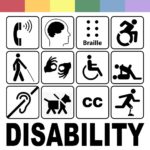 The second closet: LGBTs with disabilities
The second closet: LGBTs with disabilities
“James has had to cope with some negative reaction towards his sexual orientation. One person continually tried to press religious literature on him. Once he was prevented by a driver of a disability transport service from entering a gay club. Another time inside a gay bar, someone muttered, “Why on earth would he be here?”
James believes feels some gay disabled people are more “acceptable” within gay communities than others. “People seem far less uncomfortable around people who are deaf, for instance, than they do around those in a wheelchair.” This perhaps is because, or why, the gay deaf community is more visible. “Of those in wheelchairs, there seems to be a higher comfort level with those with paralysis, for instance, than with those with cerebral palsy or advanced MS,” James adds, noting that this tendency is reflected also in the heterosexual community.
Needless to say, gay people with disabilities struggle to find a place for themselves, to break out of social isolation, to find intimate partners and even to learn to accept their own bodies and sexual orientation. It’s not an easy road, says Tom, a wheelchair user with cerebral palsy. “I never liked my body because of my disability,” he says. “In the gay world we are bombarded with images of young, beautiful, able-bodied people. So when a man finds me attractive I’m automatically suspicious of him.” 1
Definitions of disability
- “What is classed as a disability? In the Equality Act a disability means a physical or a mental condition which has a substantial and long-term impact on your ability to do normal day to day activities.” | What is classed as a disability? | Equality and Human Rights Commission
- “You’re disabled under the Equality Act 2010 if you have a physical or mental impairment that has a ‘substantial’ and ‘long-term’ negative effect on your ability to do normal daily activities.” | Definition of disability under the Equality Act 2010 | GOV.UK
- “Disability results from the interaction between individuals with a health condition such as cerebral palsy, down syndrome and depression as well as personal and environmental factors including negative attitudes, inaccessible transportation and public buildings, and limited social support. People with disability experience poorer health outcomes, have less access to education and work opportunities, and are more likely to live in poverty than those without a disability.” | Disability | World Health Organisation
More on disabilities
Learning disabilities | NHSA learning disability affects the way a person learns new things throughout their lifetime. Find out how a learning disability can affect someone and where you can find support. Disability: ‘People assume I can’t be gay because I’m disabled’ | BBC News | 23 Jan 2021 Legal definition of disability | General Medical Council
Disability discrimination | Mind
Disability organisations | Stonewall
Social model of disability
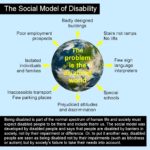 The social model was developed by disabled people and says that people are disabled by barriers in society, not by their impairment or difference. Or, to put it another way, disabled people are seen as being disabled not by their impairments (such as blindness or autism) but by society’s failure to take their needs into account.
The social model was developed by disabled people and says that people are disabled by barriers in society, not by their impairment or difference. Or, to put it another way, disabled people are seen as being disabled not by their impairments (such as blindness or autism) but by society’s failure to take their needs into account.
Being disabled is part of the normal spectrum of human life and society must expect disabled people to be there and include them/ us. An example of this would be a wheelchair user who cannot travel pavements because of the curb steps. The social model would say that the problem is that there is no slope, not the person using a wheelchair … something where there has been progress in lowering pavements to street level.
Barriers can be physical, like buildings not having accessible toilets or they can be caused by people’s attitudes to difference, like assuming disabled people can’t do certain things, or just not thinking about them at all. The social model of disability identifies systemic barriers, derogatory attitudes, and social exclusion (intentional or inadvertent), which make it difficult or impossible for individuals with impairments to be included in society and participating on an equal basis. If these barriers are removed, a person may still have an impairment but would not experience disability. These barriers are:
- Physical and environmental
- Attitudes
- Communication
- Organisational
Removing these barriers creates equality, offering disabled people more independence, choice, and control. This model is a great improvement for disabled people than the medical model because it means they can access the full range of educational, employment, social and other opportunities as everyone else, and have equal lives. Also, the social model locates the “problem” outside the disabled person and therefore offers a more positive approach because:2
- it doesn’t “blame” the individual or turn them into the problem
- it involves everyone in identifying solutions
- it encourages co-operative problem solving
- it removes barriers for others as well as disabled people, that is, it is an equal opportunities model
- it acknowledges disabled people’s rights to full participation as citizens.
Social model of disability | Disability Rights UK
Social model of disability | Wikipedia Virtual Pride | LGBTQ+ Disabled Queer and Hear | 22 Aug 2020 | 3h 32m 5s
Live broadcast of LGBTQ+ Disabled Queer and Hear’s first ever Virtual Pride event, featuring talent from disabled queer artists the world over, broadcast on Saturday 22nd August 2020.
1 Text adapted from “The second closet: LGBTs with disabilities” from MyHandicap/ MyChance (USA). We had a link to the article but cannot find one now (13-04-23).
2 Adapted from the Disability Rights Commission: Disability Discrimination Act (Best Practice Trainers Resource Pack) 2002
Disability organisations, services and groups
LGBT+
Regard | UK
National organisation of lesbians, gay men, bisexuals, transgender and queer people (LGBTQ) who self-identify as disabled. Follows the Social Model of Disability, a way of thinking that says it is society that needs to change by removing the barriers that deny us inclusion and equal rights. Aims to provide information, advice and support to LGBT disabled people; raise awareness and campaign on issues affecting disabled LGBT people, and combat social isolation among LGBT disabled people.
Regard
Unique (London) | UK
Unique LGBT is a social group run by disabled LGBT+ people for disabled LGBT+ people. Regular meet-ups and involved with other LGBT+ organisations to support and raise the profile LGBT+ people who are disabled. An all-inclusive and keen to involve members in its activities.
Unique (London LGBT disability group)
Deaf Rainbow UK
Website where deaf people can visit to find information, guidance and educate themselves on the deaf LGBT+ community in an accessible way. Covers advice, history and articles and continually adding content.
Deaf LGBTIQA
Marlborough Productions
Leading UK producer of queer-led, intersectional performance, parties and radical community gatherings. Member of Live Art UK the national network of live Art promoters and its programme has a focus on Live Art and Performance Art as opposed to more conventional theatre.
Marlborough Productions
ParaPride
Charity working with social venues, public spaces and online platforms to create inclusive events and social opportunities that cater specifically to the needs of all those living with disabilities, mental health and chronic health conditions and impairments.
ParaPride
LGBTQ disabled queer and hear
Founded in June 2019, provides nights out for people with disabilities and a platform for people with disabilities who wouldn’t normally get an opportunity to show off there skills and talents in the public arena. Works with all disabilities and able-bodied people to ensure that these nights happen in a safe space across the UK.
LGBTQ disabled queer and hear
LGBTQ Disability Project (Brighton and Hove) | UK
Our Disability Project is for LGBTQ disabled people looking for a sense of community, support or information.
LGBTQ Disability Project | Switchboard (Brighton and Hove)
Inclusion London
Supports deaf and disabled people’s organisations in London and campaign for equality for Deaf and Disabled people.
Inclusion London
ParaPride
Approximately 40% of the LGBTQ community is recognised as having a disability, yet there are no fully accessibly LGBTQ spaces in the UK. Works ith social venues, public spaces and online latforms to create inclusive events and social pportunities that cater specifically to the needs of all hose living with disabilities, mental health and chronic ealth conditions and impairments.
ParaPride
ParaPride
LGBT+ World
Blind LGBT Pride International (World)
Offer advocacy, education, programs, alliances,and support for persons who are either blind or vision impaired and who are gay, lesbian, bisexual or transgender.
Blind LGBT Pride International | USA
Rainbow Alliance of Deaf (RAD) | USA
The Rainbow Alliance of the Deaf (RAD) is a nonprofit organization established in 1977 to establish and maintain a society of Deaf LDGTBIPAGFGQA+
Rainbow Alliance of Deaf (RAD) | USA
RAD (Closed Group)
BBC
OUCH | UK
Ouch! is a website from the BBC that reflects the lives and experiences of disabled people. It has articles, blogs, a very busy message board and an award-winning downloadable radio show – The Ouch Podcast). It’s aimed at those with a stokehold in disability: family, friends, professionals and, rather importantly, disabled people themselves – without whom all this would be a bit meaningless.
OUCH | BBC
… like an LGBT for disability | BBC Ouch
It appears that the acronym used by the gay, lesbian and trans community works quite well and arguably has been part and parcel of the progressive impact they’ve had in recent years. So, being as lots of people dislike the word ‘disability’, could an acronym work better for this group?
More organisations: hard of hearing, partially sighted and blind, holidays and breaks, guide dogs, independent living, benefits and legal
Hard of hearing and deaf
Deaf Unity (UK)
Charity works to ensure deaf people can access effective practical tools, advice and services at critical stages throughout their lives. Aims to unite the deaf community to inform, support and empower.
Deaf Unity
Action on Hearing Loss (previously known as RNID)
Charity working to make life fully inclusive for deaf people and those with hearing loss or tinnitus. Campaigns for an inclusive society, connect people to practical advice, and pioneer new treatments for hearing loss and tinnitus.
Action on Hearing Loss
0808 800 0009
The Deaf Health Charity
One of the UK’s largest employers of deaf people, and most hearing staff in its projects and services are fluent sign language users. Partners with the NHS and service providers across the country. The Deaf Health Charity
Partially sighted and blind
Royal National Institute of Blind People (RNIB) | UK
The Royal National Institute of Blind People (RNIB) is one of the UK’s leading sight loss charities and the largest community of blind and partially sighted people.
Royal National Institute of Blind People (RNIB)
Scotland
Disability Information Scotland
Provides reliable, accurate and accessible information for people living with disability in Scotland.
Disability Information Scotland
Students
Disabled Students Helpline
This line provides advice to disabled students who are studying in England.
Disabled Students Helpline
0330 995 0414
Email
Holidays and breaks
3H Foundation
Supporting people with disabilities and allowing carers to have a period of respite.
3H Foundation
Happy Days Children’s Charity (3-17yrs)
We work with local communities right across the UK to provide vital respite breaks for individuals, families and groups who support children with additional needs.
Happy Days Children’s Charity
Peter le Marchant Trust
Leicestershire based charity providing day trips and holidays on the waterways to a wide range of children and adults who experience health and social issues in their day to day lives.
Peter le Marchant Trust
Revitalise
Revitalise is a national charity providing respite care in a holiday setting for disabled people and carers for over 50 years.
Revitalise
Tourism for All
Tourism for All, or TFA for short, is a small independent national charity believes that it is the right of disabled people to participate in all areas of community life.
Tourism for All UK
Guide dogs, support animals, and pets
Seeing Dogs Alliance
Charity aiming to provide an alternative source of dogs to guide blind people, run by guide dog owners and their families.
Seeing Dogs Alliance
Canine Partners
A registered charity that transforms the lives of people with physical disabilities by partnering them with assistance dogs.
Canine Partners
Dogs for the Disabled
Brings trained dogs and people together to help them overcome specific challenges, in order to enrich and improve the lives of both.
Dogs for the Disabled
Independent living, support and equipment
Everyone Can
Formerly known as The Aidis Trust, Everyone Can is a charity which has been doing everything it can so that people living with disabilities are able to control their home environment, communicate, and in short, live their lives with as much ease and independence as possible.
Everyone Can
Disabled Living
Disabled Living offers free, impartial information about services for disabled individuals, older people, and those that support them. This includes advice about products and equipment from our specialist Equipz team.
Disabled Living
Disabled Motoring UK
Supports disabled drivers, passengers and Blue Badge holders. Works with government and businesses across the UK to improve parking, refuelling, and access provision for disabled people so they can access the goods and services that they need.
Disabled Motoring UK
Disabled Living Foundation
Provides impartial advice and guidance on aids and solutions for independent living, provides a wide source of information on gadgets, devices and equipment to keep you living your life.
Disabled Living Foundation
Gardening for the Disabled Trust
Provides small grants to people who suffer all kinds of chronic disabilities – mental and physical – to help them get gardening again.
Gardening for the Disabled Trust
PHAB
Supports children, young people and adults with and without disabilities to make more of life together – breaking down community barriers, reducing social isolation, and creating opportunities for disabled people to enjoy the same activities and challenges as, and alongside, those without a disability.
PHAB
Queen Elizabeth’s Foundation for Disabled People
Works with children and adults with physical and learning disabilities or acquired brain injuries. Offers a wide range of expert services providing support and advice, specialist care, neurorehabilitation and development of life skills that make a real difference to disabled people’s lives.
Queen Elizabeth’s Foundation for Disabled People
Activity Alliance
Works to make active lives possible with a vision that disabled people are active for life.
Activity Alliance
Benefits, rights and legal
Disability benefits
Government directory of carers and disability benefits
GOV.UK
Scope
Disability equality charity in England and Wales providing practical information and emotional support. Campaign relentlessly to create a fairer society.
Scope
The Advocacy People
The Advocacy People supports anybody that needs independent support to speak up. Delivers quality and innovation in advocacy through our practice, and improve people’s lives individually and collectively through putting their case to policymakers.
The Advocacy People
Disability Rights UK
Disability Rights UK is the leading charity of its kind in the UK, run by and for people with lived experience of disability or health conditions.
Disability Rights UK
Disability Law Service
Disability Law Service is a unique charity that has been providing free legal advice and representation for disabled people since 1975.
Disability Law Service
Equality Advisory and Support
Advises and assists individuals on issues relating to equality and human rights, across England, Scotland and Wales. Also accept referrals from organisations which, due to capacity or funding issues, are unable to provide ‘in-depth help and support’ to local users of their services.
Equality Advisory and Support
Sex
Outsiders Club
Social, peer support and dating club, run by and for socially and physically disabled people. Our members have a wide range of impairments, including visual and hearing impairment.
Outsiders Trust
Foodbanks
Trussell Trust
Supports a nationwide network of food banks and together provide emergency food and support to people locked in poverty, and campaign for change to end the need for food banks in the UK.
Trussell Trust
Live-in carers
Able Community Care
Arranges live-in carers for an elderly or disabled people in the UK and the Channel Islands.
Able Community Care
IT support
AbilityNet
Supports people of any age, living with any disability or impairment to use technology to achieve their goals at home, at work and in education. We do this by providing specialist advice services, free information resources and by helping to build a more accessible digital world.
AbilityNet
News, studies and reports
Studies, reports and resources
Lesbian, gay, bisexual and transgender (LGBT) disabled men and women and social care support | School for Social Care Research (NIHR) | 2018
LGBTQI+ Disabled People, self-directed social care support, personal assistants (PAs) and support workers | NIHR | 2017
Assessing current and future housing and support options for older LGB people | Joseph Rowntree Foundation | 2013
Personalisation: working with lesbian, gay, bisexual and transgender people | SCIE | 2011
A Diversity Toolkit: focused on lesbian, gay, bisexual and transsexual groups (LGBT) Southampton Centre for Independent Living | 2010
Relationships are very important to people with a learning disability | Sexuality: research and statistics | MENCAP
Safe to be me | Age UK
USA
LGBTQ Information Network │ Disability Resources | Queer Cafe | USA
LGBTQ+ People with Disabilities | Respect Ability | USA
Queers with Disabilities: An Annotated Bibliography | Charlie McNabb, approved by the Resources Committee of the Gay, Lesbian, Bisexual, and Transgender Roundtable (GLBTRT) of the American Library Association (ALA) | USA
News and articles
Disability: ‘People assume I can’t be gay because I’m disabled’ | BBC News | 23 Jan 2021
Silenced: The Hidden Story of Disabled Britain review – have attitudes changed? (BBC 2 Documentary) | The Guardian | 19 Jan 2021
Deaf, autistic, gay man had a mental breakdown after being discriminated against at work | Pink News | 8 Jan 2021
25 things you might not know about disability | BBC News | 10 Nov 2020
I Am Celebrating My Existence As a Gay, Black, Disabled Man 25 Years After I Wasn’t Supposed to Survive | Time | 22 Oct 2020
Blind and queer and finding community | Blade | US | 25 Sep 2020
This tatted up gay amputee’s pole dancing skills will blow you away | Queerty* | 7 Aug 2020
Netflix star says being gay is more accepted and understood than being disabled | Pink News | 28 Dec 2019
Are all gay and disabled men bottoms? Inside my week-long quest to find out | Queerty* | 13 Oct 2019
This is what it’s like to be a disabled, disfigured, gay, trans woman | Pink News | 9 Oct 2019
Disability activist Simon Stevens: I’m disabled, I’m gay and I’m controversial | Disability Horizons | 31 Aug 2019
Disabled LGBT+ young people face a battle just to be taken seriously | The Conversation | 9 Aug 2019
Pride isn’t accessible enough for LGBTQ+ disabled people | Metro | 9 Jul 2019
What it’s Like Being a Male Escort for Guys With Disabilities | Vice | 12 Jun 2019
LGBT and Disability: Information, News and Fact Sheets | Disabled World | 7 Feb 2019
Gay and disabled – First Dates Paddy Smyth | Scope | Feb 2019
An LGBT Amputee in Nepal | Jamie Gane | 28 Jun 2018
Queer, disabled people like me are excluded from LGBTQ+ spaces – it is dividing our community | The Independant | 15 Feb 2018
People accept that I’m gay, but not that I’m disabled | The Guardian | 13 Jan 2018
11 Gay People Who Are Blind Describe How They Knew They Were Gay | Buzzfeed | 24 May 2017
Finding Comfort With A Stranger As A Blind Gay Man | HuffPost | 13 Mar 2017
Disabled Gay Man: anecdotes on inclusion, advocacy, and employment | Urevolution | 2017/18
If you’re a disabled, gay twentysomething, Grindr is a godsend | The Guardian | 1 Dec 2016
The Best Sex I Ever Had as a Disabled Gay Man | Out | 2 Oct 2015
Watch: deaf gay man shares his journey to find acceptance | Pink News | 29 Mar 2015
Waiting to Be Heard: On Being Deaf and Gay | pop Matters | 23 Sep 2013
Working with lesbian, gay, bisexual and transgender people: people with physical disabilities: Doug’s story | LGBTQI+ video stories | Social Care Institute for Excellence | June 2011
Gay and disabled: hard times or rich rewards? | Ouch | BBC | 16 Aug 2004
The barriers deaf LGBT adults experience in accessing help for mental health problems | Royal College of Psychiatrists | PowerPoint Slides PDF | Gary Cutmore and Helen Miller | No Date
Films
Louder Than Words | Louder Than Words Film | 9 Jan 2020 | 16m 34s
Gay and disabled | BBC | 17 Sep 2017 | 13m 9s
AIDS and the deaf community | 11 Sep 2019 | 5m 29s | Note: Transcript available
Howard describes the lack of information and support deaf gay men received when the impact of AIDS started to be felt in the 1980s, and how it affected a friend of his who was deaf and HIV positive.
Deaf people tell us which questions annoy them the most | Deaf people tell | Cut | 29 Aug 2017 | 3m 49s
I’m Gay And Disabled And Fine, Thank You | As/ Is | 21 Nov 2015 | 3m 59s
Deaf gay man comes out, overcomes feeling of isolation | ImFromDriftwood | 25 Mar 2015 | 7m 34s | Note: If you don’t know American Sign Language, click the “CC” (Closed Captioning) button in the lower right-hand corner of the video to read the subtitles.
The Way He Looks (Trailer) | Films Boutique | 11 Feb 2014 | 2m 30s
Run With Me (Short Film) | Cameron Covill | 13 May 2013 | 13m 53s
Based on true events, this short film follows Matt, a boy with cerebral palsy, as he decides to run in his school’s track meet.
Working with LGBT people – people with physical disabilities: Doug’s story | Social Care Institute for Excellence (SCIE) | 17 Aug 2010 | 7m 59s
Mental health matters
Mental health matters
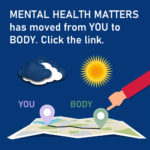 Mental health matters has moved to BODY.
Mental health matters has moved to BODY.
LGBT+ HISTORY AND PRIDE
Gay Liberation Front
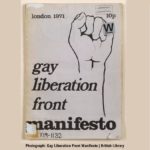 2020 marked the 50th anniversary of the Gay Liberation Front in the UK but, before we dive in, it’s worth providing a little context:
2020 marked the 50th anniversary of the Gay Liberation Front in the UK but, before we dive in, it’s worth providing a little context:
Gay Liberation Front, US
The Gay Liberation Front (GLF) in the US was set up as a direct consequence of the Stonewall Riots in June 1969 in the Greenwich Village neighbourhood of Manhattan, New York City. Initially, it organised a march continuing the momentum, demanding the end to the persecution of homosexuals, but went on to have wider political aims calling out racism, taking an anti-capitalist stance, and challenging the traditional (nuclear) family and (traditional) gender roles. The events at this time are widely considered to be the catalyst for the gay liberation movement and the modern fight for LGBT rights in the US.
Gay Liberation Front, UK
The Gay Liberation Front (GLF) in the UK was set up a year later in 1970 though it’s worth noting the Sexual Offences Act 1967 was partially decriminalised homosexuality only three years earlier. Some argue, rightly in our opinion, that the 50-year anniversary in 2017 was premature. The criminalisation of homosexuality in the UK did not, in fact, end until 2013.
The GLF was quickly recognised as a political movement by the media, and undertook high-profile direct action, notably disrupting the opening of the Festival of Light (1971) organised by Mary Whitehouse. (Drag, kissing, mice and horns were involved).
By 1974, the movement had splintered (internal disagreements) but, without question, the GLF a remains a primary catalyst for things to come including greater visibility, and London Lesbian and Gay Switchboard (today Switchboard LGBT), Gay News (which ran to 1983), and Icebreakers (a support group for gay men and lesbians) from which Gay’s the Word emerged.
Gay Liberation Front (UK) | WikipediaGay Liberation Front | LGBT Archive Gay’s the Word | Wikipedia
Campaign for Homosexual Equality | Wikipedia
Campaign for Homosexual Equality | LGBT Archive
Gay News | Wikipedia
Gay News | LGBT Archive
Icebreakers | LGBT Archive 50th anniversary of the Gay Liberation Front Queer rights veterans celebrate the 50th anniversary of the Gay Liberation Front and reclaim Pride | flickr | 27 Jun 2020
Queer people rioted in 1959, a decade before Stonewall, at L.A.’s Cooper’s Do-Nuts | Hornet | 15 Dec 2020
Power of Pride: Gay Liberation Front mark their 50th anniversary in London | Gay Times | 14 Jul 2020
Veterans of London’s Gay Liberation Front will lead a Pride protest parade this weekend | Time Out | 24 Jun 2020
Veterans walk London Pride route to celebrate 50th anniversary | BBC News | 27 June 2020
Liberation Front veterans to march Pride in London parade route despite cancellation due to coronavirus | Pink News | 15 Jun 2020
Don’t fall for the myth that it’s 50 years since we decriminalised homosexuality | The Guardian | 23 May 2017
Peter Ackroyd: A secret history – 2,000 years of gay life in London | The Guardian 20 May 2017 Back to top
LGBT+ history and timelines
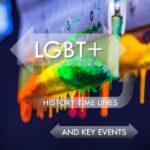 We’ve pulled together timelines of LGBT+ history and notable events.
We’ve pulled together timelines of LGBT+ history and notable events.
There should be something for everyone, the Romans in the 1st and 2nd century; James Pratt and John Smith in the 19th century who were the last two men to be executed in Britain for buggery, and the foundation of the Gay Liberation Front in 1970.
Inspiring Minds: LGBT Documentary Film (2019) | Peruvian Tree Productions | 12 Apr 2019 | 1h 11m 27sHistory of LGBT rights in the UK: A long road to equality | Kings College London | 28 Jul 2017 | 2m 11s
LGBT Rights: A Human Rights Lawyer’s perspective | Kings College London | 19 Jul 2017 | 1m 35s The queer history of a corner of the Northern line extension (Market Tavern, Nine Elms) | London Transport Museum
LGBTQ+ Timeline | BBC History
Key dates for lesbian, gay, bi and trans equality | UK | Stonewall
Timeline of LGBT history | Wikipedia
Timeline of UK LGBT history | UK | LGBT Archive
Timeline of LGBT history in the United Kingdom | UK | Wikipedia
Timeline of LGBT Rights | World | Equaldex
People with a History: An online guide to lesbian, gay, bisexual, and trans* history | US | Fordham University
Nine historical LGBTQ figures you need to know about | BBC Radio 4 4 brilliant, boundary-breaking historical trans icons I wish I’d learned about in school | 12 Feb 2022
The colourful, sticky history of gay bathhouses: From 15th century scandal to modern staple | Pink News | 11 Feb 2022
Ted Brown: the man who held a mass kiss-in and made history | The Guardian | 8 Apr 2021
MI6 chief apologises for past ban on LGBT staff | BBC News | 19 Feb 2021
British soldiers sacked for being gay can get their medals back | The Guardian | 16 Feb 2021 | 16 Feb 2021
Census 2021: England and Wales gender question ‘a good first step’ | BBC News | 14 Feb 2021
The history of ‘coming out,’ from secret gay code to popular political protest | The Conversation | 10 Feb 2021
9 eye-opening moments in LGBT+ history you probably weren’t taught in school | Pink News | 2 Feb 2022
“Gay is good”: heartfelt messages found in the basement of radical King’s Cross bookshop | Islington Now | 16 Oct 2020
Historical events
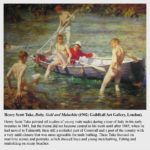 Indecent bathing in the Thames
Indecent bathing in the Thames
“Two young men, named James Mason and Henry Mallins, were brought before the Lord Mayor, charged with indecently exposing themselves by bathing in the Thames. Police-constable Soper deposed about noon on Friday he observed the two defendants bathing in the river, close to Southwark Bridge. They went in and out of the water several times, exposing themselves in a very indecent manner to females upon the bridges and passengers upon the steamboats. Neither of them had bathing drawers on. Defendants now expressed their regret and said they did not think they were doing any harm. The Lord Mayor said it was not a proper place for persons to bathe; but he discharged the defendants, warning them to be careful in the future.” (Reynolds’s Newspaper, 7 June 1890)
Homosexuality in the nineteeth century | Rictor Norton
George Quaintance (1902 – 1957) was a pioneer of early homo-erotic art. He worked at a time when it was illegal to portray the male nude in a way that was considered to be anything besides figure studies, or classical style nudity. Back to top
Gay Pride
What is Pride?
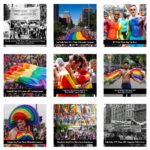 Pride, gay pride or LGBT+ pride means different things to different people. For some, it’s a celebration and a positive stance against discrimination and violence toward lesbian, gay, bisexual, and transgender (LGBT) people. For others, gay pride is about self-affirmation, dignity, equality rights, increased visibility and a celebration of sexual diversity and gender variance. The short answer is that Pride is what you want to make it!
Pride, gay pride or LGBT+ pride means different things to different people. For some, it’s a celebration and a positive stance against discrimination and violence toward lesbian, gay, bisexual, and transgender (LGBT) people. For others, gay pride is about self-affirmation, dignity, equality rights, increased visibility and a celebration of sexual diversity and gender variance. The short answer is that Pride is what you want to make it!
Pride parade | Wikipedia (US) 50 years of Pride marches in the UK | BBC Newsround | 2 Jul 2022 | 2m 9s
Party and protest: the radical history of gay liberation, Stonewall and Pride | The Guardian (Podcast) | 2020
The birth of the gay rights movement in the US
“The history of the gay rights movement in the USA is usually dated to 1969, when the patrons of a New York City bar fought back against a discriminatory police raid. At the time, homosexuality — or “sodomy,” as it was referred to in the legal books — was still a crime. Men could be arrested for wearing drag, and women faced the same punishment if they were found wearing less than three pieces of “feminine clothing.” The harassment continued for years, infuriating the gay community. On June 28, 1969, the police arrived at the Stonewall Inn, a gay bar in Greenwich Village. However, the 200 patrons inside didn’t just sit down and wait to be arrested — they resisted, then rioted, sending the police a loud and clear message about their frustration with the status quo for LGBT individuals. If you ever wondered why Pride month takes place in June, now you know that it’s not just because of the generally pleasant weather. It’s historically relevant, too!”
#PRIDE50 | NBC News | USAThe origins of Pride month | Bustle | 22 Jun 2016
How the Stonewall riots sparked a movement | History Channel | 1 Jun 2018 | 3m 54s
A conversation about Boston LGBTQ life after the Stonewall uprising | Radio Open Source | 30 May 2019 | 50m 14s
Pride in the UK, in the beginning
“Pride has been organised by several organisations since the first official UK Gay Pride Rally which was held in London on 1 July 1972 (chosen as the nearest Saturday to the anniversary of the Stonewall riots of 1969) with approximately 2,000 participants.
The first marches took place in November 1970 with 150 men walking through Highbury Fields in North London. The controversy of Section 28 from 1988 led to numbers increasing on the march in protest. In 1983 the march was renamed “Lesbian and Gay Pride” and in the 1990s became more of a carnival event, with large park gatherings and a fair after the marches. In 1996, following a vote by the members of the Pride Trust, the event was renamed “Lesbian, Gay, Bisexual and Transgender Pride” and became the largest free music festival in Europe.”
London Pride parade: History of gay rights in the UK | BBC NewsbeatPride in London | Wikipedia Gay Pride 1979: Inside Story | BBC | 7 Jan 2016 | 48m 34s
Pride in the UK, today
“Pride in London (formally known as Pride London) celebrates the diversity of the LGBT (lesbian, gays, bisexual, trans+) community with the colourful Pride in London Parade, as well as the free festivity events that take place in the Trafalgar Square. This event brings together thousands of people of all genders, ethnicities, sexualities, and also many people of different races. It is one of the longest-running in the country and attracts an estimated one million visitors to the city. The festival’s events and location within London vary every year however the Pride parade is the only annual event to close London’s iconic Oxford Street. London’s 2015 Gay Pride Parade through the streets of London attracted 1 million people making it the 7th largest gay event in the world and the largest Gay Pride Parade and Gay event ever held in the UK.”
Pride in London | Pride in London (Organisation)Gay prides UK and international gay pride dates
List of UK LGBT events | Wikipedia
List of UK LGBT events internationally | Wikipedia
Gay prides UK and international gay pride dates | Pink UK
Global Pride 2020
News and articles
Just Stop Oil blocks Pride in London parade | Pink News | Jul 1 2023Military celebrate diversity at UK Pride | The Army | 1 Jul 2023
‘More protest than carnival’: politics looms larger than usual at London Pride | The Guardian | 1 Jul 2023
London Pride 2023: When and where is the LGBT+ celebration happening? | Evening Standard | 30 Jun 2023 Pride in London events awarded £625,000 by City Hall | BBC News | 18 Oct 2022
Pride in London should return to radical roots, says Peter Tatchell | The Guardian | 2 Jul 2022
Pride in London: more than a million expected to gather in the capital | The Guardian | 2 Jul 2022
Pride at 50: The LGBT revolution sparked in a basement | BBC News | 1 Jul 2022
Pride at 50: Rare photos of early marches | BBC News 1 Jul 2022
We danced naked in Hyde Park – and then changed the world’: the inside story of UK Pride, 50 years on | The Guardian | 25 Jun 2022
We were marching with ghosts’: three writers on the Pride they’ll never forget | The Guardian | 30 Jun 2022
UK Black Pride event returns to London | BBC News | 14 Aug 2022
UK Black Pride 2022 makes history as “largest Black Pride in the world” | Gay Times | No Date
2021 and earlier
‘We kept getting people saying: excuse me, you don’t look gay’ – how Black people fought for a space at Pride | The Guardian | 30 Jun 2021
The events of the last few days: our full statement | UK Black Pride | 19 Mar 2021 Pride 2020: Eight powerful new works from the LGBTQ+ community | BBC 22 Jun 2020
Out and about with Gay Liberation Front (GLF) in London, September 1971 | Notches | Bob Cant | 23 Apr 2020
The best online LGBT exhibitions for pride month | The Guardian | 10 Jun 2020
Counter protester embedded inside Operation Pridefall reveals truth behind terrifying cyber attack aimed at LGBT+ community | Pink News | 3 Jun 2020 Hundreds have say on future of Pride in London after ‘pinkwashing’ row | The Guardian | 6 Nov 2019
Pride in London has received more than 1,200 submissions to its community consultation on the future of the event after criticism that it has become too corporate.
If London needs a separate Trans Pride, what does that say about LGBT solidarity? | The Guardian | 15 May 2019 London Pride march being ‘degayed’ by corporate sponsors, says veteran campaigner Peter Tatchell | Independent | 7 Jul 2018
Like many gay Muslim people, I have no faith in Pride | The Guardian | 19 Jun 2018
Why is Pride still important in 2018? | TLDR News | 7 Aug 2017 | 3m 14s
Pride in London: Why businesses are backing Pride | BBC | 8 Jul 2017
The rise of pride marketing and the curse of ‘pink washing’ | The Conversation | 26 Aug 2014
Pride promos from the Gay Men’s Health Collective
Pride 2023 | Gay Men’s Health Collective | 30sPride 2022 | Gay Men’s Health Collective | 30s
Pride 2021 | Gay Men’s Health Collective | 28s
Pride 2019 | Gay Men’s Health Collective | 53s
Pride (2014), the film
Pride: Real Life Inspiration | CBS Films | 24 Sep 2014 | 4m 8sPride, the film, is inspired by an extraordinary true story. It’s the summer of 1984, Margaret Thatcher is in power and the National Union of Mineworkers is on strike, prompting a London-based group of gay and lesbian activists to raise money to support the strikers’ families. Initially rebuffed by the Union, the group identifies a tiny mining village in Wales and sets off to make their donation in person.
Pride, 2014 | WikipediaWhen miners and gay activists united: the real story of the film Pride | The Guardian | 31 Aug 2014 Back to top
UK Black Pride
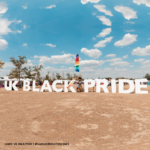 What began as a day trip to Southend-on-Sea in 2005, UK Black Pride and has been running annually since then. UK Black Pride is the world’s largest celebration for LGBTQI+ people of African, Asian, Caribbean, Latin American and Middle Eastern descent.
What began as a day trip to Southend-on-Sea in 2005, UK Black Pride and has been running annually since then. UK Black Pride is the world’s largest celebration for LGBTQI+ people of African, Asian, Caribbean, Latin American and Middle Eastern descent.
“We produce an annual celebration during pride month, as well as a variety of activities throughout the year in and around the UK, which also promotes and advocates for the spiritual, emotional, and intellectual health and wellbeing of the communities we represent. UK Black Pride is a safe space to celebrate diverse sexualities, gender identities, cultures, gender expressions and backgrounds and we foster, represent and celebrate Black LGBTQI+ and QTIPOC culture through education, the arts, cultural events and advocacy. Importantly, UK Black Pride promotes unity and cooperation among LGBTQI+ people of diasporic communities in the UK, as well as their friends and families. In the words of Audre Lorde: “There is no such thing as a single-issue struggle because we do not live single-issue lives. Our struggles are particular, but we are not alone.” “
Its work includes social networking, community outreach, and advocacy.
UK Black PrideUK Black Pride | Wikipedia Lady Phyll on the importance of Black Pride in the UK | The Story Of… UK Black Pride | Dazed | 18 Oct 2020 | 3m 55s
News and articles
Thousands enjoy UK Black Pride as it marks 18th year | BBC News | 20 Aug 2023Who is UK Black Pride For? | The Voice | 19 Aug 2023
How UK Black Pride offers a legacy of empowerment, unity and resilience | Gay Times | 18 Aug 2023
World’s largest Black LGBTQI+ event set to return to east London | The Voice | 8 May 2023
UK Black Pride | Time Out | 8 Aug 2022
UK Black Pride event returns to London | BBC News | 14 Aug 2022
My summer of love: ‘I took a date to Black Pride – and realised I loved him’ | BBC News | 6 Jul 2021
After 15 years, Black Pride is ever more vital and relevant | The Guardian | 16 Aug 2020
NCA and Home Office stands banned from Black Pride festival | Police Professional | 5 Jul 2019
Black Pride: Why we need an event to celebrate being black and gay | BBC News | 6 July 2018
The Windrush Scandal Shows Us UK Black Pride Is More Crucial Than Ever | HuffPost | 8 Jul 2018
“Pride Is Not Just A Celebration, It’s About Change”: Why Black Pride Matters | British Vogue | 7 Jul 2019
Stonewall withdraws from Pride in London over ‘lack of diversity‘ | The Guardian | 23 Feb 2018
Charity will instead support UK Black Pride after concerns event is not inclusive enough
Pride events urged to stop using ‘blackface’ acts | BBC News | 1 Jun 2017 Back to top
Rainbow and Pink Washing
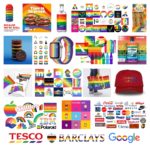 “Rainbow washing” uses LGBT+ rainbow-themed symbolism (the rainbow flag being the most common) in advertising, branding, services, merchandise and/ or social media to supposedly support the LGBT+ community but without active support.
“Rainbow washing” uses LGBT+ rainbow-themed symbolism (the rainbow flag being the most common) in advertising, branding, services, merchandise and/ or social media to supposedly support the LGBT+ community but without active support.
Also referred to as “pinkwashing”, a term used to call out corporations or organisations that use Pride for their own gain/ profit only and/ or give themselves a misleading air of progressiveness, tolerance and allyship. This is not dissimilar to “greenwashing”, when companies claim to be environmentally friendly while still damaging the environment and/ or supporting damaging policies and practices.
Every year, as LGBT+ Pride month approaches, the LGBT+community is besieged by corporate and business logos which burst into rainbow colours. Some argue that this sort of support, sponsorship and partnership increases LGBT+ visibility while also helping to consolidate our rights and presence in a modern world. Others say their participation is simply taking advantage of a free market opportunity, increasing profits without necessarily putting anything back.
For example, if a business increases its net profit by 5% by supporting Pride month – a fashion line or increased paying customers, for example – should keep it for shareholders, invest it in LGBT+ positive initiatives within the business, or give profits back to the LGBT+ community?
Good practice
Some businesses provide meaningful support to the LGBT+ movement, which earns them the cache and credibility to fly the LGBT+ rainbow flag colours, including:
- Advocating vocally for LGBT+ rights, publicly opposing anti-LGBT+ views and policies, and working to reduce hate and bias
- Hiring and supporting the advancement of LGBT+ employees year-round and ensuring LGBT+ representation at all levels of the company, especially in leadership
- Implementing LGBT+ inclusive policies and processes, eg, health insurance and pension rights for same-sex partners
- Creating opportunities for customers and employees to express their own identities within products, platforms, and services, like the ability to select your own pronouns
- Spotlighting intersectional identities to boost awareness and action on behalf of the most marginalised people in our society
- Making year-round investments in frontline LGBT+ groups with financial or in-kind donations, partnerships, or participatory impact campaigns created in collaboration with LGBT+ organisations (to ensure they add real value to the movement)
- Celebrating Pride Month through events or campaigns that help to achieve tangible and transparent goals for the LGBT+ community with measurable outcomes and asking consumers to take meaningful action beyond buying something
Some companies show a consistent commitment to the LGBT+ community, and not just during Pride month, and you can show your support by purchasing their brands. But we should never be complacent: check out what they do, follow the money, and ask questions if they are not doing what they say or you feel they should.
“Our community organisations have become increasingly corporatised and exploited, with UK Pride parades often dominated by big business sponsors and floats, vote-seeking politicians and state agents such as the police, who brag about their LGBT+ inclusiveness but have not apologised or compensated us for their decades of oppression.
Pride is now capitalism with a pink hue. It has become monetised: we pay to march, the city authorities extort vast charges from the Pride organisers and we are encouraged to buy rainbow-branded merchandise to express our sexual and gender identity. Much of LGBT+ is part of the neoliberal establishment.
Most queers no longer dissent from the values, laws and institutions of mainstream society. They happily settle for equal rights within the existing social order; often uncritically seeking what straights have, no matter how dubious. Increasingly, LGBT+ culture has lost its critical edge. We have been mainstreamed, which on one level is great, but mainstreamed on heterosexual terms. Many of us seem to aspire to little more than an LGBT+ version of straight family life.”
Pride has sold its soul to rainbow-branded capitalism | Peter Tatchell | The Guardian | 28 Jun 2019
Stonewall UK Workplace Equality Index
UK Workplace Equality Index | StonewallBenchmarking tool for employers to measure their progress on lesbian, gay, bi and trans inclusion in the workplace.
Environmental, Social, Governance (ESG)
It’s not difficult to find companies in the news that don’t do what they should, either legally or morally. Still, they are under increasing pressure today to show how they are generating profits sustainably and responsibly and reflecting political and public concerns about climate change, economic inequality, and social justice. “ESG washing” is a relatively new term coined to describe how companies exaggerate or misrepresent ESG efforts and initiatives, such as diversity, equity and inclusion, to gain favourable support from consumers, employees, and investors, for example. As companies launch their Pride-related promos, it’s important to understand which are genuine attempts at supporting the LBGTQ+ community and what qualifies as rainbow-washing.
Environmental, social, and corporate governance | WikipediaMore
LGBTQ+ Pride: Firms accused of ‘rainbow-washing’ | BBC News | 27 Aug 2022Genuine Pride or corporate rainbow washing? | Fair Planet | 24 Jun 2022
London Pride 2019: Are businesses taking advantage? | BBC News | 6 Jul 2019
Pride rainbow merchandise is everywhere, but who gets the pot of gold? | The Guardian | 13 Jun 2021
The colorful history — and precarious future — of rainbow washing | Market Place | 28 Jun 2021
Pride has sold its soul to rainbow-branded capitalism | The Guardian | 28 Jun 2019
Don’t Let That Rainbow Logo Fool You: These 9 Corporations Donated Millions To Anti-Gay Politicians | Forbes | 24 Jun 2019
The Problem With the ‘Rainbow-Washing’ of LGBTQ+ Pride | Wired | 21 Jun 2018
Avoid Rainbow Washing: 7 Inspiring Ideas to Build an LGBTQIA+ Friendly Brand | 12 Jun 2022
How LGBTQ Pride Month became a branded holiday | Vox | 25 Jun 2018
Positive Or ‘Pinkwashing’? What Do LGBTQ People Think About Pride Products? | Huff Post | 13 Jun 2019
Listerine releases rainbow mouthwash and LGBT people aren’t impressed | Pink News | 23 May 2019
Dear Corporate America, leave our LGBTQ Pride celebrations alone | Mashable | 24 Jun 2017
Parliament fly LGBT rainbow flag for the first time | UK Parliament | 3 Jun 2026
Corporate partnerships are essential to supporting flourishing LGBT communities | Homoculture | 1 Jul 2017
Let’s Stop Buying the LGBT Rainbow | The Daily Beast | 14 Apr 2015
Are British Conservatives Really Pro-LGBT or Just Pinkwashing the Vote? | Vice | 13 Nov 2014
Doritos rainbow LGBT chips spark ugly Twitter spats | CTV News | 18 Sep 2015
GCHQ’s Rainbow Lights: Exploiting Social Issues for Militarism and Imperialism | The Intercept | 18 May 2015
“Pinkwashing”: marketing stunt or corporate revolution? | Sydney Morning Herald | 6 Jun 2015
The rise of pride marketing and the curse of ‘pink washing’ | The Conversation | 26 Aug 2014
Homonationalism and Pinkwashing | CLAGS | 25 Sep 2013
Oreo Pride: Rainbow-Stuffed Cookie Sparks Boycott | ABC News | 26 Jun 201
Film clips
Rainbow washing | BBC News World Service | 27 Aug 2022 | 17m 30sRainbow capitalism raises questions about corporate commitments and Pride Month’s purpose | PBS (USA) | 1 Jul 2021 | 5m 14s
Rainbow washing and the effects on the LGBTQ Community | Matt and Blue | 15 Jun 2021 | 21m 55s
Chick-fil-A ends donations to organizations accused of being anti-LGBTQ | ABC Action News | 18 Nov 2019 | 1m 4s
Pinkwashing: Are Brands Cashing in on LGBTQ+ Pride? | Rown Ellis | 11 Jun 2018 | 5m 40s
Barilla Pasta Slammed for CEO’s Anti-LGBT Remarks | Newsy Business | 28 Sep 2013 | 2m 40s Back to top
LGBT+ History Month
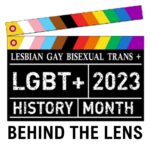 The LGBT+ History Month 2023 Behind The Lens celebrates LGBT+ peoples’ contribution to cinema and film from behind the lens. Directors, cinematographers, screenwriters, producers, animators, costume designers, special effects, make-up artists, lighting directors, musicians, choreographers and beyond. At a time when LGBT+ lives are in the media, we also encourage you to look ‘Behind the Lens’ and listen to LGBT+ peoples’ lived experiences.
The LGBT+ History Month 2023 Behind The Lens celebrates LGBT+ peoples’ contribution to cinema and film from behind the lens. Directors, cinematographers, screenwriters, producers, animators, costume designers, special effects, make-up artists, lighting directors, musicians, choreographers and beyond. At a time when LGBT+ lives are in the media, we also encourage you to look ‘Behind the Lens’ and listen to LGBT+ peoples’ lived experiences.
With a different theme each year, LGBT History Month is celebrated in February in the UK and around the world including the USA, Berlin, Greenland, Brazil, Australia, and Hungary. The overall aim of LGBT History Month is to promote equality and diversity for the benefit of the public. This is done by:
- Increasing the visibility of lesbian, gay, bisexual and transgender (“LGBT”) people, their history, lives and their experiences in the curriculum and culture of educational and other institutions, and the wider community
- Raising awareness and advancing education on matters affecting the LGBT community
- Working to make educational and other institutions safe spaces for all LGBT communities
- Promoting the welfare of LGBT people, by ensuring that the education system recognises and enables LGBT people to achieve their full potential, so they contribute fully to society and lead fulfilled lives, thus benefiting society as a whole.
LGBT History Month | Wikipedia
Timeline of LGBT history in the United Kingdom | Wikipedia Artists and activists celebrated during LGBT history month | Ham & High | 28 Jan 2022
LGBT+ History Month: 10 Things To Do In London To Learn About LGBTQ+ History | Sectet London | 25 Jan 2022
11 Things To Keep You Busy For LGBT+ History Month In London | Londonist | 18 Jan 2022 Gay couple in Wisconsin bypass flag rules with rainbow floodlights | BBC News | 9 June 2021
Pride: New UK special envoy on LGBT+ rights Lord Herbert admits worries of ‘culture war’ over trans rights | Sky News | 3 Jun 2021
Pride month: The LGBT history you probably didn’t learn in school | BBC News | 3 Jun 2021
LGBTQ+ History Month: gay victims and survivors of the Holocaust are often forgotten – we need to tell their stories | The Conversation | 24 Feb 2021
LGBT+ History Month: Matthew Mitcham’s troubled path to historic Olympic gold | BBC Sport | 22 Feb 2021
LGBT+ history month: remembering the ‘Glamour Boys’ – the gay MPs who warned 1930s Britain about Nazism | The Conversation | 4 Feb 2021
LGBT+ History Month: The history of the Gay Games: the event that grew but stuck to its principles | BBC Sport | 3 Feb 2021
LGBT+ History Month: Six LGBT+ sportspeople you should know more about | BBC Sport | 1 Feb 2021
The Story Behind the First LGBT History Month | Advocate | 2 Sep 2015
Gay History and Literature (Essays) | Rictor Norton
UK LGBT Archive | Wikipedia Gay’s the Word (Facebook) | Gay’s the Word
As a precursor to Camden and Islington LGBT History Month, Three Flying Piglets made a several short films over recent years with local volunteers both in front of and behind the camera.
Everyone Is Awesome | Three Flying Piglets | Feb 2022 | 2m
Together – We Make LGBT History | Three Flying Piglets | 2015
I’m Going – Extended Version | Three Flying Piglets | 2014 Back to top
LGBT+ Calendar Events
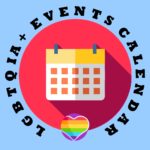 Explore our selection of calendar events, awareness, visibility and remembrance days many of which are internationally recognised. It is not a complete list, and we have not included specific days in many instances because some week or day event dates differ year by year. We are a little surprised how some days we have never heard are internationally recognised while others have a specific country focus.
Explore our selection of calendar events, awareness, visibility and remembrance days many of which are internationally recognised. It is not a complete list, and we have not included specific days in many instances because some week or day event dates differ year by year. We are a little surprised how some days we have never heard are internationally recognised while others have a specific country focus.
January
Holocaust Memorial Day (International)
February
Aromantic Spectrum Awareness Week
LGBT+ History Month (UK)
March
Bisexual Health Awareness Month
International Transgender Day of Visibility
Zero Discrimination Day
April
International Lesbian Visibility Day
May
Asexual Visibility Day
Harvey Milk Day
International Day Against Homophobia, Biphobia and Transphobia
Pansexual Visibility Day
June
Pride Month
Pulse Remembrance Day
Stonewall Riots Anniversary
July
International Drag Day
International Non-Binary Day
Omnisexual Visibility Day
August
Gay Uncle Day (Guncles Day)
Brighton Pride
Manchester Pride
London Pride
September
Bisexual Awareness Week
Bisexual Visibility (Pride) Day
Folsom Europe
October
LGBT History Month (USA and Canada)
National Hate Crime Awareness Week (UK)
International Pronouns Day
Intersex Awareness Day
National Coming Out Day
Spirit Day
November
Intersex Day of Remembrance or Solidarity
Transgender Day of Remembrance
Transgender Parent Day
December
World AIDS Day
Pansexual Pride Day
Human Rights Day
LGBTQ+ Events Guide (2020) | British Tourist Authority
List of LGBT Awareness Periods | Wikipedia
Awareness, Visibility and Remembrance Days | The Pride Shop Back to top
LGBTQ+ Archives
Bishopsgate Institute’s Special Collections and Archives holds one of the most extensive collections on LGBTQ+ history, politics and culture in the UK. It covers the late nineteenth century onward.
LGBTQ+ Archives | Bishopsgate Institute Back to topMaking LGBT history
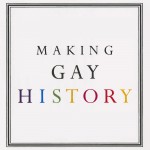 Making Gay History brings the voices of queer history to life through intimate conversations with LGBTQ champions, heroes, and witnesses to history. Since 2016, Making Gay History has been bringing the largely hidden (US) history of the LGBTQ civil rights movement to life through the voices of the people who lived it.
Making Gay History brings the voices of queer history to life through intimate conversations with LGBTQ champions, heroes, and witnesses to history. Since 2016, Making Gay History has been bringing the largely hidden (US) history of the LGBTQ civil rights movement to life through the voices of the people who lived it.
The Making Gay History podcast mines Eric Marcus’s decades old audio archive of rare interviews — conducted for his award-winning oral history of the LGBTQ civil rights movement — to create intimate, personal portraits of both known and long-forgotten champions, heroes, and witnesses to history.
Making Gay History | Making Gay History (US) Making Gay History | Eric Marcus and Sara Burningham | Talks at Google | 52m 53s Back to topQueer theory
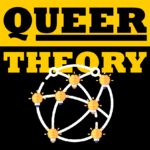 While conversations about gender identity and sexuality are more commonplace today, they were considered more provocative and controversial subjects a few decades ago.
While conversations about gender identity and sexuality are more commonplace today, they were considered more provocative and controversial subjects a few decades ago.
In the late 1980s, early 1990s, queer theory evolved from cultural movements and studies including feminism, gay and lesbian studies, activism, and sexual subcultures. It explores and challenges existing traditional ideas about identity, sexuality, and gender (labels). Particularly, heteronormativity: the belief heterosexuality is the normal and natural expression of sexuality.
For queer theorists, heteronormativity exists throughout society, reinforcing heterosexuality as “the norm” and underpinned by institutions like the Church and Government (as instruments of power and control). Queer theory studies what society believes is “normal”, why these assumptions exist in the first place, and seeks to understand who benefits and who is separated or isolated by these constructs.
By way of simple examples of heteronormativity: babies are dressed in blue for boys and pink for girls, toys for boys are (traditionally) trucks and soldiers while toys for girls include dolls and playing house. When we grow up: men will be builders, scientists and firemen while women will be homemakers, secretaries and nurses. There is an expectation that children will marry a person of the opposite sex and have children and we see this ‘acted out’ as we grow up through our parents and on mainstream TV, for example.
Queer theory | WikipediaIntroducing Queer Theory in International Relations | E-International Relations | 7 Jan 2017
Queer Theory Books | Good Reads
Queer Theory Reading List | Brown University | USA From Mary Wollstonecraft to queer theory | The Guardian | 24 Dec 2008
There’s nowt as queer as queer theory | The Guardian | 26 May 2004
Articles on Queer theory | The Conversation Back to top
Hope speech
Harvey Milk was the first openly gay person to be elected to public office in the state of California. Milk served for almost 11 months in office and was responsible for passing a stringent gay rights ordinance for the city. After his political career, he became an icon in San Francisco and a martyr in the gay community.
Milk’s famous “Hope” speech will be remembered through the years as a pivotal moment in LGBT history. Milk spoke to his audience, his people, in a language they could understand and that resonated in their hearts. The out politician spoke on the steps of San Francisco City Hall as he addressed the Gay Freedom Day Parade in 1978. Five months later, he would be shot to death in his office by Dan White.
Ian McKellen reciting Harvey Milk’s famous speech will make you proud to be gay | LGBTQ Nation | 23 May 2017 The Hope Speech | Ian McKellen reads Harvey Milk’s Hope Speech | Almeida Theatre | 12 May 2017 | 9m 33sHope Speech | Harvey Milk | 25 Jun 1978
Edited version of the speech made at San Francisco’s Gay Freedom Day Parade.
About six months ago, Anita Bryant in her speaking to God said that the drought in California was because of the gay people. On November 9, the day after I got elected, it started to rain. On the day I got sworn in, we walked to City Hall and it was kind of nice, and as soon as I said the word “I do,” it started to rain again. It’s been raining since then and the people of San Francisco figure the only way to stop it is to do a recall petition.
So much for that. Why are we here? Why are gay people here? And what’s happening?
Let’s look at 1977. In 1977, gay people had their rights taken away from them in Miami. But you must remember that in the week before Miami and the week after that, the word homosexual or gay appeared in every single newspaper in this nation in articles both pro and con. In every radio station, in every TV station and every household. For the first time in the history of the world, everybody was talking about it, good or bad. Unless you have dialogue, unless you open the walls of dialogue, you can never reach to change people’s opinion. Once you have dialogue starting, you know you can break down prejudice. In 1977 we saw a dialogue start. In 1977, we saw a gay person elected in San Francisco.
What that is, is a record of what happened last year. What we must do is make sure that 1978 continues the movement.
I know we are pressed for time so I’m going to cover just one more little point. That is to understand why it is important that gay people run for office and that gay people get elected. I know there are many people in this room who are running for central committee who are gay. I encourage you. There’s a major reason why. If my non-gay friends and supporters in this room understand it, they’ll probably understand why I’ve run so often before I finally made it.
You see there is a major difference – and it remains a vital difference – between a friend and a gay person, a friend in office and a gay person in office. Gay people have been slandered nationwide. We’ve been tarred and we’ve been brushed with the picture of pornography. In Dade County, we were accused of child molestation. It’s not enough anymore just to have friends represent us. No matter how good that friend may be.
The black community made up its mind to that a long time ago. That the myths against blacks can only be dispelled by electing black leaders, so the black community could be judged by the leaders and not by the myths or black criminals. The Spanish community must not be judged by Latin criminals or myths. The Asian community must not be judged by Asian criminals or myths. The Italian community must not be judged by the mafia, myths. And the time has come when the gay community must not be judged by our criminals and myths.
Like every other group, we must be judged by our leaders and by those who are themselves gay, those who are visible. For invisible, we remain in limbo – a myth, a person with no parents, no brothers, no sisters, no friends who are straight, no important positions in employment. A tenth of the nation supposedly composed of stereotypes and would-be seducers of children – and no offense meant to the stereotypes. But today, the black community is not judged by its friends, but by its black legislators and leaders. And we must give people the chance to judge us by our leaders and legislators. A gay person in office can set a tone, can command respect not only from the larger community, but from the young people in our own community who need both examples and hope.
The first gay people we elect must be strong. They must not be content to sit in the back of the bus. They must not be content to accept pabulum. They must be above wheeling and dealing. They must be – for the good of all of us – independent, unbought. The anger and the frustrations that some of us feel is because we are misunderstood, and friends can’t feel the anger and frustration. They can sense it in us, but they can’t feel it. Because a friend has never gone through what is known as coming out. I will never forget what it was like coming out and having nobody to look up toward. I remember the lack of hope – and our friends can’t fulfil it.
I can’t forget the looks on faces of people who’ve lost hope. Be they gay, be they seniors, be they blacks looking for an almost-impossible job, be they Latins trying to explain their problems and aspirations in a tongue that’s foreign to them. I personally will never forget that people are more important than buildings. I use the word “I” because I’m proud. I stand here tonight in front of my gay sisters, brothers and friends because I’m proud of you. I think it’s time that we have many legislators who are gay and proud of that fact and do not have to remain in the closet. I think that a gay person, up-front, will not walk away from a responsibility and be afraid of being tossed out of office. After Dade County, I walked among the angry and the frustrated night after night and I looked at their faces. And in San Francisco, three days before Gay Pride Day, a person was killed just because he was gay. And that night, I walked among the sad and the frustrated at City Hall in San Francisco and later that night as they lit candles on Castro Street and stood in silence, reaching out for some symbolic thing that would give them hope. These were strong people, whose faces I knew from the shop, the streets, meetings and people who I never saw before but I knew. They were strong, but even they needed hope.
And the young gay people who are coming out and hear Anita Bryant on television and her story. The only thing they have to look forward to is hope. And you have to give them hope. Hope for a better world, hope for a better tomorrow, hope for a better place to come to if the pressures at home are too great. Hope that all will be all right. Without hope, not only gays, but the blacks, the seniors, the handicapped, the us’es, the us’es will give up. And if you help elect to the central committee and other offices, more gay people, that gives a green light to all who feel disenfranchised, a green light to move forward. It means hope to a nation that has given up, because if a gay person makes it, the doors are open to everyone.
So if there is a message I have to give, it is that I’ve found one overriding thing about my personal election, it’s the fact that if a gay person can be elected, it’s a green light. And you and you and you, you have to give people hope.
The Hope Speech | Harvey Milk | Figures of Speech
Harvey Milk | Wikipedia
‘He was our leader and he is gone’ – Harvey Milk’s legacy after 40 years | The Guardian | 27 Nov 1018 Back to top
Homophobia
Helplines and support
Switchboard LGBT+ Helpline | 0300 330 0630 | 10am – 11pmThe LGBT Foundation | 0345 330 3030
Child Line | 0800 1111 (up to 19yrs) Check out more helplines: Helplines | MEN R US Back to top
Homophobia
Homophobia is the active targeting of lesbians and gay men based on ignorance, fear and prejudice. It is rooted in simplistic and stereotypical views of what people from the LGBT community are. It can take the form of verbal abuse, physical violence, or attacks in the press or media. It humiliates, degrades, intimidates, insults, excludes, silences or harms us on the basis of our actual or perceived sexual orientation or gender identity.
Homo: a group (genus) of primates that includes modern humans (Homo sapiens)
Phobia: an overwhelming and unreasonable fear of a person, object or situation that poses little real danger but provokes anxiety and avoidance.The term homophobia was coined in the late 1960s by psychologist George Weinberg. Weinberg used homophobia to label heterosexuals’ dread of being in close quarters with homosexuals as well as homosexuals’ self loathing. The word first appeared in print in 1969 and was subsequently discussed at length in Weinberg’s 1972 book, Society and the Healthy Homosexual
This is how homophobia feels in 2018 | The Social BBC Scotland | 9 Apr 2018 | 4m 17s
Two men hold hands in a public place, but even in 2018, something’s not quite right. Time For Love explores homophobia in modern society, and also the concept of normality. Do the pressures of convention turn us against one another? Is love the price?
International Day Against Homophobia, Transphobia and Biphobia | 17 May LGBTQ+: Homophobic comments leave pupils feeling ‘outcast’ | BBC | 10 Feb 2022
‘Unsafe’ school riddled with homophobic bullying slammed as ‘inadequate’ by Ofsted | 1 Feb 2022
Doctor’s haunting last words played in court after being left to die in ‘homophobic’ attack | Pink News | 27 Jan 2022
BBC News – Gay couple refused south London house viewing and purchase | BBC | 24 Jan 2022 Homophobic gang attack gay couple with hammer in terrifying street robbery: ‘I’m lost for words’ | Pink News | 26 Nov 2021
BBC News – Gay and Muslim: ‘My family wanted to cure me’ | BBC | 30 Nov 2021
Outrage after gay woman diagnosed at Spanish hospital with ‘homosexuality’ | The Guardian | 7 Oct 2021
For LGBTQ+ football fans, even more must be done | Huck | 16 Jul 2021
What is a hate crime | Report-It.org.uk | 2016
Report LGB&T Hate Crime | Stop Hate UK | 2016 Football Against Homophobia | Dulwich Hamlet | 4m 51s
Shh! Silence Helps Homophobia | LGBT Youth Scotland | 7m 02s What’s morally wrong with homosexuality? | John Corvino | 9 July 2013 | 57m 59s
Recorded here in 2007, John Corvino dismantles common arguments against same-sex relationships, including those based on nature, harm, and religion. Stand Up! – Don’t Stand for Homophobic Bullying | BeLonGTo, Ireland | 1 Apr 2011 | 4m 24s
Stand Up at Work! | BeLonGTo, Ireland | 15 May 2015 | 7m 20s
Against Homophobia | Stand Out, Australia | 19 Jul 2011 | 5m 25s
No to homophobia | ALSO, Australia | 26 Aug 2012 | 1m 05s
Gay men share their first experience of homophobia | Pink News | 27 Feb 2019 | 5m 6s
Writing about this isn't easy
Writing about this here isn’t easy for us, especially if think you might be gay or are thinking about coming out. Equally, it would be wrong to sugar-coat something when the truth is that not everybody likes us. And they can be pretty mean about us!
Without losing sight of the extraordinary strides made though civil partnerships, gay marriage and the Equality Act 2010, scratch the surface and homophobia is alive and well in the UK, some might say rife, once you leave the relative ‘safety’ of larger UK cities.
This doesn’t mean you shouldn’t come out, but just because your favourite celeb is out, and guys on YouTube say it’s OK to be gay, doesn’t necessarily make your journey easier. Most gay men understand what it is like to be discriminated against because of their sexuality. We grow up in a world where heterosexuality is the assumed norm and anything different is often considered unnatural or perverted. Even when friends and families give us love and support, we are usually aware of others who don’t or won’t.
Outside the UK the EU LGBT Survey 2013 makes for worrying reading. Further afield, Russia continues to crack down on homosexuality, Isis perpetuate murderous punishments for people who are gay, and there over 70 countries around the world where homosexuality is illegal.
Justin Thomas dropped by sponsor Ralph Lauren for homophobic slur | Metro | 16 Jan 2021Countries where homosexuality is illegal | Erasing 76 Crimes blog | Jun 2019
France rugby team supports Gareth Thomas with rainbow laces | BBC News | 20 Nov 2018
Thousands march for LGBT rights in pride parades across Europe | The Guardian | 10 Jun 2018
UK rows back on plans to promote gay rights at Commonwealth summit | The Guardian | 14 Apr 2018
It is not easy being LGBT in Serbia | Euractiv | 14 Sep 2017
Fifty years of gay rights but some in the British media are peddling the same homophobia | The Conversation | 25 Jul 2017
Istanbul police fire rubber bullets, tear gas to keep gay pride marchers off the street | dw.com | 25 Jun 2017
Isis fighters throw another ‘gay’ man off a tower and stone him to death when he survives fall The Independent | 4 Mar 2015
Holding hands with another man in public has made me realise how naïve I’ve been about homophobia in the UK | The Independent, Iain Lee | 2015
Russia’s new crackdown on human rights | Amnesty International UK | Jan 2014
EU LGBT survey: Poll on homophobia sparks concern | BBC News | 2013
History of violence against LGBT people in the United Kingdom | Wikipedia
Panti Bliss at the Abbey Theatre
Drag queen and gay rights activist Panti Bliss (aka Rory O’Neill) gave a barnstorming performance at the Abbey Theatre, Dublin at an event to protest at the treatment of debate around homophobia on Radio and Television of Ireland (RTE).
Panti Bliss, Ireland [Abbey Theatre] | 2 Feb 2014 | 10m 47s Back to topInternalised homophobia
 As we grow up, we are exposed to, learn, and taught society’s ideas, values, and boundaries.
As we grow up, we are exposed to, learn, and taught society’s ideas, values, and boundaries.
This can include unplesant stuff and negativity about same-sex attraction, homosexuality, and that not being heterosexual is somehow ‘wrong’, ‘immoral’, ‘evil’, ‘sick’, ‘bad’, ‘twisted’, and ‘something to be ashamed of’.
Mainly when we younger, we often accept (at face value) our parent’s beliefs, prevailing attitudes in the community, and religious and faith teachings. We may be influenced by the views of friends and work colleagues and, anti-gay laws are still being passed by governments, around the world.
It’s not difficult to turn this negative stuff inwards, absorbing it into ourselves, believing it to be true. This can lead to feelings of self-hatred, self-loathing, and disgust which can have damaging and lasting consequences.
This is ‘internalised homophobia’ also known as ‘internalised oppression’, and affects and harms people from across the LGBT+ spectrum.
Some experience internal conflicts (which can last for years) over feelings of sexual attraction, a desire to be ‘normal’, that they should be ‘normal’ and heterosexual. Some people try to bury or reject their sexuality altogether.
Internalised homophobia gets in the way of having a fulfilling personal life (especially if you are already in a same-sex relationship), can mess with your work life, lowering and crushing self-esteem which leads to anxiety and depression.
Whether you are gay or not, it may be helpful to speak to a trusted friend or contact one of the helplines listed in our support section.
Aquarium | Yonatan Tal | 26 Apr 2015 | 2m 35s Internalised Homophobia | The Rainbow ProjectHomophobia (scroll down Internalised Homophobia) | Wikipedia
Internalised homophobia | Revel and Riot
What LGBTIQ+ experiences affect mental health? | MIND
Gay bears struggling with internalised fatphobia and beard envy, groundbreaking research finds | Pink News | 17 Feb 2022“Gay people are not the only ones to suffer such shame, but experts, both gay and straight, agree that gay kids are overwhelmed with it. Many of us grow up, come out and have wonderful and happy lives. For others, the journey can be rockier. Many bury their feelings, hoping they’ll go away, some psychologically “split”, like the heterosexually married men who believe anonymous internet hook-ups don’t count as gay if they happen in secret. Just this week I met a young man who told me he hated gay pride, hated effeminate men but crucially was trying to work through these feelings by talking about them. The gay community doesn’t talk about this enough, and when we do it’s often with judgment.”
Self-loathing among gay people is nothing new. We’re overwhelmed by it | The Guardian | Matthew Todd | 8 Feb 2018
‘I’m Not One Of Those Gays’ | Internalised Homophobia | BBC Social | 31 May 2019 | 2m 40s
Internalized homophobia and social media | Psychology Today | 14 Dec 2018
Gay and homophobic? Dealing with internalised homophobia | Xander Tonjaroff | 9 Feb 2017 | 6m 21s
How to Overcome Internalized Homophobia | Gayety | 15 Jul | 2016
Gay man overcomes self-hatred and learns to love himself | ImFromDriftwood | 8 May 2018 | 7m 1s
Bullying
Bullying
 Bullying is a form of behaviour to intentionally causes another person distress, hurt and/ or injury – physically, mentally, and/ or emotionally. It involves a perceived or real imbalance of ‘power’ or ‘advantage’ such as status/ background, popularity, physical strength, and access to sensitive/ embarrassing information.
Bullying is a form of behaviour to intentionally causes another person distress, hurt and/ or injury – physically, mentally, and/ or emotionally. It involves a perceived or real imbalance of ‘power’ or ‘advantage’ such as status/ background, popularity, physical strength, and access to sensitive/ embarrassing information.
Bullying behaviours often include teasing, threat, intimidation, disclosure, use of force and violence, coercion, aggression, and abuse. Bullying is often repeated, becoming habitual, and the person being bullied has done nothing to “cause” the bullying and has trouble defending themselves.
Cyberbullying is conducted online via social media, email, and/ or text messaging. Whether online or in the real world, there are different forms of bullying:
- Verbal, eg: name-calling, teasing, taunting, inappropriate sexual comments, threats to cause harm
- Social, eg: telling others not to be friends with someone, embarrassing someone, starting and spreading rumours, damaging someone’s reputation, intentionally leaving someone out of a group/ circle of friends
- Physical, eg: hurting a person’s body or possessions, including tripping/ pushing, spitting, hitting/ punching/ kicking/ pinching, taking/ breaking a person’s belongings/ possessions, making disrespectful/ rude hand gestures
Bullying doesn’t only happen in school, it can also happen later in life, at work, for example, and there are often lasting implications for those who are bullied and those who bully.
Homophobic and transphobic bullying (at school)
Homophobic and transphobic bullying is when people behave or speak in a way which makes someone feel bullied because of their actual or perceived gender and/ or sexuality. People may be a target of this type of bullying because of their appearance, behaviour, and physical traits or because they have friends or family who are lesbian, gay, bisexual, trans, or questioning … or possibly just because they are seen as being different.
Like all forms of bullying, homophobic bullying can be through name-calling, spreading rumours, cyberbullying, and physical or sexual and emotional abuse. Young people have described to us how they have been subjected to hate campaigns against them, which can start off within the classroom and then move onto social media. This has devastated those being bullied in this way, and some have moved schools and had their lives disrupted because of the actions of the bullies.
Not only does this affect a young person’s self-esteem, emotional health and well-being but it also can affect their attendance at school and their attainment. This type of bullying can also include threats to ‘out’ you to friends and family about your sexuality, even if you are not gay, lesbian or bisexual.
If you are being bullied
If you are experiencing bullying, you may be:
- Questioning or unsure of your sexuality and/ or gender identity
- Struggling with your studies
- Playing truant or avoiding classes
- Feeling bad about yourself and your future
- Feeling frightened or alone
Examples of bullying are when people
- Write vicious and hurtful comments on social networking sites and/ or post offensive pictures
- Verbally abuse or threaten you and/ or name call; eg: gay, fag, fairy, poofter
- Exclude you from conversations, social groups, parties, and invitations
- Throw things at you, unintentionally bump into you, hit you, and/ or graffiti your possessions
- Out you by telling other people or spreading rumours that you are gay
- Deliberately misuse pronouns when addressing you; eg: referring to you as she if you are male
What to do
- Remember: you are not alone.
- Be brave thing to do is to talk to someone. Some people and organisations can listen to you, understand you, and respect your confidentiality
- Do not make contact or engage with the bully
- Do not delete texts/ messages, etc. Save everything you receive, and it helps to take screenshots.
- If you think you are in physical danger or fear for your life call 999
Bullying at school
All schools have a duty of care to ensure the safety and emotional well-being of every person in their care. Schools need to be aware of the homophobia endemic in British schools and its effects on learning, health, and self-esteem. Anti-bullying activities can improve pupils’ behaviour, social relationships, and level of academic achievement.
Switchboard LGBT+ Helpline | 0300 330 0630The LGBT Foundation | 0345 3 30 30 30
EACH | 0808 1000 143 (up to 18yrs)
Child Line | 0800 1111 (up to 19yrs) Anti-Bullying Alliance
Young Minds
Young Stonewall | Stonewall
LGBT+ Inclusive Sex & Relationship Education | Peter Tachell Foundation
Homophobic, biphobic and transphobic bullying | Anti-Bullying Alliance
Cut to anti-bullying funding in England for LGBTQ+ young people ‘callous’ | The Guardian | 19 Nov 2020
Pathways to LGBT+ Inclusion: Report | 2020 | Diversity Role Models Back to top
Hate crime
Reporting hate crime and hate crime support
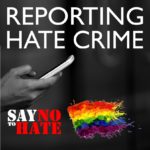 Not everyone is comfortable -or at ease – calling the police. Fortunately, there are different ways to report hate crime:
Not everyone is comfortable -or at ease – calling the police. Fortunately, there are different ways to report hate crime:
1. If it is an emergency call the police on 999
This is when:
- a serious offence is in progress or has just been committed
- someone is in immediate danger or harm
- property is in danger of being damaged
- a serious disruption to the public is likely
If you’re deaf or hard of hearing, use the textphone service 18000 or text 999 if you’ve pre-registered with the emergency SMS service.
If it is not a 999 emergency, there are several ways you can report hate crime
Metropolitan Police Service (MPS)
Call 101 | Metropolitan Police Service (MPS)
Reporting hate crime online | Metropolitan Police Service (MPS)
Visit a police station | Metropolitan Police Service (MPS)
2. Voluntary sector organisations, not the Met police
Community Security Trust (CST)
Charity protecting British Jews from anti-Semitism and related threats
Community Security Trust (CST)
DeafPlus
Empowers deaf people to take control of their own lives
DeafPlus
GALOP
Advice and support to people who have experienced biphobia, homophobia, transphobia, sexual violence or domestic abuse
GALOP
Report Racism GRT
Hate incident reporting site and support service that is run by and for Gypsy, Traveller and Roma communities in the UK by GATE Herts
Report Racism GRT
Stop Hate UK
National organisation working to challenge all forms of Hate Crime and discrimination, based on any aspect of an individual’s identity
Stop Hate UK
Tell Mama
Independent, non-governmental organisation which works on tackling anti-Muslim hatred
Tell Mama
The Monitoring Group
Anti-racist charity promoting civil rights
The Monitoring Group
Victim Support
Supporting people affected by crime and traumatic incidents in England and Wales
Victim Support
Community Alliance To Combat Hate (CATCH)
Report hate crime through one of its partner organisations which are GALOP, The Monitoring Group (TMG), The Community Security Trust (CST), TellMAMA, Choice in Hackney, Stay Safe East and Real
Community Alliance To Combat Hate (CATCH) | MEN R US
Report hate crime
True vision from the National Police Chiefs’ Council
True Vision
3. Local authority websites in Greater London
Local authority websites should have a page about hate crime and how to report it. This can be helpful because there may be a local organisation where you may be more comfortable reporting.
Barking and DagenhamBarnet
Bexley
Brent
Bromley | No reporting page. Checked 25-10-23.
Croyden
Ealing
Enfield | No reporting page. Checked 25-10-23.
Greenwich
Hackney | No reporting page. Checked 25-10-23.
Hammersmith and Fulham
Haringey
Harrow
Havering
Hillingdon
Hounslow
Islington
Kensington and Chelsea
Kingston upon Thames
Lambeth
Lewisham
Merton
Newham
Redbridge
Richmond upon Thames
Southwark
Waltham Forest
Wandsworth
Westminster | No reporting page. Checked 25-10-23.
Back to top
Hate incidents and hate crime
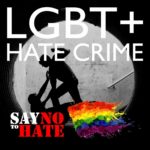 Hate incidents and hate crime are acts of hostility or violence directed at people because of who they are or who someone thinks they are.
Hate incidents and hate crime are acts of hostility or violence directed at people because of who they are or who someone thinks they are.
The police and Crown Prosecution Service have agreed a common definition of hate incidents. They say something is a hate incident if the victim or anyone else think it was motivated by hostility or prejudice based on:
- disability
- race
- religion
- transgender identity
- sexual orientation
This means that if you believe something is a hate incident it should be recorded as such by the person to whom you are reporting it. All police forces record hate incidents based on these five personal characteristics.
Examples of hate incidents:
- verbal abuse like name-calling and offensive jokes
- harassment
- bullying or intimidation by children, adults, neighbours or strangers
- physical attacks such as hitting, punching, pushing, spitting
- threats of violence
- hoax calls, abusive phone or text messages, hate mail
- online abuse; eg: Gaydar, Grindr, Facebook, Twitter
- displaying or circulating discriminatory literature or posters
- harm or damage to things such as your home, pet, vehicle
- graffiti
- arson
- malicious complaints, for example over parking, smells or noise.
When is a hate incident also a hate crime?
When hate incidents become criminal offences they are known as hate crimes – a criminal who breaks the law. Any criminal offence can be a hate crime if it was carried out because of hostility or prejudice based on disability, race, religion, transgender identity or sexual orientation. When something is classed as a hate crime, the judge can impose a tougher sentence on the offender under the Criminal Justice Act 2003.
Incidents which are based on other personal characteristics, such as age and belonging to an alternative subculture, are not considered to be hate crimes under the law. You can still report these, but they will not be prosecuted specifically as hate crimes by the police and the Crown Prosecution Service.
Examples of hate crimes
- assaults
- verbal abuse or threats
- criminal damage
- harassment
- murder
- sexual assault
- theft
- fraud
- burglary
- hate mail (Malicious Communications Act 1988)
- causing harassment, alarm or distress (Public Order Act 1988).
What can you do about a hate incident or crime?
If you’ve experienced a hate incident or crime you can report it to the police. You can also report a hate incident or crime even if it wasn’t directed at you. For example, you could be a friend, neighbour, family member, support worker or simply a passer-by.
When reporting the incident or crime you should say whether you think it was because of disability, race, religion, transgender identity, sexual orientation or a combination of these things. This is important because it makes sure the police record it as a hate incident or crime.
You may be unsure whether the incident is a criminal offence, or you may think it’s not serious enough to be reported. However, if you are distressed and want something done about what happened, it’s always best to report it. Although the police can only charge and prosecute someone when the law has been broken, there are other things the police can do to help you deal with incident.
It’s also important to keep in mind that some hate crimes start as smaller incidents which may escalate into more serious and frequent attacks – so it’s always best to act early.
If you’re being repeatedly harassed, should you report all the incidents?
If you’ve experienced hate crime, it may have been just one isolated incident. But sometimes, you may be repeatedly harassed by the same person or group of people. It’s best to report all the hate incidents you experience to help the police get the full picture. If you’re in this situation, it may be a good idea to keep a record of the incidents to help you when you contact the police.
Back to topHate crime statistics
- Home Office
- GALOP
- Stonewall
- The Crown Prosecution Service
Hate crime, England and Wales, 2020 to 2021 | Home Office
Hate crime, England and Wales, 2019 to 2020 | Home Office
Hate crime, England and Wales, 2018 to 2019 | Home Office
Hate crime, England and Wales, 2017 to 2018 | Home Office
Hate crime, England and Wales, 2015 to 2016 | Home Office
Hate crime, England and Wales, 2014 to 2015 | Home Office
Hate crime, England and Wales, 2013 to 2014 | Home Office
Hate crime, England and Wales, 2012 to 2013 | Home Office
Hate crime, England and Wales, 2011 to 2012 | Home Office Hate Crime Report 2018-19 | The Crown Prosecution Service
The Hate Crime Report 2021 | GALOP
Hate crime soars to nearly 100,000 incidents in a year | Huff Post | 16 Oct 2018
More
National LGBT Hate Crime Partnership | National LGBT Hate Crime Partnership
The National LGBT Hate Crime Partnership brings together 35 Lesbian, Gay, Bisexual and Trans (LGBT) organisations from across England, Wales and Scotland. Delivered for the Equality and Human Rights Commission (EHRC), the partnership led by the LGBT Consortium aims to increase the reporting of Homophobic, Biphobic and Transphobic Hate Crimes and incidents and improve the support available to those targeted.
Homophobic hate crime reports soar but charges fall | The Guardian | 11 Sep 2019
The number of homophobic hate crimes reported to police have more than doubled in the past five years – yet only 8% result in prosecutions, figures show. Reports of homophobic abuse recorded by UK police forces soared from 5,807 in 2014-15 to 13,530 in 2018-19, according to the data. But the number of prosecutions dropped from 1,157 to 1,058 over the same period – from 20% of all reports to 8%.
Understanding hate crime statistics for London
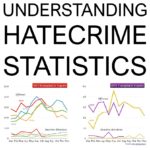 Is hate crime going up or down in London?
Is hate crime going up or down in London?
Year on year, for over 7 years, reported homophobic hate crime has risen but is this because there is more hate crime or more people are reporting them? Furthermore, statistics for transphobic hate crime are now included.
The answer is we can’t be certain, but it’s probably a combination. More importantly, the rate of sanction detections (solving crime) has fallen year on year over 7 years. Get angry about that!
Liaising with stakeholders, analysing local intelligence, and following news media, MENRUS.CO.UK believes there is a sustained upward trend in hate crime BUT we will always qualify this by saying this is partly due to more people reporting and improvements in data collection and analysis.
When you read a ‘sensational’ headline that says hate crime statistics are “truly shocking” or “worse than ever” check to see whether the piece qualifies what it is they are saying. Even when hate crime statistics don’t make for pleasant reading, they should be reported accurately. This doesn’t always happen.
For a breakdown of statistics, go to the LGBT+ Independent Advisory Group, which crunch the numbers monthly.
LGBT+ Independent Advisory GroupWhat are Homophobic offences?
According to the Metropolitan Police Service (MPS):
- Hate incidents
A Hate Incident is any incident which the victim, or anyone else, thinks is based on someone’s prejudice towards them because of their race, religion, sexual orientation, disability or because they are transgender. Not all hate incidents will amount to criminal offences, but those that do become hate crimes. Evidence of the hate element is not a requirement. The victim need not perceive the incident to be hate-related. It would suffice if another person (even a police officer) did perceive that the incident was hate-related. - Hate crimes
The National Police Chiefs Council (NPCC) and the Crown Prosecution Service (CPS) have agreed on a common definition of hate crime: “Any criminal offence which is perceived by the victim or any other person, to be motivated by hostility or prejudice based on a person’s race or perceived race; religion or perceived religion; sexual orientation or perceived sexual orientation; disability or perceived disability and any crime motivated by hostility or prejudice against a person who is transgender or perceived to be transgender.” - Homophobic targeted hate crime
A homophobic incident is defined as: ‘Any incident, which is perceived to be homophobic by the victim or any other person.’ (That is directed to impact on those known or perceived to be lesbian, gay, bisexual or transgender people)
What are Sanction Detections?
We found this definition of Sanction Detections from Full Fact:
- Sanction detections
According to the Home Office, Sanction detections are detections where offences are resolved through a formal sanction – including being charged or receiving a caution. Not all sanction detections lead to a conviction. In cases where a defendant is charged the Crown Prosecution Service (CPS) may not decide to proceed with the case and the defendant can always be found not guilty.
Hate crime news and articles
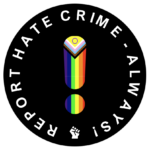 Year on year, reported homophobic hate crime has risen for over 7 years but is this because there is more hate crime or more people are reporting them to to the police? We can’t be certain but, in our view, it’s likely a combination.
Year on year, reported homophobic hate crime has risen for over 7 years but is this because there is more hate crime or more people are reporting them to to the police? We can’t be certain but, in our view, it’s likely a combination.
Speaking with stakeholders, analysing local intelligence, and following news media, MENRUS.CO.UK believes there is a sustained upward trend in hate crime towards LGBT+ people in Greater London BUT we will always qualify this by saying this is partly due to more people reporting and improvements in data collection and analysis.
More importantly though, the rate of sanction detections (solving crime) by the the police has fallen year on year over 7 years. So, get angry about that!
When you read a ‘sensational’ headline that says hate crime statistics are “truly shocking” or “worse than ever” check to see whether the piece qualifies what it is they are saying. Even when hate crime statistics don’t make for pleasant reading, they should be reported accurately. This doesn’t always happen.Two men injured after another homophobic attack in south London | The Guardian | 25 Aug 2023LGBTQ hate crime elsewhere
ILGA’s Annual Review 2023 (EU) says “In the past 12 months there has not only been a stark rise in violence against LGBTI people, but in the severity of that violence. In particular, an activist was tortured and murdered by relatives in Azerbaijan. In Oslo, two were killed and 20 wounded after an attack outside an LGBTI bar. In Bratislava, two people were murdered and one injured outside an LGBTI bar in what has been described as a white supremacist terrorist attack. Two gay men were killed in separate attacks by the same person in Ireland.”
In November 2022, ACLED said Anti-LGBT+ mobilization — including demonstrations, political violence, and offline propaganda activity — has risen to its highest levels since ACLED started collecting data for the United States in 2020. Nearly 200 anti-LGBT+ incidents have been reported so far this year, marking an increase of three times compared to 2021 and 12 times compared to 2020. Acts of political violence targeting the LGBT+ community have more than tripled compared to 2021. Anti-LGBT+ demonstrations have more than doubled relative to 2021. Far-right militias and militant social movements like the Proud Boys have ramped up their engagement in anti-LGBT+ demonstrations by over three times this year compared to 2021.
Fact Sheet: Anti-LGBT+ Mobilization in the United States | ACLED | 23 Nov 2023
ILGA World’s 2022 Annual Reports | ILGA
Clapham stabbing: ‘More needs to be done to protect LGBT community’ | BBC News | 17 Aug 2023
LGBT people experience hate crime ‘too often’ to report to police | BBC News | 23 Jun 2023
Man jailed for brutal homophobic hammer murder of gay man in London cemetery | PInk News | 17 Jun 2023
Met treating flat fire as transphobic hate crime | BBC News | 25 Apr 2023 LGBTQ Americans are 9 times more likely to be victimized by a hate crime | The Conversation | 21 Dec 2022
Cornwall man ‘had to move away after homophobic attack’ | BBC News | 24 Oct 2022
Hate crime: Increase in reported cases across Wales | BBC | 8 Oct 2022
Exclusive: Massive Rise in Anti-LGBTQ Hate Crime Reports in UK | VICE | 15 Aug 2022
Man arrested after gay choir member hurt in ‘homophobic attack’ | BBC News | 2 Jul 2022
Gary Jenkins: girl, 17, and two men get life sentences for homophobic murder | The Guardian | 25 Mar 2022
Calls for protection of LGBTQ+ people after spate of hate crimes in Cardiff | The Guardian | 5 Feb 2022
Four people ‘brutally beaten’ by ‘violent’ bouncer at queer pub with one man left hospitalised | Pink news | 1 Feb 2022
Homeless man ‘beaten beyond recognition’ and killed ‘because he was gay’, court told | Pink News | 14 Feb 2022
Doctor murder: Hundreds at Gary Jenkins Cardiff vigil | BBC | 6 Feb 2022 Couple beaten by homophobic gang outside gay club | Queerty* | 14 Oct 2021
‘Don’t Punish Me For Who I Am’: Huge Jump in Anti-LGBTQ Hate Crime Reports in UK | Vice | 11 Oct 2021
The shocking rise in anti-LGBTQ hate crime shows bigotry is still ruining lives | The Guardian | 3 Sep 2021
Peter Karlsson: The painful verdict on Swedish ice hockey player’s 1995 killing | BBC Sport | 16 Aug 2021
Men hurt in homophobic attack at Birmingham’s Gay Village | BBC News | 16 Aug 2021
Snickers apologizes for wildly homophobic commercial | Queerty* | 9 Aug 2021
Snickers Spain pulls TV advert after homophobia accusations | BBC News | 6 Aug 2021
Spate of attacks across UK sparks fear among LGBTQ+ community | The Guardian | 29 Jun 2021
Hateful bigots ‘feel emboldened by the silence of onlookers’. It’s time to change that | Pink News | 21 Jun 2021
Liverpool crime commissioner condemns city-wide spate of homophobic attacks as latest victim speaks out | Pink News | 20 Jun 2021
Man choked on Tube and forced to apologise for being gay shares moving words of advice for queer youth everywhere | Pink News | 17 Jun 2021
20-year-old gay Iranian man beheaded by his own family after being outed | Queerty | 10 May 2021
25-year-old gay teacher shot, burned in brutal murder | Queerty* | 17 May 2021
Gay Latvian paramedic dies after being burnt alive in horrific ‘homophobic attack’ | Pink News | 1 May 2021
After Being Called ‘Disgusting,’ Queer Cadbury Creme Egg Couple Reflect on Negative Pushback | Edge Media Network | 14 Mar 2021
MSPs approve Scotland’s controversial hate crime law | BBC News | 12 Mar 2021
Black and LGBT Edinburgh University students attacked in Zoom meeting | BBC News | 19 Feb 2021
Gay Camp in Michigan under fire for issuing genital requirements | Queerty* | 19 Feb 2021
Adult performer Matthew Camp’s home destroyed in horrific arson attack | Queerty* | 19 Jan 2021 Homophobic father hires hitman to break fingers of gay surgeon son | Out | 18 Dec 2020
Gay man attacked in hate crime fears reporting assault to police | Out | 16 Dec 2020
Ken Maginnis: Peer faces 18-month ban over homophobic bullying claims | BBC News | 3 Dec 2020
LGBT students attacked in university Zoom meeting | BBC News | 23 Oct 2020
‘I thought I was going to die’ in homophobic attack | BBC News | 9 Oct 2020
Drunken rugby lout jailed after knocking gay man’s front teeth out in ‘hostile’ homophobic attack | Pink News | 25 Aug 2020
‘Nine points up on Europe’: data shows UK increase in LGBTQ harassment | The Guardian | 26 Jun 2020
Coronavirus: ‘I was attacked for hanging my rainbow flag’ | BBC News | 22 May 2020
Thugs push gay man into the road and beat him senseless – twice – in ‘vicious homophobic attack’ in central London | PInk News | 22 May 2020
Hate crimes double in five years in England and Wales | Society | The Guardian | 15 Oct 2019
Calls for enquiry as LGBT+ hate crime doubles in UK | Reuters | 12 Sep 2019
Homophobic hate crime charges fall as reports soar | BBC | 11 Sep 2019
Four teenagers charged over homophobic attack on London bus | 25 Jul 2019 Homophobic and transphobic hate crimes surge in England and Wales | The Guardian | 14 Jun 2019
“The rate of LGBT hate crime per capita rose by 144% between 2013-14 and 2017-18. In the most recent year of data, police recorded 11,600 crimes, more than doubling from 4,600 during this period. Transphobic attacks have soared in recent years, trebling from 550 reports to 1,650 over the period examined. Almost half (46%) of these crimes in 2017-2018 were violent offences, ranging from common assault to grievous bodily harm.” As rightwing populism spreads, bigotry against the LGBT community is growing | The Guardian | 17 May 2019
Man ‘glassed for holding hands with boyfriend’ in unprovoked homophobic attack at Peckham Wetherspoon pub | Evening Standard | 10 Mar 2016
National Hate Crime Awareness Week: ‘I still get called p**f on the street in London’ | Evening Standard | 15 Oct 2016
Gay man subjected to vile tirade of homophobic abuse: ‘It’s happening more and more often’ | Evening Standard Wed 16 Nov 2016
Gay couple subjected to vile homophobic attacks on consecutive nights say ‘it just doesn’t make sense’ | Evening Standard | 17 Dec 2016
Gay couple ‘beaten up on London-bound train in horrific homophobic attack on Valentine’s Day’ | Evening Standard | 17 Feb 2017 Hate Crime Report 2016 | GALOP
Hate crime laws | The Law Commission | 7 Dec 2021 LGBT Hate Crime | BBC Inside Out West | 10 Sep 2019 | 9m 57s
LGBT hate crime on the rise | Channel 4 News | 7 Sep 2017 | 6m Back to top
LGBT+ Independent Advisory Group
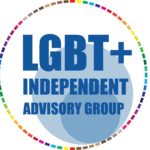 Voluntary group of independent lesbian, gay, bisexual and transgender (LGBT) advisors working with the Metropolitan Police Service (MPS) at New Scotland Yard. Advises on and monitor police issues that affect LGBT people who live in, work in, study in or are visiting London.
Voluntary group of independent lesbian, gay, bisexual and transgender (LGBT) advisors working with the Metropolitan Police Service (MPS) at New Scotland Yard. Advises on and monitor police issues that affect LGBT people who live in, work in, study in or are visiting London.
Initially, the Group was only invited to advise the Racial and Violent Crime Task Force (CO24), now the Diversity and Citizen Focus Directorate (DCFD). However, as the quality of its advice has been recognised, the Group is increasingly invited to participate in a wide range of strategy and policy work.
20 years in 2020 and going strong
2020 marked 20 years; view the film below to find out more.
IOPC update on the investigation into the MPS handling of the Barking and Dagenham murders
On 24 January 2022, the Independent Office for Police Conduct (IOPC) attended the LGBT+ Advisory Group’s community meeting on the deaths of Anthony Walgate, Gabriel Kovari, Daniel Whitworth and Jack Taylor. The Group asked him for an explanation of the process to decide whether to re-open the IOPC investigation into the MPS handling of the four murders. The Group received more details on 9/2/22 and you can read the full letter here. In summary:
The IOPC is aware that “some of the information coming to light was potentially new information“. So, they have embarked on an “initial assessment” to see if there are “compelling reasons” to re-open the investigation. There are two criteria that must both be satisfied:
The first criterion:
(1a) There is significant new information that requires further investigation and a real possibility that the new information, had it been available, would have led wholly or partly to different decisions on discipline, performance and/or referral to the CPS;
OR (1b) The original [IOPC] investigation was flawed in a manner which had a material impact on subsequent decisions on discipline, performance and/or referral to the CPS.
The second criterion:
(2) It is necessary to require a reinvestigation in the public interest.
They are at this “initial assessment” phase. They are unable to give a clear timescale for when this will be completed.
Click the link below for more.
LGBT Advisory Group | LGBT Advisory GroupLGBT Advisory Group | LGBT Advisory Group The Mayor’s Office for Policing and Crime (MOPAC)
Stats and data | Hate crime | Metropolitan Police Service (MPS) Hate crime laws | The Law Commission | 7 Dec 2021 Back to top
Community Alliance To Combat Hate (CATCH)
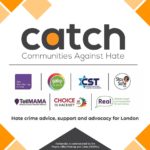 The Community Alliance To Combat Hate (CATCH) is a group of charities working to end hate crime. They give specialist advice and help to people targeted with violence, abuse or harassment because of their race, religion, disability, sexuality or gender identity. CATCH is open to anyone experiencing hate in London. If you experienced a hate crime elsewhere, you can still get in touch.
The Community Alliance To Combat Hate (CATCH) is a group of charities working to end hate crime. They give specialist advice and help to people targeted with violence, abuse or harassment because of their race, religion, disability, sexuality or gender identity. CATCH is open to anyone experiencing hate in London. If you experienced a hate crime elsewhere, you can still get in touch.
The partnership is commissioned by the Mayors Office Policing and Crime (MOPAC). CATCH is a way for people who have experienced hate to get the maximum amount of help with a minimum amount of hassle. The alliance is the first of its kind, bringing together community organisations from different hate crime strands.
Community Alliance To Combat Hate (CATCH)GALOP
Galop provides advice and support to people who have experienced hate crime because of their sexual orientation or gender identity. Hate crime can include verbal or written abuse, harassment and violence. Galop provides help to lesbian, gay, bisexual and trans (LGBT) people experiencing any type of abuse, so you can also get in touch if you have experienced domestic abuse, sexual violence, or any other safety problem.
GALOP (CATCH Website)
GALOP
The Monitoring Group (TMG)
An anti-racist charity that promotes civil rights. Provide a helpline and casework service to people experiencing racial violence, religious hatred, sexual violence and state neglect or misconduct. Leading exponent of family-led empowerment and justice campaigns in the UK. Some of these cases led to Public Judicial Inquiries and consequent changes in legislation, social policies and practices. Since the London Bombings, has worked with victim families of the carnage as well as Black Minority and Ethnic and Muslim groups and individuals affected by indiscriminate state-led policies in London, Midlands and the North.
The Monitoring Group (CATCH Website)
The Monitoring Group
The Community Security Trust (CST)
A Jewish charity that supports victims of antisemitism and records antisemitic hate incidents and hate crimes. CST received charitable status in 1994 and is a national organisation with full-time staff in London, Manchester and Leeds and a network of volunteers throughout the United Kingdom. Annual Antisemitic Incidents Report contains the only UK-wide statistics and analysis of antisemitic incidents and hate crimes. CST has extensive experience of advocacy and support for victims of antisemitic hate crime.
The Community Security Trust (CATCH Website)
The Community Security Trust
TellMAMA
Measuring Anti-Muslim Attacks (MAMA) is a secure and reliable service that allows people from across England to report any form of Anti-Muslim abuse. You can do so via the Telephone, Email, SMS, Facebook or Twitter. Once they have your information secured, a trained caseworker will call to discuss the issue further and ensure they have all the details required to record the incident accurately, and offer support.
TellMAMA (CATCH Website)
TellMAMA
Choice in Hackney
Choice in Hackney supports people who have experienced disability hate crime, based on learning disability, mental health needs, physical disability and/or sensory impairment. They are a voluntary organisation, which provides Advocacy and Independent Living Services to disabled people in London. They support disabled people from all communities to obtain the services they need to live independently, with dignity and to make choices about their lifestyles.
Choice in Hackney (CATCH Website)
Choice in Hackney
Stay Safe East
Stay Safe East is a unique user-led organisation run by disabled people, providing specialist and holistic advocacy and support services to disabled people from diverse communities in London who are victims/survivors of domestic or sexual violence, hate crime, harassment and other forms of abuse.
Stay Safe East (CATCH Website)
Stay Safe East
Real
Real is a registered third party reporting centre, which means they have the skills and experience to assist you through the reporting process if you do not wish to report the crime directly to the police yourself. They will explain all the reporting options available to you, so you are in control of the choices you make. They can also refer you to Victim Support so you can receive the support you need to cope with emotional stress.
Real (CATCH Website)
Real
FINDING A SOLICITOR
Finding a solicitor
 Solicitors are qualified legal professionals representing and defending a client’s legal interest. There are many practice areas, such as employment law, consumer law, immigration and asylum law, and criminal law. A lawyer and a solicitor are broadly the same terms, used interchangeably in the UK, providing legal advice and/ or representing clients in court.
Solicitors are qualified legal professionals representing and defending a client’s legal interest. There are many practice areas, such as employment law, consumer law, immigration and asylum law, and criminal law. A lawyer and a solicitor are broadly the same terms, used interchangeably in the UK, providing legal advice and/ or representing clients in court.
Depending on the advice you need, it could be available for free. Some sources of free advice can give you initial advice before helping you decide what to do, while others may be able to help with more complex cases. Some trade unions provide legal support.
The Law SocietyThe professional association that represents solicitors for the jurisdiction of England and Wales. Law Works
Charity working in England and Wales to connect volunteer lawyers with people in need of legal advice, who are not eligible for legal aid and cannot afford to pay and with the not-for-profit organisations that support them. Legal Aid Agency
Provides civil and criminal legal aid and advice in England and Wales to help people deal with their legal problems. Green and Black Cross
Independent grassroots project. Set up in the spirit of mutual aid and solidarity to support autonomous social struggles within the UK. Can only help people with issues related to protest and political action.
Drugs and the law
Help and Advice | ReleaseRelease provides a free confidential and non-judgemental national information and advice service in relation to drugs and drug laws.
Legal aid
Legal aid | GOV.UKLegal aid | Citizens Advice
Help with paying legal costs | The Law Society
Your rights on arrest
Your rights on arrest | Drugs and the law | MEN R US Back to topMetropolitan Police Service
Introduction
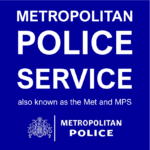 Also referred to as MPS or the Met, our content on the Metropolitan Police Service has been broken down for easier navigation:
Also referred to as MPS or the Met, our content on the Metropolitan Police Service has been broken down for easier navigation:
About policing
Metropolitan Police Service
LGBT+ Community Liaison Officers LGBT+ Independent Advisory Group
Independent of MPS, a voluntary group of LGBT+ people advising on and monitoring MPS issues affecting LGBT+ people who live in, work in, study in or are visiting London. Your rights on arrest
Police warnings, cautions and fines
Met Walk-In Police Stations
Met Police Custody Suites Big Brother Watch
ACCOUNT (Hackney)
StreetSafe
Police stations: Are they a thing of the past?
Facial recognition
Recent damning reports about MPS
There have been several recent damning reports about the MPS including:
The Casey Review and ReportHMICFRS MPS Report 2023
Operation Hotton
Louise Casey criticises Met chief’s response to damning report | The Guardian | 22 Mar 2023 | 3m 39s
Inquests into the deaths of Anthony Walgate, Gabriel Kovari, Daniel Whitworth and Jack Taylor
The Inquests into the deaths of Anthony Walgate, Gabriel Kovari, Daniel Whitworth and Jack Taylor raised serious concerns about the handling of the MPS investigations – which many say was catastrophic. In a statement following the conclusion of the East London Inquests, the MPS said, “Today, after hearing seven weeks of detailed evidence, an inquest jury has determined that Anthony Walgate, Gabriel Kovari, Daniel Whitworth and Jack Taylor were unlawfully killed. They have also found that the deaths of three of those young men – Gabriel, Daniel and Jack – could probably have been prevented had the initial police responses and investigations been better. It is a devastating finding. … And we’re also deeply sorry that there were failings in the police response to the murders.”
Update | November 2023
Eight Met officers facing gross misconduct investigations over Stephen Port case | Independent Office for Police Conduct (IOPC) | 16 Nov 2023“We are investigating the conduct of five current and three former Metropolitan Police Service (MPS) officers following our re-investigation into how the murders of Anthony Walgate, Gabriel Kovari, Daniel Whitworth and Jack Taylor were originally handled.
All eight have recently been told they are being investigated for gross misconduct for possible breaches of police professional standards relating variously to equality and diversity, duties and responsibilities, authority respect and courtesy and honesty and integrity.
Five of the officers were subjects in the investigation by our predecessor the Independent Police Complaints Commission (IPCC) – three are still serving and two are former officers.”
Stephen Port: Met Police officers investigated over serial killer | BBC News | 16 Nov 2023
Met officers being investigated over failings in serial killer Stephen Port case | The Guardian | 16 Nov 2023
The MPS response is a two-year plan: New Met for London 2023-25
Met launches new Policing Plan for London | MPS 17 Jul 2023A New Met for London 2023-25 | MPS | Plan summary, 2 pages
A New Met for London 2023-25 | MPS | Plan, 81 pages
Semantics, perhaps, but an earlier version was titled the Turnaround Plan 2023-25 would be more accurate in that we are NOT getting a NEW Met, but rather an organisation that aims to transform itself and deliver far-reaching changes in 24 months.
MPS and the LGBT+ Community
Searching the New Met for London plan for references citing the LGBT+ community:
- We’ve heard the voices of those who’ve been let down by the Met. Unreservedly, we apologise. Whether you’re a woman or a member of London’s LGBT+ community, whether you’re disabled or you’re from a Black or ethnic minority background – we’ve heard the concerns you’ve raised. We’re sorry, and we will change. Forward (Commissioner Mark Rowley), pg 2
- “We’re going to do more to support communities and people who’ve had their trust damaged. We’ll put more people and focus into the teams protecting women and children from violence; we’ll go after predatory men who commit those crimes; we’ll do more for Black, ethnic minority and LGBT+ communities and for disabled Londoners. We’ll develop a new strategy that makes a meaningful difference to how we police and keep children and young people safe.” 1. Community crime-fighting (Working with Londoners to keep them safe), pg 6
- “Baroness Casey of Blackstock was commissioned to undertake an independent review into the Met’s culture and standards. We accept her findings and we’re responding to them. We’ve let down the people we’re supposed to protect – Black, ethnic minority and LGBT+ communities, disabled Londoners, and women – and we haven’t fixed the cultural issues
that have led to that.” 2. Culture change, pg 7 - “Across More Trust, we’ll track levels of improvement within Black, ethnic minority and LGBT+ communities, and among women, where we know confidence has historically been low and damaged over the last decade.” Our Mission (More Trust), pg 12
- “We’ll also improve our ability to identify and reduce levels of disparity in outcomes achieved for Black, ethnic minority and LGBT+ communities, and for women in London.” Our Mission (Less Crime), pg 14
- “We’ve already introduced LGBT+ Community Liaison Officers to ensure every LGBT+ person living or working in the capital is confident to report crime, seek our help or tell us their concerns.” 1. Community crime-fighting: Working with Londoners to keep them safe, pg 21
- “We’ll make sure communities can co-design approaches to combatting discrimination in their areas. We’ll commission research into overall crime disparity to improve our understanding of the issues facing women and girls, Black, LGBT+ and disabled Londoners, and other ethnic minority communities – using it to design interventions that are properly data-driven.” 2. Culture change: Embedding the values of policing by consent (Spending more time listening to Londoners and acting on what they’ve told us). pg 43
Some long-standing issues facing the Met
- “Following the phone-hacking scandal of 2011, one of the problems highlighted by the Leveson Inquiry into the ethics of the relationship between the police and the media was the secretiveness and defensiveness of the Met, especially when facing criticism. Eleven years on from the Leveson Inquiry, it would seem very little has changed.”
Sorry shouldn’t be the hardest word if the Met is to regain trust | LSE | 19 May 2023 - “The Met’s problems do not begin and end at the top. Misogyny, discrimination, bullying and sexual harassment have been uncovered throughout the ranks of the Met in a damning report from the Independent Office for Police Conduct (IOPC). This inquiry found evidence of messages between officers that were sexualised, violent and discriminatory, defended as “banter”. These included messages between officers about attending a festival dressed as known sex offenders, homophobic comments and numerous jokes about rape.”
Cressida Dick was right to go. But the Met’s problems do not begin and end at the top | 11 Feb 2022 - “The Met has become unanchored from the Peelian principle of policing by consent set out when it was established.” The report found a bullying culture, frontline officers demoralised and feeling let down by their leaders, and discrimination “baked into the system”
Met police found to be institutionally racist, misogynistic and homophobic | The Guardian | 21 Mar 2023 - “Just over half of Londoners perceive the Met as a reliable institution, trust in the police has eroded nationwide. Almost half of the population state they no longer trust police officers. Trust, once lost, can be hard to restore. The Casey report states that not all forces are fully cognisant of the risks these issues pose to their reputation.”
Casey review: how different is the Met police from the UK’s other forces? | The Conversation | 23 Mar 2023
Contacting the police
Call 999 if:
- a serious offence is in progress or has just been committed
- someone is in immediate danger or harm
- property is in danger of being damaged
- a serious disruption to the public is likely
If you’re deaf or hard of hearing, use the textphone service 18000 or text 999 if you’ve pre-registered with the emergency SMS service.
Metropolitan Police Service | Greater LondonLGBT+ Community Liaison Officers | Greater London
Non-emergency
Call 101 for non-emergency enquiries. If you’re deaf or hard of hearing, use our textphone service on 18001 101
Policing in the United Kingdom
Policing is subdivided by region, and each force deals with crime and policing in its own way, subject to national requirements. There are 43 police forces in England and Wales, along with the British Transport Police and the separate police forces of Scotland and Northern Ireland.
UK Police and Crime Commissioners | POLICE.UKThe criminal justice process
- What happens after a crime is reported?
- How do the police deal with minor crimes?
- What happens when someone is charged with a crime?
- What happens in the court?
- How are offenders sentenced?
- What are the different types of court sentence?
Flowchart of the criminal justice process | Department of Justice Back to top
About policing
Principles and values
The Metropolitan Police Service (MPS) states its principles are communities-first, frontline-focused, inclusive, collaborative, and precise, while its values are integrity, courage, accountability, respect, and empathy.
Typically, a police force represents the civil authority of a government responsible for the following:
- Maintaining public order and safety, including the protection of life and property
- Enforcing the law, including the preservation of the peace
- Preventing, detecting, and investigating criminal activities
MPS doesn’t say anything along these lines on its website though Peelian principles (on which MPS was founded) are referenced on page 67 of A New Met for London 2023-25. We raise this because being stopped, searched, questioned, arrested and /or charged by MPS is what a police force does while its principles and values go to how it would like to be seen and regarded when doing its job. They go hand in hand and knowing both these things goes to the level of confidence and trust we have in the police.
And, just in case there is any confusion: should an officer see you cottaging, or see drugs at a chemsex party responding to a 999 call, it’s their job to uphold the law, not ignore evidence they may see or hear regardless of whether MPS presents itself as community-orientated, inclusive, respectful and empathetic, or marches at Pride.
Policing by consent
The core functions listed above are the bedrock of “policing by consent”. In the British model of policing, officers use their powers to police with the implicit consent or permission of the public (that’s you), often referred to as “Policing by consent.” This approach was set out by Sir Robert Peel in 1829 when he established the Metropolitan Police, the first official police force in England. Peel understood from the get-go that, in terms of numbers alone, any police force would always be inferior, so could not hope to enforce the law effectively without the consent of the public. For example, if the public were to become aggressive or violent – preventing the police the opportunity to do their duty – it would be impossible for them to do so. Peel believed it was essential for a police force to operate and behave ethically, retaining the trust of the public at all times.
More
Peelian principles | WikipediaDefinition of policing by consent | Home Office | FOI release | 10 Dec 2012
Law enforcement in the United Kingdom | Wikipedia Community Engagement Handbook 2022 | MPS
Law enforcement in the United Kingdom | Wikipedia
Police UK (England and Northern Ireland)
Scotland UK
Republic of Ireland
UK police forces and crime commissioners
List of police forces of the United Kingdom | WikipediaUK Police and Crime Commissioners | Police UK Back to top
Metropolitan Police Service
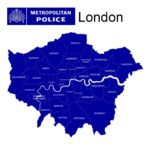 The Metropolitan Police Service (MPS) is commonly known as the Met and is responsible for law enforcement in 32 London boroughs.
The Metropolitan Police Service (MPS) is commonly known as the Met and is responsible for law enforcement in 32 London boroughs.
However, the City of London – also known as the ‘square mile’ – is policed by the City of London Police.
City of London Police | City of London PoliceCity of London Police | Wikipedia
The Met also national responsibilities including such as counter-terrorism, protecting the Royal Family, and members of Government. The Met also has some unique responsibilities such as protecting foreign embassies policing Heathrow Airport, and policing and protecting the Palace of Westminster and handling protests and events.
Metropolitan Police Service | Metropolitan Police ServiceMetropolitan Police Service | Wikipedia
In an attempt to save money, the area MPS covers (or Metropolitan Police District) was divided into 12 Basic Command Units (BCUs). Each BCU is comprised of two, three, or even four boroughs. There has been widespread criticism of this radical shakeup.
Basic Command Units
- Central West BCU: Hammersmith and Fulham, Kensington and Chelsea and Westminster
- South West BCU: Kingston, Merton, Richmond and Wandsworth
- South BCU: Bromley, Croydon and Sutton
- South East: Bexley, Greenwich and Lewisham
- East BCU: Barking and Dagenham, Havering and Redbridge
- West BCU: Ealing, Hillingdon and Hounslow
- Central South: Lambeth and Southwark
- North BCU: Enfield and Haringey
- Central East BCU: Hackney and Tower Hamlets
- Central North BCU: Camden and Islington
- North West BCU: Barnet, Brent and Harrow
- North East BCU: Newham and Waltham Forest
News articles
Gang attacked gay couple in broad daylight as onlookers did nothing | LGBTQ Nation | 6 Oct 2023
Met Police officer sacked over homophobic comments and ‘psychological harm’ of female colleagues | Pink News | 7 Sep 2023
The head of London’s Metropolitan Police apologised to the city’s LGBT+ community for the failings of the past | Openly | 8 Jun 2023
Every theft must be investigated, home secretary tells police | BBC News | 28 Aug 2023
Clarity needed on decision to keep Uxbridge Police Station open | London Assembly | 6 Jul 2023
Met officers charged over alleged messages in Wayne Couzens WhatsApp group | The Guardian | 17 Feb 2022
Met Police: Some officers are racist, professional standards chief admits | BBC | 15 Feb 2022
Met commander who wrote drugs strategy faces sack for taking drugs | The Guardian | 14 Feb 2022
Met Police chief says ‘nasty’ homophobia, racism and misogyny ‘risks force losing public consent’ | Pink News | 7 Feb 2022
New police CCTV use rules criticised as bare bones | BBC News | 17 Aug 2021
Dalian Atkinson: manslaughter conviction for PC but ‘justice’ for police violence remains elusive | The Conversation | 29 Jun 2021
Power of protest: The policing bill has been delayed | Huck 19 Mar 2021
‘Toxic culture of sexism’ in police, says former police chief | BBC News | 17 Mar 2021
Stop and search: Six Met PCs disciplined after almost 5,000 complaints | BBC News | 1 Feb 2021
Why do the police exist? | Novara Media | 20 Jun 2020
Police taking ‘excessive’ data from mobile phones | BBC News | 18 Jun 2020
Met Police to deploy facial recognition cameras | BBC | 30 Jan 2020
Facial recognition: EU considers ban of up to five years | BBC News | 17 Jan 2020
Live facial recognition surveillance ‘must stop’ | BBC News | 18 Sep 2019
Met Police gave images for King’s Cross facial recognition scans | BBC News | 6 Sep 2019 COVID-19: Police officers fined for breaking lockdown rules by having hair cuts | Sky News | 26 Jan 2021 | 2m 5s Back to top
Your rights on arrest
Rather than re-invent the wheel, the text is based on the outstanding “Bust Card: Your Rights on Arrest” by Release—in continuous publication since the early 1970s. Text used with their kind permission.
“Bust Card: Your Rights on Arrest” is also an A6 pocket-sized booklet. If you would like a free copy email us here. If you are reading this, ask yourself if you need legal help or a solicitor now?You have the right to be treated fairly and with respect by the police
You do not have to say anything to the police BUT if you are later charged with a crime and you have not mentioned, when questioned, something that you later rely on in court, then this may be taken into account when deciding if you are guilty. There may be good reason why you do not wish to say anything to the Police, and you should not be intimidated into answering questions. Get a solicitor down to see you in the police station as soon as possible.
Remember- There may be times when, if you give an innocent explanation for what you have done, the police may leave you alone.
- It is wise NOT to discuss the case with the police until you have consulted privately with a solicitor.
- If the police are about to arrest you or have already arrested you, there is no such thing as a ‘friendly chat’ to sort things out. Anything you say can later be used against you. Think before you talk.
When the police get it wrong
If you want to challenge anything the police have done, then get the names and addresses of any witnesses and the name or number of the police officer/s, and make a written record as soon as possible after the incident. This should be witnessed, dated and signed. If you are injured, or property is damaged, then take photographs or video recordings as soon as possible and have physical injuries medically examined. If you have been treated unfairly, then complain to the Independent Office for Police Conduct (IOPC) and contact a civil liberties group like Release or a Citizen’s Advice Bureau or a solicitor about any possible legal action.
On the street
If you are stopped by the police:
- If they are not in uniform, then ask to see their warrant card
- Ask the police if you are being detained
- Ask why you have been stopped and, at the end, ask for a record of the search
You can be stopped and searched if the police have a reasonable suspicion that you are in possession of:
- controlled drugs
- an offensive weapon or firearm
- a sharp article
- stolen goods
- or if you are in a coach or train, on your way to, or you have arrived at, a sports stadium
There are other situations where you can be stopped and searched, for example: If police fear that there might be serious violence in a particular area, they can stop and search anyone in that area for up to 48 hours (this can be extended in some circumstances). In these circumstances, the police do not need to have reasonable suspicion that you are carrying a weapon or committing a crime.
RememberIf you have been stopped and searched the police should provide you with a record of the event. There is no requirement to provide a record for a stop and account (that is, where no search has taken place). You run the risk of both physical injury and serious criminal charges if you physically resist a search. However, if the initial grounds for the search are unlawful and you are then charged with resisting arrest this may be legally challenged. If it is an unlawful search, you should take action afterwards by using the law.
In the police station
You always have the right to:
- be treated humanely and with respect
- see the written Codes governing your rights and how you are to be treated
- speak to the custody officer (the officer who MUST look after your welfare)
- know why you have been arrested
- have present with you a responsible adult if you are 17 years old or below, or are vulnerable
You also have the right (but they can in rare situations be delayed) to:
- have someone notified of your arrest (not to make a phone call yourself)
- consult with a solicitor privately
- request for a medical examiner to attend to you if you feel unwell
Inform the custody officer at the earliest opportunity if you are on prescribed medication. You may in certain circumstances be permitted to ingest or negotiate for the collection and administration of your medication.
If not, notify your solicitor and refer him to PACE 1984 Code C Part 9.
- Do not panic. The police sometimes keep you isolated and waiting in the cell. Above all else, try to keep calm. The police can only keep you for a certain period of time – normally a maximum of 24 hours (this can be extended to 36 hours by a superintendent if certain grounds are satisfied, or 48 hours for a terrorist offence). Further extensions of custody can be obtained in exceptional circumstance
- Make sure the correct time for your arrest is on your custody record
- Make sure you know why you have been arrested
- Insist on seeing a solicitor even though you might have to wait
- Always request that a solicitor be present when you are interviewed. Do not be put off seeing a solicitor by the police. It is YOUR RIGHT, and it is FREE.
- If you ask for anything and it is refused, make sure this is recorded in your custody record.
Search of your home
- The police can search premises with the consent of the occupier
- A warrant can be obtained from magistrates by the police to search premises for evidence of certain crimes
- The police can only search the section of the premises that you occupy and communal areas of the premises
- Police may enter WITHOUT a search warrant in many situations, including:
- following an arrest, the police are allowed to search premises the detained person occupies or has control over
- to capture an escaped prisoner
- to arrest a person
- to protect life or to stop serious damage to property
- other laws give police specific powers to enter premises
- You are entitled to see a copy of any search warrant
- Police can use reasonable force to gain entry
- Police should give you information about their powers to search premises
- A record of the search must be kept by the Police
- You or a friend should be allowed to be present during the search but this right can be refused if it is thought it might hinder investigations
More
ReleaseLGBT Advisory Group
Independent Office for Police Conduct (IOPC)
Citizen’s Advice Bureau Met police guidance: Ambulance call-outs and the police | Met Police | Jul 2018 Legal Aide (App) | Release
The new Legal Aide app from Release aims to help people navigate the criminal justice system. The app has been launched to help people who have been arrested for the personal possession of controlled drugs. Y-Stop (App) | Release
Y-Stop aims to give you the tools to interact with the police safely, equipping you with all the skills and knowledge you need to handle a stop and search. Back to top
Police warnings, cautions and fines
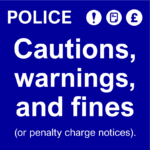 Under the heading, “How do the police deal with minor crimes?” POLICE.UK says:
Under the heading, “How do the police deal with minor crimes?” POLICE.UK says:
“The police can decide to deal with a minor crime by giving:
-
- a caution or warning
- a police fine, called a penalty notice
- a community resolution
The victim sometimes agrees to accept an apology if it’s a minor incident.”
Though true, this is an over-simplification as these actions are recorded locally and/ or on the Police National Computer (PNC) and may have serious implications for you further down the line.For example:
- You have to admit an offence and agree to be cautioned
- You can be arrested and charged if you don’t agree
- While a caution is not a criminal conviction, it could be used as evidence of ‘bad character’ if you go to court for another crime
- Cautions can show on standard and enhanced Disclosure and Barring Service (DBS) checks
If a person decides not to accept the caution the police officer must
- Ensure that they understand that they do not need to make an immediate decision (they could go away and think about it)
- Ensure that they have had the opportunity of receiving free and independent legal advice
- Confirm they consent to receiving the caution in which case they must sign a form confirming so, a copy of which they can take away with them
Your criminal record | Nacro
Police caution | Wikipedia Everything you need to know about police cautions | Bindmans
Police cautions, warnings and penalty notices | GOV.UK
How long does a police caution stay on your record? | policecautions.uk Back to top
Walk-In Police Stations (London)
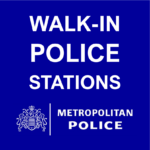 The list is long, so click the link below to view details of 32+ walk-in police stations listed by London Borough, including:
The list is long, so click the link below to view details of 32+ walk-in police stations listed by London Borough, including:
- address
- map link
- nearest underground/ station(s)
- in which Basic Command Unit (BCU) the station is located
Walk-In Police Stations
BARKING AND DAGENHAM
Dagenham Police Station
561 Rainham Road South RM10 7TU | Map
Nearest station: Dagenham East (District, and Hammersmith and City lines)
Front counter open: Yes | 24hrs
Basic Command Unit (BCU): East (EA)
Met Police @ Barking Learning Centre
Not 24hrs
Barking Library, 2 Town Square IG11 7NB | Map
Nearest station: Barking (Overground and Trenitalia c2c lines)
Counter: Yes | Mon-Wed: 10:00–18:00, Thu-Sat: 10:00–24:00, Sun: Closed
Basic Command Unit (BCU): East (EA)
BARNET
Colindale Police Station
Grahame Park Way, London NW9 5TW | Map
Nearest station: Colindale (Northern Line)
Front counter open: Yes | 24hrs
Basic Command Unit (BCU): North West BCU (NW)
BEXLEY
Bexleyheath Police Station
2 Arnsberg Way, Bexleyheath DA7 4QS | Map
Nearest station: Bexley Health and Barnehurst (South Eastern line)
Front counter open: Yes | 24hrs
Basic Command Unit (BCU): South East (SE)
BRENT
Wembley Police Station
603 Harrow Road, Wembley HA0 2HH | Map
Nearest station: Wembley Central (Overground, Southern and West Midland lines)
Front counter open: Yes | 24hrs
Basic Command Unit (BCU): North West (NW)
BROMLEY
Bromley Police Station
High Street, Bromley BR1 1ER | Map
Nearest station: Bromley South (Thameslink and South Eastern lines)
Front counter open: Yes | 24hrs
Basic Command Unit (BCU): South (SN)
CAMDEN
Kentish Town Police Station
10-12A Holmes Road, Kentish Town, London NW5 3AE | Map
Nearest station: Kentish Town (Northern and Thameslink lines)
Front counter open: Yes | 24hrs
Basic Command Unit (BCU): Central North (CN)
CROYDON
Croydon Police Station
71 Park Lane, Croydon, Surrey CR9 1BP | Map
Nearest station: East Croydon (Thameslink, Southern and Great Northern lines)
Front counter open: Yes | 24hrs
Basic Command Unit (BCU): South (SN)
EALING
Acton Police Station
250 High Street, Acton, London W3 9BH | Map
Nearest stations: Acton Central (Overground); Acton Town (Circle, District and Piccadilly lines); and Ealing Common (Circle, District and Piccadilly lines)
Front counter open: Yes | 24hrs
Basic Command Unit (BCU): West (WA)
ENFIELD
Edmonton Police Station
462 Fore Street, London N9 0PW | Map
Nearest stations: Edmonton Green Station (Overground, and Greater Anglia lines)
Front counter open: Yes | 24hrs
Basic Command Unit (BCU): North BCU (NA)
GREENWICH
Plumstead Police Station
200 Plumstead High Street, London SE18 1JY | Map
Nearest station: Plumstead Station (Thameslink and South Eastern lines)
Front counter open: Yes | 24hrs
Basic Command Unit (BCU): South (SE)
HACKNEY
Stoke Newington Police Station
33 Stoke Newington High Street, Stoke Newington, London N16 8DS | Map
Nearest station: Rectory Road (Overground)
Front counter open: Yes | 24hrs
Basic Command Unit (BCU): Central East (CE)
HAMMERSMITH AND FULHAM
Hammersmith Police Station
226 Shepherds Bush Road W6 7NX | Map
Nearest station Hammersmith (District, Piccadilly, and Hammersmith and City lines)
Front counter open: Yes | 24hrs
Basic Command Unit (BCU): Central West (AW)
HARINGEY
Tottenham Police Station
398 High Road, Tottenham, London N17 9JA | Map
Nearest station: Bruce Grove (Overground)
Front counter open: Yes | 24hrs
Basic Command Unit (BCU): North (NA)
HARROW
South Harrow Police Station
74 Northolt Road, Harrow, Middlesex, HA2 0DN | Map
Nearest station: South Harrow (Piccadilly line)
Front counter open: Yes | 24hrs
Basic Command Unit (BCU): North West (NW)
Pinner Police Station
Not 24hrs | Cannot verify service (29/5/20)
1 Waxwell Ln, Pinner HA5 3LA | Map
Nearest station: Pinner (Metropolitan line)
Front counter open: Yes | Mon-Fri: 1000–1530, Sat-Sun: Closed
Basic Command Unit (BCU): North West (NW)
HAVERING
Romford Police Station
19 Main Road, Romford RM1 3BJ | Map
Nearest station: Romford (Overground, TfL Rail, and Great Anglia lines)
Front counter open: Yes | 24hrs
Basic Command Unit (BCU): East (EA)
HILLINGDON
Hayes Police Station
755 Uxbridge Road, Hayes End, Hayes UB4 8HU | Map
Nearest stations: Uxbridge (Metropolitan and Piccadilly lines) and Hayes and Harlington (Great Western and TfL lines)
Front counter open: Yes | 24hrs
Basic Command Unit (BCU): West (WA)
Ruislip Police Station
The Oaks, Ruislip, Middlesex HA4 7LE | Map
Nearest station: Ruislip (Metropolitan and Piccadilly lines)
Front counter open: Yes | 24hrs
Basic Command Unit (BCU): West (WA)
HOUNSLOW
Hounslow Police Station
5 Montague Road, Hounslow, TW3 1LB | Map
Nearest station: Hounslow Central (Piccadilly line)
Front counter open: Yes | 24hrs
Basic Command Unit (BCU): West (WA)
ISLINGTON
Islington Police Station
2 Tolpuddle Street, The Angel, London N1 0YY | Map
Nearest station: Angel (Northern line)
Front counter open: Yes | 24hrs
Basic Command Unit (BCU): Central North (CN)
KENSINGTON AND CHELSEA
Notting Hill Police Station
99 – 101 Ladbroke Road, Notting Hill, London W11 3PL | Map
Nearest station: High Street Kensington (Circle and District lines)
Front counter open: Yes | 24hrs
Basic Command Unit (BCU): Central West (AW)
Kensington Police Station
72-74 Earl’s Court Road, Kensington, London W8 6EQ | Map
Nearest stations: Notting Hill Gate (Central, Circle and District lines) and Holland Park (Central line)
Front counter open: Yes | 24hrs
Basic Command Unit (BCU): Central West (AW)
KINGSTON
Kingston Police Station
5-7 High Street, Kingston upon Thames KT1 1LB | Map
Nearest station: KIngston (South Western line)
Front counter open: Yes | 24hrs
Basic Command Unit (BCU): South West (SW)
LAMBETH
Brixton Police Station
367 Brixton Road, Brixton, London SW9 7DD | Map
Nearest station: Brixton (Victoria line)
Front counter open: Yes | 24hrs
Basic Command Unit (BCU): Central South (AS)
LEWISHAM
Lewisham Police Station
43 Lewisham High Street, Lewisham, London SE13 5JZ | Map
Nearest station: Lewisham (South Eastern line)
Front counter open: Yes | 24hrs
Basic Command Unit (BCU): South East (SE)
MERTON
Wimbledon Police Station
15-23 Queen’s Road, Wimbledon, London SW19 8NN | Map
Nearest stations: Wimbledon (District, South Western, Southern and Thameslink lines) and Wimbledon (Tram)
Front counter open: Yes | 24hrs
Basic Command Unit (BCU): South West (SW)
Mitcham Police Station
Not 24hrs | Cannot verify service (29/5/20)
58 Cricket Green, Mitcham CR4 4LA | Map
Nearest stations: Mitcham (Tram) and Mitcham Junction (Southern and Thameslink lines)
Front counter open: Yes | Mon-Fri: 0900-1700, Sat-Sun: Closed
Basic Command Unit (BCU): South West (SW)
NEWHAM
Forest Gate Police Station
350-360 Romford Road, Forest Gate, London E7 8BS | Map
Nearest stations: Forest Gate (TfL Rail) and Wood Grange Park (Overground)
Front counter open: Yes | 24hrs
Basic Command Unit (BCU): North East (NE)
REDBRIDGE
llford Police Station
270-294 High Road, London IG1 1GT | Map
Nearest station: Ilford (TfL Rail)
Front counter open: Yes | 24hrs
Basic Command Unit (BCU): East (EA)
RICHMOND
Twickenham Police Station
41 London Road, Twickenham TW1 3SY | Map
Nearest station: Twickenham (South Western line)
Front counter open: Yes | 24hrs
Basic Command Unit (BCU): South West (SW)
SOUTHWARK
Walworth Police Station
12-28 Manor Place, Walworth, London SE17 3BB | Map
Nearest stations: Elephant and Castle (Northern, Bakerloo, Thamelink and South Eastern lines) and Kennington (Northern line)
Front counter open: Yes | 24hrs
Basic Command Unit (BCU): Central South (AS)
SUTTON
Sutton Police Station
6 Carshalton Road, Sutton, Surrey SM1 4RF | Map
Nearest station: Sutton (Thameslink and Southern lines)
Front counter open: Yes | 24hrs
Basic Command Unit (BCU): South (SN)
TOWER HAMLETS
Bethnal Green Police Station
12 Victoria Park Square, Bethnal Green, London E2 9NZ | Map
Nearest station: Bethnal Green (Central line)
Front counter open: Yes | 24hrs
Basic Command Unit (BCU): Central East (CE)
WALTHAM FOREST
Chingford Police Station
Kings Head Hill, Chingford, London E4 7EA | Map
Nearest station: Chingford (Overground)
Front counter open: Yes | 24hrs
Basic Command Unit (BCU): North East (NE)
WANDSWORTH
Lavender Hill Police Station
176 Lavender Hill, Battersea, London SW11 1JX | Map
Nearest station: Clapham Junction (Overground, South Western lines)
Front counter open: Yes | 24hrs
Basic Command Unit (BCU): South West (SW)
WESTMINSTER
Charing Cross Police Station
Agar Street, Charing Cross, London WC2N 4JP | Map
Nearest stations: Charing Cross (Bakerloo and Northern lines), Leicester Square (Northern and Piccadilly lines) and London Charing Cross (South Eastern line)
Front counter open: Yes | 24hrs
Basic Command Unit (BCU): Central West (AW)
Police Custody Suites (London)
 We have compiled this section cross-referencing freedom of information (FOI) requests 01.FOI.19.011453 (2019) and 01.FOI.20.015425 (2020) which are no longer available (Dec 2022).
We have compiled this section cross-referencing freedom of information (FOI) requests 01.FOI.19.011453 (2019) and 01.FOI.20.015425 (2020) which are no longer available (Dec 2022).
The list is long, so click the link below to view details of custody suites listed by London Borough, including:
- address
- map link
- in which Basic Command Unit (BCU) the suite is located
Custody suites
Open 24/7
Acton
250 High Street, London W3 9BH | Map
BCU: WA | Open: 24/7
Dagenham and Barking
4 Muirhead Quay, Freshwharf Road, Barking, Essex IG11 7BG | Map
BCU: EA | Open: 24/7
Bethnal Green
12 Victoria Park Square, London E2 9NZ | Map
BCU: CE | Open 24/7
Bexley
Marlowe House, 109 Station Road, Sidcup DA15 7ES | Map
BCU: SE | Open 24/7
Brixton
367 Brixton Road, London SW9 7DD | Map
BCU: AW | Open: 24/7
Bromley
High Street, Bromley, Kent BR1 1ER | Map
BCU: SN | Open: 24/7
Charing Cross
Agar Street, London WC2N 4JP | Map
BCU: AW | Open: 24/7
Colindale
Grahame Park Way, Hendon, London NW9 5TW | Map
BCU: NW | Open: 24/7
Croydon
90 Windmill Road, Croydon CR0 2XR | Map
BCU: SN | Open: 24/7
Forest Gate
350 Romford Road, London E7 8BS | Map
BCU: NE | Open: 24/7
Hammersmith
226 Shepherds Bush Road, Hammersmith, London W6 7NX | Map
BCU: AW | Open: 24/7
Heathrow
Unit 3, Polar Park, Bath Road, Hillingdon UB7 0DG | Map
BCU: WA | Open: 24/7
Holborn
10 Lambs Conduit Street, Holborn, London WC1N 3NR | Map
BCU: CN | Open: 24/7
Islington
2 Tolpuddle Street, London, N1 0YY | Map
BCU: CN | Open: 24/7
Kingston
5-7 High Street, Kingston, Surrey, KT1 1LB | Map
BCU: SW | Open: 24/7
We believe this suite is open but was not included in an October 2020 FOI request, reference 01.FOI.20.015425.
Lewisham
43 Lewisham High Street, London, SE13 5JZ | Map
BCU: SE | Open: 24/7
Leyton
Boreham Close, Leyton, London, E10 6RN | Map
BCU: NE | Open: 24/7
Romford
19 Main Road, Romford, Essex, RM1 3BJ | Map
BCU: EA | Open: 24/7
Stoke Newington
33 Stoke Newington High Street, London, N16 8DS | Map
BCU: CE | Open: 24/7
We believe this suite is open but was not included in an October 2020 FOI request, reference 01.FOI.20.015425.
Walworth
12-28 Manor Place, London, SE17 3BB | Map
BCU: AS |Open: 24/7
Wandsworth
146 Wandsworth High Street, London, SW18 4JJ | Map
BCU: AW | Open: 24/7
Wembley
603 Harrow Road, Wembley, Middlesex, HA0 2HH | Map
BCU: NW | Open: 24/7
We believe this suite is open but was not included in an October 2020 FOI request, reference 01.FOI.20.015425.
Wood Green
347 High Road, Wood Green, London, N22 4HZ | Map
BCU: NA | Open: 24/7
Contingency (open as required)
Belgravia
202/6 Buckingham Palace Road, London SW1W 9SX | Map
BCU: AW
Edmonton
462 Fore Street, London N9 0PW | Map
BCU: NA
Harrow
74 Northolt Road, South Harrow, Middlesex HA2 0DN | Map
BCU: NW
Hounslow
5 Montague Road, Hounslow, Middlesex TW3 1LB | Map
BCU: AW | Open: 24/7
Ilford
270-294 High Road, Ilford, Essex, IG1 1GT | Map
BCU: EA | Open: 24/7
Peckham
177 Peckham High Street, London SE15 5SL | Map
BCU: AS
West End Central
27 Saville Row, London W1X 2DU | Map
BCU: AW
Existing in 2019, this suite is closed according to an October 2020 FOI request, reference 01.FOI.20.015425.
Plumstead
200 Plumstead High Street, London SE18 1JY | Map
BCU: SE
Sutton
6 Carshalton Road West, Sutton, Surrey SM1 4RF | Map
BCU: SW
LGBT+ Community Liaison Officers
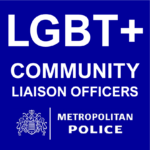 After several years of catastrophic mishandling, it’s welcome news MPS is restoring LGBT+ liaison officers as full-time paid positions. This is due, in no small part, to the efforts of the LGBT+ Independent Advisory Group. Now titled LGBT+ Community Liaison Officer, their role is to:
After several years of catastrophic mishandling, it’s welcome news MPS is restoring LGBT+ liaison officers as full-time paid positions. This is due, in no small part, to the efforts of the LGBT+ Independent Advisory Group. Now titled LGBT+ Community Liaison Officer, their role is to:
- Provide a consistent point of contact for LGBT+ people and organisations
- Improve engagement between police and members of the LGBT+ community
- Support LGBT+ victims of crime
- Provide advice and support to investigations
- Provide crime prevention advice especially to prevent homophobia, transphobia, biphobia and other forms of hate crime and intersectionality
- Support LGBT+ community events
- Support incidents impacting LGBT+ communities
- Raise awareness and understanding of LGBT+ community issues within the Met (MPS)
MPS says they are “…by a network of volunteer liaison officers who are police officers or members of police staff who perform the liaison role in addition to other duties. Many are passionate about supporting LGBT+ communities, have strong existing local connections and an understanding of historic community issues in their local area.”
LGBT+ community liaison officers | MPSContact your LGBT+ Community Liaison Officer (LGBT+ CLO)
If you want to search for your LGBT+ CLO by Basic Command Unit, click here. Otherwise, below is a list of LGBT+ CLO email addresses by London Borough alphabetically. Ideally, there would also be names and phone numbers, but the MPS is a sprawling organisation, and officers move on. However, we have email, which is more than LGBT+ Londoners had a few months ago!
Barking and Dagenham | Email East Area BCUBarnet | Email North West BCU
Bexley | Email South East BCU
Brent | Email North West BCU
Bromley | Email South Area BCU
Camden | Email Central North BCU
Croydon | Email South Area BCU
Ealing | Email West Area BCU
Enfield | Email North Area BCU
Greenwich | Email South East BCU
Hackney | Email Central East BCU
Hammersmith and Fulham | Email Central West BCU
Haringey | Email North Area BCU
Harrow | Email North West BCU
Havering | Email East Area BCU
Hillingdon | Email West Area BCU
Hounslow | Email West Area BCU
Islington | Email Central North BCU
Kensington and Chelsea | Email Central West BCU
Kingston | Email South West BCU
Lambeth | Email Central South BCU
Lewisham | Email South East BCU
Merton | Email South West BCU
Newham | Email North East BCU
Redbridge | Email East Area BCU
Richmond | Email South West BCU
Southwark | Email Central South BCU
Sutton | Email South Area BCU
Tower Hamlets | Email Central East BCU
Waltham Forest | Email North East BCU
Wandsworth | Email South West BCU
Westminster | Email Central West BCU
Historical content before 2023
The Met goes on to say they complement the work of Hate Crime Outcome and Performance Officers, whilst elsewhere they help increase awareness and provide advice and information. Under the auspices of the Met’s staff support association LGBT+ Network, the role is voluntary and must be carried out in addition to a person’s current position. It is open for all officers and staff, including Specials and volunteers. It is not necessary that an individual identifies as LGBT+ and they are not required to declare their sexuality or gender, including gender identity and expression. We continue to seek to build on the commitment and expertise amongst our existing cohort of colleagues across BCUs and Commands, along with harnessing offers from new volunteers, who may consider themselves Subject Matter Experts (SMEs) and therefore capable of being an LGBT+ Adviser.
Short film about MPS LGBT+ Advisors | MPS LGBT+ Network | 29 Dec 2021 | 2m 1s
How many Advisers are they and where are they located?
It’s been a struggle to tally the number of Advisers and where they’re located (until a recent FOI) mostly because there has been so little information about them,
- 19 November 2020 – 16 March 2021
A question to the Mayor of London answered 16 March 2021 said the Met was “appointing 250 advisers” specialising in LGBT+ hate crime. The Mayor’s response did not dispute this figure. - 10 December 2021
Following the conclusion of the East London Inquests into the deaths of Anthony Walgate, Gabriel Kovari, Daniel Whitworth and Jack Taylor, the Met said in a statement “we have 125 volunteer LGBT+ advisers across the Met”. - January 2022
In response to a Freedom of Information request (01.FOI.21.022447) by MENRUS.CO.UK, the MPS said it has 132 LGBT+ Advisers – 80 across the 12 Basic Command Units (BCUs) with 52 located in other business areas and commands.
Using data from the FOI, the list below shows where the 80 BCU Advisers are located – assuming these are probably front line/ beat officers. We are awaiting further clarification as to where the 52 Advisers are located in “other business areas and commands”.
- Hammersmith and Fulham, Kensington and Chelsea and Westminster
Central West BCU (AW): 10 Advisers - Kingston, Merton, Richmond and Wandsworth
South West BCU (SW): 6 Advisers - Bromley, Croydon and Sutton
South Area BCU (SN): 4 Advisers
- Bexley, Greenwich and Lewisham
South East BCU (SE): 7 Advisers - Barking and Dagenham, Havering and Redbridge
East Area BCU (EA): 5 Advisers - Ealing, Hillingdon and Hounslow
West Area BCU (WA): 3 Advisers - Lambeth and Southwark
Central South BCU (AS): 12 Advisers - Enfield and Haringey
North Area BCU (NA): 6 Advisers - Hackney and Tower Hamlets
Central East BCU (CE): 11 Advisers - Camden and Islington
Central North BCU (CN): 5 Advisers - Barnet, Brent and Harrow
North West BCU (NW): 3 Advisers - Newham and Waltham Forest
North East BCU (NE): 8 Advisers
How does the LGBT+ community contact LGBT+ Advisors? The short answer is you can’t.
From time to time, some of our volunteers have tried to reach out to LGBT+ Advisers but there’s nothing on the MPS website and the response from 111 was not helpful. From what we can ascertain, an LGBT+ person cannot contact a local LGBT+ Adviser directly which is disappointing. If Advisers proactively work to prevent crime and encourage active citizenship and build trust and confidence – as the MPS wants us to believe – knowing where they are and how to contact them might be a good start?
It’s doubly frustrating because, answering a question about LGBT+ Advisers (25/01/22), Commissioner Dick said “They’re a brilliant bunch. If anybody wants to come and meet them, they’re a fantastic group of people. And they’re very active. And they are there to advise their colleagues and to support the BCU commander and any SIOs and anyone else who needs advice and support. And to reach out into communities.”
How many LGBT+ Liasion Officers/ LGBT+ Advisers are there? | Police and Crime Committee | London Assembly | 25 Jan 2022 | 4m 48s
Transcript of Q&A | PDF
Police and Crime Committee | London Assembly/ Mayor of London | 25 Jan 2022
Met LGBT+ Advisors | Question and Answer | Mayor of London | 19 Nov 2020/ 16 Mar 2021
Metropolitan Police Service: Business Plan progress report | Quarter 3 2019-20
page 6: “The role of an LGBT+ Advisers will, complement the work of Hate Crime Co-ordinators in BCU Partnership & Prevention Hubs. LGBT+ Advisers will be embedded in other commands, in order to create a broad representation; and be a source of advice and information.”
MET LGBT+ Network | @MetLGBTNetwork
Independent Office for Police Conduct (IOPC)
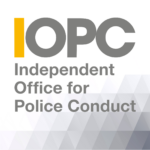 The Independent Office for Police Conduct (IOPC) is the police complaints watchdog that oversees the police complaints system in England and Wales. Formed in 2018, it was previously known as the Independent Police Complaints Commission. It investigates the most serious matters, including deaths following police contact and sets the standards by which the police should handle complaints.
The Independent Office for Police Conduct (IOPC) is the police complaints watchdog that oversees the police complaints system in England and Wales. Formed in 2018, it was previously known as the Independent Police Complaints Commission. It investigates the most serious matters, including deaths following police contact and sets the standards by which the police should handle complaints.
It says of itself: “We are independent, which means that our decisions are made entirely independently of the police and government. Our vision is for everyone to be able to have trust and confidence in policing. To achieve this, we use our learning and recommendations from our work to promote high standards of professionalism and accountability in policing. Our evidence-based approach drives improvements in policing practices, for the benefit of the public and the police.”
Independent Office for Police Conduct (IOPC) | IOPCIndependent Office for Police Conduct (IOPC) | GOV.UK
Independent Office for Police Conduct (IOPC) | Wikipedia
The College of Policing and the IOPC | HMICFRS Inquests into the deaths of Anthony Walgate, Gabriel Kovari, Daniel Whitworth and Jack Taylor | MEN R US Stakeholder meeting: Operation Avana | PDF | IOPC | Apr 2024
Re-investigation into the failings of the Metropolitan Police Service (MPS) regarding the Stephen Port murders.
IOPC to reinvestigate Met Police handling of deaths of Anthony Walgate, Gabriel Kovari, Daniel Whitworth and Jack Taylor | IOPC | 23 Jun 2022
Following the 2021 inquests into the deaths of Anthony Walgate, Gabriel Kovari, Daniel Whitworth and Jack Taylor – which revealed previously unknown evidence – we will re-investigate the way the Metropolitan Police Service (MPS) initially handled the deaths of the four men in Barking, East London. Back to top
The Casey Review and Report
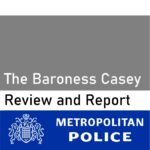 Recognising the grave levels of public concern following the kidnap, rape and murder of Sarah Everard by a serving Met officer and other deeply troubling incidents, the Metropolitan Police Service (the Met) appointed Baroness Louise Casey to lead an independent review of its culture and standards of behaviour. The review began in February 2022 and completed in March 2023, when the final report and recommendations were published.
Recognising the grave levels of public concern following the kidnap, rape and murder of Sarah Everard by a serving Met officer and other deeply troubling incidents, the Metropolitan Police Service (the Met) appointed Baroness Louise Casey to lead an independent review of its culture and standards of behaviour. The review began in February 2022 and completed in March 2023, when the final report and recommendations were published.
The Baroness Casey Review Final Report is an independent review into the standards of behaviour and internal culture of the Metropolitan Police Service.
Baroness Casey Review Final Report | March 2023
The Baroness Casey’s Report on Misconduct sets out the evidence to support Baroness Casey’s conclusions about the current misconduct system in the Metropolitan Police Service (the Met) as set out in her letter of 17th October 2022 to the Commissioner of the Metropolitan Police Service.
Baroness Casey’s Report on Misconduct | October 2022
Conclusions
- There are systemic and fundamental problems in how the Met is run
- The Met has not managed the integrity of its own police service
- The Met’s new leadership represent a welcome change of tone and approach. However, deep-seated cultures need to be tackled in order for change to be sustained
- Londoners have been put last
- London’s women and children have been left even further behind
- The Met lacks accountability and transparency
- Discrimination is tolerated, not dealt with and has become baked into the system
- The Met is in danger of losing its way – consent is broken
Recommendations: Fixing the Met
- Cleaning up the Met
- A new offer to women and children
- Building trust with London’s communities to restore consent
- A new police deal for Londoners
- New leadership and new management
- New oversight and accountability
- Showing London that reform is working
Chapter 9.1: Homophobia (pg. 243)
9.1.1 LGBT+ officers and staff: the view from the inside (pg. 244)
9.1.3 The Met and the LGBTQ+ community: the view from the outside (pg. 249)
9.1.4 conclusion (pg. 257)We have seen that over half of LGBTQ+ Londoners do not have confidence in the Met to treat people equally and fairly. The Met needs to make its external engagement more meaningful, listen more rather than being on ‘transmit’, and start to rebuild trust.
The Met’s institutional defensiveness and concern to maintain its reputation, and its reluctance to listen to and accept that problems are down to anything other than a procedural mishap or the failings of one or two officers, risks significantly alienating officers, staff and the LGBTQ+ community. This defensiveness is getting in the way of rebuilding trust with the LGBTQ+ community.
The Review finds the Met to be institutionally homophobic.
Louise Casey criticises Met chief’s response to damning report | The Guardian | 22 Mar 2023 | 3m 39s
MPs shocked as the full extent of the Met’s racism, sexism, and homophobia is revealed | The Guardian | 16m 30s
Stephen Lawrence’s father says lack of change in Met disrespects family’s loss | The Guardian | 24 Mar 2023
Khan criticises Rowley’s refusal to describe Met as institutionally biased | The Guardian | 21 Mar 2023
Braverman accused of ‘dangerous’ complacency in tackling police failings | The Guardian | 21 Mar 2023
Met police on ‘last chance’ as Casey report to condemn failure to change | The Guardian | 16 Mar 2023
Dominic Raab defends Met police as damning Casey report looms | The Guardian | 17 Mar 2023
Met chief says 800 officers investigated over sexual and domestic abuse claims | BBC News | 16 Jan 2023 Back to top
HMICFRS MPS Report 2023
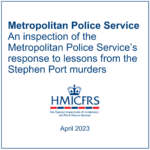 Stephen Port murdered four young men in East London between June 2014 and September 2015 – but despite the obvious similarities, the Met failed to recognise the deaths were connected.
Stephen Port murdered four young men in East London between June 2014 and September 2015 – but despite the obvious similarities, the Met failed to recognise the deaths were connected.
In its new report, His Majesty’s Inspectorate of Constabulary and Fire & Rescue Services (HMICFRS) found that the Met had made some improvements since the Port case, including better working arrangements between local officers and specialist murder investigation teams, and training and guidance for officers on chemsex.
However, inspectors also found that Met police officers admit they still rely on luck to identify links between deaths at a local level. Inspectors concluded that the Met’s flawed handling of the Port investigations could broadly be explained by the following issues:
- Poor training and supervision for inexperienced police officers responding to unexpected deaths
- Unacceptable record keeping, confusing case management systems and poor handling of property and exhibits
- Confusing policy and guidance
- Inadequate intelligence and crime analysis processes, which make it difficult for officers to link deaths
HMICFRS has made 20 recommendations for the Met, which include increasing the use of intelligence by officers responding to deaths and improving family liaison in unexpected death cases.
An inspection of the Metropolitan Police Service’s response to lessons from the Stephen Port murders | HMICFRS | 27 Apr 2023Transcript: Interview with Donna Taylor, sister of Jack Taylor, and Assistant Commissioner Louisa Rolfe | PDF | BBC Today Programme | 28 Apr 2023 His Majesty’s Inspectorate of Constabulary and Fire & Rescue Services
HMICFRS independently assesses the effectiveness and efficiency of police forces and fire & rescue services – in the public interest. Inquests into the deaths of Anthony Walgate, Gabriel Kovari, Daniel Whitworth and Jack Taylor | MEN R US
Stephen Port | MEN R US Back to top
Operation Hotton
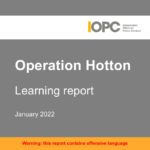 Operation Hotton was a series of nine linked independent investigations concerning police officers from the Metropolitan Police Service, (MPS). Most officers held the rank of police constable and were based mainly at Charing Cross Police Station, Agar Street, Charing Cross, London WC2N 4JP | Map
Operation Hotton was a series of nine linked independent investigations concerning police officers from the Metropolitan Police Service, (MPS). Most officers held the rank of police constable and were based mainly at Charing Cross Police Station, Agar Street, Charing Cross, London WC2N 4JP | Map
The Independent Office for Police Conduct (IOPC) report found evidence of:
- Discrimination
- Misogyny
- Harassment
- Homophobic slurs
- Bullying
The IOPC says the messages included:
- Messages about police officers attending a festival dressed as known sex offenders sent within a WhatsApp group containing 17 police officers
- Numerous messages about rape within WhatsApp and Facebook chat groups
- Homophobic comments; eg: “Gayyyyyy”, “You fucking gay!” and “Fuck you bender…😂😂”
- Use of words that could be considered misogynist, racist, or constituting disability discrimination
Dates are absent from the IOPC report though:
- Actions happened: 2016 and 2018
- Actions uncovered: 2017
- Inquiry launched: March 2018 (nine linked independent investigations)
Source: BBC News article | 1 Feb 2022
Of the 14 officers investigated:
- 2 were dismissed for gross misconduct and put on the barred list, preventing future employment with the police
- 2 resigned and several others faced disciplinary action
- 9 are still serving with the force
- 1 is working as a contractor in a staff role
Operation Hotton: Learning Report | Independent Office for Police Conduct (IOPC) Independent Office for Police Conduct (IOPC)“Our recommendations seek to tackle a range of issues, which if not addressed, can lead to the creation of environments in which unprofessional and inappropriate conduct can thrive and go unchallenged. Policing in the United Kingdom is by consent, which means the trust and confidence that the public has in the police service is critical. The behaviours we uncovered risked causing serious damage to that relationship. Although the matters we investigated occurred three years ago, we know through our independent investigations, the communities we engage with and concerns raised by officers and the wider public, that these were not isolated incidents”
Operation Hotton: Learning Report | Independent Office for Police Conduct (IOPC)
The Independent Office for Police Conduct (IOPC) oversees the police complaints system in England and Wales. It investigates the most serious matters, including deaths following police contact, and set the standards by which the police should handle complaints. It uses learning from its work to influence changes in policing. The IOPC is independent, making its decisions entirely independently of the police and government. Sadiq Khan demands Met chief Dame Cressida Dick’s plan to win back trust within weeks | BBC | 9 Feb 2022
‘Furious’ Sadiq Khan puts Met Police chief Cressida Dick ‘on notice’ over homophobia and racism | Pink News | 3 Feb 2022
London mayor puts Met commissioner Dame Cressida Dick on notice | BBC | 2 Feb 2022
Met Police: Watchdog slams misogyny and bullying within ranks | BBC | 1 Feb 2022
Damning report reveals offensive culture of racist and homophobic messages sent as ‘banter’ | The Guardian | 1 Feb 2022
‘F**k you bender’: Police officers ‘joked’ about being gay and rape, damning report finds | Pink News | 1 Feb 2022
Culture Of ‘Misogyny, Racism And Homophobia’ Uncovered In Met Police | Huffington Post | 1 Feb 2022 Back to top
Big Brother Watch
Big Brother Watch is a UK fiercely independent, diverse, non-partisan and non-profit group of campaigners and researchers who work to roll back the surveillance state and protect rights in parliament, the media or the courts if it has to. Publishes unique investigations and pursue powerful public campaigns to pursue real change. Works to inform and empower the public to collectively reclaim privacy, defend our civil liberties and protect freedoms for the future.
Big Brother Watch Back to topACCOUNT
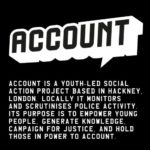 ACCOUNT is a youth-led social action project based in Hackney, London. Locally it monitors and scrutinises police activity. Its purpose is to empower young people, generate knowledge, campaign for justice, and hold those in power to account.
ACCOUNT is a youth-led social action project based in Hackney, London. Locally it monitors and scrutinises police activity. Its purpose is to empower young people, generate knowledge, campaign for justice, and hold those in power to account.
“We are driven by a passion to empower young people in our community. We want to see every young person in Hackney hit their potential. We do this by giving them a platform to express themselves, giving them knowledge, and helping them push for change.
We are committed to developing expertise in our own community. We do this by leading research projects designed and carried out by young people. Evidence is a powerful tool that should not only be wielded by those in power.”
ACCOUNT Back to topStreetSafe
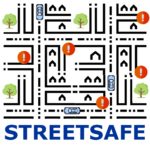 StreetSafe is a pilot service for anyone to anonymously tell us about public places where you have felt or feel unsafe because of environmental issues, eg street lighting, abandoned buildings or vandalism and/or because of some behaviours, eg being followed or verbally abused.
StreetSafe is a pilot service for anyone to anonymously tell us about public places where you have felt or feel unsafe because of environmental issues, eg street lighting, abandoned buildings or vandalism and/or because of some behaviours, eg being followed or verbally abused.
Police stations: Are they a thing of the past?
The closing of police stations across the UK has caused communities to voice concern for several years. There are no official figures showing the number of police station closures nationally. However, estimates suggest that around 600 police stations across England and Wales were shut between 2010 and 2018. In a recent debate on Rural Crime and Public Services, Louise Haigh MP, Shadow Minister for Policing, said nearly 400 stations had closed in England and Wales and counters open to the public to report crimes fell from more than 900 in 2010 to just over 500 today.
This Insight looks at why police stations are closing and what impact this is having on community-police relations.
What counts as a police station?
Police stations can vary substantially, both in size and the level of service provided. Some will have one or several custody suites, while others might offer a counter where members of the public can report crime, alongside offices and break rooms for officers. Closing a police counter can impact how safe a community might feel. Closing or reducing custody suites might mean that suspects will have to be transported further before being questioned or charged, thereby incurring longer hours and stress on both the suspect and police officers involved.
Why are police stations closing?
Police forces cite budget pressures as the reason for station closures. A 2018 Public Accounts Committee report found that, “forces are selling off more of their assets to try and raise some funds for capital investment and increasingly drawing on their reserves.”
Whilst budgetary pressures may be the main reason police chiefs say they are closing stations, they also point to changes in public behaviour. Developments in technology mean that people can report non-urgent problems online or via phone and are often choosing to do so instead of reporting crimes at a police counter. The London Mayor’s Office for Police and Crime has noted that the number of people who reported a crime at a police counter was down by 22% between 2016 and 2006.
What has the Government said?
Central government devolves responsibility of funding allocations to police forces, so that Police and Crime Commissioners (in conjunction with their Chief Constable) are responsible for local policing decisions, including how they meet they use their funding and what estate of police stations they need. Nick Hurd, Minister for Policing and the Fire Service, has said: The Government believes in local policing accountable to local communities. This is why decisions on the number of police stations and their locations are for Chief Constables and directly elected Police and Crime Commissioners (PCCs) and Mayors with PCC functions. They are best placed to make these decisions based on their local knowledge and experience.”
Text from “Police stations: Are they a thing of the past?” by Alison Pratt, a researcher at the House of Commons Library, specialising in Home Affairs.
Police stations: Are they a thing of the past? | UK Parliament | 28 May 2019 Back to topFacial recognition
 Developed in the 60s, facial recognition is a bit of a catch-all term for any technology that involves recognising and cataloguing human faces. The systems that make this happen are computer technologies capable of recognising and identifying an individual from a digital image/ photo or video source. The technology has come a long way since then and the reason we’ve included something on this website is because the police are using it, in London and elsewhere.
Developed in the 60s, facial recognition is a bit of a catch-all term for any technology that involves recognising and cataloguing human faces. The systems that make this happen are computer technologies capable of recognising and identifying an individual from a digital image/ photo or video source. The technology has come a long way since then and the reason we’ve included something on this website is because the police are using it, in London and elsewhere.
“Facial recognition frequently sparks two distinct fears: that it will not work well enough, or that it will work too well. The first concern highlights the fact that the technology, still in its infancy, is prone to false positives and false negatives, particularly when used with noisy imagery, such as that harvested from CCTV cameras installed years or decades ago. When that technology is used to arrest, convict or imprison people, on a possibly faulty basis, it can cause real harm. Worse, the errors are not evenly distributed; facial recognition systems have regularly been found to be inaccurate at identifying people with darker skin.”
What is facial recognition – and how do police use it? | The Guardian | 24 Jan 2020Some of the pros and cons of facial recognition
- Pros include public security and tackling crime, fast and non-invasive identity verification (eg: passport control) and tackling banking fraud
- Cons include data privacy concerns, erosion of civil freedoms, lack of regulation, racial bias, reliability, and cost
More
Facial recognition | LibertyLive facial recognition | Metropolitan Police
Court of appeal judgment | Live Facial recognition | Metropolitan Police
Facial recognition | Wikipedia Legal victory over facial recognition | BBC Radio 4 | 14 Aug 2020 Facial recognition could transform policing in same way as DNA, says Met chief | The Guardian | 11 Sep 2023
Police accused over use of facial recognition at King Charles’s coronation | The Guardian | 3 May | 2023
Live facial recognition labelled ‘Orwellian’ as Met police push ahead with use | The Guardain | 5 Apr 2023
Watchdog warns rules not keeping up with surveillance tech | BBC | 10 Feb 2023
UK police use of live facial recognition unlawful and unethical, report finds | The Guardian | 27 Oct 2022
US facial recognition firm faces £17m UK fine for ‘serious breaches’ | The Guardian | 29 Nov 2021
Facial recognition firm faces possible £17m privacy fine | BBC | 29 Nov 2021
London is buying heaps of facial recognition tech | Wired | 27 Sep 2021
ICO watchdog ‘deeply concerned’ over live facial recognition | BBC News | 18 Jun 2021
Is police use of face recognition now illegal in the UK? | New Scientist | 11 Aug 2020
Facial recognition use by South Wales Police ruled unlawful | BBC News | 11 Aug 2020
Snapshot Paper – Facial Recognition Technology | GOV.UK | 20 May 2020
Met police deploy live facial recognition technology | The Guardian | 11 Feb 2020
What is facial recognition – and how do police use it? | The Guardian | 24 Jan 2020 Facial recognition technology scrapped at King’s Cross site | 2 Sep 2019 | The Guardian
Surveillance software switched off at prestigious development after backlash How does facial recognition work and is it safe? | WIRED Explains | Wired UK | 10 Feb 2020 | 5m 50s
Facial recognition cameras to be turned on in London | Sky News | 24 Jan 2020 | 1m 57s
The pros and cons of facial recognition | The Telegraph | 21 May 2019 | 1m 49s
Fines and facial recognition | BBC Click | 17 May 2019 | 3m 19s
How does facial recognition work? | Brit Lab | BBC Earth Live | 26 Nov 2016 | 7m 26s Back to top
BRITISH TRANSPORT POLICE
British Transport Police
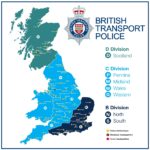 The British Transport Police (BTP) is a national (specialist) police force policing railways across the United United Kingdom except for Northern Ireland. It also polices the London Underground, Docklands Light Railway, the Midland Metro tram system, Croydon Tramlink, Tyne and Wear Metro, Glasgow Subway and Emirates AirLine.
The British Transport Police (BTP) is a national (specialist) police force policing railways across the United United Kingdom except for Northern Ireland. It also polices the London Underground, Docklands Light Railway, the Midland Metro tram system, Croydon Tramlink, Tyne and Wear Metro, Glasgow Subway and Emirates AirLine.
Text 61016
@BTPLondon
BTP is funded by Network Rail and train operating companies and has all the same police powers as the Metropolitan Police plus additional railway-related authority applicable to railway bylaws and specific railway-related offences. Its jurisdiction is train stations, railway tracks and anything railway related.
- Its vision: to work with industry partners and stakeholders to deliver a safe, secure, reliable and expanding transport system
- Its mission: to protect and serve the railway environment and its community, keeping levels of disruption, crime and the fear of crime as low as possible
- Its values: it’s long so click here to read
Its neighbourhood Policing Teams look after stations all over the country with specialist knowledge of the area they work in. London teams: London Bridge, London Euston, London Kings Cross, London Liverpool Street, London Paddington, London Stratford, London Victoria and the London Underground.
According to Wikipedia, BTP has a workforce of 3,028 police officers, 1,530 police staff, 230 police community support officers, 30 designated officers and 330 special constables. (September 2017). In 2014, BTP changed from a 7 to a 4 division structure (A-D) covering 10,000 miles of track (16,000 km), and over 3,000 railway stations and depots.
- A: Force Headquarters (FHQ): with overall control over the other divisions
- B: London and the South East of England
- C: Pennine/ North East, Midlands, South West and Wales
- D: Scotland
For 2019/ 20 the British Transport Police Authority (BTPA) agreed on an overall gross budget of £318.6m. £56.3m was for core underground policing and £262.3m was for core overground policing. By comparison, the Metropolitan Police Service (MPS) budget was 3.6 billion for the same period.
British Transport Police | British Transport PoliceBritish Transport Police | Wikipedia
British Transport Police Authority
4th Floor, British Transport Police Force Headquarters, 25 Camden Road, London NW1 9LN | Map
07900 394 397
Email
More
Police with pride | British Transport Police
LGBT History Month: A personal reflection | British Transport Police
A History of the LGBT+ Support Network at British Transport Police | British Transport Police History Group
British Transport Police Authority (BTPA) Strategic Plan | 2018-22
News
Police seek man after homophobic tirade forces gay couple to flee train | Pink news | 24 Jun 2018
Victim of homophobic tube attack ‘forced to apologise for being gay’: I’m not sorry for my sexuality | Pink News | 8 Dec 2017
Police search for man in relation to ‘homophobic and racist’ incident in London | Pink Nwes | 14 Mar 2017
Man ‘shouted homophobic slurs and exposed himself’ on London Underground | Pink News | 17 Nov 2015
CITY OF LONDON POLICE
City of London Police
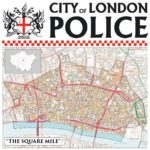 The City of London Police is the territorial police force responsible for law enforcement within the City of London, including the Middle and Inner Temples, primarily a financial business district (the Square Mile) with a small resident population but a large 483,000 commuting workforce.
The City of London Police is the territorial police force responsible for law enforcement within the City of London, including the Middle and Inner Temples, primarily a financial business district (the Square Mile) with a small resident population but a large 483,000 commuting workforce.
Non emergency 101
@CityPolice
It says itself that it aims to make the City of London safer by
- upholding the law fairly and firmly
- preventing crime and antisocial behaviour
- keeping the peace
- protecting and reassuring the community
- investigating crime and bringing offenders to justice
Headquarters located at the Guildhall with two additional stations at Bishopsgate and Wood Street:
Guildhall Yard, London EC2V 5AE | Map37 Wood St, Barbican, London EC2P 2NQ | Map
182 Bishopsgate, London EC2M 4NP | Map
As of 2019, its workforce was made up of 756 full-time police officers and 451 support staff and smaller numbers of special constables, police community support officers, and designated officers. While British police force unforms are broadly similar with white metal badges and buttons, those of the City Police are brass.
City of London Police | City of London PoliceCity of London Policing plan 2020-2023 | City of London Police
City of London Police | Wikipedia Equality and diversity support networks | City of London Police
City of London Police Funding | City of London Police
City of London Police force faces £5.6m budget cut | City Matters | 26 Mar 2021
Back to top
THE ARMED FORCES
Coming out in the forces
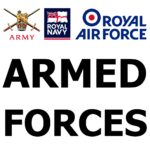 The journey to allow LGBT people to serve in the British military has been a long one. In the late 90s, Stonewall spearheaded the movement to rescind British military prohibitions against openly lesbian, gay and bisexual service members. It took over 10 years to achieve this but the ban was lifted in 2000 when a new general code of sexual conduct was introduced.
The journey to allow LGBT people to serve in the British military has been a long one. In the late 90s, Stonewall spearheaded the movement to rescind British military prohibitions against openly lesbian, gay and bisexual service members. It took over 10 years to achieve this but the ban was lifted in 2000 when a new general code of sexual conduct was introduced.
Scroll through armed forces multimedia media platforms today and they are keen to promote good working conditions for all existing and potential LGBT employees and ensure equal treatment. However, the reality can be very different. For example, if you have come out but are then the victim of bullying then approaching your commanding officer (CO) is unlikely to impress fellow serving soldiers.
Challenging underlying cultural and attitudinal values that allow discrimination to flourish simply doesn’t change overnight, so without diminishing the significant steps the armed forces have taken in recent years it will take time.
The British Army
The British Army | Ministry of Defence
The British Army | Wikipedia
The Royal Airforce
Royal Air Force | Ministry of Defence
Royal Air Force | Wikipedia
The Royal Navy
Royal Navy | Ministry of Defence
Royal Navy | Wikipedia
The Army Reserve
The Army Reserve | Ministry of Defence
Army Reserve (United Kingdom) | Wikipedia
Website of the Army LGBT+ Network for lesbian, gay, bisexual and transgender soldiers and LGBT people thinking of joining the Army. Fighting with Pride
Fighting With Pride supports the health and wellbeing of LGBT+Veterans, service personnel and their families – in particular, those most impacted by the ban on LGBT+ personnel serving in the Armed Forces prior to January 2000. Proud 2 Serve
Provides support, information and networking to LGBT persons serving, ex-serving personnel and their families both at home and abroad.
No posts since 2018. Royal Air Force
RAF LGBT+ Network’s list of followers is unavailable.
News and articles
Rishi Sunak apologises for past ban on LGBT people serving in military | The Guardian | 19 Jul 2023 Royal British Legion apologises for past LGBTQ+ discrimination | The Guardian | 19 Apr 2022LGBT military ban: Ex RAF navigator speaks of trauma | BBC News | 26 Jan 2022
LGBT military ban: ‘I was marched off RAF base for being gay’ | BBC News | 19 Jan 2022
LGBT military ban: Veterans to share impact of rules in review, 20 years on | BBC | 19 Jan 2022
‘Admirals would say: we don’t want to serve with these people’ – Craig Jones, the sailor who came out and changed the navy | The Guardian | 12 Jan 2022
Alastair Bruce: ‘When I joined the army it was illegal to be gay’ | BBC News | 5 Aug 2021
LGBT in the forces: ‘It was a very scary time’ | BBC News | 26 Feb 2021
British soldiers sacked for being gay can get their medals back | The Guardian | 16 Feb 2021
Government apologises for historic ban on gay people serving in the armed forces | Sky News | 9 Jan 2020
Royal Navy marks 20 years since LGBT ban lifted | Royal Navy | 10 Jan 2020
UK armed forces recruits to be asked if they are gay | The Guardian | 11 Jan 2015
On the same side: homosexuals during the Second World War History Extra | 8 Feb 2012
Gays in the military: The UK and US compared | BBC News | 2 Feb 2010
How the forces finally learnt to take pride | The Independent | 27 Jul 2009
More
Sexual orientation and the military of the United Kingdom WikipediaSexual orientation and military service Wikipedia Out In The Army: My Life as a Gay Soldier | James Wharton | Biteback Publishing | 2014
“A heartfelt account of a gay man’s journey from recruit to veteran, as well as a non-judgemental appraisal of an institution’s efforts to move with the times. On both counts, it is a worthwhile read.” Soldier Magazine Jeff Shenge: Striking Images of Gay Military | SuchIsLIfeVideos | 15 Nov 2010 3m24s Back to top
POLITICAL PARTIES, MPS AND LOCAL GOVERNMENT
Political parties, MPs and local government
Political parties
Conservative LGBT Group
Conservative Party | Wikipedia Labour Party
LGBT Labour
Labour Party | Wikipedia Green Party
LGBTIQIA Green Party
Green Party (England and Wales) | Wikipedia Liberal Democrat Party
LGBT+ Liberal Democrats
Liberal Democrats | Wikipedia Socialist Workers Party
Socialist Party Lesbian, Gay, Bisexual and Transgender group (LGBT)
Socialist Workers Party | Wikipedia List of political parties in the United Kingdom | Wikipedia
Members of Parliament (MP)
A Member of Parliament (MP) is the person elected by all those who live in a particular area (constituency) to represent them in the House of Commons. MPs have regular surgeries where you raise issues with them in person (regardless of whether you voted for them or not). The basic annual salary of a Member of Parliament (MP) in the House of Commons is £84,144, as of April 2022. In addition, MPs are able to claim allowances to cover the costs of running an office and employing staff, and maintaining a constituency residence or a residence in London.
Find your MP | UK Parliament
Member of Parliament (United Kingdom) | Wikipedia
TheyWorkForYou
Most people don’t know the name of their MP, let alone what they’ve been saying in Parliament or how they’ve voted. TheyWorkForYou aims to get that changed. You can search by topic, a unique link for every statement, and by name and/ or party.
TheyWorkForYou
FullFact
Fights for the right information to reach the people who need it most, whether that’s individuals making decisions about their health or who to vote for; or politicians debating the future of our country. Anyone making serious claims in public debate—fact checkers included—should be prepared to: get their facts right, back up what they say with evidence, and correct their mistakes.
FullFact
FullFact | Wikipedia
Led by Donkeys
Political campaign group, established in December 2018 as an anti-Brexit group, but which has also criticised other actions of Boris Johnson’s government. Since the group’s creation, its four founders have been calling out what they call “thermonuclear hypocrisy” and used satire targeted at pro-Brexit politicians. Led By Donkeys’ main campaign consists of billboards containing past tweets by pro-Brexit politicians or quotes presented as tweets.
Led By Donkeys
Led by Donkeys | Wikipedia
Local government (your councillors)
Local government is responsible for a range of vital services for people and businesses in defined areas. These include social care, schools, housing and planning and waste collection but also lesser known: licensing, business support, registrar services and pest control. Local councils, which is the most common type of local authority, are made up of councillors who are elected by the public in local elections. For example, Greater London is divided into 32 Boroughs (each managed by a Council). Each Borough is divided up into areas called wards which have three Councillors who are elected every four years. Councillors work with local people and partners, such as local businesses and other organisations, to agree and deliver on local priorities. Councillors have regular surgeries where you raise issues with them in person (regardless of whether you voted for them or not). The decisions are implemented by permanent council staff (council officers) who deliver services day-to-day. The basic allowance paid to every councillor of £11,045. Updated for the local government staff pay awards since then (and including an indicative 1.75% award for 2021-22, which is still the subject of negotiation), the figure is now £12,014.
Find your local councillors | GOV.UK
Remuneration of Councillors in London Boroughs | London Councils
Greater London Assembly (GLA)
The Greater London Authority – also known as “City Hall” – is the devolved regional governance body of Greater London. It consists of two political branches: the executive Mayoralty and the 25-member London Assembly, which serves as a means of checks and balances on the former. Until the end of 2021, the Mayor and Assembly Members used to meet at City Hall (110 The Queen’s Walk, London, SE1). City Hall has now relocated to The Crystal (Royal Victoria Docks, London E16). One important element of the GLA Act is to determine the seven ‘statutory’ London strategies the Mayor must publish. They are strategies for the Environment, Spatial Development (the London Plan), Transport, Economic Development, Housing, Culture, and Health Inequalities.
Mayor of London
The Mayor (currently Sadiq Khan) is the chief executive of the Greater London Authority, providing citywide leadership and creating priorities and policies to improve life for Londoners. The Mayor’s salary is £152,734.
Mayor of London | Greater London Authority
Mayor of London | Wikipedia
Salaries | Greater London Authority
The London Assembly
The London Assembly holds the Mayor and Mayoral Advisers to account by examining their work to ensure promises to Londoners are delivered. The London Assembly is a 25-member elected body, with elections every four years (same time as the Mayor). There are 14 geographical constituencies, each electing one Member, with a further 11 members elected from a party list to make the total Assembly Members. The salary of an Assembly Member is currently £58,543 per year.
Find your London assembly member | Greater London Authority
London Assembly | Wikipedia
Salaries | Greater London Authority
London Councils
London Councils makes the case to government, the Mayor and others to get the best deal for Londoners and to ensure that its member authorities have the resources, freedoms and powers to do the best for their residents and local businesses.
London Councils
The Local Government Association (LGA)
The Local Government Association (LGA) is the national membership body for local authorities, working on behalf of its member councils to support, promote and improve local government.
Local Government Association
LGA Conservatives
LGA Labour
LGA Lib Dem Group
LGA Independent
GREATER LONDON SERVICES MAP
Greater London Services Map
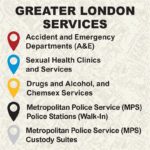 This map includes the following services with hyperlinks (to others parts of the website).
This map includes the following services with hyperlinks (to others parts of the website).
- Accident and Emergency Departments (A&E)
Not all London boroughs have an A&E but this has more to do with how they have evolved and been planned over time. - Drugs and Alcohol, and Chemsex Services
These are commissioned (provided) by local authorities so you will have to access these services* located in your borough. - Sexual Health Services and Clinics
Even though there is a drive to use self-test kits, we’ve mapped 30 clinics across Greater London. - Metropolitan Police Service Stations (Walk-In)
The Metropolitan Police Service website doesn’t provide a list of walk-in stations, so we have. - Metropolitan Police Service Custody Suites
If you arrested in one Borough, your custody suite may be located in another. We list them because the Metropolitan Police Service doesn’t.
* 56 Dean Street and Antidote that provide chemsex support are London-wide.
Back to topSerial killers, murderers, rapists
About
Over several decades, serial killers and rapists have raped and murdered gay men in the UK including Dennis Nilsen, Colin Ireland, Stephen Port, Gerald Matovu and
While David Copeland (1999) does not fit the criteria of a serial killer, he was responsible for the 1999 London nail bombings which included the Admiral Duncan pub in Soho, London where three people were killed and a total of seventy-nine were injured, many of them seriously.
Outside the UK, Canada recently sentenced Bruce McArthur accused of killing and dismembering eight men between 2010 and 2017. In the USA, Jeffrey Dahmer murdered 17 males between 1978 and 1991. Dahmer was captured in 1991 and sentenced to 16 life terms. He was killed by fellow prison inmate Christopher Scarver in 1994.
A serial killer is typically a person who murders three or more people, usually in service of abnormal psychological gratification, with the murders taking place over more than a month and including a significant period of time between them. Different authorities apply different criteria when designating serial killers and, while most set a threshold of three murders, others extend it to four or lessen it to two.
For example, the Federal Bureau of Investigation (FBI) defines serial killing as “a series of two or more murders, committed as separate events, usually, but not always, by one offender acting alone”.
Serial killer | WikipediaMurder in English law | Wikipedia Man, 19, guilty of murdering schoolboy he paid £2,000 to keep silent | The Guardian | 7 Jan 2021
Have you seen this serial killer who murdered gay men in the 1970s? | Buzzfeed | 8 Feb 2019
Serial killer Bruce McArthur gets life sentence in case that terrorized gay men | The New York Times | 8 Feb 2019 Back to top
Inquests into the deaths of Anthony Walgate, Gabriel Kovari, Daniel Whitworth and Jack Taylor
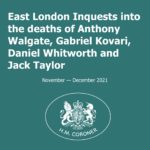 November 2021 started the inquests into the deaths of Anthony Walgate, Gabriel Kovari, Daniel Whitworth and Jack Taylor, four young men aged between 22 and 25 years old who died in Barking between June 2014 and September 2015. Judge Sarah Munro QC was been appointed an Assistant Coroner within the East London area to conduct the inquests.
November 2021 started the inquests into the deaths of Anthony Walgate, Gabriel Kovari, Daniel Whitworth and Jack Taylor, four young men aged between 22 and 25 years old who died in Barking between June 2014 and September 2015. Judge Sarah Munro QC was been appointed an Assistant Coroner within the East London area to conduct the inquests.
In November 2016, following a trial at the Old Bailey, Stephen Port was convicted of murdering all four men. He was also found guilty of sexually assaulting a number of other young men. He was sentenced to life imprisonment with a whole life order. Following the conviction of Stephen Port, the High Court granted an order quashing the conclusions of the previously held inquests into the deaths of Gabriel Kovari and Daniel Whitworth. HHJ Sarah Munro QC was appointed on 1 May 2019 to conduct fresh inquests into the deaths of Mr Kovari and Mr Whitworth alongside the resumed inquests into the deaths of Anthony Walgate and Jack Taylor.
Evidential hearings started in the Barking Town Hall on 5th October 2021. After 38 days of hearings, the Inquests concluded, on schedule, on 10 December 2021 with the Jury’s conclusions.
Anthony Walgate | PDFGabriel Kovari | PDF
Daniel Whitworth | PDF
Jack Taylor | PDF
Inquests touching the deaths of Anthony Walgate, Gabriel Kovari, Daniel Whitworth and Jack Taylor: Action to prevent future deaths
The Inquests to which this Report relates involved the deaths of four young gay men called Anthony Walgate, Gabriel Kovari, Daniel Whitworth and Jack Taylor. All four young men were drugged with gamma-hydroxybutyrate (GHB) and murdered by a man called Stephen Port. Following a police investigation named Operation Lilford, Port was convicted by a jury of the four murders together with other offences involving the drugging and raping of living victims. At the Inquests, the jury determined that each of the four deceased had been unlawfully killed and, in each case, provided a supplementary narrative conclusion by means of answers to a questionnaire.
The LGBT+ Advisory Group said of the report: “The coroner’s inquest into the circumstances and the police investigation of the deaths of Anthony Walgate, Gabriel Kovari, Daniel Whitworth and Jack Taylor concluded in December 2021. The jury have returned a verdict of unlawful deaths, raising many issues regarding the professionalism of the Metropolitan Police. Her Honour Judge Sarah Munro QC has published her report Anthony Walgate, Gabriel Kovari, Daniel Whitworth and Jack Taylor: Prevention of future deaths report (PDF). The report gives a summary of the facts of the murder investigation and lists six Matters of Concern addressed to the Metropolitan Police, National Police Chiefs’ Council, College of Policing and the Secretary of State for Digital, Culture, Media and Sport, covering
- categorisation of suspicious, non-suspicious and unexplained deaths
- interaction between specialist homicide investigators and local officers in determining ownership of the investigation
- leadership in responsibility over investigations of unexplained deaths
- recording of investigation details on information systems
- handwriting verification
- need to verify the identity of users of escort website
Although the disciplinary action is not in the remit of the coroner’s inquest, the coroner points out to the Independent Office for Police Conduct (IOPC) that the inquest has “exposed failings which were not identified by the IOPC in their investigation”. She also commends the IOPC report to upcoming reviews of the Metropolitan Police as containing a “valuable analysis of how assumptions, stereotyping and unconscious bias may have detrimentally affected the decision-making in these investigations and contributed to the failure to identify Stephen Port as a perpetrator sooner”.
Inquests touching the deaths of Anthony Walgate, Gabriel Kovari, Daniel Whitworth and Jack Taylor: Regulation 28 report on action to prevent future deaths | Judge Sarah Munro QCLGBT+ Advisory Group’s community meeting and explanation of the process to decide whether to re-open the IOPC investigation into the MPS handling of the four murders.
On 24 January 2022, the Independent Office for Police Conduct (IOPC) attended the LGBT+ Advisory Group’s community meeting on the deaths of Anthony Walgate, Gabriel Kovari, Daniel Whitworth and Jack Taylor. The Group asked him for an explanation of the process to decide whether to re-open the IOPC investigation into the MPS handling of the four murders. Update here: LGBT+ Independent Advisory GroupIOPC to reinvestigate Met Police handling of deaths of Anthony Walgate, Gabriel Kovari, Daniel Whitworth and Jack Taylor
Following the 2021 inquests into the deaths of Anthony Walgate, Gabriel Kovari, Daniel Whitworth and Jack Taylor – which revealed previously unknown evidence – we will re-investigate the way the Metropolitan Police Service (MPS) initially handled the deaths of the four men in Barking, East London.
IOPC to reinvestigate Met Police handling of deaths of Anthony Walgate, Gabriel Kovari, Daniel Whitworth and Jack Taylor | IOPC | 23 Jun 2022
MPS Police and Crime Committee (London Assembly/ Mayor of London) meeting on 25 January 2021
Commissioner Cressida Dick was asked several questions, some on behalf of the sisters of Jack Taylor. You can view the meeting via the link below. Until we post the transcript of the meeting, here is a brief summary of some of the questions. The numbers reference the hour: minute into the meeting.
- 1:11 Assembly Member Unmesh Desai, Barking & Dagenham, City of London, Newham, Tower Hamlets
Questions on behalf of the Taylor sisters - 1:25 Assembly Member Caroline Russell, Londonwide
GHB testing a chemsex knowledge gap among officers - 1:27 Assembly Member Sem Moema, Hackney, Islington and Waltham Forest
Do you accept the victim’s sexualities had an impact in the way the investigation was conducted - 1:29 Assembly Member Caroline Pidgeon, Londonwide
Timing of (updated) step-by-step guide to unexplained deaths
BCUs and BCU commanders
MOPAC and City Hall engagements groups
Draft crime plan, LGBTQ+ Londoners only mentioned twice - 1:39 Assembly Member Andrew Boff, Londonwide
How many LGBT Liasion Officers/ LGBT+ Advisers are there?
The distinction between the purpose of the inquest and media headlines
MEN R US volunteers would like to make the distinction between the purpose of the inquest and media headlines. The inquest was about the deaths of Anthony Walgate, Gabriel Kovari, Daniel Whitworth and Jack Taylor. It is NOT ‘the Stephen Port inquest’. Anthony Walgate was a 23-year-old fashion student from Hull; Daniel Whitworth (21 ), a chef from Kent; Jack Taylor (25 ), a warehouse supervisor from Dagenham; and Gabriel Kovari (22), was described by his brother (Adam) as a “very smart, talented, kind person with a passion for drawing and languages”. It is disappointing – though not surprising- that the media have framed the inquest into the deaths of these four young men in this way; ie: “Stephen Port inquest” (Barking and Dagenham Post; 13/11/21), “Stephen Port murder inquiries” (Guardian; 5/11/21) and “Serial Killer Stephen Port: Inquests Delayed” Huff Post; 3/1/20), amongst other lured headlines.
Statement following the conclusion of the East London Inquests | Metropolitan Police Service (MPS) | 10 Dec 2021
Extract: “Today, after hearing seven weeks of detailed evidence, an inquest jury has determined that Anthony Walgate, Gabriel Kovari, Daniel Whitworth and Jack Taylor were unlawfully killed. They have also found that the deaths of three of those young men – Gabriel, Daniel and Jack – could probably have been prevented had the initial police responses and investigations been better. It is a devastating finding. Our thoughts are with everybody who loved these young men. We are so sorry for their loss. And we’re also deeply sorry that there were failings in the police response to the murders. I give my own and the Met’s heartfelt apologies. All those who loved Anthony, Gabriel, Daniel and Jack expected a professional and thorough police investigation into their deaths and it is a great sadness for me and everybody at the Met that this didn’t happen.”
The Gay Men’s Health Collective (of which this website is part) wrote to the Met with remarks and concerns about the “How we have changed” bullet points included in the statement.
Statement following the conclusion of the East London Inquests | Metropolitan Police Service (MPS) | 10 Dec 2021 (Link no longer available)GMHC letter to MPS and response to statement
Interview with Neil Hudgell (a lawyer for the families) on R4 Today | 11 Dec 2021
Interview with Neil Hudgell (a lawyer for the families) and Chief Inspector Lee Broadstock (Secretary of the National LGBT+ Police Network) | Today, BBC Radio 4 | 11 Dec 2021 | 7m 39s
Transcript of interview | PDF | MEN R US
Urgent question from Margaret Hodge MP | 13 Dec 2021
Urgent question from Margaret Hodge MP “To ask the Secretary of State for the Home Department if she will make a statement on the Metropolitan Police and the inquest into the deaths of Anthony Walgate Gabriel Kovari, Daniel Whitworth and Jack Taylor.” | House of Commons | 13 Dec 2021 | 2m 20s
Transcript of urgent question | PDF | MEN R US
More
Cressida Dick exit is ‘small justice’ for Stephen Port victims, loved ones say | Pink News | 11 Feb 2022Friend of Stephen Port victim shares biggest takeaway from true crime drama Four Lives | Pink News | 3 Jan 22
Grindr serial killer Stephen Port and the horrific murder spree that shocked a nation | Pink News | 3 Jan 2
Police ‘ineptitude’ contributed to Stephen Port murders, says producer | The Guardian | 27 Dec 2021
Why should we have uniformed police at Pride marches when the Met is so homophobic? | Peter Tatchell | The Guardian | 14 Dec 2021
Sadiq Khan launches vital probe into ‘homophobia, misogyny and racism’ in Met Police | Pink News | 13 Dec 2021
Police officers disciplined over failings in case of Grindr killer Stephen Port have been promoted | Pink News | 11 Dec 2021
Stephen Port: Met Police failings led to more deaths | BBC | 11 Dec 2021
Stephen Port: How Met failings contributed to the deaths of three men | BBC | 11 Dec 2021
Stephen Port: The softly spoken serial killer | Evening Standard | 11 Dec 2021
Met failings probably a factor in deaths of Stephen Port victims, says inquest | The Guardian | 10 Dec 2021
The Stephen Port scandal is another betrayal of public trust. The UK deserves better policing | The Guardian | 10 Dec 2021
Police failings in case of Grindr serial killer Stephen Port ‘probably’ led to more deaths | 10 Dec 2021 Horrific failings of Met police allowed serial killer to murder | Novara Media | 15 Dec 2021 | 18m 26s Homophobia ruled out for jury in Stephen Port victims’ inquests | Barking and Dagenham Post | 3 Dec 2021
Police homophobia ‘ruled out’ in inquest into victims of Grindr killer Stephen Port | Pink News | 2 Dec 2021
BBC News – Stephen Port: Met Police apologises to families of victims of serial killer | BBC | 19 Nov 2021
Stephen Port: Met treated victim’s partner differently ‘because he is gay’ | BBC | 8 Nov 2021
Stephen Port victim inquests hear of Met ‘institutional homophobia’ | The Guardian | 5 Nov 2021
Stephen Port laptop not inspected until he had killed three times, inquest told | The Guardian | 13 Oct 2021
Met officer denies bias hampered investigation into Stephen Port’s first victim | The Guardian | 11 Oct 2021
Paramedic saw death of Stephen Port’s first victim as suspicious, inquest told | The Guardian | 7 Oct 2021
Serial killer Stephen Port obsessed with pornography, inquests hear | The Guardian | 6 Oct 2021
Inquest into Stephen Port murders to examine police competence | The Guardian | 5 Oct 2021
Stephen Port: Inquests ‘key step’ for victims’ families | BBC News | 5 Oct 2021
Long-awaited inquests into murders of four gay men by Grindr killer Stephen Port forced to postpone | Pink News | 13 Jan 2021 Coroner | Wikipedia
A coroner is a government or judicial official who is empowered to conduct or order an inquest into the manner or cause of death and to investigate or confirm the identity of an unknown person who has been found dead within the coroner’s jurisdiction. GHB and GBL | MEN R US
Stephen Port | MEN R US Back to top
Reynhard Sinaga
Gerald Matovu and Brandon Dunbar
Gerald Matovu stole from other victims targeted via gay dating apps with accomplice Brandon Dunbar.
Gerald Matovu killed Eric Michels in 2018 with a fatal overdose of GHB. Matovu was found guilty of Michels’s murder and 38 other offences, while co-defendant Brandon Dunbar was convicted of 23 offences. In September 2019, Matovu was jailed for life with a minimum term of 31 years. Dunbar was sentenced to 18 years in jail with five on extended licence for his role.
The judge said of Matovu, who showed no remorse, “You knew as far back as 2015 that it could be used to take advantage of others. You knew it could be life-threatening. You are a highly dangerous predator.”
Matovu also supplied drugs to serial killer Stephen Port.
Serial killer’s dealer jailed for Grindr murder | 11 Sep 2019Serial killer’s drug dealer jailed for actor’s murder | The Guardian | 11 Sep 2019
Stephen Port’s ex-drug dealer given life sentence for murdering James Bond actor | Pink News | 11 Sep 2019 Back to top
Stephen Port
Stephen Port is a convicted serial rapist and serial killer. Over three-and-a-half years, between 2012 and 2015, he is responsible for murdering at least four men: Anthony Walgate, Jack Taylor, Daniel Whitworth and Gabriel Kovari, and committing multiple rapes. Port received a life sentence with a whole life order on 25 November 2016, meaning he will not become eligible for parole and is unlikely to ever be released from prison.
Working with the LGBT+ Independent Advisory Group, the Met police investigated 58 deaths connected to the use of GHB (gamma-hydroxybutyric acid) in response to the Port case. The report was released in July 2019.
Review of GHB Deaths (2011-15) | MEN R USLGBT+ Independent Advisory Group | MEN R US
Inquests into the deaths of Anthony Walgate, Gabriel Kovari, Daniel Whitworth and Jack Taylor | MEN R US First trailer for Stephen Merchant ‘Grindr killer’ drama shows families’ desperate fight for justice | Pink News | Dec 13 2021
Stephen Merchant to play ‘Grindr killer’ Stephen Port in BBC drama | The Guardian | 9 Feb 2019
Stephen Port: Officers refuse to answer watchdog’s questions | BBC | 26 Jul 2018
Stephen Port | Murderpedia
Stephen Port | Wikipedia Back to top
David Copeland
The 1999 London nail bombings were a series of bomb explosions in London. Over three successive weekends between 17 and 30 April 1999, homemade nail bombs were detonated respectively in Brixton, south London; Brick Lane in the East End; and in The Admiral Duncan pub in Soho in the West End.
On 2 May, the Metropolitan Police Anti-Terrorist Branch charged 22-year-old David Copeland with murder. Copeland, who became known as the “London nail bomber”, was a Neo-Nazi militant and a former member of two far-right political groups, the British National Party and then the National Socialist Movement.
The bombings were aimed at London’s Black, Bengali and gay communities. He was convicted of murder in 2000 and given six concurrent life sentences.
1999 London nail bombings | WikipediaAdmiral Duncan pub | Wikipedia
17-24-30
17-24-30 represents the combined dates of the London nail bomb attacks on Brixton, Brick Lane and Soho which took place on the 17th, 24th and 30th April 1999. Its primary aim is to organise and facilitate the April Acts of Remembrance #AAR to mark the anniversaries of the attacks on Brixton, Brick Lane and Soho, and National Hate Crime Awareness Week #NHCAW in October.
17-24-30 no to hate crime campaign | MEN R US17-24-30 no to hate crime campaign | 17-24-30 Back to top
Michael Lupo
Michael (del Marco) was a serial killer operating from Brompton Road (Yves Saint Laurent boutique), London in the 1980s.
In July 1987 was sentenced to 4 life sentences, plus 14 years for 4 murders: Anthony Connolly (24), James Burns (37), Damian McCloskey and an unidentified man murdered near Hungerford Bridge (Thames River).
Additionally, Lupo was charged with two attempted murders. Lupo died in Frankland Prison, County Durham from an AIDS-related illness in 1995.
Michael Lupo | WikipediaMichael Lupo | Murderpedia Back to top
Dennis Nilsen
Dennis Andrew Nilsen was a serial killer and necrophile, who murdered at least 12 young men between 1978 and 1983, most of them homeless and gay.
They include: Stephen Dean Holmes, Andrew Ho, Kenneth Ockendon, Martyn Duffey, William ‘Billy’ Sutherland, Douglas Stewart, Malcolm Barlow, Paul Nobbs, John Howlett, Carl Stotter, Archibald Graham Allan, and Steve Sinclair.
Nilsen was sentenced to life imprisonment on 4 November 1983, convicted at the Old Bailey of 6 counts of murder and 2 of attempted murder. With a recommendation that he serve a minimum of 25 years, he was incarcerated at Full Sutton maximum security prison in his later years. He became known as the Muswell Hill Murderer as he committed his later murders in Muswell Hill, in north London.
Dennis Nilsen | WikipediaSerial killer Dennis Nilsen dies in prison aged 72 | The Guardian | 12 May 2018
Dennis Nilsen | Murderpedia Back to top
Colin Ireland
Colin Ireland was a British serial killer known as the Gay Slayer because his victims were gay.
In 1993, Ireland started frequenting the Coleherne pub in Earl’s Court (now closed). Between March and June, he murdered five men: Peter Walker, Christopher Dunn, Perry Bradley III, Andrew Collier and Emanuel Spiteri.
He was jailed for life for the murders in December 1993 and remained imprisoned until his death in February 2012, at the age of 57.
Colin Ireland | WikipediaTorture killer Colin Ireland dies in Wakefield Prison | BBC | 21 Feb 2012
Colin Ireland | Murderpedia Back to top
EQUALITY ACT 2010 AND LGBT+ RIGHTS
Equality Act 2010
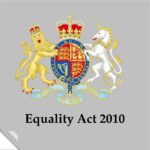 Under the Equality Act 2010 you are protected from these types of discrimination, also referred to as ‘protected characteristics’.
Under the Equality Act 2010 you are protected from these types of discrimination, also referred to as ‘protected characteristics’.
- age
- gender reassignment
- being married or in a civil partnership
- being pregnant or on maternity leave
- disability
- race including colour, nationality, ethnic or national origin
- religion or belief
- sex
- sexual orientation
Commission in Scotland
Commission in Wales Equality Act 2010 | Legislation GOV.UK
Equality Act 2010 | Wikipedia
Equality Act 2010 – discrimination and your rights | Citizens Advice
Discrimination: your rights | UK.GOV
Equality Act | Pink News | 1 Nov 2022
More
Scottish plans to include transgender women in equality law tested in court | The Guardian | 9 Nov 2022SNP suffers biggest ever backbench revolt over transgender bill | The Guardian | 27 Oct 2022
Suella Braverman’s attack on ‘woke’ HR is a spectacular own goal | The Guardian | 5 Aug 2022
MPs call for menopause to be protected characteristic in UK Equality Act | The Guardian | 28 Jul 2022
Alarm after EHRC says long Covid should not be treated as disability | The Guardian | 9 May 2022 Back to top
LGBT rights
 Though there has been progress in the past 50 years or so for LGBT people around the world, it remains a divisive, religious, and political issue.
Though there has been progress in the past 50 years or so for LGBT people around the world, it remains a divisive, religious, and political issue.
While some countries have decriminalised homosexuality, outlawed homophobic hate crimes and over 20 countries recognise same-sex marriage; others are becoming increasingly oppressive, and brutal, like Chechnya.
Having sex with someone of the same sex remains illegal in over 70 countries, and punishable by death in 10. We’ve pulled together a number of organisations working to promote equality, though it’s worth remembering that LGBT human rights campaigners risk violence, discrimination, and arrest.
Contact us here if you know of an organisation we should include.
International HIV organisations
You may be interested in our section on International HIV organisations focusing on the health and well-being of gay men and men who have sex with men including HIV prevention, HIV treatment, advocacy, support services and promoting their health and human rights, and storytelling to fight the pandemic and the global stigma associated with it.
International HIV organisations | MEN R US LGBT rights by country or territory | WikipediaCapital punishment for homosexuality | Wikipedia
LGBT rights | The Guardian
LGBT News | BBC
LGBT+ rights | Age UK
News
Gay marriage rights around the world | Openly | 22 Jun 202315 governments join EU lawsuit against Orbán’s anti-LGBT law | EURACTIVE | 7 Apr 2023
Liz Truss’ cabinet dominated by anti-LGBTQ+ ministers with appalling voting records | 2 Sep 2022
Gay Afghan forced to watch Taliban behead his father ‘learned how to feel proud’ after escaping | Pink News | 15 Aug 2022
Commonwealth Games: Tom Daley protests anti-LGBT laws at opening ceremony | BBC Sport | 29 Jul 2022
LGBT Church of Ireland members welcome same-sex marriage statement | BBC News | 28 Jul 2022
Fear and Survival: Being LGBTQ in Iraq | BBC World News | 15 May 2022
Trans rights are at risk now, but the failures of Britain’s equality watchdog imperil us all | The Guardian | 15 Feb 2022
Rights watchdog ‘should lose status’ over trans row | BBC | 12 Feb 2022
All historic gay sex convictions to be pardoned under new scheme: ‘The UK did so much wrong’ | Pink News | 4 Jan 2022
Homophobic and transphobic hate crimes surged after COVID lockdown lifted, figures show | Pink News | 3 Dec 2021
Recorded homophobic hate crimes soared in pandemic, figures show | The Guardian | 3 Dec 2021
‘Filthy Pride’: Marching for LGBTQ+ rights in Orbán’s Hungary | The Guardian | 24 Aug 2021 | 9m 51s
Patrik and Zsolt are activists and YouTubers representing LGBTQ+ people in Hungary, where a new ‘anti-paedophile’ law means it is illegal to educate about or to promote LGBTQ+ issues to under-18s.
Discrimination against LGBTQ+ soldiers doesn’t stop just because a policy has been revoked | Canada | The Conversation | 22 Aug 2021
LGBT in Afghanistan: ‘I could be killed on the spot’ | BBC News | 20 Aug 2021
Ghana: anti-gay bill proposing 10-year prison sentences sparks outrage | The Guardian | 23 Jul 2021
Hungary fines bookshop chain over picture book depicting LGBT families | The Guardian | 8 Jul 2021
Outrage over shutdown of LGBTQ WeChat accounts in China | The Guardian | 8 Jul 2021
Hungary’s new anti-LGBTQ laws have spilled onto Europe’s soccer fields | LGBTQ Nation | 24 Jun 2021
Hungary’s classrooms have become the new battleground for the war on ‘LGBT ideology’ | The Guardian | 22 Jun 2021
Vatican urges Italy to stop proposed anti-homophobia law | The Guardian | 22 Jun 2021
Hungary’s LGBT protests and Juneteenth Day: human rights this fortnight – in pictures | The Guardian | 21 Jun 2021
Human rights body leaves Stonewall diversity scheme | BBC News | 23 May 2021
UK queer rights groups protest over anti-transgender, gay “charity” | Queerty* | 1 May 2021
There’s a gay wage gap – and it’s linked to discrimination | The Conversation | 29 Apr 2021
Hate group Family Research Council reminds followers that Bible says to kill the “immoral” gays | USA | LGBTQ Nation | 19 Mar 2021
LGBT rights: New threat for Poland’s ‘rainbow families’ | BBC News | 17 Mar 2021
School calls transgender book “inappropriate” and offers counseling to kids who heard it | USA | LGBTQ Nation | 15 Mar 2021
The Real List of Trump’s “Unprecedented Steps” for the LGBTQ Community | Human Rights Campaign | 11 Jun 2020
Cured: How mental illness was used as a tool against LGBT rights | BBC News | 25 Mar 2021
LGBTQ+ zines from places where being gay is condemned | Huck | 3 Mar 2021
From Russia to India and Hong Kong, we take a look at the zines which are carving out vital spaces of self-expression for queer people in countries where same-sex relationships still remain taboo.
Men caned 77 times in Indonesia after ‘being caught having sex’ | The Guardian | 29 Jan 2021
Two men receive 77 lashes in public as punishment for having sex with each other | LGBTQ Nation | 28 Jan 2021
Inside Nigeria’s queer OnlyFans scene | Huck | 28 Jan 2021
2020 was the worst year for LGBTQ rights in Europe. But activists are ready to fight back | LGBTQ Nation | 29 Dec 2020
LGBT Rights: Uganda, Russia And Saudi Arabia Show Why The Fight For Equality Continues | Huff Post | 26 Dec 2020
The dangerous and oppressive countries where same-sex love is still a crime, mapped | Pink News | 16 Dec 2020
‘Don’t come back, they’ll kill you for being gay’ | BBC News | 28 Jul 2020
For years Mohamed’s family tried to make him more like other boys – tougher, more “masculine”. They even sent him to have a female spirit driven out with hallucinogenic drugs. Eventually, writes Layla Mahmood, they decided to kill him.
Polish Jews plead with politicians to learn from the horrors of the Holocaust and stop ‘dehumanising’ LGBT+ people | Pink News | 17 Jun 2020
How globalisation has transformed the fight for LGBTQ+ rights | The Guardian | 16 Jun 2020
LGBT+ rights movements are strongest when they support other progressive causes and are supported in return | Openly | 12 Jun 2020
Thugs push gay man into the road and beat him senseless – twice – in ‘vicious homophobic attack’ in central London | Pink News | 22 May 2020
Coronavirus: ‘I was attacked for hanging my rainbow flag’ | BBC News | 22 May 2020
LGBT travel index puts Sweden top, and warns against some popular destinations | The Guardian | 22 Nov 2019 Back to top
Rainbow Migration
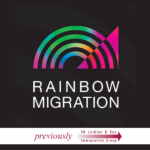 Supports LGBTQI+ people through the asylum and immigration system. Its vision is a world where there is equality, dignity, respect and safety for all people in the expression of their sexual or gender identity.
Supports LGBTQI+ people through the asylum and immigration system. Its vision is a world where there is equality, dignity, respect and safety for all people in the expression of their sexual or gender identity.
Provides psychosocial and emotional support for LGBTQI+ people seeking asylum to help improve their confidence and self-esteem and reduce isolation. Also provides legal information and advice, and campaigns for improved treatment of people seeking asylum. Additionally, provides legal advice and information to LGBTQI+ people seeking to live in the UK with their partners.
Rainbow Migration020 7922 7811 Back to top
Micro Rainbow
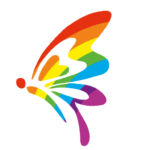 Micro Rainbow opened the first safe house in the United Kingdom dedicated solely to LGBTQI asylum seekers and refugees. Our houses provide a safe and temporary shelter for all LGBTQI asylum seekers and refugees. They are located in the London area, in the North West and in the West Midlands.
Micro Rainbow opened the first safe house in the United Kingdom dedicated solely to LGBTQI asylum seekers and refugees. Our houses provide a safe and temporary shelter for all LGBTQI asylum seekers and refugees. They are located in the London area, in the North West and in the West Midlands.
Kaleidoscope
 Established in 2011, Kaleidoscope Trust is a UK-based charity focused on fighting for the human rights of LGBT+ people across the Commonwealth.
Established in 2011, Kaleidoscope Trust is a UK-based charity focused on fighting for the human rights of LGBT+ people across the Commonwealth.
It funds, fights for and empowers those upholding the human rights of LGBT+ people by working with governments, change-makers and civil society organisations to effect meaningful and lasting change in the lives of LGBT+ people everywhere.
Kaleidoscope Back to topHoops and Loops
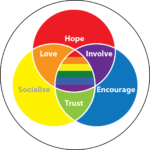 Hoops and Loops is a Support/Social group for LGBT+ asylum seekers and refugees. They were first set up by Displaced People In Action in 2015 and still has a few founder members in the group awaiting for their asylum decisions. They meet twice a month in a safe space, interacting with like-minded people and sharing stories with one another. During their monthly meet, they discuss upcoming court hearings, have movie nights, share experiences and support each other mentally.
Hoops and Loops is a Support/Social group for LGBT+ asylum seekers and refugees. They were first set up by Displaced People In Action in 2015 and still has a few founder members in the group awaiting for their asylum decisions. They meet twice a month in a safe space, interacting with like-minded people and sharing stories with one another. During their monthly meet, they discuss upcoming court hearings, have movie nights, share experiences and support each other mentally.
Free Movement
 Mission is to make good quality and clear information available to all those affected by immigration control: migrants themselves, their families, their lawyers and their judges. Immigration law has become very complex in the UK and changes very rapidly; Free Movement makes it simple, or at least understandable.
Mission is to make good quality and clear information available to all those affected by immigration control: migrants themselves, their families, their lawyers and their judges. Immigration law has become very complex in the UK and changes very rapidly; Free Movement makes it simple, or at least understandable.
Back to top
Stonewall
 Stonewall is a UK lesbian, gay, bisexual and transgender (LGBT) rights charity, founded in 1989 by activists campaigning against Section or Clause 28, and named after the Stonewall riots in New York City in 1969.
Stonewall is a UK lesbian, gay, bisexual and transgender (LGBT) rights charity, founded in 1989 by activists campaigning against Section or Clause 28, and named after the Stonewall riots in New York City in 1969.
“We’re here to let all lesbian, gay, bi and trans people, here and abroad, know they’re not alone. We believe we’re stronger united, so we partner with organisations that help us create real change for the better. We have laid deep foundations across Britain – in some of our greatest institutions – so our communities can continue to find ways to flourish, and individuals can reach their full potential. We’re here to support those who can’t yet be themselves. But our work is not finished yet. Not until everyone feels free to be who they are, wherever they are.”
Stonewall | Stonewall 192 St John Street, | London, EC1V 4JY | 020 7593 1850Stonewall Cymru | Stonewall Transport House, 1 Cathedral Road, Cardiff, CF11 9SB | 029 2023 774
Stonewall Scotland | Stonewall Mansfield Traquair Centre, 15 Mansfield Place, Edinburgh, EH3 6BB | 0131 474 8019
UK Workplace Equality Index
Participating employers of Stonewall’s UK Workplace Equality Index “demonstrate their work in 8 areas of employment policy and practice. Staff from across the organisation also complete an anonymous survey about their experiences of diversity and inclusion at work. Organisations then receive their scores, enabling them to understand what’s going well and where they need to focus their efforts, as well as see how they’ve performed in comparison with their sector and region.”
UCL becomes first university to formally cut ties with Stonewall | The Guardian | 21 Dec 2021
Stonewall is at centre of a toxic debate on trans rights and gender identity | The Guardian | 5 Jun 2021 Back to top
International lesbian, gay, bisexual, trans and intersex association (ILGA)
 ILGA World – the International Lesbian, Gay, Bisexual, Trans and Intersex Association – is a worldwide federation of more than 1,700 organisations from over 160 countries and territories campaigning for lesbian, gay, bisexual, trans and intersex human rights.
ILGA World – the International Lesbian, Gay, Bisexual, Trans and Intersex Association – is a worldwide federation of more than 1,700 organisations from over 160 countries and territories campaigning for lesbian, gay, bisexual, trans and intersex human rights.
ILGA EU | ILGA EU
ILGA World’s 2022 Annual Reports | ILGA
Maps and sexual orientation laws
Overview | ILGACriminalisation | ILGA
Protection | ILGA
Recognition | ILGA Back to top
Armed Conflict Location & Event Data Project (ACLED)
 The Armed Conflict Location & Event Data Project (ACLED) is a disaggregated data collection, analysis, and crisis mapping project. ACLED collects information on the dates, actors, locations, fatalities, and types of all reported political violence and protest events around the world.
The Armed Conflict Location & Event Data Project (ACLED) is a disaggregated data collection, analysis, and crisis mapping project. ACLED collects information on the dates, actors, locations, fatalities, and types of all reported political violence and protest events around the world.
The ACLED team conducts analysis to describe, explore, and test conflict scenarios, and makes both data and analysis open for free use by the public.
ACLED Back to topPeter Tatchell Foundation
 Seeks to promote and protect the human rights of individuals, communities and nations, in the UK and internationally, in accordance with established national and international human rights law.
Seeks to promote and protect the human rights of individuals, communities and nations, in the UK and internationally, in accordance with established national and international human rights law.
Seeks to raise awareness, understanding, protection and implementation of human rights, in the UK and worldwide. This involves research, education, advice, casework, publicity and advocacy for the enforcement and furtherance of human rights law. They have charitable objectives and provide public benefit.
Peter Tatchell Foundation | Peter Tatchell Foundation Back to topAmnesty International UK
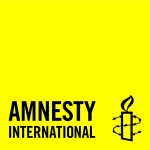 Amnesty International UK works to protect men, women and children wherever justice, freedom, truth and dignity are denied. As a global movement of over seven million people, Amnesty International is the world’s largest grassroots human rights organisation. It investigates and exposes abuses, educates and mobilises the public, and helps transform societies to create a safer, more just world. It has received the Nobel Peace Prize for its life-saving work.
Amnesty International UK works to protect men, women and children wherever justice, freedom, truth and dignity are denied. As a global movement of over seven million people, Amnesty International is the world’s largest grassroots human rights organisation. It investigates and exposes abuses, educates and mobilises the public, and helps transform societies to create a safer, more just world. It has received the Nobel Peace Prize for its life-saving work.
We all have the right to be treated as equals, regardless of our gender identity or sexuality. But being lesbian, gay, bisexual, transsexual or intersex is a crime in many countries around the world.
LGBTI rights | Amnesty International Back to topHuman Rights Watch
 Human Rights Watch (HRW) is a non-profit, non-governmental human rights organisation made up of roughly 400 staff members around the globe. Its staff consists of human rights professionals including country experts, lawyers, journalists, and academics of diverse backgrounds and nationalities. Established in 1978, HRW is known for its accurate fact-finding, impartial reporting, effective use of media, and targeted advocacy, often in partnership with local human rights groups. Each year, HRW publishes more than 100 reports and briefings on human rights conditions in some 90 countries, generating extensive coverage in local and international media.
Human Rights Watch (HRW) is a non-profit, non-governmental human rights organisation made up of roughly 400 staff members around the globe. Its staff consists of human rights professionals including country experts, lawyers, journalists, and academics of diverse backgrounds and nationalities. Established in 1978, HRW is known for its accurate fact-finding, impartial reporting, effective use of media, and targeted advocacy, often in partnership with local human rights groups. Each year, HRW publishes more than 100 reports and briefings on human rights conditions in some 90 countries, generating extensive coverage in local and international media.
Equaldex
 Collaborative knowledge base for the LGBT (lesbian, gay, bisexual, transgender) movement. The site aims to crowdsource every law related to LGBT rights to provide a comprehensive and global view of the LGBT rights movement.
Collaborative knowledge base for the LGBT (lesbian, gay, bisexual, transgender) movement. The site aims to crowdsource every law related to LGBT rights to provide a comprehensive and global view of the LGBT rights movement.
Back to top
Rainbow Europe
Rainbow Europe brings together both the legal index of LGBTI equality based on our Rainbow Europe Map and an overview of the social climate for LGBTI people in each country based on its Annual Review of the Human Rights Situation of Lesbian, Gay, Bisexual, Trans and Intersex People. Ranks all 49 European countries on a scale between 0% (gross violations of human rights, discrimination) and 100% (respect of human rights, full equality). Countries ranked on the basis of laws and policies that have a direct impact on the LGBTI people’s human rights in under 6 categories: equality and non-discrimination; family; hate crime and hate speech; legal gender recognition and bodily integrity; civil society space; and asylum.
Rainbow Europe Back to topHuman Dignity Trust
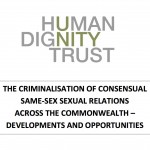 The goal of the Human Dignity Trust is to ensure that international human rights laws which prohibit the criminalisation of private consensual same-sex sexual conduct are respected and applied across the world so that people’s human dignity, privacy and equality are not violated.
The goal of the Human Dignity Trust is to ensure that international human rights laws which prohibit the criminalisation of private consensual same-sex sexual conduct are respected and applied across the world so that people’s human dignity, privacy and equality are not violated.
The Trust does not campaign; it works using international law and plans to facilitate test case litigation in those jurisdictions that continue to criminalise homosexuality.
At any one time we aim to have between 5 and 10 cases before national courts and international tribunals. This work is endorsed by many of the world´s leading human rights lawyers and jurists, some of whom are involved as our patrons, trustees and supporters.
Human Dignity Trust | Human Dignity Trust Back to topGlobal Voices
 Border-less, largely volunteer community of more than 1,400 writers, analysts, on-line media experts, and translators. It curates, verifies and translates trending news and stories that you might be missing on the Internet, from blogs, independent press and social media in 167 countries. Many of the world’s most interesting and important stories aren’t in just one place. Sometimes they’re scattered in bits and pieces across the Internet, in blog posts and tweets, and in multiple languages. These are the stories on which Global Voices accurately report, and translate into more than 40 languages.
Border-less, largely volunteer community of more than 1,400 writers, analysts, on-line media experts, and translators. It curates, verifies and translates trending news and stories that you might be missing on the Internet, from blogs, independent press and social media in 167 countries. Many of the world’s most interesting and important stories aren’t in just one place. Sometimes they’re scattered in bits and pieces across the Internet, in blog posts and tweets, and in multiple languages. These are the stories on which Global Voices accurately report, and translate into more than 40 languages.
Ukraine
 Since the fall of the USSR and Ukraine’s independence in 1991, the Ukrainian LGBT+ community has become increasingly visible, better organised politically, and organising several LGBT events though some of these have been blighted by violent attacks by nationalist groups.
Since the fall of the USSR and Ukraine’s independence in 1991, the Ukrainian LGBT+ community has become increasingly visible, better organised politically, and organising several LGBT events though some of these have been blighted by violent attacks by nationalist groups.
Same-sex sexual activity between consenting adults (in private) is legal in Ukraine. However, the climate generally is intolerant of LGBT people and same-sex couples are not eligible for the same legal protections available to their heterosexual counterparts, for example. In June 2018, the Ukraine justice ministry said that there are no legal grounds in Ukraine currently for same-sex marriage. Also, adoption is illegal while conversion therapy is not banned. Ironically though, it is legal to serve in the military.
Summarising its 2021 review, ILGA says that anti-LGBT hate speech and hate crimes continued to be a severe issue though the Ministry of the Interior finally introduced a bill in May to criminalise hate crimes committed on the grounds of, inter alia (among other things), “sexual orientation and gender identity.” A survey found that 80% of LGBT students feel unsafe in school and 87% feel excluded. Just in the month preceding the survey, 40% of LGBT students missed school because they feared for their safety. Several events and demonstrations were disturbed and attacked again this year. In May, extremists raided an LGBT+ film screening, broke windows and threw tear gas into the premises. Other events were also attacked in Kyiv and Odesa. Far-right members of Tradition and Order threw bottles and held a counter-demonstration against the LGBTQ+ rave on 4 August in Kyiv.
However, there have been a few steps forward:
- In February, the Public Health Centre of the Ministry of Health opened a tender for research into behaviours of ‘homosexual’ and bisexual men to inform HIV prevention programmes
- In April, the Ministry of Health removed blood donation restrictions on people “who have homosexual contacts”. The new regulations focus on ‘risky behaviour’ instead of risk groups
- In November, the Ministry of Health agreed to continue cooperation to improve trans healthcare as part of efforts to implement ICD-11 (International Classification of Diseases 11th Revision. The global standard for diagnostic health information)
LGBT rights in Ukraine | Equaldex
Ukraine | ILGA Europe (Review: Jan-Dec 2021)
Ukraine | Rainbow Europe “Nash Mir” (Our World) Gay and Lesbian Centre
Selection of news and articles
KyivPride: Thousands march in Ukraine Pride in Liverpool | BBC News | 29 Jul 2023War brings urgency to fight for LGBT rights in Ukraine | The Guardian | 5 Jun 2023
Eurovision 2023: Contest inspires Ukraine’s LGBT troops | BBC News | 20 Apr 2023
A safe house in Poland offers LGBTQ Ukrainians sanctuary from Russian bombs | Insider | 29 Mar 2022
‘I will not be held prisoner’: the trans women turned back at Ukraine’s borders | The Guardian | 22 Mar 2022
Gay rights activist among latest known victims of Ukraine war | The Guardian | 18 Mar 2022
Derbyshire couple offer home to Ukrainian LGBT refugees | BBC News | 16 Mar 2022
Gay dating app asks users to help Ukrainians and is blown away by response | Queerty* | 4 Mar 2022
Ukrainian queer teen explains why he won’t flee despite terrifying war: ‘I want to be free’ | Pink News | 1 Mar 2022
Russian soldiers captured after being found hiding in basement by Ukraine LGBT+ activists | Pink News | 1 Mar 2022
Ruthless warlord who led ‘gay purges’ in Chechnya killed fighting for Russia in Ukraine | The Mirror | 1 Mar 2022
Ukrainian LGBTQ activists fought & captured a group of Russian soldiers | LGBTQ Nation | 28 Feb 2022
LGBT+ rights and issues in Europe | House of Commons Library | 28 Feb 2022
LGBT Activists Capture Hiding Russian Soldiers | Star Observer (Australia) | 28 Feb 2022
LGBT rights in eastern Europe: explaining financial benefits makes a big difference to people’s views – new findings | The Conversation | 9 Feb 2022
LGBT+ Ukrainians are ready to fight for their freedom if Russia invades: ‘We love our country’ | Pink News | 29 Jan 2022 Thousands March For LGBT Rights In Ukraine | Radio Free Europe | 19 Sep 2021
President of Ukraine vows to fight for LGBT+ equality after Joe Biden meeting | Pink News | 2 Sep 2021
Protecting LGBT people against hate crimes in Ukraine | Council of Europe | 22 Feb 2021
Ukraine’s LGBT+ war veterans boost battle for equality | Reuters | 17 Feb 2020 Ukraine’s first-ever LGBT shelter forced to close after running out of money | Pink News | 19 Oct 2019
Former volunteer Ukrainian soldier challenges LGBT taboos | BBC News | 17 Jan 2019 Situation of LGBT People in Ukraine | LGBT Human Rights NASH MIR Center | 2013 A study of the world’s most popular countries for LGBTQ+ travel reveals the good, the average and the ugly | Asher & Lyric
Travel writing, research, TV, radio, and podcast interviews. Ranked 81, Ukraine scores a D+ Problems ahead for LGBT+ Ukrainians if Russia invades | VOA News | 12 Feb 2022 | 3m 17s
What Ukrainians think about LGBT? | 13 Oct 2019 | 4m 19s
Ukraine hosts largest ever gay pride parade | Euro News | 23 Jun 2019 | 45s
Same sex unions in Ukraine | UATV English | 22 Jun 2019 | 2m 17s
Ukrainian soldier: ‘I couldn’t say I was gay’ | BBC News | 18 Jan 2019 | 1m 50s
Ukraine travel safety tips – war, racism, sexism, LGBT+ | Alina Mcleod | 19 Nov 2018 | 12m 58s Back to top
Chechnya
 LGBT rights in Russia | Wikipedia
LGBT rights in Russia | Wikipedia
Gay concentration camps in Chechnya | Wikipedia
Russian-Speaking American LGBT Group | Russian-Speaking American LGBT Group
Russian LGBT Network | Russian LGBT Network
“Spasibo” is a response to homophobic laws in Russia which came into force the 17 of March 2012 in Saint Petersbourg. Since then, the laws are extended across Russia. The film received the Special Prize for human rights at the Cinema and Human Rights Film Festival, Amnesty International, Paris 2012. A new film brings Chechnya’s horrific anti-gay purge to the screen | Human Rights Watch | 28 Jan 2020
Chechnya LGBT: Dozens ‘detained in new gay purge’ | BBC | 14 Jan 2019
Zelim Bakaev the Face of Chechnya’s Anti-Gay Purge | Huff Post, C L Frederick | 2 Nov 2017
Trump follows Russia’s lead on LGBT hostility | The Advocate | 31 Jul 2017
Russian ‘gay propaganda’ law ruled discriminatory by European court | The Guardian | 20 Jun 2017
Russia: Anti-Gay Purge in Chechnya | Human Rights Watch | 26 May 2017
Russian LGBT Network claims to have saved 42 Chechen gay men | Huff Post | 11 May 2017
Chechen police ‘kidnap and torture gay men’ – LGBT activists | BBC News | 11 Apr 2017
Gay crisis in Chechnya | Huff Post | 10 Apr 2017 Stop anti-gay attacks in Chechnya | Human Rights Watch | 2 May 2017 | 1m 55s
LGBT survivors of torture in Chechnya speak out | France 24 | 26 Apr 2017 | 10m 3s
LGBTI executions in Russia’s Chechnya, explained | Громадське Телебачення | 9 Apr 2017 | 11m 48s Back to top
Partial decriminalisation of homosexuality
2017 marked 50 years since the partial decriminalisation of homosexuality which some might regard as a blip within the timeline of LGBT+ history in the United Kingdom which can be traced back to Roman times.
Depending which decade you were born into, it’s likely you will view the 50th milestone differently. Some are ‘grateful, others ‘remembered’ while others still ‘marked’ and ‘celebrated’. However, Owen Jones’s piece “Hatred of LGBTQ people still infects society. It’s no time to celebrate” is also on point.
On the back of legal equality, an equal age of consent for sex, civil partnerships, and gay marriage it’s not difficult to think that the battles have been won. They are not and, without throwing the non-binary baby out with the bath water, we would do well to remember this.
“Anger, searing fury, not gratitude: that’s how the 50th anniversary of the partial decriminalisation of homosexuality in England and Wales should be marked. That we are no longer legally persecuted in this country – and that we are less hated and judged than we were – is not something to be thankful for. Gaining treatment others take for granted is not some special gift: equality is not a privilege.
Gratitude implies that the state eventually buckling to the demands of LGBTQ people represented some sort of sacrifice on the part of our persecutors. Legal rights were won by LGBTQ people who were spat at, reviled by the press, demonised by large swaths of the public, persecuted by the law, incarcerated, chemically castrated and driven to suicide.”
Hatred of LGBTQ people still infects society. It’s no time to celebrate | Owen Jones | The Guardian | 27 Jul 2017
History of LGBT rights in the UK: A long road to equality | Kings College London | 28 Jul 2017 | 2m 11s
LGBT rights in the United Kingdom | Wikipedia Decriminalisation of homosexuality: History of gay rights in the UK | BBC
Buggery, bribery and a committee: the story of how gay sex was decriminalised in Britain | The Conversation | 20 Dec 2017
Homosexuality was decriminalised 50 years ago. But what happened next? | The Guardian | 27 Jul 2017
Hatred of LGBTQ people still infects society. It’s no time to celebrate | The Guardian | 27 Jul 2017
Out on the screen: 50 years of queer cinema in Britain | The Conversation | 26 Jul 2017
Fifty years of gay rights but some in the British media are peddling the same homophobia | The Conversation | 25 Jul 2017 Timeline of LGBT history in the United Kingdom | Wikipedia
Wolfenden Report | The National Archives
Sexual Offences Act 1967 | The National Archives Back to top
Age of consent
 The age of consent in England, Wales, Scotland and Northern Ireland is 16 regardless of sexual orientation or gender. The age of consent in Ireland is 17. The age of consent in other EU countries varies.
The age of consent in England, Wales, Scotland and Northern Ireland is 16 regardless of sexual orientation or gender. The age of consent in Ireland is 17. The age of consent in other EU countries varies.
It’s barely been 50 years since the Sexual Offences Act (1967) decriminalised sex between two consenting males, as long as those involved were aged 21 or over.
Ages of consent in Europe | WikipediaAge of Consent | Bronski BeatBack to topBy 1984, many European countries had reduced the age of consent for homosexual acts to 16, but it remained at 21 in the United Kingdom. Having only been decriminalised in 1967, the wording of the legislation to decriminalise also included wording that placed restrictions such as making illegal the use of a hotel room for sex. Against this background, the Age of Consent was a seminal and debut album by Bronski Beat (Steve Bronski, Larry Steinbachek and Jimmy Somerville) released on London Records on 15 October 1984.
On the cusp of the AIDS epidemic, Jimmy Sommerville appearing in Top Of The Pops 1984 was a light in a dark time for gay rights with Section 28 of the Local Government Act 1988 passed a few years later. It stated that a local authority “shall not intentionally promote homosexuality or publish material with the intention of promoting homosexuality” or “promote the teaching in any maintained school of the acceptability of homosexuality as a pretended family relationship”.
Smalltown Boy from Age of Consent | Bronski Beat
Tell Me Why from Age of Consent | Bronski Beat
I Feel Love Jimmy Somerville and Marc Almond
Section or Clause 28
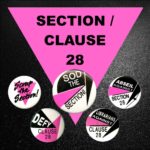 Section 28 was an amendment to the Local Government Act which stated that a local authority
Section 28 was an amendment to the Local Government Act which stated that a local authority
“shall not intentionally promote homosexuality or publish material with the intention of promoting homosexuality” or “promote the teaching in any maintained school of the acceptability of homosexuality as a pretended family relationship”.
The amendment was enacted on 24 May 1988 by Margaret Thatcher’s government.
It is widely considered to be one of the most pernicious and harming pieces of legislation to be passed by a UK government in recent decades, affecting the lives of LGBT people up and down the country and those charged with their care and education.
pernicious adjective
1. causing insidious harm or ruin; ruinous; injurious; hurtful: pernicious teachings; a pernicious lie.
2. deadly; fatal: a pernicious disease.
3. evil; wicked.
No one was ever prosecuted under this provision of the law, but it was always enforced. Its name represents the clause number it once held in the 1988 local government act. It was a Margaret Thatcher’s sop to her homophobic backbenchers as her long prime ministership droned on and the neo-Conservative wing of her party became jittery.
It sought to ban local authorities from ‘promoting homosexuality’ as an equal lifestyle. Because it was poorly written, people were unclear if it included local authority schools, young clubs and support services. Whether the legislation meant to include these local services or not, to all intents and purposes it did, and the affects where disastrous.
The legislation was used by many to not just avoid talking about lesbian, gay, bisexual and trans people in the curriculum, but also as an excuse for homophobic and transphobic bullying. It was used to discipline LGBT people in education and hound teachers – ‘out’ or otherwise – out of the classroom altogether.
We should never forget the pain caused by Section 28 | Huff Post | 25 May 2018
In February 2000, the first attempted legislation to repeal Section 28 was introduced by the Labour Government as part of the Local Government Act 2000, but was defeated by a House of Lords campaign led by Baroness Young. Then Shadow Education Secretary and future Prime Minister of the United Kingdom Theresa May called the defeat “a victory for commonsense”.
Section 28 was finally repealed on 21 June 2000 in Scotland and on 18 November 2003 in the rest of the United Kingdom.
Section 28 | Wikipedia
What is Section 28? | Pink News | 23 May 2018 | 4m 36s
Section 28: What was it and how did it affect LGBT+ people? | BBC | 1 Nov 2019
We should never forget the pain caused by Section 28 | Huff Post | 25 May 2018
What was Section 28? The history of the homophobic legislation 30 years on | Pink News | 24 May 2018
Section 28 protesters 30 years on: ‘We were arrested and put in a cell up by Big Ben’ | The Guardian | 27 Mar 2018
Section 28 gone … but not forgotten | The Guardian | 17 Nov 2013
18 November 2003: Section 28 bites the dust | Stonewall | 18 Nov 2003
Section 28 to be repealed | BBC | 18 Sep 2003 Outrageous! The Story of Section 28 and Britain’s Battle for LGBT Education | Paul Baker | Reaktion Books Back to top
No Outsiders
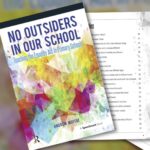 The No Outsiders project was created by Andrew Moffat to teach children about the Equality Act 2010 and British values and for pupils to “be proud of who they are while recognising and celebrating difference and diversity”. In 2014, the project was piloted at Parkfield School, Birmimgham and, shortly afterwards, adopted by schools across the country.
The No Outsiders project was created by Andrew Moffat to teach children about the Equality Act 2010 and British values and for pupils to “be proud of who they are while recognising and celebrating difference and diversity”. In 2014, the project was piloted at Parkfield School, Birmimgham and, shortly afterwards, adopted by schools across the country.
In January 2019 a petition was started claiming the project’s teaching went against the Islamic faith. Meetings took place with concerned parents which broke down. Shortly afterwards, parents began protesting outside the school and several pupils were also kept at home. Protests then spread to other schools in Birmingham.
LGBT teaching an abomination, Jewish judge says | BBC | 15 Nov 2019“To its credit, the government has spoken out in defence of LGBT+ inclusive lessons – but it hasn’t backed this up with explicit, concrete guidance to schools about what they can and should do,” says the veteran gay rights campaigner. With religious extremists trying to “hijack the issue”, a culture of fear around mentioning LGBT orientation has sprung up. “Many teachers are left feeling very uncertain about what they are required to do or what they’re allowed to do or say.”
Fear of LGBT-inclusive lessons harks back to 80s, says Peter Tatchell | The Guardian | 28 May 2018
‘We can’t give in’: the Birmingham school on the frontline of anti-LGBT protests | The Guardian | 26 May 2019
Birmingham LGBT teaching row: How did it unfold? | BBC | 22 May 2019
LGBT school lessons row shows homophobia is alive and well in the UK | The Conversation | 3 Apr 2019
School LGBT teaching row: what is in the No Outsiders books that sparked protests? | BBC | 1 Apr 2019
Parkfield school head hits back at ‘ridiculous’ LGBT lesson claims | Pink News | 27 Mar 2019
Four more Birmingham schools have cancelled LGBT+ lessons over ‘No Outsiders’ row | HuffPost | 22 Mar 2019
Parents complain to Manchester schools about LGBT lessons | The Guardian | 19 Mar 2019
Faith should be no barrier to schools teaching respect for LGBT rights | The Guardian | 4 Feb 2019
School defends LGBT lessons after religious parents complain | The Guardian | 31 Jan 2019
Stances of faiths on LGBTQ issues: Islam – Sunni and Shi’a | Human Rights Campaign
Coming out as an LGBT Muslim | Reaching Out The Qur’an, the Bible and homosexuality in Islam | The Conversation | 16 Jun 2019 Back to top
Faith and religion
Faith and religion
 Homosexuality and religion | Wikipedia
Homosexuality and religion | Wikipedia
Religion and LGBT people | Wikipedia
Attitudes towards gay rights | British Religion in Numbers | Jan 2017
Ranking religions on acceptance of homosexuality… | Religion News Service | Jun 2015
Homosexuality and Religion | SexInfo Online (US)
The Global Divide on Homosexuality | Pew Research Center (US) | Jun 2014
Religion and being gay | Being Gay Is OK
Around the world
List of religious populations | WikipediaHow people around the world view religion’s role in their countries | Pew Research Center | 2019
The Global Religious Landscape | Pew Research Center | 2012
Organisations and networks
European Forum of LGBT Christian Groups | European Forum of LGBT Christian GroupsEcumenical association of LGBT Christian Groups in Europe
ILGA (International Lesbian, Gay, Bisexual, Trans and Intersex Association) | ILGA
World federation of national and local organisations dedicated to achieving equal rights for lesbian, gay, bisexual, trans and intersex (LGBTI) people.
Inclusive and Affirming Ministries (IAM) | IAM
Vision of faith communities in Africa that are welcoming and affirming; where LGBT people can participate fully and be strengthened in their spiritual, psychological and sexual identity as human beings.
Metropolitan Community Churches | Metropolitan Community Churches
Inclusive denomination with a network of affiliated churches worldwide. Their website contains a comprehensive database of contact details for inclusive churches in every region of the world.
News, articles and resources
Top cardinal calls for drastic overhaul of Catholic Church’s teaching on homosexuality | Pink News | 5 Feb 2022Gay kiss in Creme egg advert was deemed so offensive 20,000 religious people signed a petition | Metro | 18 Feb 2021
UK churches urged to wake up to spiritual abuse of LGBT people | The Guardian | 17 Oct 2020
Using the Bible against LGBTQ+ people is an abuse of scripture | The Conversation | 28 Jan 2020
LGBT people are ‘being made homeless due to religion’ | BBC | 30 Jul 2019
Religious freedom laws are ‘harming LGBT people,’ says Human Rights Watch | Pink News | 20 Feb 2018
Muslims, Jews, and Christians on being LGBT and believing in God | The Independent | 5 Apr 2017
LGBTpeople of faith: why are they staying? | Advocate | 17 Sep 2015
What does the Bible actually say about being gay? | BBC | 23 Oct 2003
Films
Morning Announcements | Brad Etter | 1 Nov 2015 | 9m 17sGay man goes undercover to expose conversion therapy | ImFromDriftwood | 27 Feb 2018 | 7m 47m
Gay = Sin | Matthew Brown | 8 May 2009 | 4m 23s
“The Catholic Church is a Force for Good in the World” Debate | Intelligence Squared | 21 Oct 2009
For the motion: Ann Widdecombe | Clip starts at 14m40s
Against the motion: Stephen Fry | Clip starts at 21m01s
Churches, organisations and groups
Jewish LGBT+ Group (formerly JGLG)
Founded in 1972, the longest established Jewish LGBT group in the world. Membership is open to Jewish men and women who are lesbian, gay, bisexual or transgender including people from many different backgrounds. Primarily a social rather than religious group, and most of its religious events tend to follow Progressive/Reform traditions, although there are members from all branches of Judaism.
Jewish LGBT+ Group (formerly JGLG)
House of Rainbow, Stratford
Fosters relationships among black, Asian, minority ethnic (BAME), lesbian, gay, bisexual, transgender, intersex, Queer (LGBTIQ+) individuals, people of faith and allies in order to create a safer and a more inclusive community. As a support organisation, it is dedicated to reconciling marginalised identifies with the pressures of society.
House of Rainbow
House of Rainbow
St John’s Church, Waterloo
St John’s believes that God is love and that life-long, faithful, stable same-sex relationships, and the relationships of those who undergo gender transition should be celebrated by the Church of England. St John’s is an active member of Inclusive Church and is committed to working for full acceptance and inclusion, as well as equal marriage rights, of all LGBTI people within the Church of England.
St John’s Church, Waterloo
MCC North London, Camden
Strives to be a passionately open, active and Spirit-led Christian faith community. Whilst founded in the LGBT community, the church is open to everyone. MCCNL invites you to come as you are – you don’t have to pretend to be more or less than yourself here.
MCC North London, Camden
Quaker Gender and Sexual Diversity Community
“Fellowship of LGBTI+ people within the Religious Society of Friends (Quakers) in Britain. Welcome people seeking an inclusive spiritual home within Quakers.”
Quaker Gender and Sexual Diversity Community
Hidayah
Queer Muslim charity to provide support and welfare for LGBTQI+ Muslims and promote social justice and education about our community to counter discrimination, prejudice and injustice.
Hidayah
Inclusive Church
“Network of churches, groups and individuals uniting together around a shared vision.”
Inclusive Church
One Body One Faith
“Dynamic grassroots charity that enables LGBT+ Christians and advocates for change within the church, ecumenically and intentionally in partnership with likeminded organisations.”
One Body One Faith
The Unitarians
“Building open-minded, loving, spiritually-grounded communities – and have been for 300 years. You are welcome here.”
The Unitarians
London Queer Muslims
02/12/22 Website currently unavailable: “We’re taking a short break to refurbish our website, thank you for your patience.”
London Queer Muslims
Two23
“Network of Christians, connected by LGBT (Lesbian, gay, bisexual and transgender) issues, who have discovered that God loves us just as we are.”
Two23
The Sibyls
Christian Transgender Group organising “online services to worship together, and online informal chat and sharing get-togethers. This enables people from all parts of the country to join together.”
Sibyls
KeshetUK
Mission to ensure that Jewish LGBT+ people and their families are included throughout Jewish life in the UK
KeschUK
Sabat (LGBT+ Sikhs)
Creates awareness, tackles homophobia/ biphobia/ transphobia and builds bridges within and beyond our communities.
Sabat
The Inclusive Mosque
Establishing a place of worship for the promotion and practice of inclusive mosque space
The Inclusive Mosque
Conversion therapy
Conversion therapy
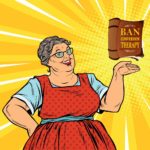 Conversion therapy is any form of so-called treatment which attempts to change sexual orientation or reduce attraction to others of the same sex. It is a pseudoscientific practice based on a theory and assumptions that being lesbian, gay, bi or trans is a mental illness that can be cured. Conversion therapy promotes the notion or belief that there is something wrong with being LGBT+ in the first place which there is not.
Conversion therapy is any form of so-called treatment which attempts to change sexual orientation or reduce attraction to others of the same sex. It is a pseudoscientific practice based on a theory and assumptions that being lesbian, gay, bi or trans is a mental illness that can be cured. Conversion therapy promotes the notion or belief that there is something wrong with being LGBT+ in the first place which there is not.
No one should be told their identity is something that can be changed or cured.
- In the UK, all major counselling and psychotherapy bodies, as well as the NHS, have concluded that conversion therapy is dangerous and have condemned it
- Facebook and Instagram have banned the promotion of conversion therapy in ads
- More than 370 religious leaders from around the world called for a ban
Origins of conversion therapy
In 1899, German psychiatrist Albert von Schrenck-Notzing announced at the first International of Hypnotism conference that he had turned a gay man straight. He reported that his homosexual patient required 45 hypnotic sessions over four months to reverse his homosexual desires. Little did he know, Albert had kicked off a phenomenon often referred to today as “conversion”, “reparative”, or “gay cure” therapy.
In 1920, Sigmund Freud wrote of a lesbian patient whose father wanted to see her converted to heterosexuality. Freud echoed modern psychologists by responding that changing sexual orientation was difficult and unlikely. Offering to see the woman, Freud later broke off the therapy due to her hostility. In 1935, Freud went even further, writing to a woman who wanted her homosexual son converted that homosexuality “is nothing to be ashamed of, no vice, no degradation; it cannot be classified as an illness.”
Because conversion therapy is not a mainstream psychological treatment, there are no professional standards or guidelines for how it is conducted. Early treatments in the 1960s and 70s included aversion therapy, such as shocking patients or giving them nausea-inducing drugs while showing them same-sex erotica, according to a 2004 article in the British Medical Journal.
Evidence
It’s difficult to find ANY reliable evidence that sexual orientation can be changed and medical bodies warn that conversion therapy practices are ineffective and seriously harmful. Nevertheless, its advocates provide anecdotal reports and stories of so-called “ex-gays” claiming some (a degree) of success in becoming heterosexual.
In the US, Joseph Nicolosi, Sr (now deceased) claimed to have “assisted hundreds of clients with their goal to reduce their same-sex attractions and explore their heterosexual potential.” Thankfully, no one as high profile in the UK has done likewise but it would be foolish to think that the dark art of conversion therapy has been eradicated here.
Government’s journey to banning conversation therapy
Both Theresa May and Boris Johnson promised to ban conversion therapy though many argue the UK government is dragging its feet. The campaign to ban conversion therapy is being stepped up and in March 2021, Equalities Minister Liz Truss said the government will bring forward plans to ban gay conversion therapy “shortly”. Define shortly?
Liz Truss promises ban on gay conversion therapy | BBC News | 12 Mar 2021
The ban for England and Wales was announced in the Mat 2021 Queen’s Speech – but it will be preceded by a consultation. It will consider religious freedoms and how to protect accredited professionals in a move welcomed by some groups. Jayne Ozanne, a former government equality adviser who underwent conversion therapy, agrees.”We’ve had three years of talking,” she said. “What we really need is action that will protect young and old LGBT people right now, not this Groundhog Day of constantly being told that we’re going to consult and listen.”
Conversion therapy ban: Campaigners dismayed over delay | BBC News | 12 May 2021
Government U-turn (March 2022)
In an ITV News exclusive, on 31 March 2022, the government abandons its pledge to ban so-called conversion therapy, according to a leaked document shared with ITV News. The briefing is titled “Conversion Therapy Handling Plan” and admits that there will be a “noisy backlash from LGBT groups and some parliamentarians when we announce we do not intend to proceed.” But the Downing Street document seen by ITV News states: “The PM has agreed we should not move forward with legislation to ban LGBT conversion therapy.”
Exclusive: Government ditches ban on conversion therapy, according to leaked document | ITV News | 31 March 2022 | 9:45pm
However, two hours later, ITV News reports “Gay conversion therapy will be scrapped in government U-turn after ITV News report.” The articles goes on to say “Boris Johnson has been forced to stage a hasty U-turn after an announcement that ministers were abandoning plans to ban conversion therapy sparked a furious backlash. But the “new plans will only apply to gay – and not trans – conversion therapy, ITV News understands.”
Gay conversion therapy will be scrapped in government U-turn after ITV News report | 1 Apr 2022 | 12:18am
LGBT+ organisations abandon the government’s ‘Safe To Be Me’ LGBT conference (April 2022)
Though the government has promised to ban conversion therapy, it has decided to exclude conversion therapy for transgender people. LGBT+ groups and sponsors are now withdrawing from the government’s ‘Safe To Be Me’ conference scheduled for 29 June-1 July 2022, which coincides with the 50th anniversary of the first London Pride marches.
Stonewall and 80 groups pull out of government LGBT+ conference over conversion therapy failure | Pink News | 4 Apr 2022Conversion therapy ban: Over 100 groups quit government LGBT conference | BBC News | 4 Apr 2022
‘It’s a Mess’: Sponsors Pull Out of UK Government’s LGBTQ Conference | Vice | 31 Mar 2022
UK government to host its first global conference on LGBTQ+ rights | The Guardian | 16 May 2021
‘Safe To Be Me’ LGBT conference cancelled after boycott | BBC News | 5 Apr 2022
Labour and Tory MPs slam government for ‘sickening waste’ as LGBT+ conference cancelled amid furore | Pink News | 6 Apr 2022
LGBTQ+ conference cancelled over conversion practices furore | The Guardian | 5 Apr 2022 Statement on Safe To Be Me conference | Stonewall | 4 Apr 2022
An LGBT+ Sector As One: #BanConversionTherapy | LGBT+ Consortium | 4 Apr 2022
Conversion therapy ban not included in King’s Speech (November 2023)
It will come as no surprise to some that the government did not include a ban on conversion therapy in the King’s speech (7 November 2023). First promised in 2018 and despite multiple assurances and several prime ministers, it’s very unlikely the ban will become law before the next general election. The Equality and Human Rights Commission (EHRC) said they were “disappointed” and the government said they are “carefully considering” the issue. Jayne Ozanne, who chairs the Ban Conversion Therapy Coalition said “To break your flagship promise to a community that has seen a significant rise in hate crime is a total moral failure.” she continued “To do so after five years of posturing, with minimal engagement with victims of ‘conversion therapy’, shows just how callously the government treats LGBT+ lives.”
Conversion therapy ban not included in King’s Speech | BBC News | 7 Nov 2023
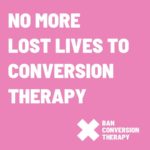 Sign the petition
Sign the petition
Ban Conversion Therapy was created in July 2020 calling on the UK Government to commit to a full legislative ban. A coalition of LGBT+ and faith communities and organisations, and mental health practitioners united in calling for the Government to Ban Conversion Therapy and support victims and survivors.
Petition: No more lost lives to conversion therapyMore
Conversion therapy | WikipediaGay conversion therapy | HuffPost
The lies and dangers of efforts to change sexual orientation or gender identity | Human Rights Campaign (US)
“David Matheson said he regrets perpetuating the idea that being gay is a disorder. “It is horrifying to think that I was part of a system that held people like me down,” he said. One of the leading figures of the controversial ‘gay cure’ therapy movement in America made headlines all around the world last week when he publicly came out as gay. In an exclusive interview with Channel 4 News, David Matheson, 57, admitted the practise which nearly 700,000 Americans have undergone, is not only built on a harmful philosophy, but should be banned.” Channel 4 News
‘Gay conversion therapist’ comes out: exclusive interview | Channel 4 | 31 Jan 2019 | 13m 17s
News
Conversion therapy ban to finally be debated in parliament – but not because of the government | Pink News | 10 Nov 2023Humanists UK welcomes Private Member’s Bill to ban conversion therapy | Humanists UK | 9 Nov 2023
Conversion therapy ban not included in King’s Speech | BBC News | 9 Nov 2023
Reported missing: ‘conversion therapy’ ban in King’s Speech | Humanists UK | 6 Nov 2023
LGBTQ conversion therapy ban will not be included in King’s Speech | Pink News | 6 Nov 2023
Government set to ditch conversion therapy ban after ‘intense’ lobbying by anti-trans MP | Pink News | 22 Oct 2023
Sunak to push ahead with delayed ban on gay and trans conversion practices | The Guardian | 19 Oct 2023
Conversion therapy: Equality watchdog calls for ban | BBC News | 18 Oct 2023
UK slams LGBTQ+ conversion therapy but no ban in sight | Openly | 20 Jul 2023
Tory MPs condemn delay to ban on LGBTQ+ conversion practices | The Guardian | 17 Jul 2023
Conversion therapy ban will be hard to police, says victim | BBC | 5 Mar 2023 ‘Safe To Be Me’ LGBT conference cancelled after boycott | BBC | 6 Apr 2022
Boris Johnson doubles down on excluding trans people from conversion therapy ban | Pink News | 6 Apr 2022
Boris Johnson backtracks over LGBT conversion practices ban after backlash | The Guardian | 31 Mar 2022
Stonewall and 80 groups pull out of government LGBT+ conference over conversion therapy failure | Pink News | 4 Apr 2022
BBC News – Conversion therapy: Government plans for ban scrapped | BBC | 1 Apr 2022
Gay conversion therapy will be scrapped in government U-turn after ITV News report | 1 Apr 2022 | 12:18am
Boris Johnson slammed for ‘despicable betrayal’ after dropping conversion therapy ban | Pink News | 31 Mar 2022
Exclusive: Government ditches ban on conversion therapy, according to leaked document | ITV News | 31 March 2022 | 9:45pm
New Zealand bans conversion practices in vote hailed as ‘win for humanity’ | The Guardian | 15 Feb 2022
Gay man recalls ‘terrifying’ exorcism in church basement: ‘I had to cancel my agreement with Satan’ | Pink News | 4 Feb 2022
Charting conversion therapy’s harrowing history – from its barbaric roots to present day cruelty | Pink News | 4 Feb 2022
France bans barbaric conversion therapy – no ifs or buts – while UK dithers and delays | Pink News | 26 Jan 2022
‘Gay gene’ testing apps aren’t just misleading – they’re dangerous | The Conversation | 25 Nov 2021
Ireland moves a step closer to long-awaited conversion therapy ban | Pink News | 31 Dec 2021
Banning conversion therapy | Closed consultation | Updated 9 December 2021 | GOV.UK
BBC News – Conversion therapy: MP warns of loophole in proposed ban | BBC | 26 Nov 2021
Does the government’s plan to allow ‘consensual’ conversion therapy undermine its proposed ban? | The Conversation | 2 Nov 2021
Human rights lawyers call on UK government to ban ‘conversion therapy’ | The Guardian | 1 Oct 2021
C of E bishop backs prosecution of those who defy ‘gay conversion’ ban | The Guardian | 9 Jun 2021
Forced marriage is an ‘evil’ form of conversion therapy – and it’s still happening today | Pink News | 24 Jun 2021
Why the ban on conversion therapy has to include religious groups | The Conversation | 25 May 2021
The double lives of gay men in China’s Hainan province | The Conversation | 11 Mar 2021
Three UK government LGBT advisers quit with rebuke of ‘ignorant’ ministers | The Guardian | 11 Mar 2021
Ministers ‘must quickly ban LGBT+ conversion therapy’ | BBC | 9 Mar 2021 Senior faith leaders call for global decriminalisation of LGBT+ people | The Guardian | 16 Dec 2020
Gay conversion therapy: Hundreds of religious leaders call for ban | BBC | 16 Dec 2020
Instagram and Facebook to block LGBT ‘conversion therapy’ services | BBC News | 9 Jul 2020
Charities backing ‘gay conversion therapy’ need to be investigated, say campaigners | Civil Society | 17 Jun 2020
Calls to ban LGBT ‘conversion therapy’ in UK | BBC News | 5 Jun 2020
UK’s first Chick-fil-A has closed for good after fierce backlash | Pink News | 30 Mar 2020
Utah becomes latest state to ban discredited LGBTQ ‘Conversion Therapy’ | 22 Jan 2020 ‘Cluck off’: UK’s only Chick-fil-A outlet to shut in LGBT rights row | The Guardian | 21 Oct 2019
The day I met a ‘gay conversion therapist’ | BBC | 16 Sep 2019
Google removes anti-gay ‘conversion therapy’ app after pressure from LGBT+ rights groups | The Independent | 29 Mar 2019 The cruel, dangerous reality of gay conversion therapy | Wired | 7 Jul 2018
UKCP actively campaigns against all forms of conversion therapy | UK Council for Psychotherapy | 4 Jul 2018
‘Global epidemic’ of LGBT conversion therapy | The Guardian | 8 Aug 2018
Proposed ban is a positive step but the battle remains to be won | The Conversation | 4 Jul 2018
What is gay conversion and is it legal? Here is everything you need to know about it | inews.co.uk | 3 July 2018
‘Gay conversion therapy’ to be banned as part of LGBT equality plan | BBC News | 3 July 2018
Will a UK ban on gay conversion therapy work? | NewStatesman | 2 July 2018
Gay conversion therapy’s disturbing 19th-century origins | History | 22 Jun 2018
10 ridiculous and laughable cures for homosexuality | 19 Aug 2014
Conversion therapy: she tried to make me ‘pray away the gay’ | The Guardian | 27 May 2011 What’s it like to have “gay conversion therapy”? | BBC Radio 4 | 3 Sep 2019 | 21m 13s Banning ‘gay cure’ therapies under the LGBT action plan | BBC News 24 | 5 Jul 2018 | 6m 7s
Is this the end for gay conversion therapy? | BBC Newsnight | 9 Apr 2015 | 5m 27s
Films
Boy erased | Trailer | 2018Latter days | Trailer | 2004 Back to top
Housing and homelessness support
I need help now
If you’re in immediate danger ALWAYS call the police
999 | Met Police (London)
National LGBT Domestic Violence Helpline
0300 999 5428/ 0800 999 5428 | GALOP
Trouble with drugs and the law
020 7324 2989 | Release
LGBT Switchboard
0800 0119 100 | LGBT Switchboard
Samaritans
116 123 | Samaritans
Next Meal (food and support 24/7 in London)
Next Meal | Next Meal
StreetLink
Concerned about someone sleeping rough? Get in touch so that we can help connect them to local services. Visit www.streetlink.org.uk or call 0300 500 0914 to send an alert. Please note we cannot take referrals via social media.
StreetLink
StreetLink
If you are HOMELESS
Contact your local council. If you are calling out of office hours, use the emergency contact number on your council’s website. If there is no emergency service, contact your neighbouring council.
If you need a bed for the night
020 7939 1220 | Nightstop
020 7278 4224 | Alone in London
If you are concerned about someone sleeping rough
If you are concerned about someone sleeping rough in England or Wales, you can use this website to send an alert to StreetLink. The details you provide are sent to the local authority or outreach service for the area in which you have seen the person, to help them find the individual and connect them to support.
LGBT housing advice and support
020 7359 5767 | Stonewall Housing
Supports up to the age of 25 | Albert Kennedy Trust
London: 020 7831 6562
Manchester: 0161 228 3308
Newcastle: 0191 281 0099
Housing advice and support
0808 800 4444 | Shelter
03444 111 444 | Citizens Advice Bureau
LGBTI asylum seekers and refugees
https://microrainbow.org
Helpline for LGBTI asylum seekers and refugees | Micro Rainbow
020 3559 6490 | Wednesdays, 14:30 – 18:30
Information and referral service that provides LGBTI asylum seekers and refugees with information on housing or homelessness issues, social inclusion and moving on support for refugees.
Housing news and articles
Hundreds seek council help every day in UK youth homelessness crisis | The Guardian | 5 Nov 2023London Mayor Sadiq Khan announces LGBTQ+ homeless shelter funding | Attitude | 13 Jul 2023
Tackling the LGBTQ+ youth homelessness crisis | National Housing Federation | 13 Feb 2023
Rejected, abused and at risk: Why LGBTQ+ young people are more likely to face homelessness | 11 Jun 2022
Here are the charities leading the fight against LGBTQ+ homelessness in the UK | The Big Issue | 17 May 2022
Tackling the LGBTQ+ youth homelessness crisis | National Housing Federation | 18 Feb 2022
The LGBTQ Youth Homeless Crisis Is Worse Than We Feared | HuffPost | 14 Apr 2021
‘A game changer’. The UK’s first LGBTQ+ extra-care housing scheme gets go ahead | The Guardian | The Guardian | 21 Oct 2020
LGBT and homeless: ‘I was told to contact my abusive dad’ | BBC 3 | 9 Mar 2020
A BBC Three investigation has found that some local councils across England are asking young LGBT people who have been forced to leave home to obtain letters from their parents as “proof” that they’re homeless. Many parents in the UK would still take issue with having an LGBTQ child | Gay Times | 27 Nov 2019
How austerity targeted… the LGBTQ community | Huck Mag | 25 Nov 2019
LGBT people are ‘being made homeless due to religion’ | BBC News | 30 Jul 2019
‘LGBT shelter means I can be myself’ | BBC News | 2 May 2019
Why are so many young LGBT people in Britain homeless? | The Big Issue | 26 Jul 2017 Poverty and sexual orientation | PSE | 15 Jan 2014
Still out there: an exploration of LGBT Londoners’ unmet needs | Trust for London/ Anglia Ruskin University | 2014 Back to top
Housing
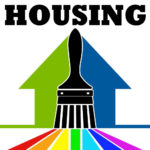 Whether we’re looking for a pad, a bijou flat, or a show home, most of us want a place we can call our own. It‘s where we eat, sleep, relax, invite friends and have sex so, in many ways, it’s the cornerstone of our lives. Even if we can find a place, the housing crisis (the responsibility of successive governments) often makes this both complicated and expensive.
Whether we’re looking for a pad, a bijou flat, or a show home, most of us want a place we can call our own. It‘s where we eat, sleep, relax, invite friends and have sex so, in many ways, it’s the cornerstone of our lives. Even if we can find a place, the housing crisis (the responsibility of successive governments) often makes this both complicated and expensive.
When we’re younger, we tend to move around but we still need a base but, as we get older, many of us want a home whether we’re by ourselves, living in a house or getting to grips with living with someone.
However, some of us are forced to leave the family home or find ourselves in vulnerable and/ or dangerous situations which is why LGBT+ organisations like the Albert Kennedy Trust and Stonewall Housing are needed today more than ever.
Housing and homelessness are complex (way above our pay-grade at MEN R US) so apart from some tips if you’re looking to rent we’ve pulled together details of specialist organisations who should be able to help if/ when you need it.
Extract from Making the private rented sector a safe space free from prejudice | The Guardian | 23 Oct 2012 Back to topStonewall Housing
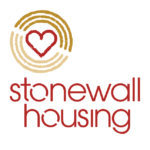 Supports thousands of lesbian, gay, bisexual, trans and queer (LGBTQ+) people in the UK every year.
Supports thousands of lesbian, gay, bisexual, trans and queer (LGBTQ+) people in the UK every year.
All of its services are free and confidential. If you’re LGBTQ+, facing or experiencing homelessness, or living in an unsafe home, please reach out to them today.
Helpline
Phone the Advice Line: 0800 6 404 404 | 10:00am – 13:00pm | Mon – FriOutside of these hours please complete their online referral form. Please remember to leave a contact phone number. No advice is given at the office address below without an appointment.
Advice services
Stonewall Housing gives advice about different housing-related issues to hundreds of lesbian, gay, bisexual and transgender (LGBT+) people every year. It understands what you, or your friends, might be experiencing. So if you need advice, contact them. You can phone them, or you can come along to one of their drop-in surgeries. Some of the housing issues include:
- if you’re homeless or at risk of becoming homeless
- if your relationship with your family has broken down because of your sexual orientation or gender identity
- if you’ve been victimised or harassed
- if you need to escape from domestic abuse
- if you need advice about a dispute with your landlord
- if you need advice with your housing benefits
Downloads and fact sheets
Stonewall Housing has a range of downloads and fact sheets.
Office
8 Coppergate House, 10 Whites Row, London E1 7NF0800 6 404 404
Stonewall Housing Back to top
The Outside Project
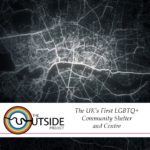 The Outside Project is a homeless/ crisis shelter and community centre in response to those within the LGBTIQ+ community who feel endangered, who are homeless, ‘hidden’ homeless and feel that they are on the outside of services due to historical and present prejudice in society and in their homes. The project is comprised of LGBTIQ+ colleagues, friends and activists who work in the homeless sector and have lived experiences of homelessness and the unique, complex issues the community faces.
The Outside Project is a homeless/ crisis shelter and community centre in response to those within the LGBTIQ+ community who feel endangered, who are homeless, ‘hidden’ homeless and feel that they are on the outside of services due to historical and present prejudice in society and in their homes. The project is comprised of LGBTIQ+ colleagues, friends and activists who work in the homeless sector and have lived experiences of homelessness and the unique, complex issues the community faces.
The LGBTIQ+ Centre is The Outside Project main HQ. We hold open and private meetings, groups and activities. It is home to multiple LGBTIQ+ and Homelessness grassroots groups that we work alongside or support to develop on a ‘PWYC’ basis. Please see the noticeboard for upcoming events and timetable below on regular weekly groups.
The Outside ProjectUnit 1, 52 Lant Street, London SE1 1RB | Map
The Outside Project
The Outside Project
Online referral form
This link takes you to the Stonewall Housing website with whom the Outside Project work closely.
Everything you need to know about the new London LGBTQ+ Community Centre | Time Out | 13 Jan 2022‘LGBT shelter means I can be myself‘ | BBC News | 2 May 2019
Sadiq Khan gives UK’s first LGBTIQ shelter a new home in a fire station | The Big Issue | 3 May 2019
The UK is set to gets its first permanent LGBT homeless shelter | Pink News | 6 Jul 2018 Back to top
Albert Kennedy Trust
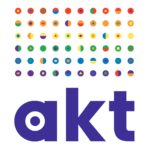 Supports up to the age of 25, who are (or think you might be) lesbian, gay, bisexual, trans or intersex, homeless, sofa-surfing or living in crisis and/ or living in a violent, hostile or abusive home.
Supports up to the age of 25, who are (or think you might be) lesbian, gay, bisexual, trans or intersex, homeless, sofa-surfing or living in crisis and/ or living in a violent, hostile or abusive home.
Albert Kennedy Trust is the national LGBT youth homelessness charity; focused on prevention and early action. It provides safe homes, mentoring, training, advocacy and support to young people who are homeless or living in a hostile environment after coming out to their parents, caregivers and peers.
Albert Kennedy Trust | Albert Kennedy TrustAlbert Kennedy Trust | Wikipedia
Offices in London, Manchester and Newcastle which are staffed from 10am – 4.30pm, Monday – Friday
London
48 The Chocolate Studios, 7 Sheperdess Place, London N1 7LJ
020 7831 6562
Albert Kennedy Trust
Manchester
5 Oak Street, Northern Quarter, Manchester M4 5JD
0161 228 3308
Albert Kennedy Trust
Newcastle
1 Osborne Road, Jesmond, Newcastle upon Tyne, NE2 2AA
0191 281 0099
Albert Kennedy Trust
Citizens Advice
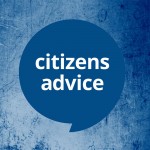 Citizens Advice aims to provide the advice people need for the problems they face and improve the policies and practices that affect people’s lives. It provides free, independent, confidential and impartial advice to everyone on their rights and responsibilities. Citizens Advice values diversity promotes equality and challenges discrimination.
Citizens Advice aims to provide the advice people need for the problems they face and improve the policies and practices that affect people’s lives. It provides free, independent, confidential and impartial advice to everyone on their rights and responsibilities. Citizens Advice values diversity promotes equality and challenges discrimination.
Webchat | Citizens Advice
Housing issues always arise, and therefore, you need to know your rights and responsibilities. You could also be threatened with eviction if you can’t cope with your mortgage payments. With these links to Citizens Advice pages, you can find information about how to go about renting or buying a home or just finding somewhere to live. You can also find advice on handling problems with your landlord and help to avoid losing your home.
Finding a place to live | Citizens AdviceRenting privately | Citizens Advice
Renting a home | Citizens Advice
Repairs in rented housing | Citizens Advice
Rent arrears | Citizens Advice
Discrimination in housing | Citizens Advice
Moving and improving your home | Citizens Advice
Problems where you live | Citizens Advice
Council tax | Citizens Advice
Mortgage problems | Citizens Advice Citizens Advice | Citizens Advice
Citizens Advice | Wikpedia Back to top
Shelter
 Shelter advice and support services across the UK give people one-to-one, personalised help with all of their housing issues. Its free emergency helpline is open 365 days a year and is often the first port of call for people facing a housing crisis.
Shelter advice and support services across the UK give people one-to-one, personalised help with all of their housing issues. Its free emergency helpline is open 365 days a year and is often the first port of call for people facing a housing crisis.
You can find expert information about everything from reclaiming your deposit to applying as homeless, and you can talk to an adviser over webchat. Its solicitors provide free legal advice and attend court to help people who’ve lost their homes or are facing eviction.
Shelter | ShelterShelter | Wikipedia
Helpline
Helpline | 0808 800 4444
Weekdays: 8am – 8pm | Weekends: 9am – 5pm. Open every day of the year.
Emergency helpline
If your situation is urgent you could call our emergency helpline if:
- You have nowhere to sleep, or might be homeless soon
- You have somewhere to sleep, but nowhere to call home
- You are/could be at risk of harm
- You feel very overwhelmed about your housing situation
This helpline gets busy, but you may be able to get emergency support from a housing adviser sooner.
Emergency helpline | 0808 1644 660Chat
Chat
9am-5pm, Monday to Friday
Find local services
Find local services
Shelter Youtube channel
Help with housing problems and housing advice
Shelter YouTube channel | Shelter
Information and advice on housing
Homelessness | ShelterEmergency/ temporary housing | Shelter
Private renting | Shelter
Tenancy deposits | Shelter
Repossession | Shelter
Eviction | Shelter
Repairs | Shelter
Housing benefit | Shelter
Council housing | Shelter Homelessness | Shelter
Emergency housing | Shelter
Who is eligible to apply for council housing? | Shelter
Costs of private renting | Shelter
Protecting your tenancy deposit | Shelter
Eviction with a Section 21 notice | Shelter
Responsibility for repairs | Shelter
Shelter template letters | Shelter Back to top
Nightstop
 Nightstop provides free overnight accommodation in the home of a volunteer. You get a private room, a hot meal and access to washing and laundry facilities. You can use the service for up to 3 weeks and may be housed with the same host or different hosts. Nightstop is for young people aged 16 to 25, who’ve become homeless suddenly and need a place to stay because, for example:
Nightstop provides free overnight accommodation in the home of a volunteer. You get a private room, a hot meal and access to washing and laundry facilities. You can use the service for up to 3 weeks and may be housed with the same host or different hosts. Nightstop is for young people aged 16 to 25, who’ve become homeless suddenly and need a place to stay because, for example:
- you’ve been kicked out of your home
- you’ve fallen out with a family member and are unable to stay with them
- you’re fleeing domestic abuse
Different nightstop schemes have different rules about who they’ll accept. For example, some will only accept applicants who don’t have a history of violent or anti-social behaviour, a drug or alcohol problem or a health problem they can’t support.
The first Nightstop opened in 1987 in Leeds and there is now a network of 33 Nightstops around the UK.
Nightstop | NightstopMain Office, Sherborne House, 34 Decima Street, London SE1 4QQ
020 7939 1220 Back to top
No place like home
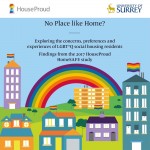 Despite changes in equality laws in recent years, Lesbian, Gay, Bisexual, Trans*, Queer and Questioning (LGBT*Q) people still face discrimination across a range of public services, including social housing. However, little is really known about the needs and views of LGBT*Q residents who live in housing provided by a housing association or local authority.
Despite changes in equality laws in recent years, Lesbian, Gay, Bisexual, Trans*, Queer and Questioning (LGBT*Q) people still face discrimination across a range of public services, including social housing. However, little is really known about the needs and views of LGBT*Q residents who live in housing provided by a housing association or local authority.
This study was conducted to find out, commissioned by HouseProud and conducted as HomeSAFE (secure, accessible, friendly, equal) by researchers from the University of Surrey and Goldsmiths, University of London. Over 260 people participated, through a survey, focus groups and interviews.
No place like home | University of Surrey | 2017Back to topSafety
Safety was a real concern for residents. 78% of survey respondents felt they lived in a safe neighbourhood. However, 32% felt their neighbourhood was not a safe place to live as an LGBT*Q person; this was 60% amongst trans* respondents. In interviews/focus groups people spoke of disturbing experiences of harassment and hate crime.Neighbours
This was an area of real concern for some residents. 34% of survey respondents were completely open with their neighbours about their sexual orientation, but 35% were not open at all. 36% reported that they were uncomfortable having neighbours in their home, a figure that rose to 91% for trans* individuals. Some residents spoke about harassment and abuse from neighbours, yet felt housing providers do not deal with it effectively.Operatives
21% of survey respondents reported that they were uncomfortable with repairs people entering their home and 24% their landlord.Self-censoring
Although a minority, a significant number of residents change their home environment in some way before people enter it to conceal their gender identity or sexuality. For example, moving pictures, books, DVDs. This was more common amongst gay men than other groups. 20% of gay men responded that they did this ‘always’ or ‘most of the time’ when being visited by their landlord or a repairs person. We found that women were less likely to let people into their home, but men were more likely to self-censor it. Overall, there is a strong degree of hypervigilance on the part of LGBT*Q residents.Extract courtesy of King, A., Stoneman, P and Sanders, F (2018) ‘No Place like Home? Exploring the concerns, preferences and experiences of LGBT*Q social housing residents. Findings from the 2017 HouseProud HomeSAFE study’. University of Surrey, Guildford.
ACORN
 Founded in Bristol in 2014, ACORN is a mass membership organisation and network of low-income people organising for a fairer deal for our communities.
Founded in Bristol in 2014, ACORN is a mass membership organisation and network of low-income people organising for a fairer deal for our communities.
“ACORN members believe we deserve good housing, good jobs, and good public services. We believe a better country is possible if we unite together. Alone our problems seem insurmountable, but together, we share the burden on thousands of shoulders – and together, we can win.”
ACORN members pledge:
- To organise and mobilise low and middle-income working-class constituencies to secure the essentials of a dignified and comfortable life by strengthening our communities and building networks of the working class
- To practice democracy as an organising principle. Led by our members, we will take control of our lives, our communities, and of our own human potential. We insist on the right to identify the problems facing us and to decide on our own solutions
- To combine and coordinate our activities across and outside our organisation, building social movements to best pursue our mission
- To provide education for our membership and wider constituency to increase our capacity, strengthen our solidarity, and build the power we need to win
- To collectively fund and resource our work through membership dues to maximise our independence, sustainability & fighting potential
- To use direct action to develop our power and take back what is ours
Branches and Groups | ACORN
ACORN UK (National Office), 71-75, Shelton Street, Covent Garden, London, WC2H 9JQ
Membership rates range on a sliding scale from £8/ month (standard) and £3/month (special).
Back to topProud ‘N’ Diverse, Leeds
 Formed in 2014 and based in Leeds City Centre, a group of individuals shared a common interest, they were brought together due to the lack of support services available in Leeds, from this the 3 individuals in the group decided to unite together, where we formed Proud ‘N’ Diverse.
Formed in 2014 and based in Leeds City Centre, a group of individuals shared a common interest, they were brought together due to the lack of support services available in Leeds, from this the 3 individuals in the group decided to unite together, where we formed Proud ‘N’ Diverse.
Back to top
Flat hunting tips
Flat hunting tips from our own experiences:
- Try to be honest with yourself about a) where you want to live, b) who you want to live with, and c) why
- When looking at a property, go with a friend and get a second opinion … making sure your friend is sensible!
- When looking, don’t be afraid to ask questions. It’s going to be your home
- If you’re seeing more than one place, it can be easier to compare them if you devise a check-up list for each property
- When you think you’ve found ‘the place’, check it out at different times of the day/ week
- Can you honestly afford the rent? Make a complete budget of all your income and outgoings
- Find out precisely what you have to pay on top of the rent and if the bills are shared, etc
- Almost without exception, you are responsible for a TV licence. If you get caught, the fines can be heavy!
- Landlords require references and deposits. Try and arrange this before you start looking
- If you have ANY doubts, concerns or queries, get professional advice BEFORE you agree to or sign anything
- Make sure you understand the terms you agree under which you hand over the deposit, and get it back when you leave
- Read all contracts and agreements carefully – including the weeny small print
- Get written receipts for all transactions
- Keep notes and write stuff down
- Think very carefully before moving in with an ex, sleeping with the landlord, sleeping with a flatmate or the partner of a flatmate or the best friend of a flatmate (you get where this is going)
LGBT+ arts, TV, film, vlogs, and news
Theatre, cabaret and alternative
 The theatre has always attracted those who have a flair for the fabulous and in recent years we’ve seen a real surge in ‘gay plays’ on both The West End and the fringe. If you’re looking to see more LGBT-themed shows then a good place to start is always with the established companies and theatres. Main theatres like to programme at least one gay-interest play a season (the pink pound is very lucrative after all) so a quick web-search for ‘LGBT shows in London’ will usually throw something up. Check out what The National Theatre has on or have a browse through the listings on What’s On Stage. There’s usually a tour of Pricilla or Cabaret showing somewhere nearby and through websites like lastminute.com you can often pick up a good deal on tickets to a lot of the main shows.
The theatre has always attracted those who have a flair for the fabulous and in recent years we’ve seen a real surge in ‘gay plays’ on both The West End and the fringe. If you’re looking to see more LGBT-themed shows then a good place to start is always with the established companies and theatres. Main theatres like to programme at least one gay-interest play a season (the pink pound is very lucrative after all) so a quick web-search for ‘LGBT shows in London’ will usually throw something up. Check out what The National Theatre has on or have a browse through the listings on What’s On Stage. There’s usually a tour of Pricilla or Cabaret showing somewhere nearby and through websites like lastminute.com you can often pick up a good deal on tickets to a lot of the main shows.
However, if you’re feeling brave and fancy venturing off the beaten track then there are some amazing fringe venues that programme gay work. Check out Above the Stag Theatre who are the only venue in London to programme purely LGBT-themed work. Also check out Duckie who do a weekly cabaret in Vauxhall showcasing all things queer and quirky as well as creating big, interactive shows like the recent Border Force which looked at queer perceptions around the world. These companies are a little harder to find but once you track them down you begin to notice others like them popping up all around you.
The beauty of fringe compared to some of the more mainstream shows is that fringe is often smaller scale and less-worried about profit margins thus is often more avant guarde and ‘out there’. Although, by the same token, there are some truly terrible plays out there which you will probably want to avoid with a barge-pole. It all depends on how much of a risk you want to take with something you haven’t heard of before. Sometimes there’s nothing wrong with sticking to an old classic like Rocky Horror where you know what to expect and you know it will be fabulous!
Here’s a a compilation of clips of Regina Fong at the Black Cap Camden, London, a taste of what nights were about in the 80s, 90s and 00s at venues such as the Black Cap, the RVT, Central Station, the White Swan and the Two Brewers. Also on the circuit at the time were Lily Savage, Adrella, Dockyard Doris, Millie Mopp, Maisie Troillette, to name but a few. Without taking anything away from the up-and-coming generation of drag and queer artists, is it sooo bad to look back some of those who trail blazed and on whose bouffant hair they stand today?
Regina Fong at the Black Cap Camden | Shane Todd | 6 Oct 2014 | 39m 16s
Regina Fong: The Mouse (Clog Dance) and Skippy | sjmlondon | 9 Aug 2008 | 3m 23s
Reg Bundy aka Regina Fong | Wikipedia
Donmare Warehouse | Donmare Warehouse
Southwark Playhouse | Southwark Playhouse
Acola Theatre | Acola Theatre
Soho Theatre | Soho Theatre
Above the Stag | Above the Stag
Duckie | Duckie
West Five Bar | West Five Bar
Royal Vauxhall Tavern | Royal Vauxhall Tavern
What’s On Stage | What’s On Stage Londonist | Londonist
“Londonist is about London and everything that happens in it. That means news, reviews and events; the history and future of London. We provide everything you need to know about the capital, as well as celebrating the quirks, eccentricities, hidden and surprising bits that make up the alternative side of the city. Upbeat and eclectic, Londonist is created by a diverse team of contributors who share a passion for London.” LGBT London: lesbian and gay London | Visit London The five gay plays that changed the world | The Telegraph | 9 Jul 2018
LGBT theatre in London | Time Out | 4 Jul 2018
Why LGBT theatre needs to start telling new stories | Exeunt | 6 Jul 2017
LGBT London: what venue closures mean for the capital’s future | The Guardian | 21 Apr 2017
Celebrating the LGBT community through arts and culture | The Arts Council | 9 Mar 2017
Top 10 London cabaret and drag show venues | The Guardian | 2 Sep 2016
Simon Callow: In Praise of Gay Sweatshop | The Guardian 13 Feb 2015
Gay theatre: coming out or going back? | The Guardian | 24 Oct 2013
A gay theatrical power list | The Stage: Mark Shenton | 2 Jul 2013
Gay Theatre | Drama Online
LGTC | London Gay Theatre Club
Gay Sweatshop Theatre Company | Unfinished Histories
Gay and Lesbian Theatre | Unfinished Histories
Lesbian and Gay Plays | doollee.com Back to top
Film
 In the first 50 years of world cinema only a small number of films took homosexuality as a primary theme. The landmark is Richard Oswald’s Different from the Others, made in Germany in 1919, and a huge box office success during a very liberated period of sexual liberation made possible by the pioneering work of the sexologist Magnus Hirschfeld. With the rise of Nazi Germany, the film was banned and only fragments of the film survive.
In the first 50 years of world cinema only a small number of films took homosexuality as a primary theme. The landmark is Richard Oswald’s Different from the Others, made in Germany in 1919, and a huge box office success during a very liberated period of sexual liberation made possible by the pioneering work of the sexologist Magnus Hirschfeld. With the rise of Nazi Germany, the film was banned and only fragments of the film survive.
It was during the 1920s/early 30s that world cinema films in general could be open about gay sexuality, and it is worth checking out the opening of Wonder Bar (1934, dir. Lloyd Bacon) with two men dancing together (choreographer. Busby Berkeley). The Motion Picture Production Code known as the Hays Code was introduced in 1934 and gay sexuality became invisible on screen unless suggested by coded reference. Experimental films including Kenneth Anger’s Fireworks (1947), Jean Genet’s Un Chant D’armour (1950) and the Athletic Model Guild physique films of Richard Loncraine (early 1950s) became the only real sources of gay imagery. The code as applied in the UK ended in 1961 and Basil Dearden’s Victim, with Dirk Bogarde, became the first film to dare speak of the love-with-no-name in a ground-breaking study of a married man blackmailed over his sexual relationship with a younger man.
With flood gates partially opened, the work of Andy Warhol, eg: Blow Job (1964) and films including Sebastiane (1976, dir. Derek Jarman), Cruising (1980, dir. William Friedkin), Maurice (1987, dir. James Ivory), Beautiful Thing (1996, dir. Hettie Macdonald), Brokeback Mountain (2005, dir. Ang Lee) and Stranger by the Lake (2013, dir. by Alain Guiraudie) broadened the way gay film became accepted into mainstream UK Cinema release. Gay films often première at the annual BFI London Film Festival, or in the LGBT Flare Festival at the BFI on the South Bank in London.
The rise of explicit hardcore gay film also started in the early 70s with erotica by Wakefield Poole, Jean-Daniel Cadinot, Curt McDowell, Peter de Rome and Bruce la Bruce. Fred Halsted’s L.A. Plays Itself (1972) is credited as the first gay film to show fist fucking while A Night at Halsteds (1982) records the first jerk-off cum shot to be screened in a public cinema.
These films from the masters of erotica were released on VHS, paving the way for new generations of LGBT+ film makers and the digital revolution, which by 2000 included gay pornography on DVD and online streaming from the likes of Peccadillo Pictures, TLA Releasing, Amazon Netflix; and YouTube where you can watch many short films from gifted independent film makers and directors.
2022: the year in queer cinema | BFI | 21 Dec 2022The top LGBTQ films of 2022 | Attitude | 2022
5 movies from 2020 that got queer characters right | Queerty* | 1 Aug 2021
The 30 Best LGBTQ+ Films of All Time | British Film Institute | 19 Jul 2018
Stop telling us about LGBT characters in blockbusters – show us instead | The Guardian | 18 May 2018
GLAAD calls for LGBT characters in 20 percent of movies by 2021 | Reuters | 22 May 2018 History of homosexuality on film | US perspective | Just Write | 2 Jul 2015 | 10m 12s
The 50 best gay movies: the best in LGBT+ filmmaking | Time Out | 11 Jun 2018
History of homosexuality on film | US perspective | Just Write | 2 Jul 2015 | 10m 12s
TLA Releasing
Flare: London LGBT Film Festival (British Film Institute)
British Film Institute Lesbian, gay, bisexual or transgender-related films | Wikipedia
Lesbian, gay, bisexual or transgender-related films by year | Wikipedia
LGBT characters in animation and graphic art | Wikipedia Queer Images: A History of Gay and Lesbian Film in America 2005, H M Benshoff | Rowman and Littlefield
From Thomas Edison’s first cinematic experiments to contemporary Hollywood blockbusters, Queer Images chronicles the representation of lesbian, gay, bisexual, and queer sexualities over one hundred years of American film. The most up-to-date and comprehensive book of its kind, it explores not only the ever-changing images of queer characters onscreen, but also the work of queer filmmakers and the cultural histories of queer audiences.
The Queer Encyclopedia of Film and Television 2005, C J Summers | Cleis Press
From Hollywood films to TV soap operas, from Vegas extravaganzas to Broadway theater to haute couture, this comprehensive encyclopedia contains over 200 entries and 200 photos that document the irrepressible impact of queer creative artists on popular culture.
Ultimate Guide to Lesbian & Gay Film and Video 1996, J Olson | Sepent’s Tail
More than 2,000 entries, complemented with extensive film stills, short essays and reflections on the most important gay and lesbian films ever made highlight this encyclopedic reference. Includes a distributor and subject index, a directory of international gay and lesbian film festivals, and much more.
Images in the Dark: An Encyclopedia of Gay and Lesbian Film and Video 1994, R Murray | TLA Publications
This unique guide is a revealing, comprehensive and entertaining reference source that uncovers vast and previously unknown contributions by lesbians and gay men to the entertainment industry. With more than 3,000 reviews and 200 biographies, this encyclopedia is fully indexed and cross-referenced.
Screening the Sexes: Homosexuality in the Movies 1972, P Tyler, A Sarris | Holt Rinehart and Winston
Parker Tyler (1904-1974) was a noted American film critic, and this text is regarded as his most significant work. Devoted to homosexuality in films, it aims to look beyond the obvious and to observe the psychology of sex roles, at the same time recognising film as the realm of contemporary mythology. Tyler was once described as one of the most consistently interesting and provocative writers on film that America has produced, “well-informed and free of cant”.
Gay short films
QUERY – Justice Smith, Graham Patrick Martin Short, Comedy, Drama Movie | NEXTLEVEL Movie Trailers | 1 Nov 2020 | 8m 11sSand – Award winning LGBTQ+ short film | 9 Oct 2020 | 9m 58s
Bucket List Night (Comedic Short) | Justin Viar | 25 Jun 2009 | 4m 50s
The Vito Project LGBTQ+ Film Club
The Vito Project LGBTQ+ Film Club is a series of regular screenings at The Cinema Museum London which provides different generations of LGBTQ+ people and allies an alternative safe space to socialise, watch great films and share ideas.
The Vito Project LGBTQ+ Film Club
The Outfest Fusion QTBIPOC Film Festival
The Outfest Fusion QTBIPOC Film Festival was born in 2004 out of a grassroots movement by Outfest alumni filmmakers to promote social change through the power of film. Since then, Fusion has continued to bring the city’s multicultural communities together to center LGBTQIA+ people of color and provide a platform to amplify our voices. The mission of Outfest Fusion is not only to amplify these voices but also provide access and resources specific to the needs of the QTBIPOC community. The programming at Outfest Fusion exists to directly close and challenge the systemic access gap for LGBTQIA+ people of color.
Outfest Fusion: QTBIPOC Film Festival | USA
LGBT Britain from BFI Player
 With over 40 films and documentaries, this colourful and challenging collection explores screen representations of lesbian, gay, bisexual and transgender lives over the past century. British cinema boasts a long history of carefully coded queerness, but for much of the 20th century, explicit depictions of gay life in drama or documentary were more or less taboo.
With over 40 films and documentaries, this colourful and challenging collection explores screen representations of lesbian, gay, bisexual and transgender lives over the past century. British cinema boasts a long history of carefully coded queerness, but for much of the 20th century, explicit depictions of gay life in drama or documentary were more or less taboo.
Gay men were subject to vicious state-sanctioned persecution, while lesbians were socially ostracised and the transgender community ignored and misunderstood. Cinematic and small-screen breakthroughs in the 1950s and 60s played their part in the public debate. Finally acting on the recommendations of the Wolfenden Committee a decade earlier, the 1967 Sexual Offences Act partially decriminalised male homosexuality in England and Wales, between two men over 21, in private.
LGBT Britain | BFI PlayerBritish Film Institute (BFI) Back to top
The VITO Project Film Club
 A celebration of cinema, community and LGBTQ+ diversity, The VITO Project Film Club was created in January 2015 and for over the years has shown some of the most important, interesting, gorgeous and sexy LGBTQ+ cinema – both classic and recent films. The project aims to bring together older and younger members of the LGBTQ+ community and allies, to share in the joy of cinema and to participate in a conversation. Films are shown at the Cinema Museum.
A celebration of cinema, community and LGBTQ+ diversity, The VITO Project Film Club was created in January 2015 and for over the years has shown some of the most important, interesting, gorgeous and sexy LGBTQ+ cinema – both classic and recent films. The project aims to bring together older and younger members of the LGBTQ+ community and allies, to share in the joy of cinema and to participate in a conversation. Films are shown at the Cinema Museum.
The VITO Project Film Club
The Cinema Museum, 2 Dugard Way (off Renfrew Road), London SE11 4TH
020 7840 2200
MEN R US film selection
 Here is a list of 33 films for your viewing pleasure, in no particular order.
Here is a list of 33 films for your viewing pleasure, in no particular order.
It’s not THE list or the BEST list, or the best gay films EVER list, it’s simply a selection of films that have caught our eye over the years. And for every film listed here, there’s probably another list with none of the ones we’ve chosen.
The quoted remarks belong to other people, not us. We are also mindful that we have not included films more likely to fall under ‘arthouse’ – films with Divine or Derek Jarman for example, a rich part of our history and legacy and another story.
- Akron | 2017 | Trailer
“Benny, a college freshman at the University of Akron, Ohio meets and falls for fellow freshman Christopher at a football game. With the support of their families and friends they embark on a new relationship. But a tragic event in the past involving their mothers soon comes to light and threatens to tear them apart.” - We Were Here | 2011 | Trailer
“The first film to take a deep and reflective look back at the arrival and impact of a definitive chapter in a city s queer history. It explores how the inhabitants were affected by, and how they responded to, a calamitous epidemic. Though a San Francisco-based story, We Were Here extends beyond San Francisco and beyond AIDS itself. It speaks to our capacity as individuals to rise to the occasion, and to the incredible power of a community coming together with love, compassion, and determination.” - The Way He Looks | 2014 | Trailer
“Leonardo and Giovana are best friends. Like all teenagers, they yearn for more independence and, being blind, Leonardo even more so. They dream of going abroad and of experiencing love s first kiss. Gabriel, the new boy at school, becomes fast friends with them both, but ultimately three becomes a crowd. Told from a unique perspective, The Way He Looks is a universal story of first love that redefined the genre and captured the adoration of cinema audiences the world over.” - Pride | 2014 | Trailer
“Set in the summer of 1984 – Margaret Thatcher is in power, and the National Union of Mineworkers (NUM) is on strike. At the Gay Pride March in London, a group of gay and lesbian activists decides to raise money to support the families of the striking miners. But there is a problem. The Union seems embarrassed to receive their support. But the activists are not deterred. They decide to ignore the Union and go direct to the miners. They identify a mining village in deepest Wales and set off in a minibus to make their donation in person. And so begins the extraordinary story of two seemingly alien communities who form a surprising and ultimately triumphant partnership.” - Weekend | 2011 | Trailer
“A one-night stand that becomes something more – an unconventional love story between two young men trying to make sense of their lives. On a Friday night after hanging out with his straight mates, Russell heads out to a nightclub, alone and on the pull. Just before closing time, he picks up Glen. And so begins a weekend – in bars and in bedrooms, getting drunk and taking drugs, telling stories and having sex that will resonate throughout their lives. - Getting Go: The Go Doc Project | 2014 | Trailer
“College boy Doc is obsessed with a well-known NYC go-go dancer, nicknamed Go. He befriends his hunky crush with the intention of shooting a movie about what it’s like to live in his skin. Camera in hand, he follows his subject across the city: into bars, onto rooftops and dance floors and ultimately his bedroom. But as they grow closer, flirtation blurs the line between subject and filmmaker until a steamy night together solidifies deeper feelings. Cory Kruekeberg’s explicit directorial debut explores the thrill and danger of getting exactly what you wished for.” - Four Moons | 2016 | Trailer
“A young boy fights to suppress his growing attraction to his male cousin, a relationship between two reunited friends threatens devastating repercussions, the appearance of a third party throws off the balance of a committed gay relationship, and a family man gives into his obsession over a handsome male prostitute in this film featuring four stunning and personal tales of personal struggle.” - Five Dances | 2013 | Trailer
“Coming-of-age portrait of a talented young dancer who leaves behind a troubled family life to join a small dance troupe in New York City
Follows the rocky emotional journey of an 18-year old dancer with talent to burn, who must choose between his responsibility to his broken family in the Midwest, and forging a life and career for himself. Shot with a vibrant immediacy, and featuring five of New York’s most gifted dancers performing the choreography of internationally celebrated Jonah Bokaer, FIVE DANCES artfully navigates the border between dance and film, art and entertainment and offers a modern gay love story for a new generation.” - Moonlight | 2017 | Trailer
“Winner of 3 Academy Awards, Moonlight is a timeless story of human connection and self-discovery. The film chronicles the life of a young black man from childhood to adulthood as he struggles to find his place in the world while growing up in a rough neighbourhood of Miami.” - God’s Own Country | 2017 | Trailer
“Johnny works long hours on his family’s remote farm in the north of England. He numbs the daily frustration of his lonely existence with nightly binge drinking at the local pub and casual sex. But when a handsome Romanian migrant worker arrives to take up temporary work on the family farm, Johnny suddenly finds himself having to deal with emotions he has never felt before. Bracingly open-hearted, this is a thrillingly romantic story set in the heart of rural Yorkshire.” - Lilting | 2014 | Trailer https://youtu.be/_bHtkQK5J_8
“Set in London, a Cambodian Chinese mother mourns the untimely death of her son. Her world is further disrupted by the presence of a stranger. We observe their difficulties in trying to connect with one another without a common language, as they begin to piece together memories of a man they both loved.” - Drole De Felix | 2000 | Trailer
After the death of his mother, Félix discovers a box of letters from his father, who deserted her before he was born. Deciding that the seeds of his past are rich with stories about his mother and how came to be, Félix decides to go on a search to find his father, and find out about that one half of his genetic make-up that he never knew. Leaving Dieppe, and promising to meet his lover Daniel five days later in Marseille, Félix takes to the road. He decides to hitchhike across France, avoiding all major cities en route. This beautiful road movie slowly seduces the viewer, submerging them into a France where powerful issues that are rarely explored are tackled with great subtlety and intelligence. - Just a Question of Love | 2006 | Trailer
“You will be hard-pressed to come across a better plotted, acted and directed film about the agony and ecstasy of coming out than this brilliant French production available for several years now. It will echo many personal experiences and thankfully, has a HAPPY ending. This is not a spoiler as you can enjoy it just as much on repeat viewing. The acting is a revelation.” Jarek - The Broken Hearts Club | 2000 | Trailer
“In an endearing and funny coming-of-age story, Dennis can’t quite decide if his friends are a blessing or a curse. Once you meet them, you’ll know why. Benji is a punkish youth whose obsession with gym bods gets him into trouble. Howie is an annoyingly-overanalysing psychology grad student who can’t let go of his ex-boyfriend.” - Carandiru | 2004 | Trailer
“Murderers, rapists, stool pigeons, drug addicts. They were the feared ones, the criminals who really ran Carandiru, Brazil’s largest correctional facility: Ebony, an honourable thief and respected leader; Highness, a smooth operator with two families to support; Ezequiel, an ex-surfer turned crack addict; Dagger, a brutal killer with God on his side. They were among the prison’s elite, the select few who ruled Carandiru by their own codes and laws. A rule that would end in bloodshed when 300 policemen stormed the facility and brutally murdered 111 unarmed inmates. This is the true story of that infamous day in October 1992, a day that shocked the world. The day of the Carandiru Massacre.” - Uncle Frank | 2020 | Trailer
“In 1973, when Frank Bledsoe and his 18-year-old niece Beth take a road trip from Manhattan to Creekville, South Carolina for the family patriarch’s funeral, they’re unexpectedly joined by Frank’s lover Walid.” - The Adventures of Priscilla, Queen of the Desert | 1994 | Trailer
“Resplendent in flamboyant ballgowns, looking down over the vast red Australian desert: for three showgirls it was the dream of a lifetime, a four week cabaret engagement in Alice Springs. The problem is simply getting there intact, along with their bus Priscilla.” - Boy Culture | 2007 | Trailer
“After ten years of sex-for-pay, “X,” a wildly successful male escort, gets romantically entangled with his two hot roommates and a reclusive elderly client, Gregory.”
Latter Days | 2003 | Trailer
“The handsome Aaron, a Mormon missionary, travels door-to-door in Los Angeles spreading the word of his religion. Christian, a cute West Hollywood party boy, goes from man to man without much commitment. Opposites will soon attract when Aaron and Christian meet and sparks begin to fly.” - Brokeback Mountain | 2006 | Trailer
“Set against the sweeping vistas of Wyoming and Texas, the film tells the story of two young men – a ranch-hand and a rodeo cowboy- who meet in the summer of 1963 and unexpectedly forge a lifelong connection, one whose complications, joys, and tragedies provide a testament to the endurance and power of love.” - Call Me By Your Name | 2017 | Trailer
“Amid the summer splendour of 1980’s Italy, Elio and Oliver discover the heady beauty of awakening desire that will alter their lives forever.” - My Beautiful Laundrette | 1985 | Trailer
“A young Asian Londoner Omar Ali enlists his lover Jonny Burfoot (a one-time facist) to help him set up a glamorous laundromat, but can it succeed.” - Supernova | 2021 | Trailer
“The story of two men deeply in love and a moving portrayal of a couple coming to terms with one of them living with dementia.” - Redwoods | 2010 | Trailer
“Everett and Miles are in a comfortably platonic relationship, which is held together by raising their son. While his family travels out of town, introverted Everett finally has time to himself that is until Chase, a striking writer, pulls up in front of his house.” - 120 BPM | 2018 | Trailer
“Members of the advocacy group ACT UP Paris demand action by the government and pharmaceutical companies to combat the AIDS epidemic in the early 1990s.” - The Celluloid Closet | 1996 | Trailer
“This documentary gathers clips from mainstream Hollywood films to illustrate how they have dealt explicitly and implicitly with gay and lesbian themes.” - Shelter | 2007 | Trailer
“Zach puts aside aspirations for art school to help out his family, but a summer romance with his friend’s brother forces him to make important decisions about his life.” - Born in 68 | 2010 | Trailer
“Forty years of riots and celebrations, the birth of free love and the onslaught of AIDS. A generation that experienced it all. This is their story.” - And The Band Played On | 1993 | Trailer
“Set in the mid-Eighties at a time when the AIDS epidemic was just beginning to make itself felt. Matthew Modine heads a star-studded cast, as a researcher investigating the virus against a backdrop of public apathy.” - Philadelphia | 1994 | Trailer
Andrew Beckett, a lawyer who is fired when his boss discovers that he has AIDS. He then engages the services of homophobic lawyer Joe Miller to take his company to court. - Maurice | 1987 | Trailer
“The repressed and bourgeois Maurice Hall tackles the prejudices of Edwardian society as he comes to terms with his sexuality, and falls in love with under-gamekeeper Alec Scudder.” - 3-Day Weekend | 2008 | Trailer
“Long-term couple Simon and Jason, along with Cooper and his boy toy du jour, meet annually for a three-day getaway. Looking to spice up the tradition, they add a twist – each invites one attractive, single friend to their mountain retreat.” - A Four Letter Word | 2007 | Trailer
“Sex-comedy set in the world of the New York gay community. After yet another lost night bowing to his desire for easy sex, porn-shop owner Luke (Jesse Archer) decides it’s time to settle into a ‘serious’ relationship.” - Third Man Out | Shock to the System | On the Other Hand, Death | Ice Blues | 2005-8 | Trailer
“Donald Strachey is a gay detective and fictional character in novels by mystery writer Richard Stevenson. Shavick Entertainment adapted four of the Donald Strachey books into films for the LGBT television network Here! A little dated perhaps but a pioneering premise and the films skip along nicely.” - Young Soul Rebels | 1991 | Trailer
A queer love story/ thriller set in 1977 (Queen’s Silver Jubilee) centring around a spate of gay deaths in a London park. Examines the interaction between youth cultural movements during the late 1970s in the UK.
TV
 Since we first posted this content in 2015, the landscape was markedly different for LGBT+ TV series, gay characters, and plotlines. But naming a few, there was Cucumber (Channel 4), Sense8 (Netflix), London Spy (BBC), The Expanse from Amazon Prime kicked off, while Captain Jack Harkness from Dr Who (BBC) was well established.
Since we first posted this content in 2015, the landscape was markedly different for LGBT+ TV series, gay characters, and plotlines. But naming a few, there was Cucumber (Channel 4), Sense8 (Netflix), London Spy (BBC), The Expanse from Amazon Prime kicked off, while Captain Jack Harkness from Dr Who (BBC) was well established.
Today there’s an explosion in content. It’s pointless trying to list all the programmes with LGBT+characters. But naming a handful: It’s a Sin (Channel 4), The Long Call (ITV), Star Trek: Discovery (CBS), This is Going to Hurt (BBC) with 13 Reasons Why, Sex Education, Heartstopper, Schitt’s Creek and Special (Netflix). This is not a Netflix love-in, but they have faired well; though, let us know of a programme we should include (2015-ish and 2021/22).
Whether principal or supporting characters, LGBT+ people are better drawn today with greater depth. But as networks and channels compete for our attention while ticking all the diversity boxes, it must be quality over quantity every time. And, while the streaming revolution provides an unprecedented choice of subscription services, can we afford access to all our favourite LGBT+ characters and programmes against the backdrop of substantial cost of living increases?
Eastenders (1985-to date): A gay kiss on Eastenders that caused an uproar
On BBC One in 1987, a gay kiss on Eastenders and an LGBT children’s book caused an uproar. At the same time, the government introduced legislation known as Clause 28 to ban the promotion of homosexuality.
The Famous Eastenders Kiss that Caused an Uproar | Prejudice and Pride | Together TV | 4 Dec 2019 | 3m 13sDynasty (1981-1989): The challenge of getting a gay man on television’s most popular show …
Over the original Dynasty’s nine-season run (1981-1989), the challenge of getting a gay man on television’s most popular show was nothing compared to the multi-year battle it took to keep him there. This is the story of the fights on-screen and behind-the-scenes over one of TV’s first recurring gay characters and the kiss that changed Hollywood.
Dynasty’s Gay Journey: Killer Dads, Shoulderpads, and the Kiss that Rocked Hollywood | Matt Baume | 10 Apr 2022 | 33m 25sSoap (1977-1981): The first American sitcom with a gay character in the main cast
Soap is half-hour sitcom about the world’s most dramatic family tackling taboo topics like sex, murder, cults, nymphomaniacs, ninjas, aliens and a demon baby. But one of the most controversial elements: It was the first American sitcom with a gay character in the main cast, which touched off a huge fight before the first episode even aired. This is the story of the most controversial sitcom in TV history.
Soap vs Censors: The Fight Over TV’s Most Controversial Sitcom | Matt Baume | 20 Feb 2022 | 46m 40m
More
List of dramatic television series with LGBT characters: 1970s–2000s | WikipediaList of dramatic television series with LGBT characters | Wikipedia
List of comedy television series with LGBT characters | Wikipedia
British LGBT-related television shows | Wikipedia
American LGBT-related television shows | Wikipedia
First Dates | Wikipedia Star of UK’s first all-gay dating show warns morale low for community | 16 Oct 2023
Partners of Famous LGBTQ Entertainers | Domesticated Companion | 10 Feb 2022
What 40 years of celebrity interviews taught me about attitudes towards gay men |The Guardian | 8 Sep 2021
Best gay movies and TV shows | Round the World | 4 Oct 2019
33 of the best LGBTQ shows you can watch right now on Netflix | Gay Times | 4 Oct 2019
The slow, messy evolution of LGBTQ dating shows | The Atlantic | 4 Jul 2019
LGBTQ+ TV shows to get excited about in 2019 and beyond | Digital Spy | 14 Jun 2019
LGBT characters at record high on TV, report finds | The Guardian | 25 Oct 2018
‘Where We Are on TV’ report shows television telling more LGBTQ stories than ever | GLAAD (US) | 25 Oct 2018
Most LGBT characters on US TV are white and male, study finds | The Guardian | 27 Oct 2015
10 great LGBT TV and online series | BFI | 7 Apr 2015
How TV’s gay characters shape up | BBC | 22 Jul 2010
GLAAD
GLAAD uses this yearly data to create a clearer picture of the stories and images being presented by television networks and to work alongside the networks and content creators to tell fair, accurate, and inclusive LGBTQ stories on screen.
TV has never been so queer, eye-opening GLAAD study finds | Pink News | 17 Feb 2022 Back to topVlogs and channels
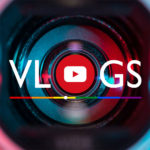 Researching content for MEN R US, we’ve stumbled across some really great vlogs and channels. While some are sweet, self-indulgent, and shouty, others are more thoughtful, inclusive and a testament to how far we have come in recent years.
Researching content for MEN R US, we’ve stumbled across some really great vlogs and channels. While some are sweet, self-indulgent, and shouty, others are more thoughtful, inclusive and a testament to how far we have come in recent years.
So, something for everyone and here are a completely subjective handful of vlogs that have caught our eye and currently watching. In no particular order:
Help I Sexted My Boss | 28 Mar 2022 | 4m 52sWilliam and Jordan react to most shocking letter EVER! Tyler and Todd | CAN
Tyler and Todd are living off-grid and building their own home in the woods of Nova Scotia, Canada. Join them they fulfil their dream of simple living and building our home with the goal of being entirely debt-free! Tom Daley | UK
Olympic gold medalist Tom’s channel with vlogs, exercises, food and raising a family with husband Lance Black who rather steals the show when he appears, in our opinion. Our Swirl Life | Jack and Ben | UK
Jack and Ben have been together since 2014, moving in the day after we met. In the Summer of 2016, they started to share their lives having since become dads. AsapSCIENCE | Mitchell and Gregory | CAN
Making science make sense, created by couple Mitchell Moffit and Gregory Brown. Amit & Aditya TV | Amit & Aditya TV
Living the husband life in New Jersey. Follow their journey as they navigate between our jobs, raising our pup (Adam), launching our dream projects, and breaking stereotypes. Matt and Blue | Matt and Blue | USA
Matt Dallas and Blue Hamilton make content that shows their everyday life, whether it be a new camping adventure, a fun DIY project, or cooking up the tastiest new recipe for their son. Mark E Miller | Mark E Miller | USA
Mark makes adventure videos that might cause you to go outside and explore the earth and its bountifulness or maybe not who’s to say. Ethan Hethcote | Ethan Hethcote | USA
Ethan’s channel is “a lot like life: it’s all an experiment. Sometimes you’ll get a little bit of this, sometimes a little bit of that. But it’s always going be a whole lot of fun!” AZB | USA
Zach(ary) Patton-Garcia “trying to do right by his dogs” (and husband) and Alaistair Patton “man on a mission to consume as much creative goodness as possible”. Married since 2017. Nicky and Pierre | Nicky Champa And Pierre Boo | USA/ EU
Despite these two being utterly infuriating at times (herding cats springs to mind) they can be very sweet and engaging which is why we have included them. “We’re goofy, we’re sassy, we’re crazy but most importantly we’re in love and we want to share it all with you!” Roly | Roly West | UK
Gay British YouTuber Roly West. LGBTQ+ advocate and YouTube video creator living in London! Queer and body modification enthusiast. Marcus & Ian | US
“We’re CRAZY active on Instagram and TikTok, so feel free to follow us on there.” Michael & Anthony | US
“Follow the adventures of couple Anthony Bowens and Michael Pavano!”
Update
From late 2017, we stopped updating regularly them. It’s a little sad (if predictable) that some have morphed into sales, seemingly more interested in selling an underwear range or grooming regime than providing an authentic insight into the lives gay vloggers share with their followers. While many vlogs remain inspirational, they are harder to find these days.
We are also mindful that living one’s life vicariously through the vlogs of others is not living your life. That’s not to say we can’t be inspired but, if you’re living vicariously, stop it. Get out and live life for yourself. (Sorry, we just love this word: vicariously means that you’re experiencing something indirectly, like when the life and adventures of others feel like your own).
Anyway, grouchiness aside, the vlogs listed here (in no particular order) should provide a springboard from where you can explore.
More and older vlogs and channels (some have not posted in over a year)
Calum McSwiggan | Calum McSwiggan | UKDoug Armstrong | Doug Armstrong | UK
Trent and Luke | Trent and Luke | UK Andrew Neighbours | Andrew Neighbors | USA
Husband & Husband | Aaron and Jonathan | USA
PK Creedon | Patrick and Mike | USA
Stepsof2Foreigners | Bernardo and Adam | USA
PJ & Thomas | PJ and Thomas | USA
Mark E Miller | Mark and Ethan | USA
Ethan Hethcote | Ethan and Mark | USA
Matthew J Dempsey | Matthew J Dempsey | USA
SupDaily06 | Chris Thompson | USA
wickydkewl | Davey Wavey | USA
Two Beeps | John and Jeremy | USA
V-Squared | Luke and Vinny | USA Back to top
Poetry
 The London LGBT poetry scene – amongst others around the UK – is as prolific and diverse as the LGBT community and, in recent years, poetry has steadily crept into its collective consciousness as accessible, entertaining, and social.
The London LGBT poetry scene – amongst others around the UK – is as prolific and diverse as the LGBT community and, in recent years, poetry has steadily crept into its collective consciousness as accessible, entertaining, and social.
It has a myriad of styles, but is essentially creative writing that expresses the experience and lifestyle of lesbian, gay, bisexual and transsexual persons in our society. Consequently it can be topical, inspiring, funny, heart/ gut wrenching, therapeutic… it can express anything and everything we ever wanted to say.
The formats of LGBT+ poetry events vary from open mike evenings, where anyone can have a go, to venues where some of the finest LGBT+ poets on the circuit strut their stuff. Events are performed at gay venues or gay-friendly straight venues with specific LGBT+ evenings.
INCITE@The PhoenixEvery 2nd Wednesday of the month. The Phoenix Artists Club, 1 Phoenix Street,WC2H 8BU Polari Literary Salon Poetry LGBT (no website). Monthly Open Mike, hosted by Andreena Bogle
First Sunday of every month, Tipsy Bar. 20 Stoke Newington Road, Dalston, N16 7XN Royal Vauxhall Tavern
Weekly queer cabaret that includes poetry The Poetry Café
Hosts regular LGBT poetry events. 22 Betterton St, London WC2H 9BX Queer’Say hosted by Rosie Wilby
Held regularly at different venues in association with Apple & Snakes and Out in South London Radio Poetry | GScene LGBT Poets | Wikipedia
LGBTQ Pride Poems | Poetry Foundation (US) A brief encounter by Leon Dunne | GCN Mag | 23 Dec 2020 | 2m 14s
Spoken word artist Leon Dunne has released an incredibly powerful video speaking about the continuing homophobia from past generations that didn’t magically disappear despite the giant steps society has taken in the last few years. Bristol Pride: Poet Chris Hyde’s “Heart in Mouth” on LGBT equality | BBC | 14 Jul 2018
Back to topWho wrote:
Yet each man kills the thing he loves
By each let this be heard.
Some do it with a bitter look,
Some with a flattering word.
The coward does it with a kiss,
The brave man with the sword.Click here to find out.
Organisations and events
Queer House Party
Queer House Party Meet the Londoners behind online club night Queer House Party | Time Out | 12 Aug 2020
Founded in 2004, Homotopia is a Liverpool-based arts and social justice organisation making a cultural impact through art and activism. It aims to support and platform local, national, and international LGBTQIA socially engaged artists and creatives. Every October/ November presents Homotopia Festival, featuring a variety of LGBTQIA art across multiple venues and outdoor spaces in the city. In addition to our festival, we have a year-round programme of artist development, public artworks, and events.
HomotopiaHomotopia
Homotopia
Homotopia Back to top
LGBT+ Podcasts
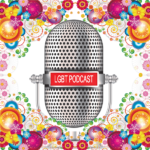 Here is our selection of podcast lists where you should find something to listen to and enjoy.
Here is our selection of podcast lists where you should find something to listen to and enjoy.
LGBT+ podcasts have exploded since the pandemic, and it will be interesting which stay the course and be around in a year or so time.
- Which are the best LGBTQ podcasts? | Means Happy | 2 Sep 2022
- 45 Best Gay Podcasts | Feedspot Media Database | 2 Sep 2022
- The 50 best podcasts to listen to in 2022 | Time Out | 30 Aug 2022
- 15 amazing queer podcasts to help pass the time | Queerty | 11 Apr 2020
- The best LGBTQ, gay and queer podcasts to listen to during #Queerantine | Attitude | 1 Apr 2020
- 12 LGBT podcasts you should be listening to right now | Pink News | 22 Nov 2016
- The LGBT Sport Podcast | BBC
LGBT+ news sources
 Attitude | Attitude
Attitude | Attitude
The Advocate | The Advocate
Aljazeera | Aljazeera
BBC LGBT | BBC News
Buzz Feed LGBT | Buzz Feed
Frieze | Frieze
Gayety | Gayety
Gay Times | Gay Times
Gay Community News (GCN) | Gay Community News (GCN)
Openly | Openly
No Straight News | No Straight News
Positive News | Positive News
Queerty | Queerty
Huff Post UK LGBT | Huff Post
Huff Post Worldwide | LGBT Huff Post Worldwide
Huff Post Queer Voices | Huff Post
Politico | Politico
Reddit | Reddit
Reuters | Reuters
Vice LGBT | Vice
LGBT fluffier stuff
Cocktails and cock talk | Cocktails and cock talkThe Daily Grind | The Daily Grind Back to top



